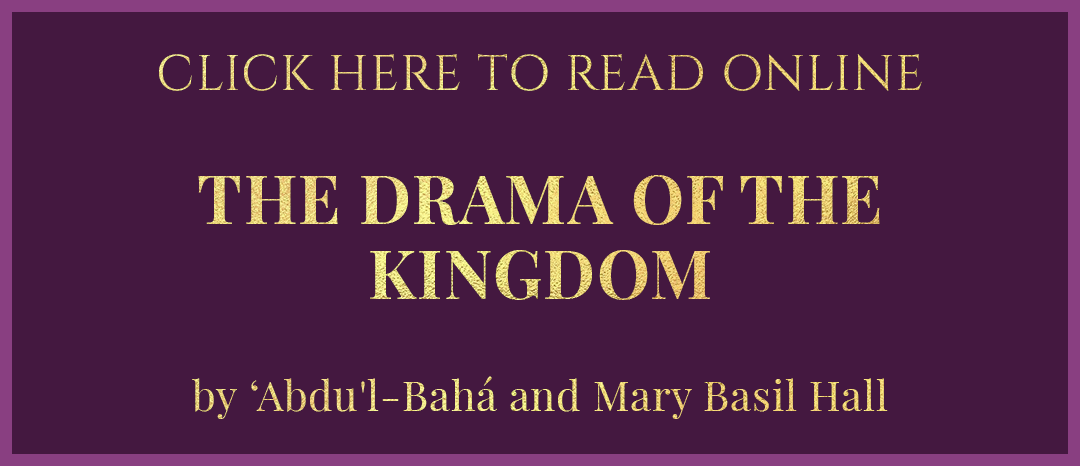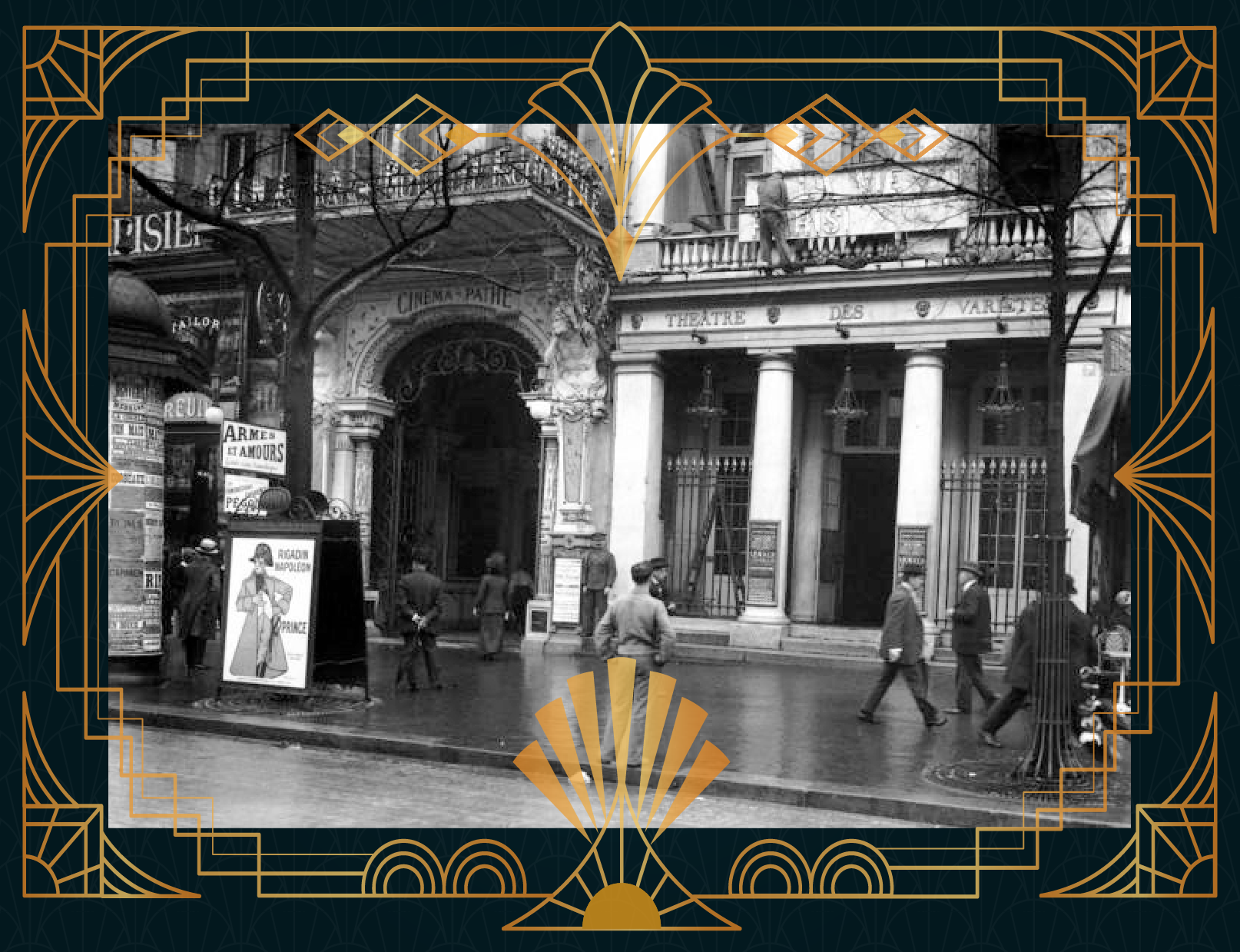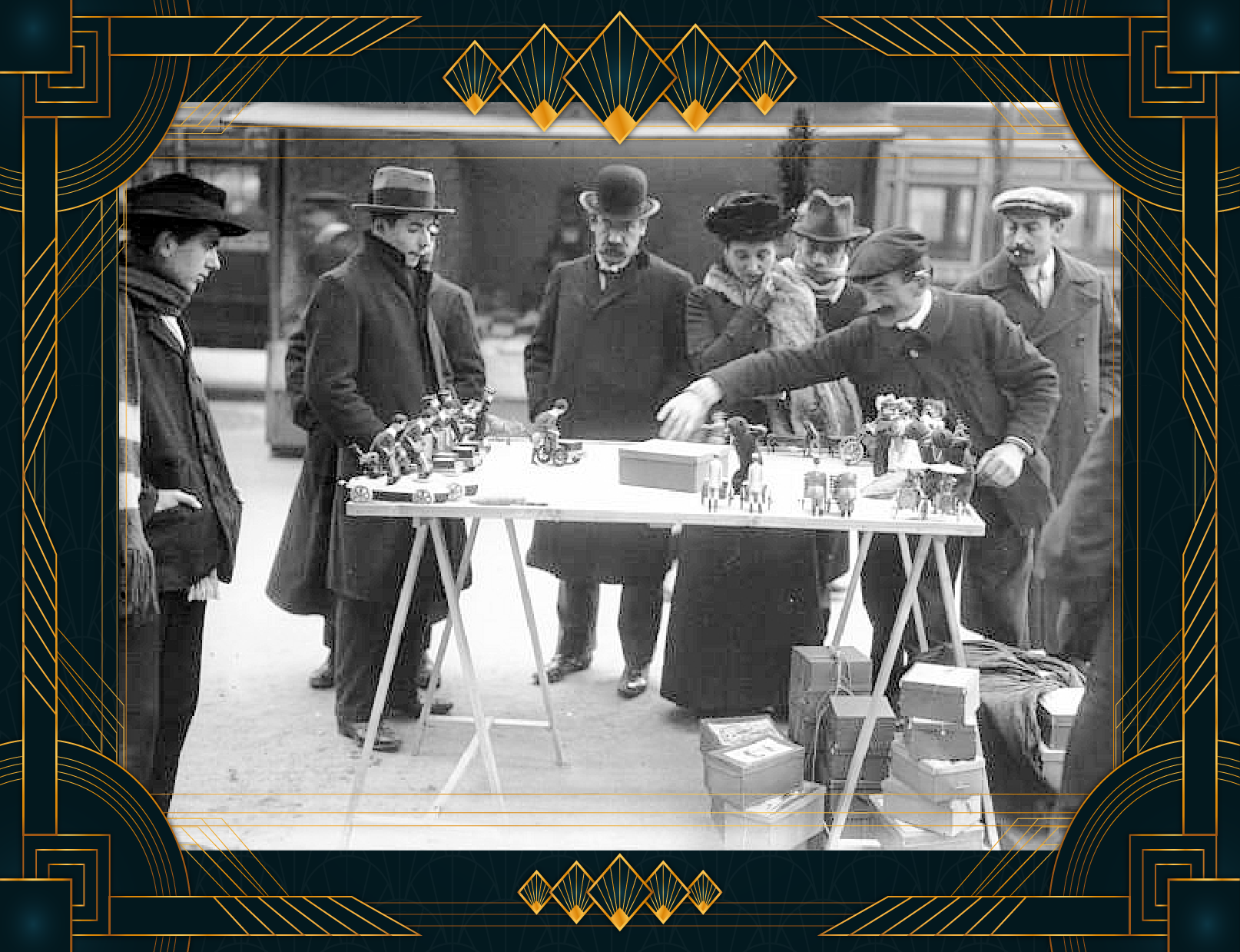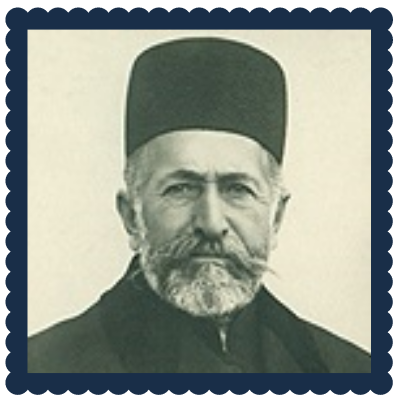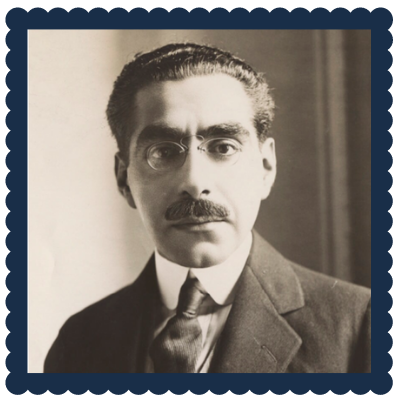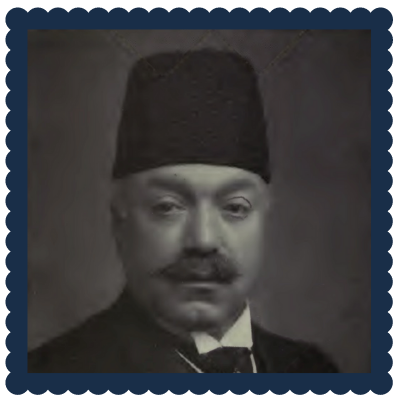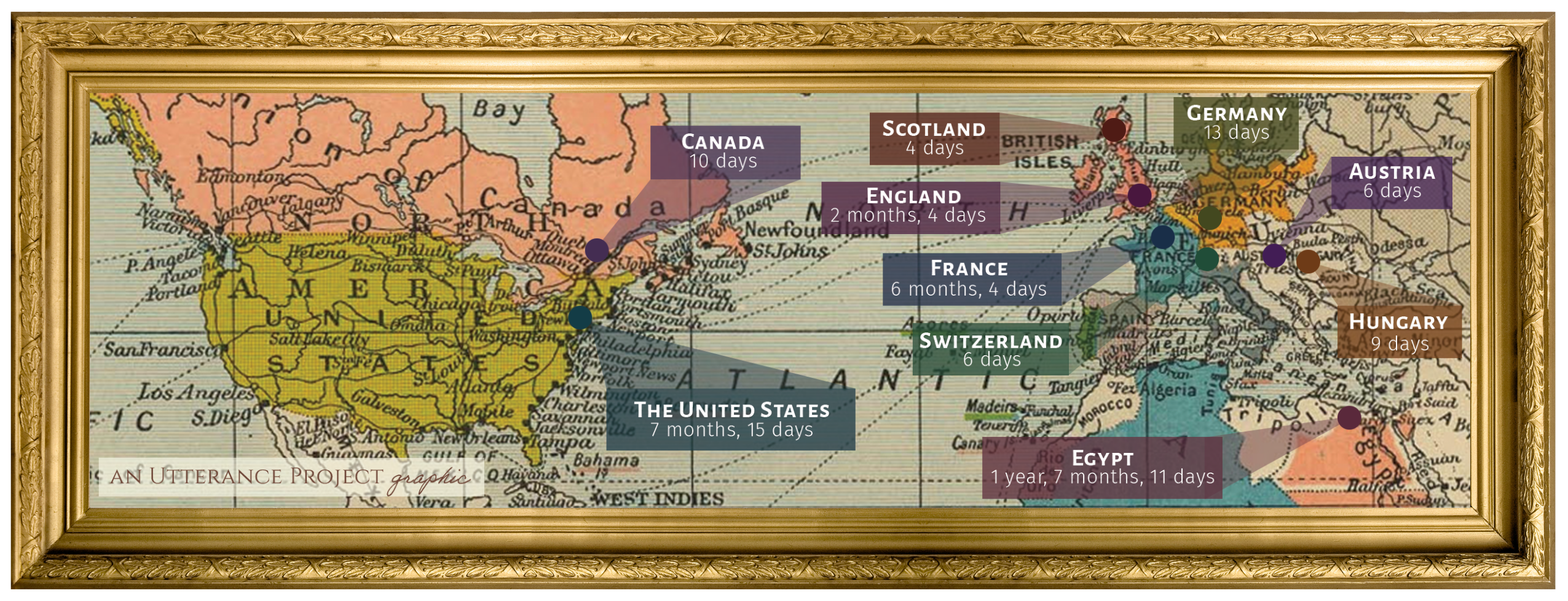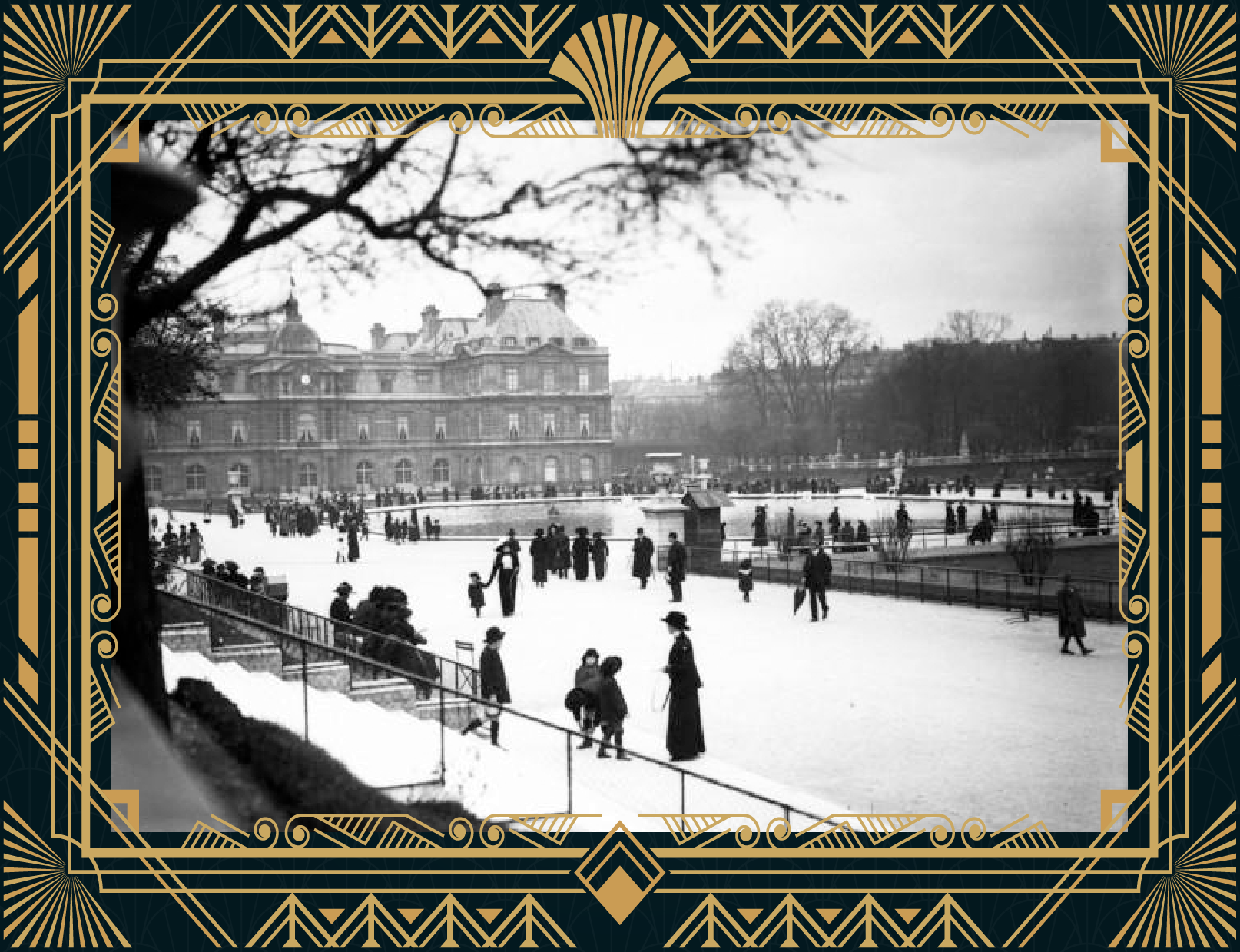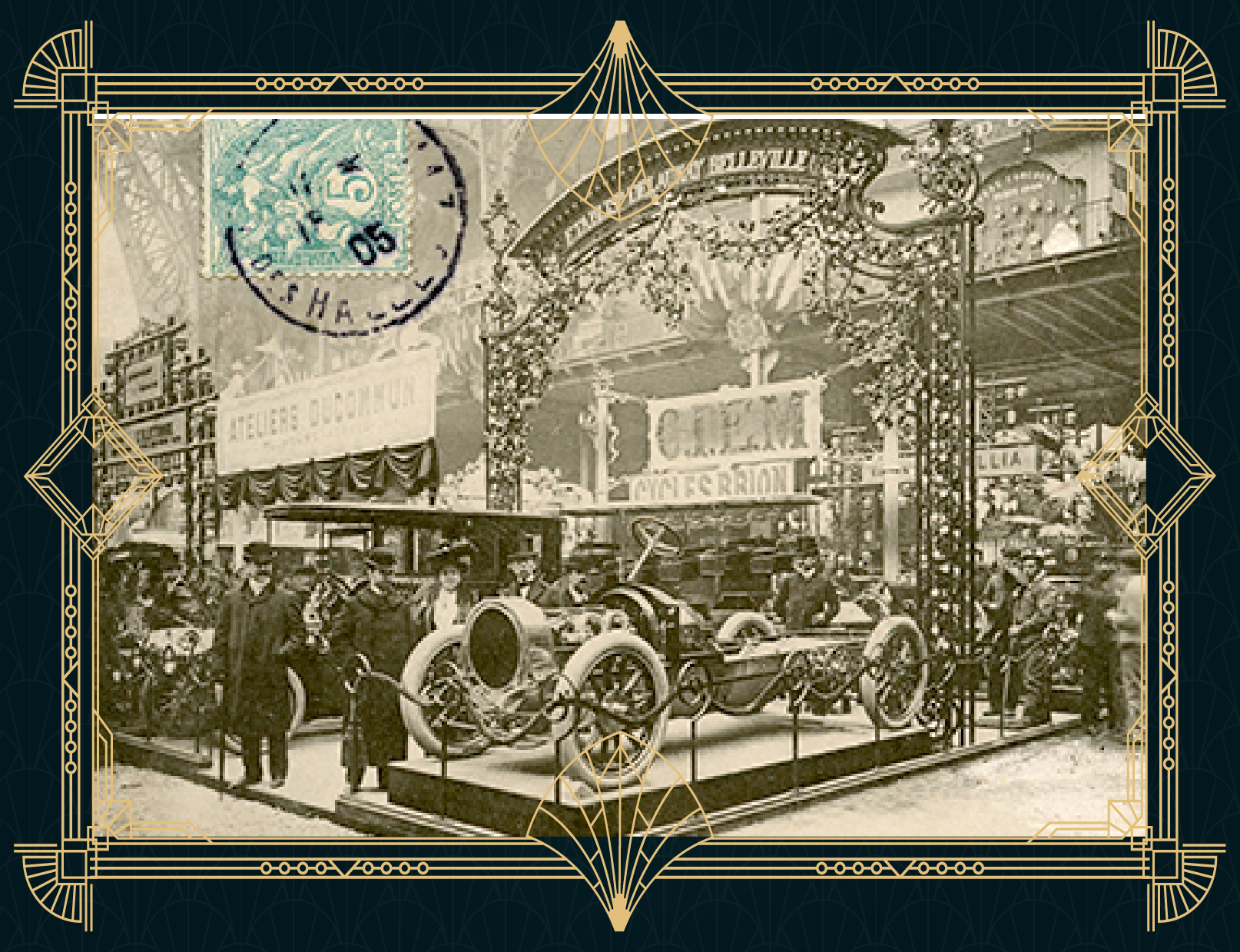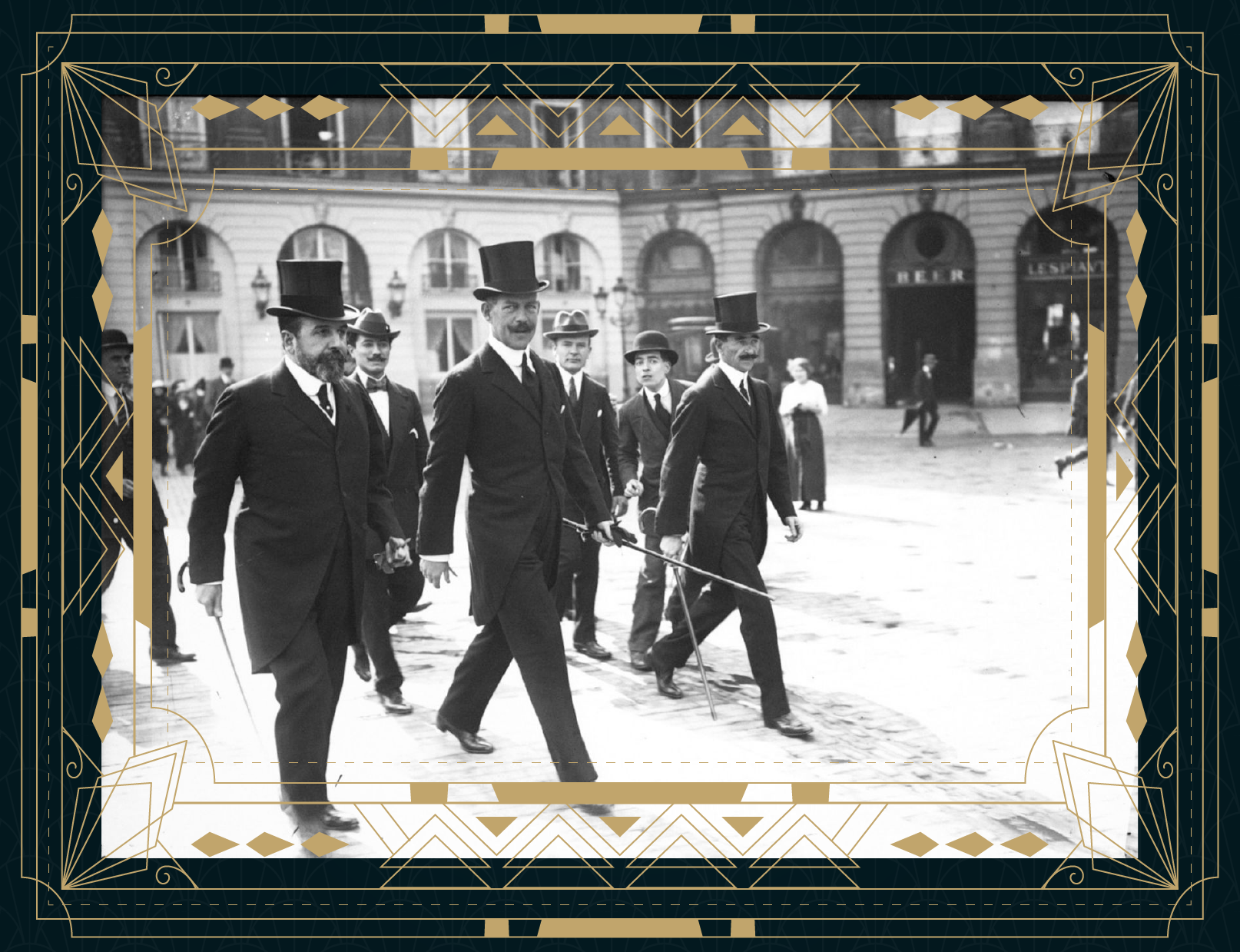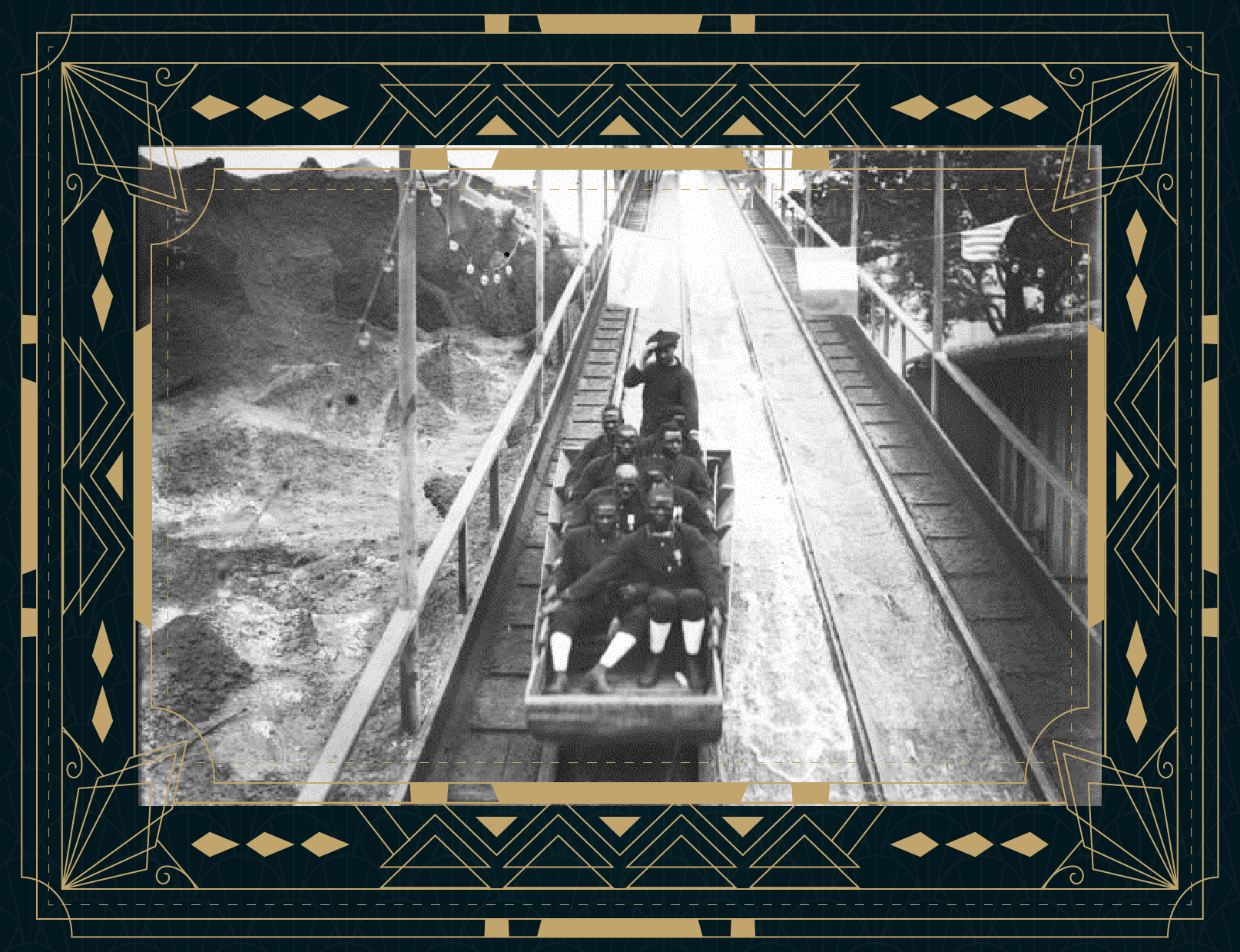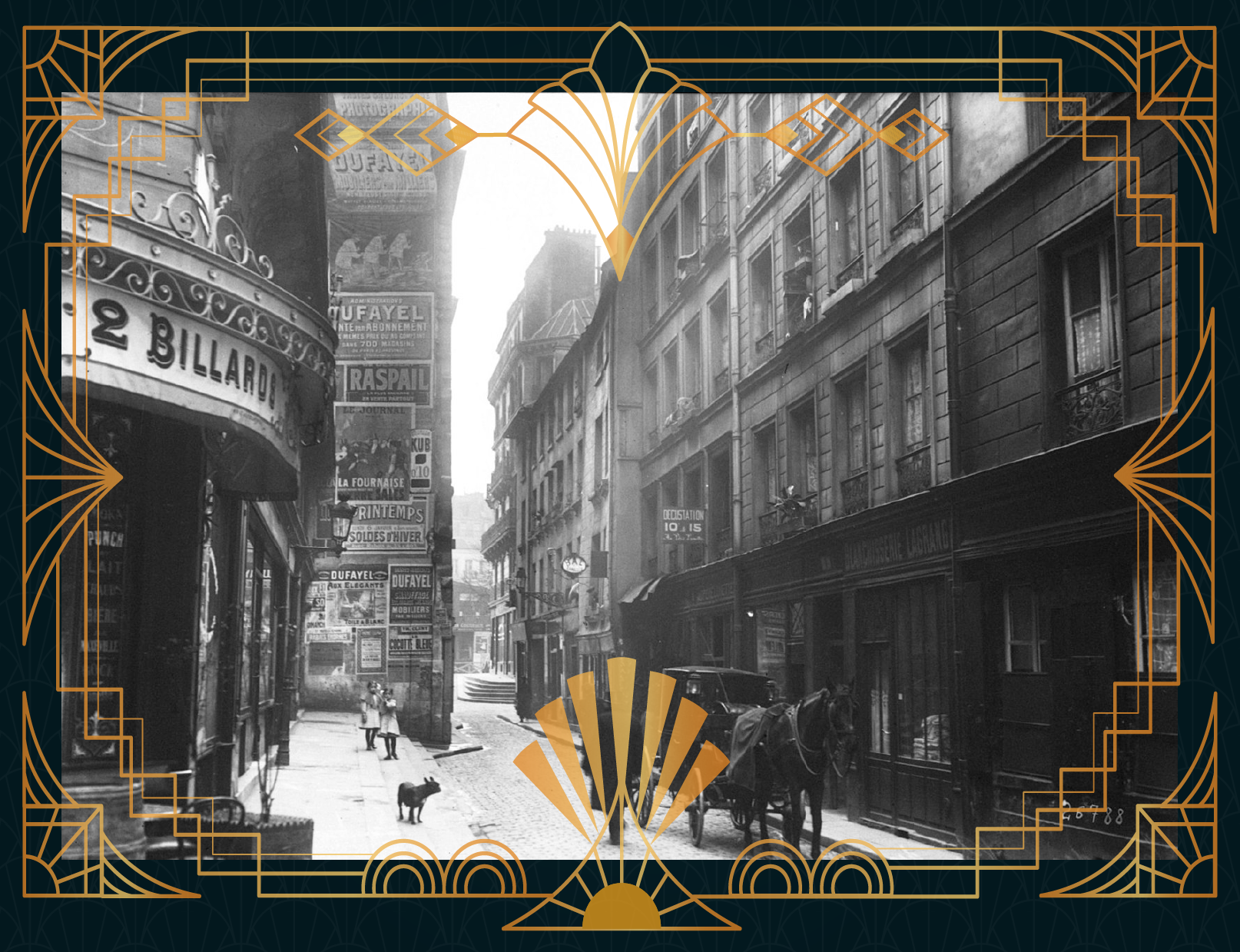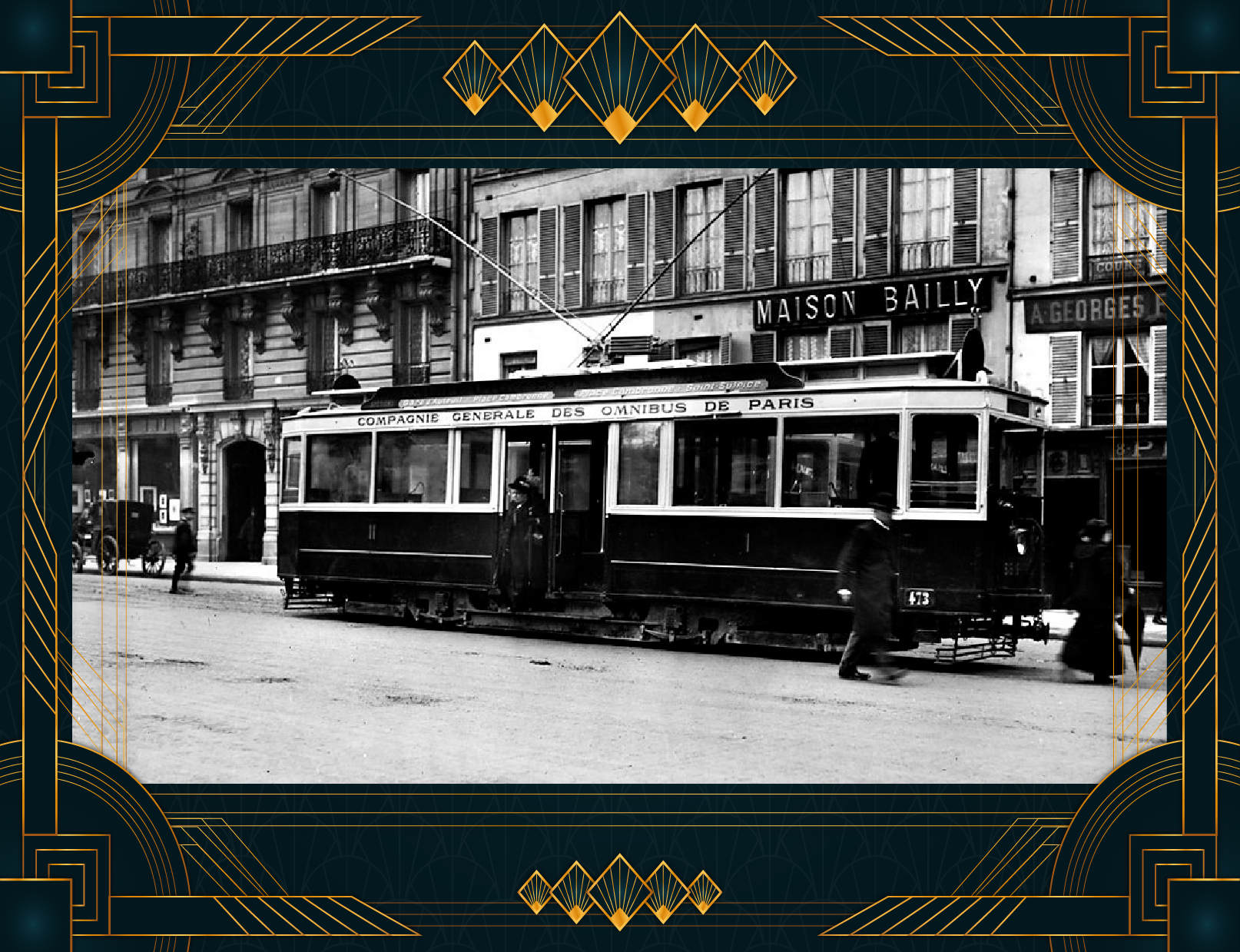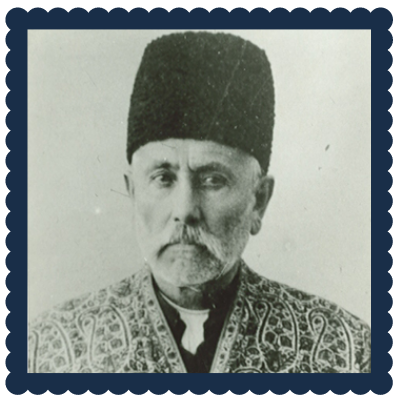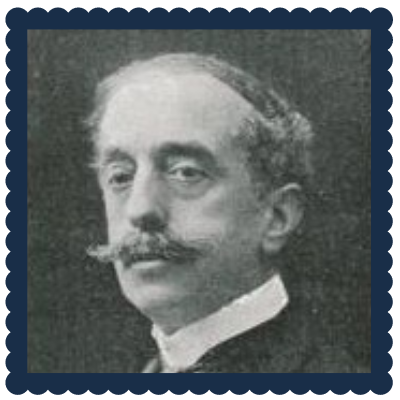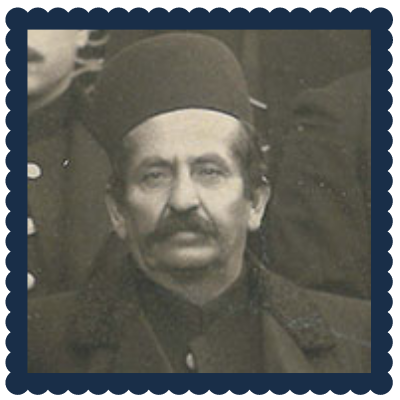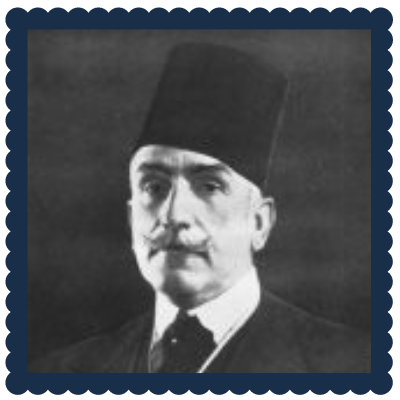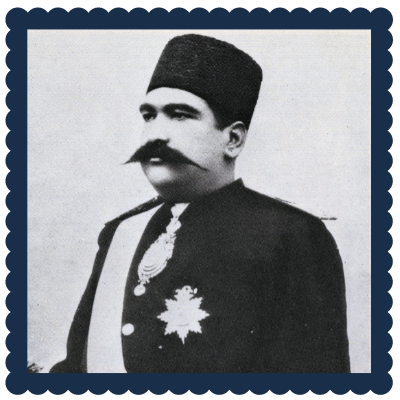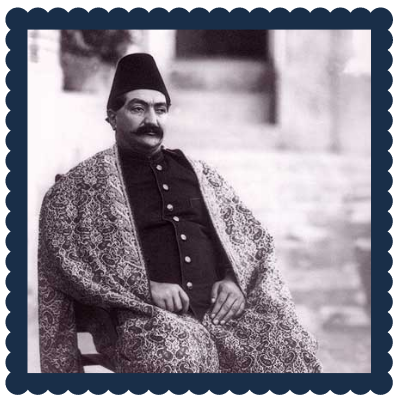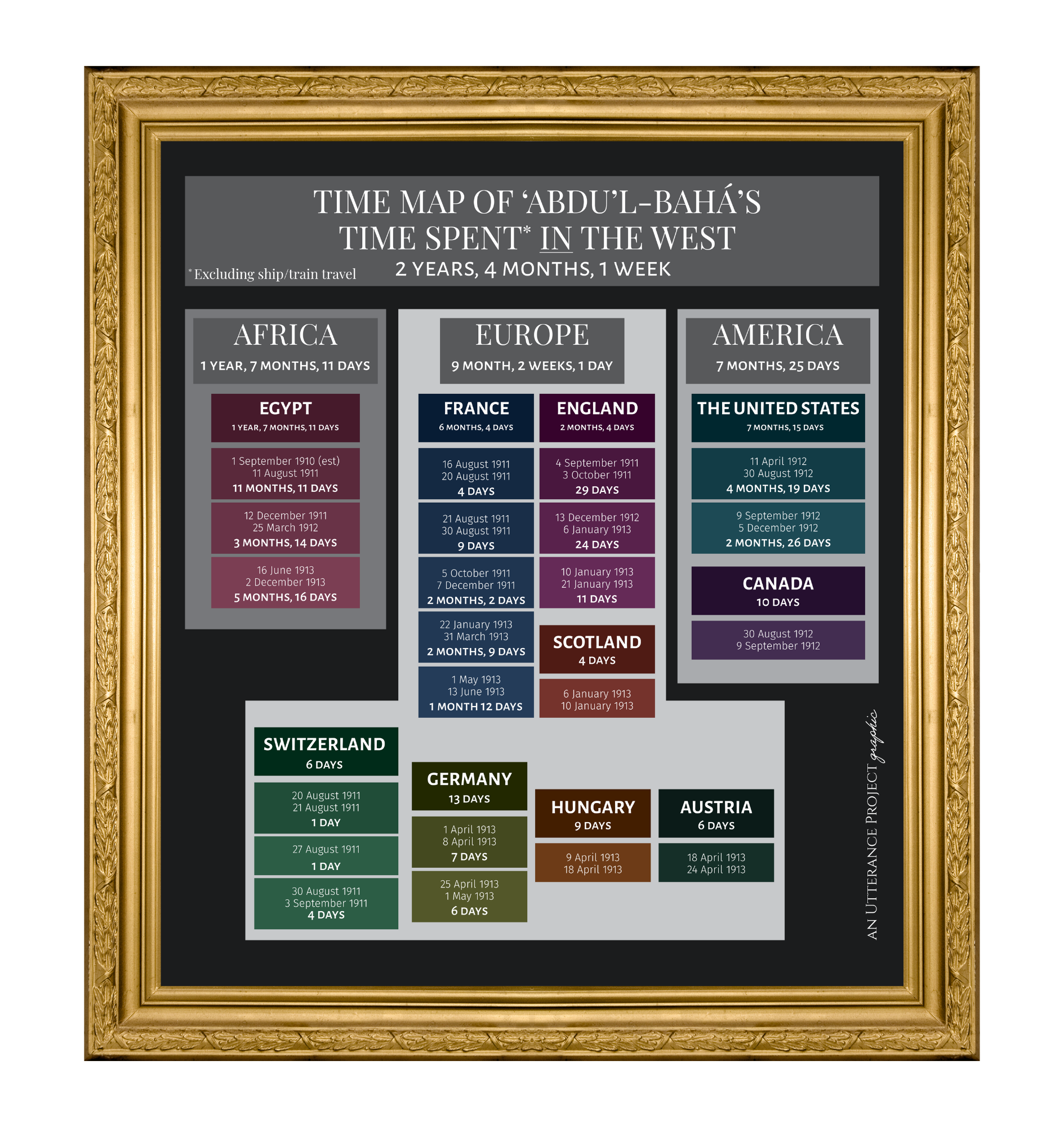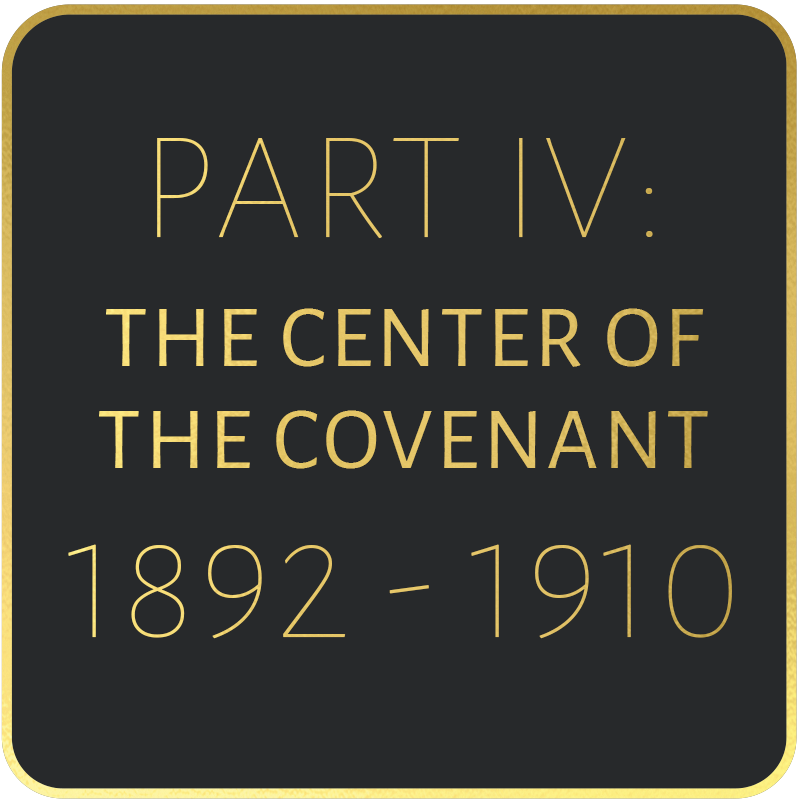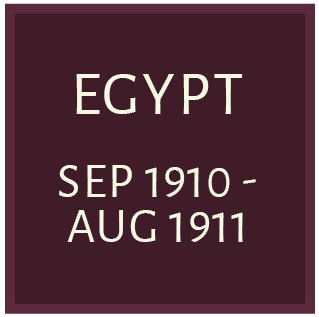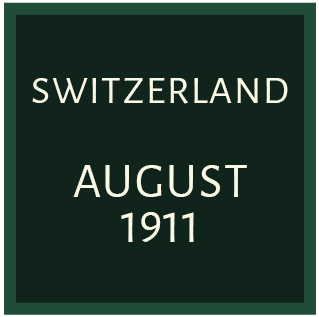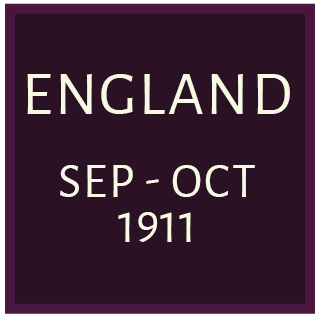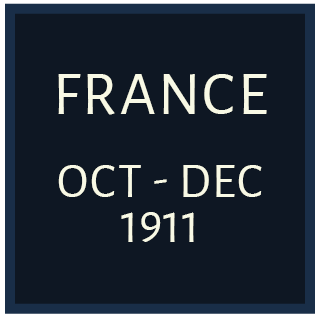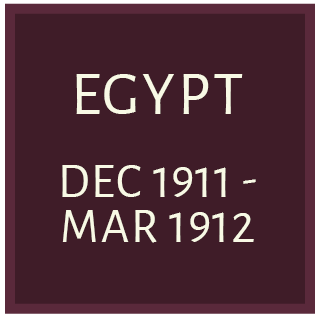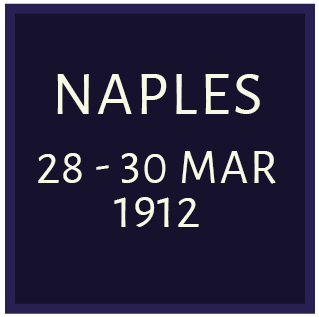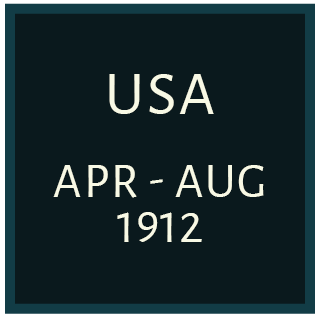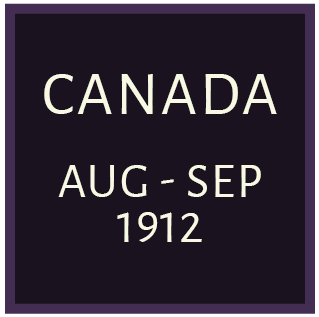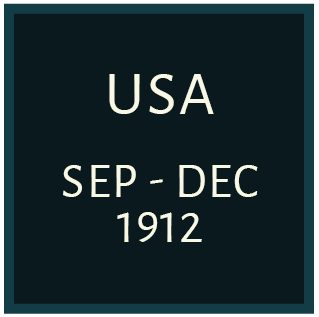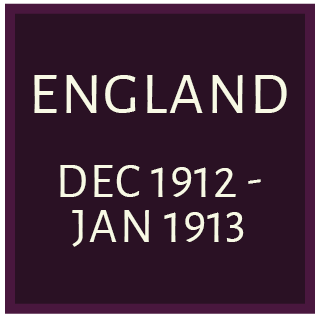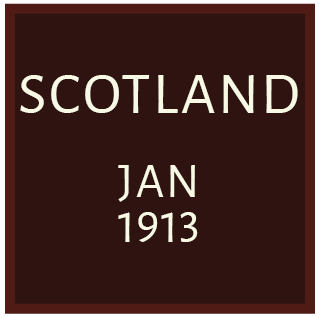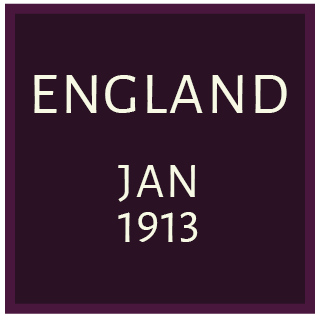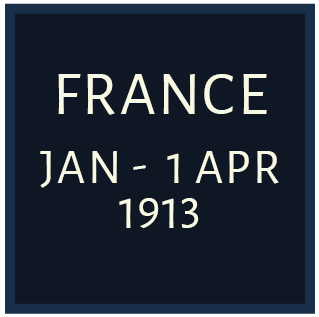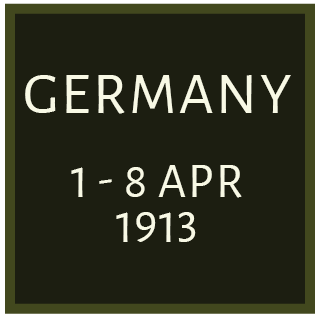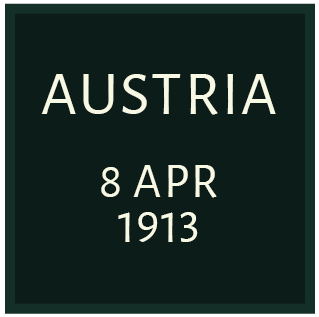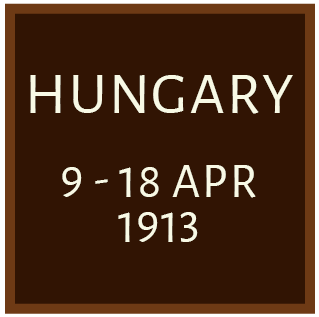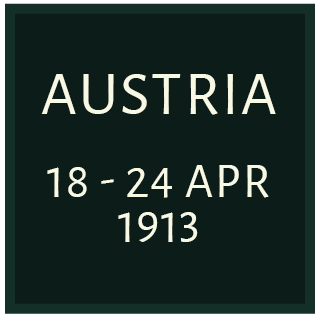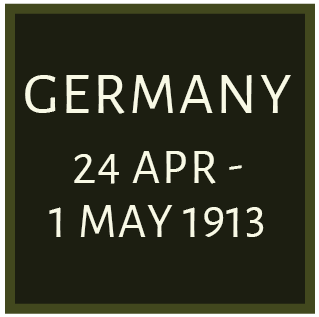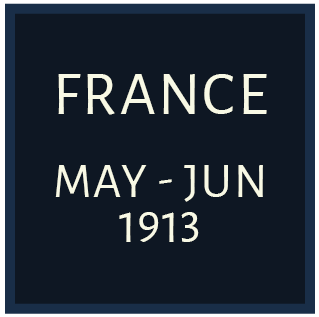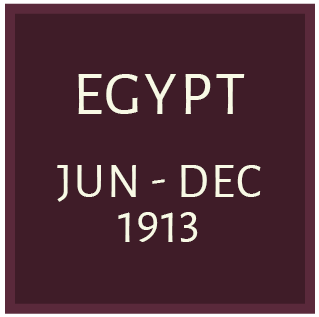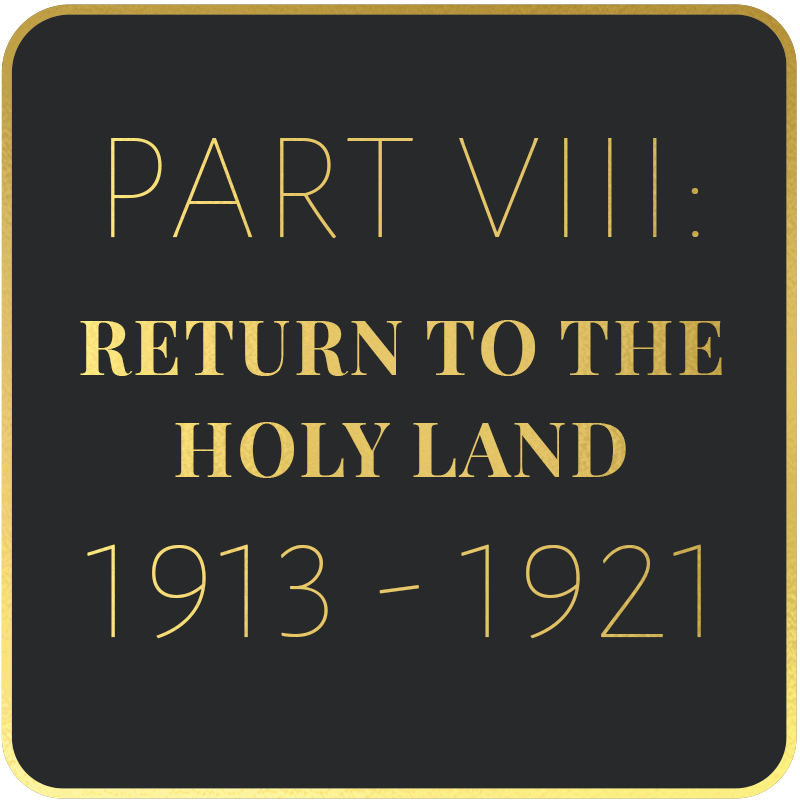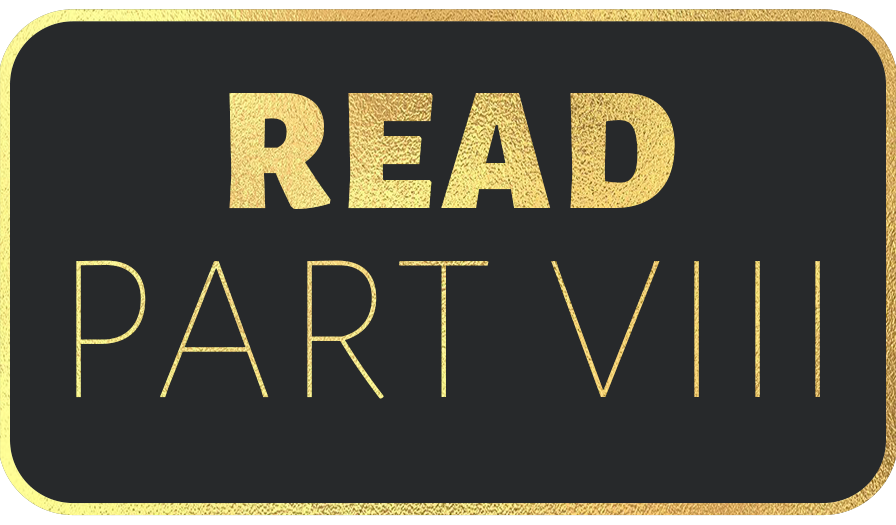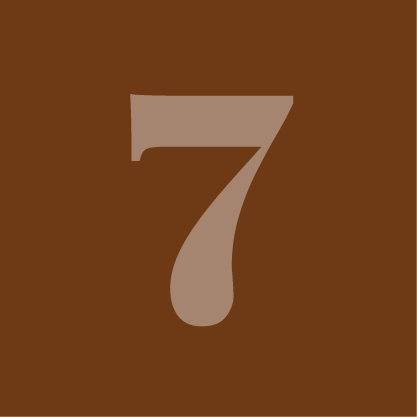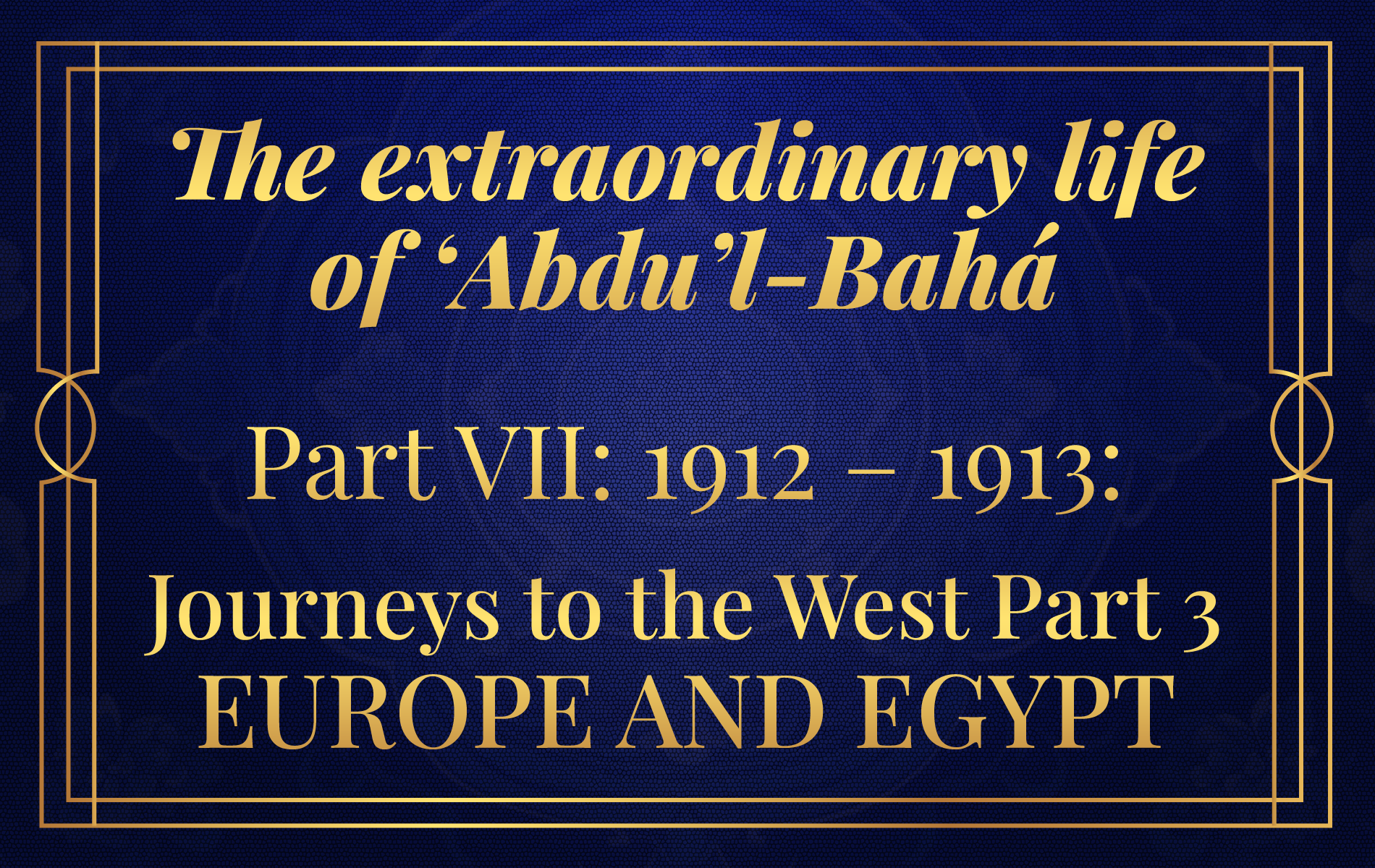
Written and illustrated by Violetta Zein
This part covers the life of ‘Abdu’l-Bahá from the age of 68 in 1912 to the age of 69 in 1913.
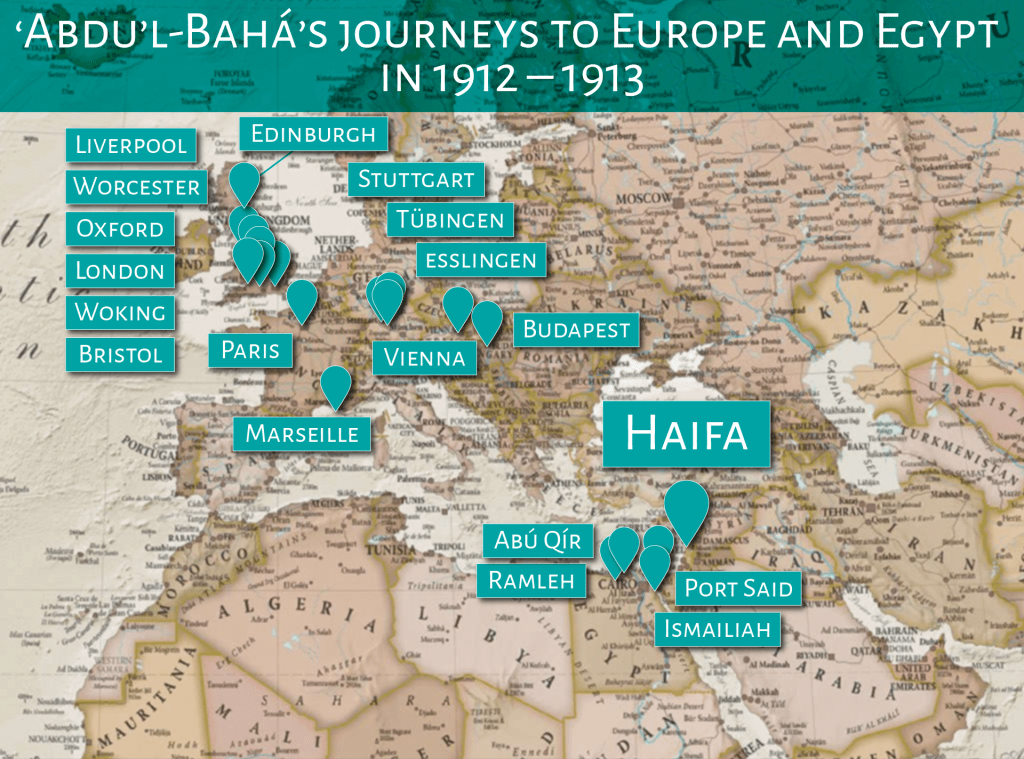
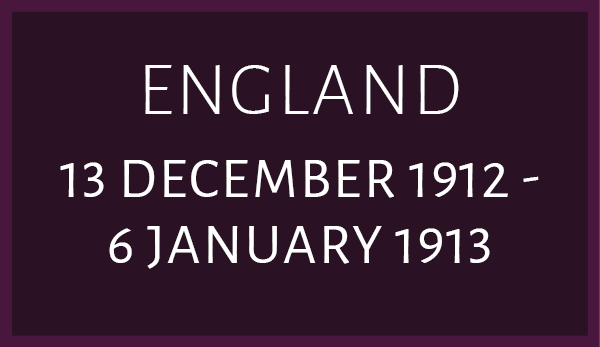
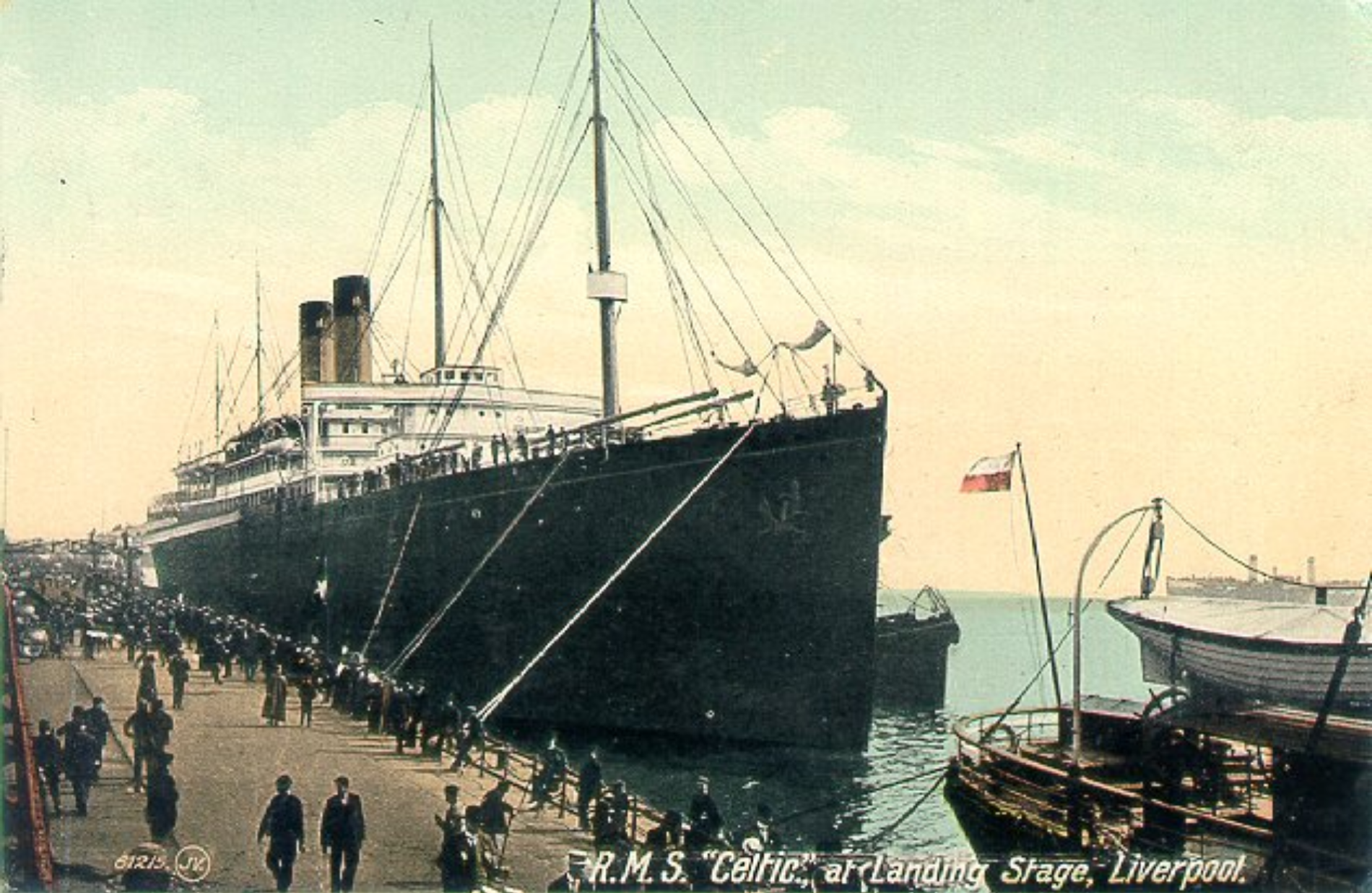
Colorized postcard of the Celtic at the Liverpool landing stage, undated. This is what the scene would have looked like when 'Abdu'l-Bahá docks here on December 13, 1912. Source.
After eight days on a calm ocean, 'Abdu'l-Bahá docks at Liverpool at ten minutes to 8 in the evening on December 13, 1912. The lights of the port of Liverpool illumine the horizon for kilometers. 'Abdu'l-Bahá tips all the stewards and servants on the ship liberally including a 50-shilling tip to the musicians alone. This is a very large tip at the time, as there are 20 shillings in one British Pound. A 50-shilling tip is more than £1, and today this would be a $300 tip. Twelve Bahá’ís from Manchester, Liverpool and Leeds and Hippolyte Dreyfus-Barney, who has traveled from France, wave handkerchiefs and welcome ‘Abdu’l-Bahá to England from the dock. When 'Abdu'l-Bahá leaves the Celtic, He does so with the majesty of a benevolent king: the Captain, the stewards, the sailors, the passengers and the ship's maids all come to the Master and express their happiness, one of the maids tells 'Abdu'l-Bahá' she had never seen a steamer passenger as kind and as generous as 'Abdu'l-Bahá had been to all of them. 'Abdu'l-Bahá remains at the Hotel Adelphi in Liverpool for His two-day stay in the city before going to London. 'Abdu'l-Bahá gives two addresses in Liverpool, one to the Theosophical Society on Saturday December 14, where He speaks about the search for truth and one at Pembroke Chapel, a Baptist church, on Sunday, December 15, where He speaks on Unity.
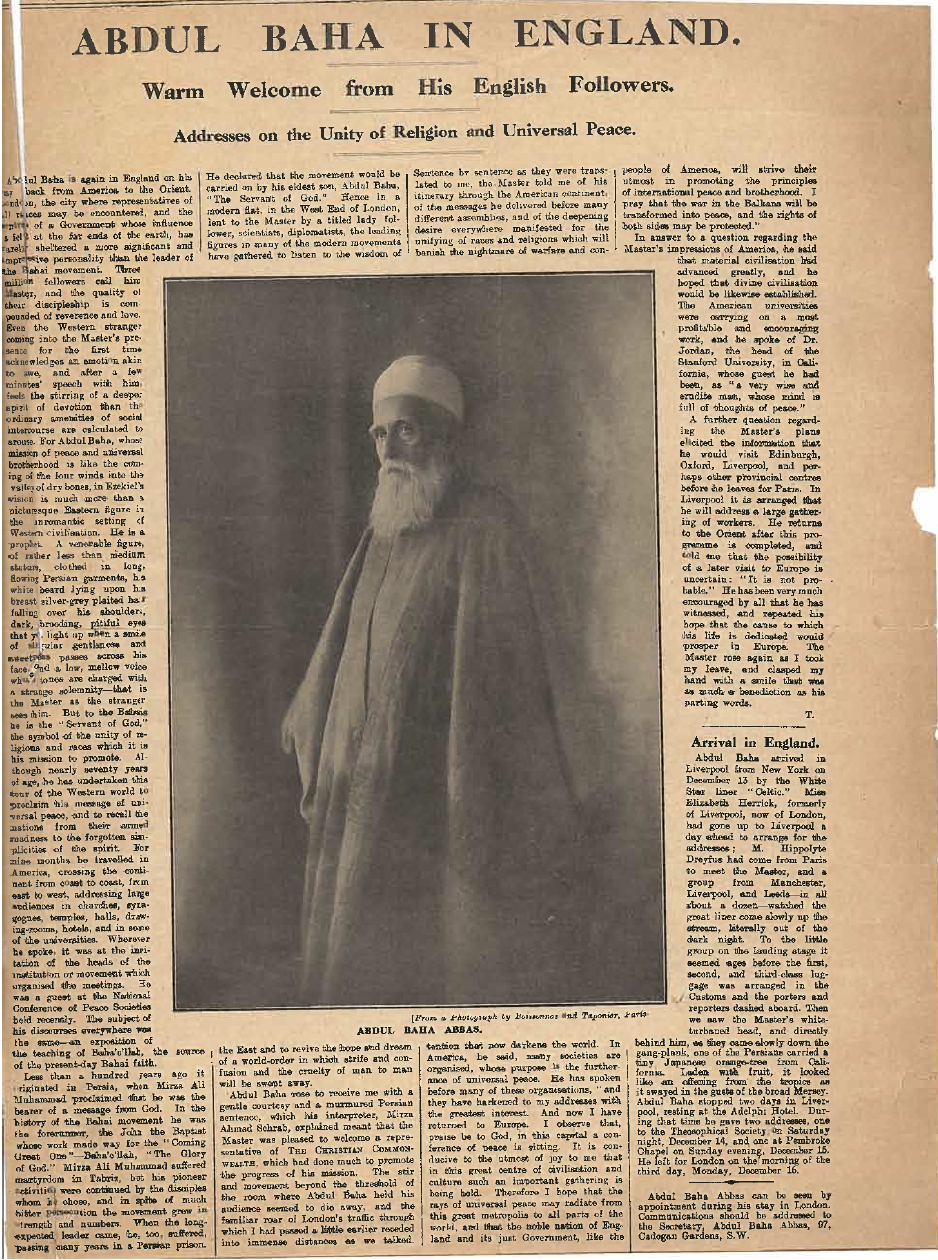
From the National Spiritual Assembly of the United Kingdom's publication "In the Footsteps of 'Abdu'l-Bahá: The Master in the British Isles 13 December 1912 – 21 January 1913."
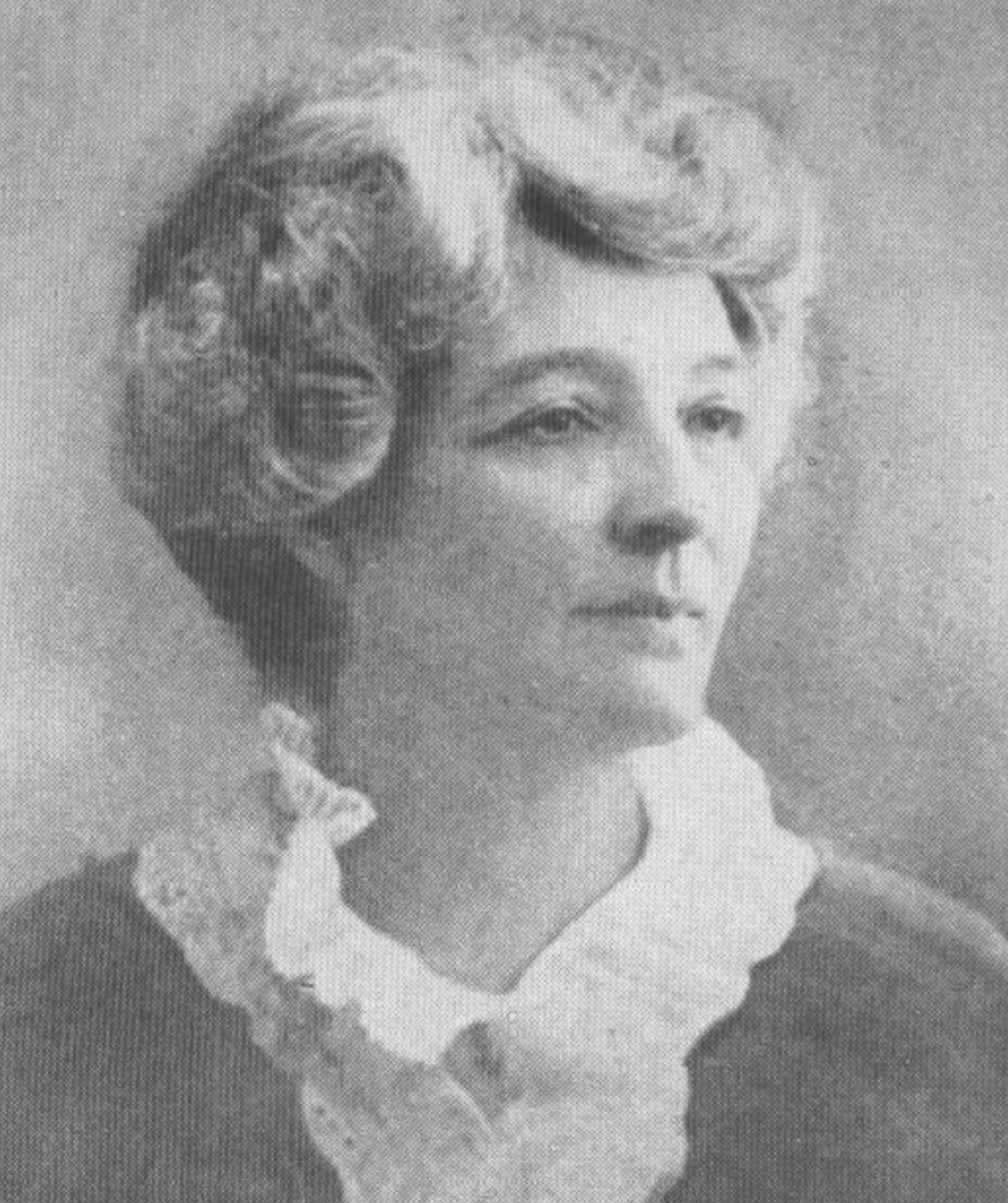
Lady Blomfield from Bahá'í Library Online: Picture Gallery of Early British Bahá'ís.
When 'Abdu'l-Bahá arrives in London at 1:40 in the afternoon, He is fetched at the train station by Lady Blomfield and her two daughters, along with 50 Bahá'ís who have come to welcome Him. The Blomfields take 'Abdu'l-Bahá back to 97, Cadogan Gardens, where He will remain until He departs for Scotland, while they relocate elsewhere to give Him full use of their home. ‘Abdu’l-Bahá was extremely fond of Lady Blomfield, one of the earliest British Bahá'ís and a deeply devoted Bahá'í. After hosting 'Abdu'l-Bahá in 1911, she had traveled from London to Paris with her two daughters in order to continue hosting the Master befittingly. Their transcription and publication of His addresses in London and Paris in 1911 was a source of joy for 'Abdu'l-Bahá. The very next day after His arrival in London, December 17, 1912, Ahmad Sohrab is reading to 'Abdu'l-Bahá some of His addresses from America and 'Abdu'l-Bahá expresses His wish to see them gathered and published as one or two volumes, saying:
At present they are all scattered and not collected. See how quickly the Paris and London addresses are printed and this was done through one woman, Lady Bloomfield.
Ahmad Sohrab’s European Diary, 17 Dec 1912
The very same day, someone mentions the name of a prominent and wealthy woman to 'Abdu'l-Bahá who responds:
One of the poor, sincere, honest women is more beloved by me than a thousand millionaires. Just now this Lady Bloomfield is dearer to me than all the Queens of the world.
Ahmad Sohrab’s European Diary, 17 Dec 1912
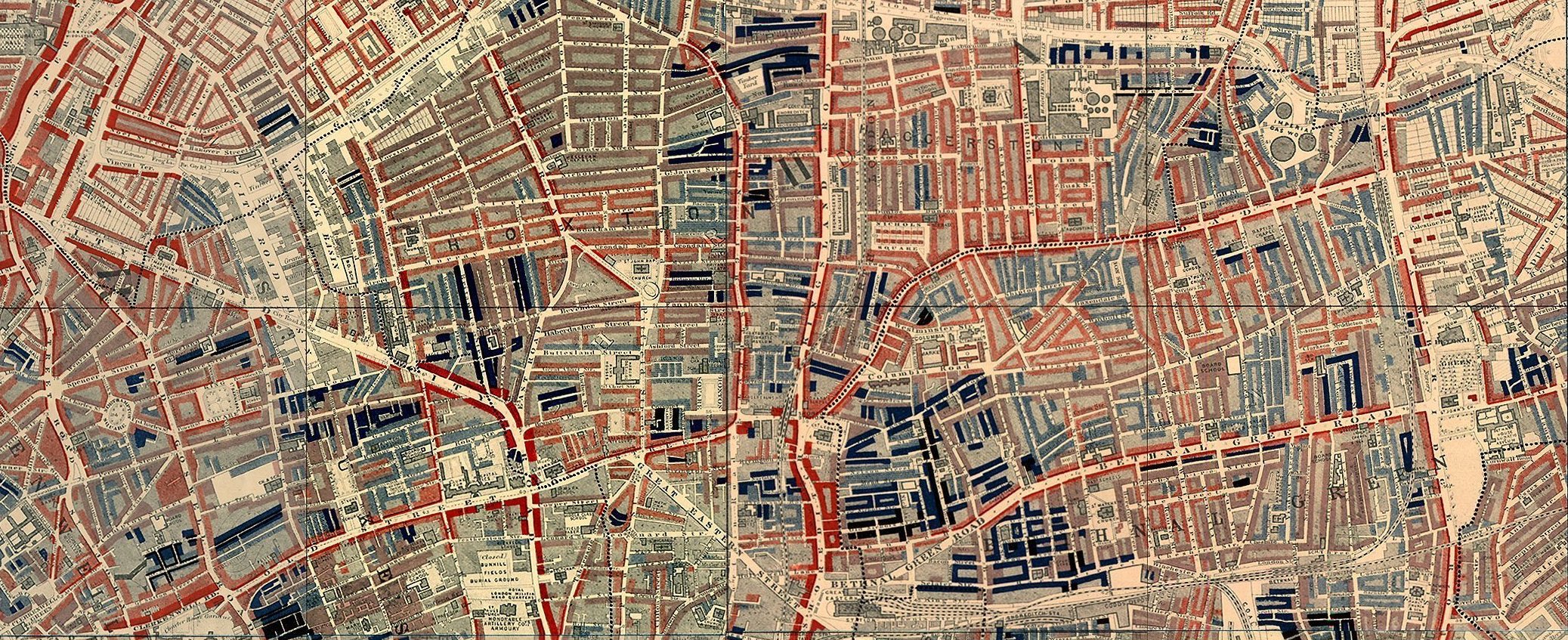
Part of Charles Booth's poverty map showing the Holborn neighborhood of London Published 1889 in Life and Labour of the People in London. The red areas are "middle class, well-to-do", light blue areas are “poor, 18s to 21s a week for a moderate family”, dark blue areas are “very poor, casual, chronic want”, and black areas are the "lowest class...occasional labourers, street sellers, loafers, criminals and semi-criminals". (source)
During this first leg of 'Abdu'l-Bahá's second visit to England, before His journey to Scotland, His encounters with the poor stand out. In the United States, the most memorable of these encounters happens shortly after 'Abdu'l-Bahá's arrival in New York, when He visits the Bowery, and also while in Green Acre with Fred Mortensen, who, like millions of the poor in the United States, rode the rails, for lack of money to purchase train tickets. In England in 1912 - 1913, when 'Abdu'l-Bahá is visiting, poverty is extremely apparent in the heart of London and Edinburgh. A 1909 report of the Poor Law Commission, just two years before 'Abdu'l-Bahá first visits England, finds that one-third of the East End's 900,000 strong population lives in conditions of utter poverty, with an average of 25 houses sharing a single lavatory and access to fresh-water. More than 10% of the population cannot afford their daily bread, and penny sit-ups, where the poorest homeless can sit on a bench for three pennies a night, wash their clothes and have breakfast are common. Some shelters even set up beds in narrow coffins, in order to accommodate a larger number of people than beds would allow. The poverty 'Abdu'l-Bahá encounters in England breaks His heart, as Wellesley Tudor Pole himself witnesses:
His compassion for the aged, for children and the downtrodden knew no bounds. I remember once after he had visited a Salvation Army refuge near the Embankment, in London, tears came to his eyes. He could not understand how a wealthy nation like Britain could allow such poverty and loneliness in its midst. He spoke about this to Archdeacon Wilberforce of Westminster Abbey and to Dr. R. J. Campbell of the City Temple and he provided a sum of money through London's Lord Mayor for the succour of the poor and derelict, then so prominent a feature of the London scene.
Wellesley Tudor Pole, Writing on the Ground, page 146
This story is Part I of VI of 'Abdu'l-Bahá's encounter with the poor in London in the winter of 1912-1913. Hájí Abu'l-Hasan-i-Ardakání, better known as Ḥájí Amín is one of the Hands of Cause appointed by Bahá'u'lláh during His Ministry. He is the first trustee of the Ḥuququ’lláh in the history of the Faith and was chained with Hand of the Cause of God Jináb-i-Ḥájí Ákhúnd in 1890. He arrives in London on December 18, 1912 and arrives the next morning to visit 'Abdu'l-Bahá. He opens his handkerchief with many letters from Persia and Turkmenistan, and in it are two small loaves of dry, black bread and an apple from a very poor Bahá'í laborer in 'Ishqábad, who had told Ḥájí Amín:
I hear thou goest into the presence of our Beloved. Nothing have I to send, but this my dinner. I pray thee offer it to Him with my loving devotion.
'Abdu'l-Baha spreads the handkerchief before Him, and leaves His luncheon plate uneaten, partaking instead of the faraway worker's dinner, then breaks off pieces of the bread and hands them those present, saying:
Eat with me of this gift of humble love.
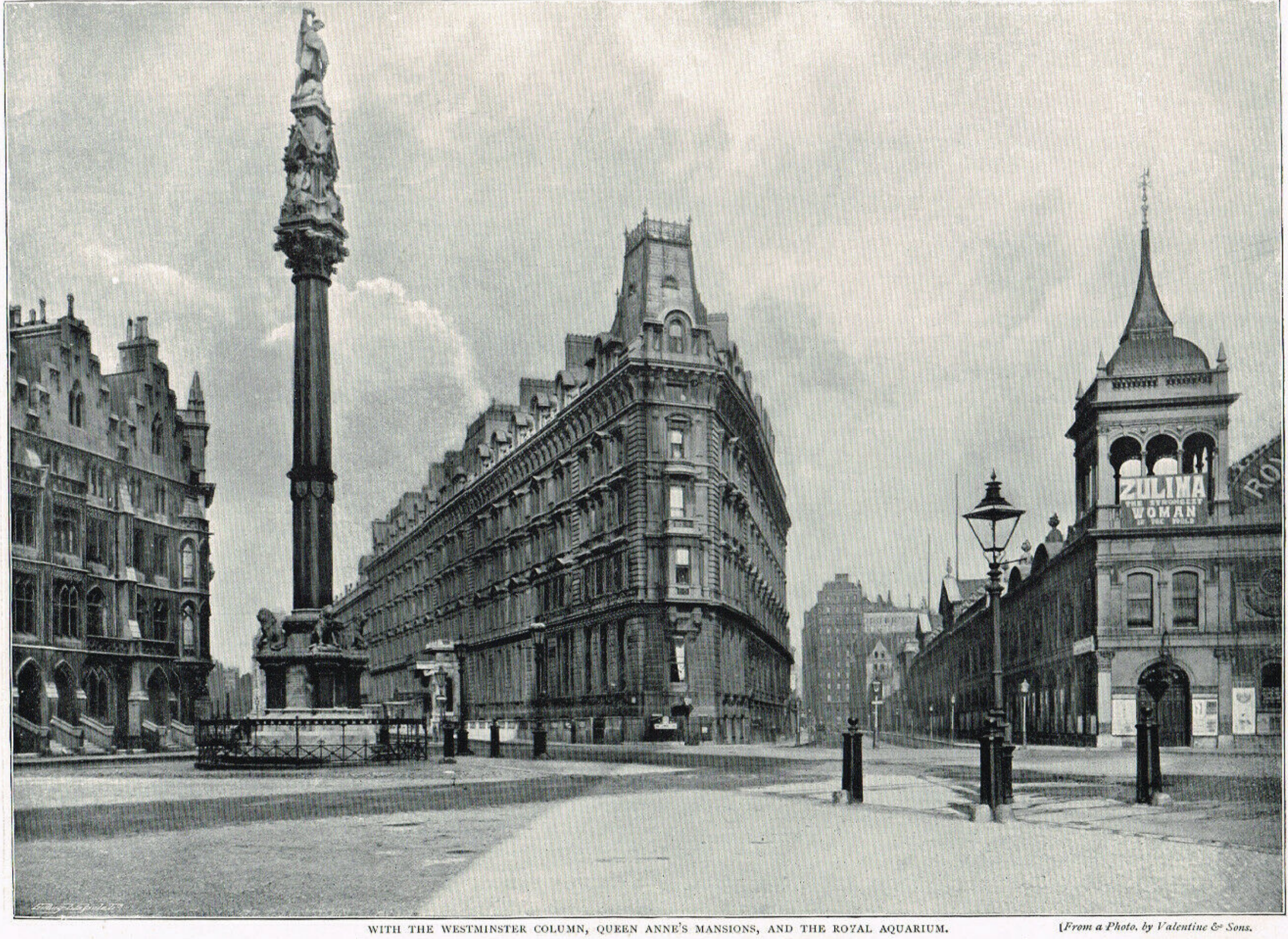
The Westminster Palace Hotel, where 'Abdu'l-Bahá spoke. 1896 print of a photograph by Valentine & Sons. Source.
'Abdu'l-Bahá gives His first public address on His second visit to England at the Westminster Palace Hotel at 8 in the evening on December 20, 1912. Sir Thomas Barclay gives a fine introduction to 'Abdu'l-Bahá, and presents some of the teachings of Bahá'u'lláh to an overflowing audience of over 1,000 people, including scientists, diplomats, and leading thought leaders:
"All prejudices," said Bahá'u'lláh, "whether prejudices of religion, prejudices of race, prejudices of politics or prejudices of nationality must be cast off, for they are a cause of the sickness of the world." Then again he says: "There is no contradiction between true Religion and Science. When a religion is opposed to Science, it is 'superstition.' Prejudice and superstition are the enemies of human development. "If a man would succeed in his quest for truth, let him first shut his mind to the traditional superstitions of the past." These traditional superstitions have grown over and disfigured true religion and the object of the Revelation of Bahá'u'lláh is to get to the original truth and exclude no conscientious searches after undisfigured truth. I wonder if I have understood the Revelation of Bahá'u'lláh. If I have, it has a singularly good Christian ring and I should interpret its meaning as "Be a real Christian and you will be a good Bahá'í."
Star of the West, Volume III, number 17 (19 January 1913)
'Abdu'l-Bahá begins speaking at once and introduces His topic by masterfully weaving the law of affinity within molecules into its spiritual equivalent: the binding force of Unity. Following through on the topic of Love, 'Abdu'l-Bahá speaks about His Holiness Jesus Christ's love for the world, the tragedy of the Balkan war and Bahá'u'lláh's mission to bring peace to an ailing world. After speaking about Bahá'u'llá's Message to the World's Religious Leaders, 'Abdu'l-Bahá presents a concise introduction to the main tenets of the Bahá'í Faith: Religion as the cause of unity; the unity of science and religion; the elimination of prejudices of race and nation; the equality of men and women; and the commandment of pursuing a craft or profession. After this portion of His talk, 'Abdu'l-Bahá addresses three societal issues and movements of importance or concern: the disunity between Christians and Jews; international peace and an international court of arbitration; and His prayers for successful negotiations for peace in the Balkans and an end to the First Balkan War at the ongoing London Peace Conference of 1912-1913.
'Abdu'l-Bahá's address is listened to in silence. Alice Buckton, Charlotte Despard, and Hippolyte Louis-Dreyfus all say a few words, after which, 'Abdu'l-Bahá gives His blessing to the audience. His blessing is magnificent, because it takes each of the points of His address and reframes them in the form of a supplication to God. It is, in essence, His address in prayer form, which is why we are sharing it below in its entirety: (for a text version of this prayer, download the PDF of Ahmad Sohrab's European Diary and go to page 198)
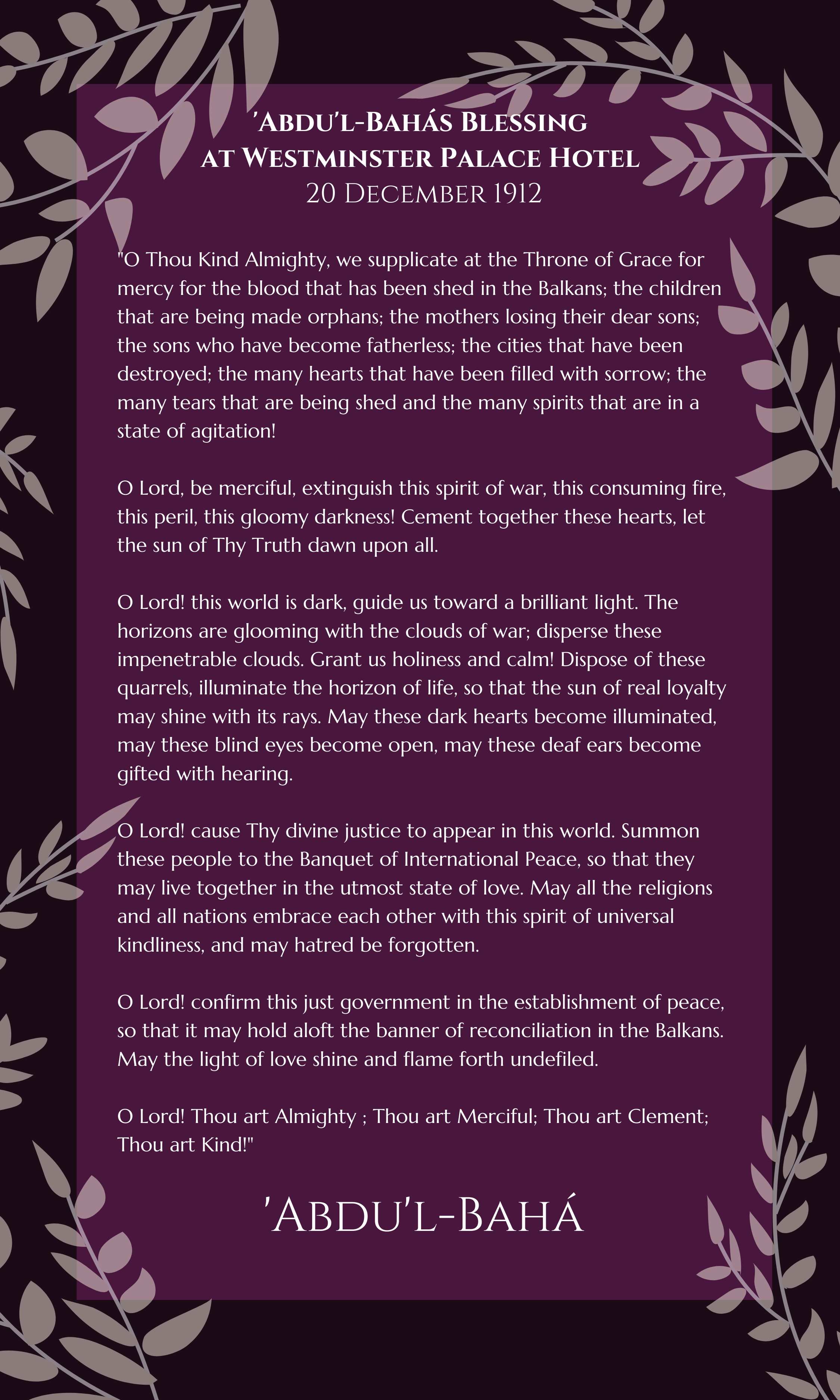
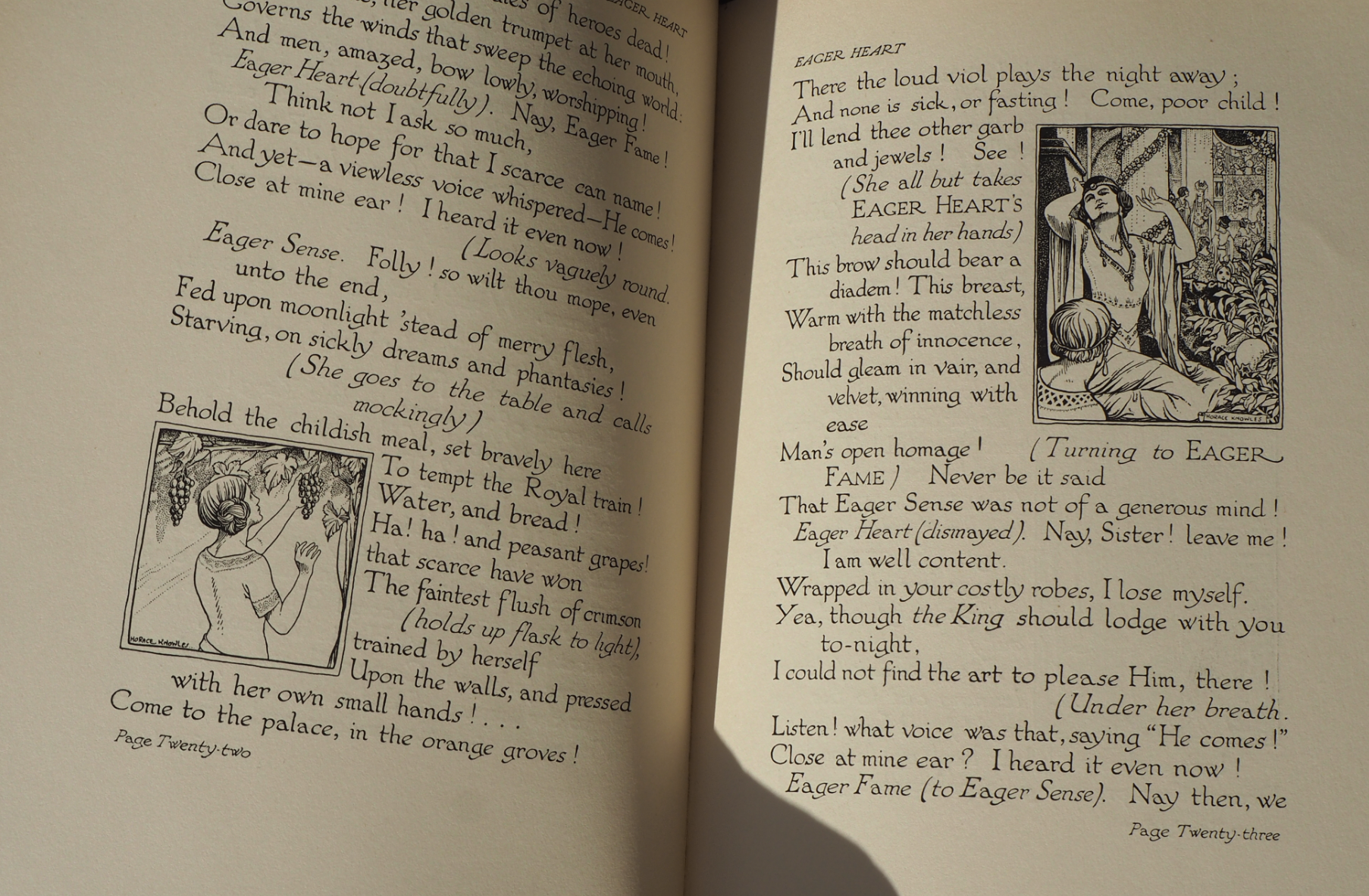
Two pages from the first edition of Eager Heart: A Christmas Mystery-Play by Alice Buckton. iBerLibrio.
'Abdu'l-Bahá has two profound encounters with theater on His last visit to England, before and after His visit to Scotland. This is Part I. In the evening of December 21, 1912, 'Abdu'l-Bahá attends a spiritual play by English educator, poet, community playwright, feminist and mystic Alice Buckton entitled "Eager Heart: A Christmas Mystery-Play" about the life and sufferings of Jesus Christ. The play recounts the tragic story of a woman who doesn't recognize Jesus Christ, the promised Manifestation of God she has been eagerly waiting and preparing for when He shows up at her door. Lady Blomfield, 'Abdu'l-Bahá and His Persian entourage attend the Saturday matinee performance of the play at the invitation of the playwright, Alice Buckton. Coincidentally, one of Lady Blomfield's daughters is playing the title role, a character named Eager Heart. 'Abdu'l-Bahá has a front-row seat to the very first dramatic performance of His entire life. More than 1,200 people are in attendance. ‘Abdu’l-Bahá weeps during the scene where Eager Heart (the main character) hesitates to welcome the Holy Child Jesus Christ and His parents, Mary and Joseph, overcome with fatigue, thirst, and hunger into the haven of rest she has been preparing for them, because she has failed to recognize her holy visitors. There is no doubt the play deeply affected 'Abdu'l-Bahá because He was a witness to scenes such as these, when people, blinded by ignorance, time and and again failed to recognize the Manifestation of God for this age. Afterwards, 'Abdu'l-Bahá goes backstage and speaks to the actors at length about the Divine significance of the play they have just portrayed.
The experience of this play stays with 'Abdu'l-Bahá. Two days later, on December 22, Abdu'l-Bahá's noon address at Cadogan Gardens brings up yet another profound subject that Eager Heart had touched on. During His address, 'Abdu'l-Bahá speaks about people's expectation of the Promised One, yet their refusal to offer Him a shelter when He arrives. They prepare palaces for the Promised One, decorate the streets, arrange a downy couch, but when the Son of Man arrives, no one is aware, no one cares, they carry on with their lives. The Promised One arrives, walks the streets and highways and oblivious people continue to pursue their own needs, still expecting His arrival as a King and ruler, all the while completely oblivious to His divine presence. On January 17, 1913, we encounter theater again, in a most unexpected way. To be continued.
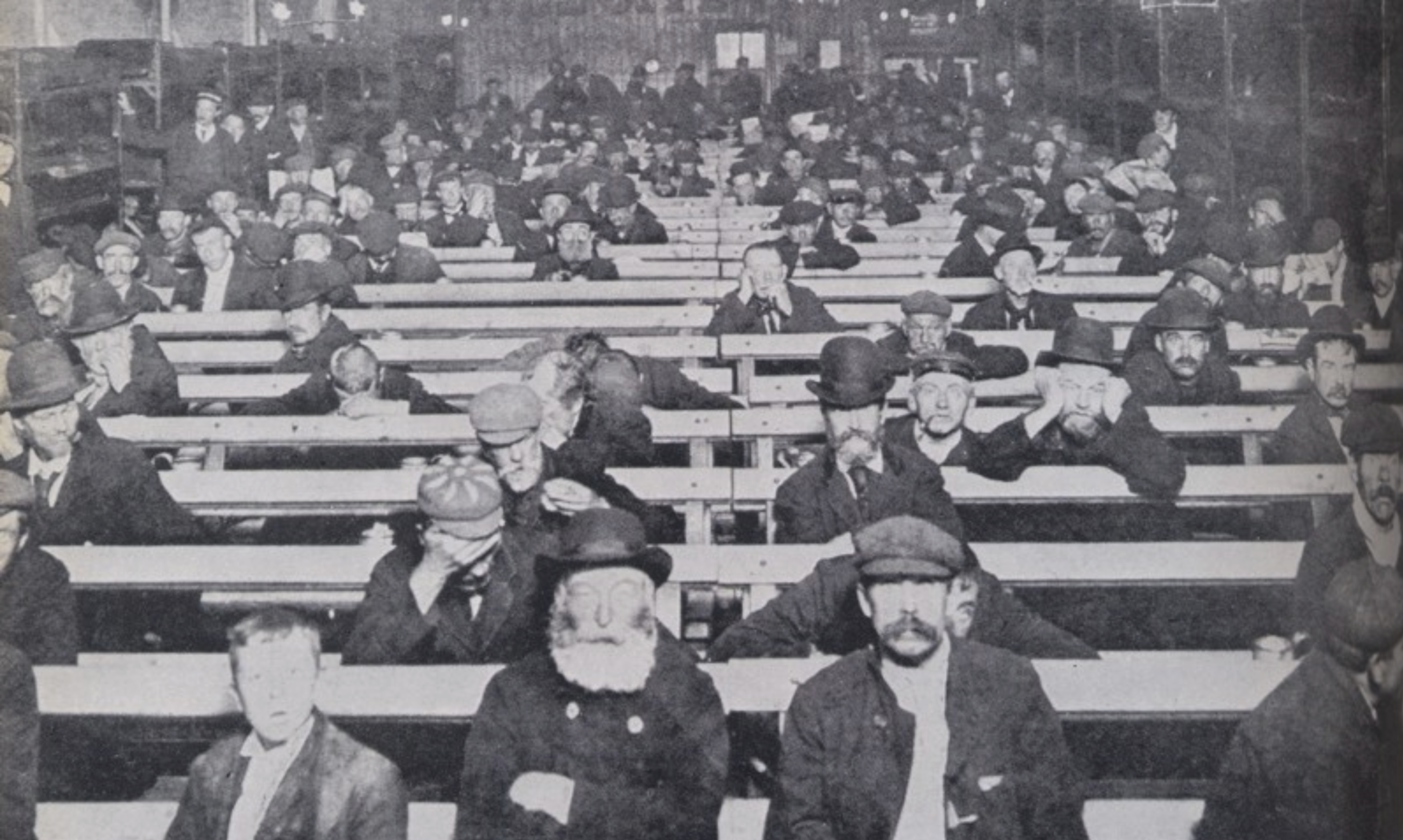
The Salvation Army shelter in Blackfriars, London, in the early 20th century. This photograph shows the Penny Sit-up for men, where the homeless could find shelter for a night sitting on a bench in exchange for a penny, but they could not lie down. Photograph by Ann Ronan Picture, Source.
The following story is Part II of 'Abdu'l-Bahá's encounters with the poor in London in the winter of 1912-1913, and it is a beautiful Christmas story. On December 25, 1912, 'Abdu'l-Bahá visits the Westminster Salvation Army Shelter. There are many different types of shelters in London at this time. In this shelter, unlike the one pictured above, for three pennies, homeless men can have a bed for the night, wash their clothes and eat breakfast. Every Christmas, the shelter provides a special Christmas dinner for those who have no family or friends. As 'Abdu'l-Bahá enters the very long hall, the 1,000 men who have just begun to eat, rise to greet Him. Lady Blomfield gives a short introduction, speaking about 'Abdu'l-Bahá's great love for the poor and the unlucky in life, His forty years of service for the Cause of Humanity, and closes by saying: "He is your brother, the elder brother of us all." 'Abdu'l-Bahá's address is poignant and, tactfully, very short, and the hungry men listen attentively to His words of 'Abdu'l-Bahá, many forgetting to eat while He speaks:
I feel tonight great joy and happiness to be in this place, because my meetings and callings have ever been mostly with the poor, and I call myself one of them. My lot has ever been with those who have not the goods of this world. When we look at the poor of humanity, we behold a World of brothers. All are the sheep of God; God is the real shepherd. The poor have ever been the cause of the freedom of the world of "humanity; the poor have ever been the cause of the upbuilding of the country; the poor have ever labored for the world's production; the morals of the poor have ever been above those of the rich; the poor are ever nearer to the threshold of God; the humanitarianism of the poor has ever been more acceptable at the threshold of God. "Consider his Holiness Christ: He appeared in the world as one of the poor. He was born of a lowly family; all the apostles of Christ were of humble birth and His followers were of the very poorest of the community. This is what Christ states in the Gospels. 'It is easier for a camel to go through the of a needle than for a rich man to enter into the Kingdom of God.' This testimony of Christ of the exaltation of the poor ones in the sight of God is sufficient. It is easy for the poor, very easy for them to enter into the Kingdom of God. In another place Christ speaks of the charity of the poor ones of the world as praiseworthy. The poor ones have capacity. They were favored at the threshold of God. If wealth were a necessity, Christ would have wished it for himself. He lived a simple life, and one of the titles of Bahá'u'lláh was 'the poor one.' In Persian His title was 'darvish' and that means one who has not a slave. All the prophets of God were poor, His Holiness Moses was a mere shepherd. This will show you that in the estimation of God, poverty is greater than the accumulation of wealth--that the poor are more acceptable than the lazy rich. A rich man who spends his wealth for the poor is praiseworthy. Consider that the poor are not born in a state of solvency; they are not tyrannous. All the tyranny and injustice in this world comes from accumulation. The poor have ever been humble and lowly; their hearts are tender. The rich are not so. Sorrow not, grieve not. Be not unhappy because you are not wealthy. You are the brothers of Jesus Christ. Christ was poor. For forty years He was imprisoned in poverty. The great ones of the world have come from a lowly station. Be ever happy; be not sad! Trust in God and if in this world you undergo dire vicissitudes I hope that in the Kingdom of God you will have the utmost happiness!
'Abdu'l-Bahá quoted in Star of the West Volume III, number 18
As He had done 8 months before at the Bowery in New York City, 'Abdu'l-Bahá had made preparations before coming to the Salvation Army Shelter. He had converted between 20-25 British Pounds into shillings to give to all the men present at the close of His talk. This very generous amount for the time, given that in 1913, according to Parliamentary debate notes from March 13, 1913, 32 % of adult workers earn less than 25 shillings a week. In today's currency and calculated for inflation, 'Abdu'l-Bahá's donation would be equivalent to £2,300 - £2,900, or $3,200 - $4,000. Colonel Spencer has a different idea, than giving each man a week's wage. Instead, he suggests using the lump sum to offer the men a second, similar dinner for New Year's Eve in 'Abdu'l-Bahá's honor. These men have only ever had one yearly feast, and this year, they would have two! 'Abdu'l-Bahá is pleased with this idea, and when Colonel Spencer announces that 'Abdu'l-Bahá has given him the money for a New Year's Dinner, the men rise from their seats and give 'Abdu'l-Bahá a twenty-minute standing ovation, waving their knives and forks around in a rousing farewell cheer and deafening applause. Afterwards, Colonel Spencer gives 'Abdu'l-Bahá and His entourage a tour of the Salvation Army shelter: large, clean halls, good beds. 'Abdu'l-Bahá leaves the shelter that night delighted.
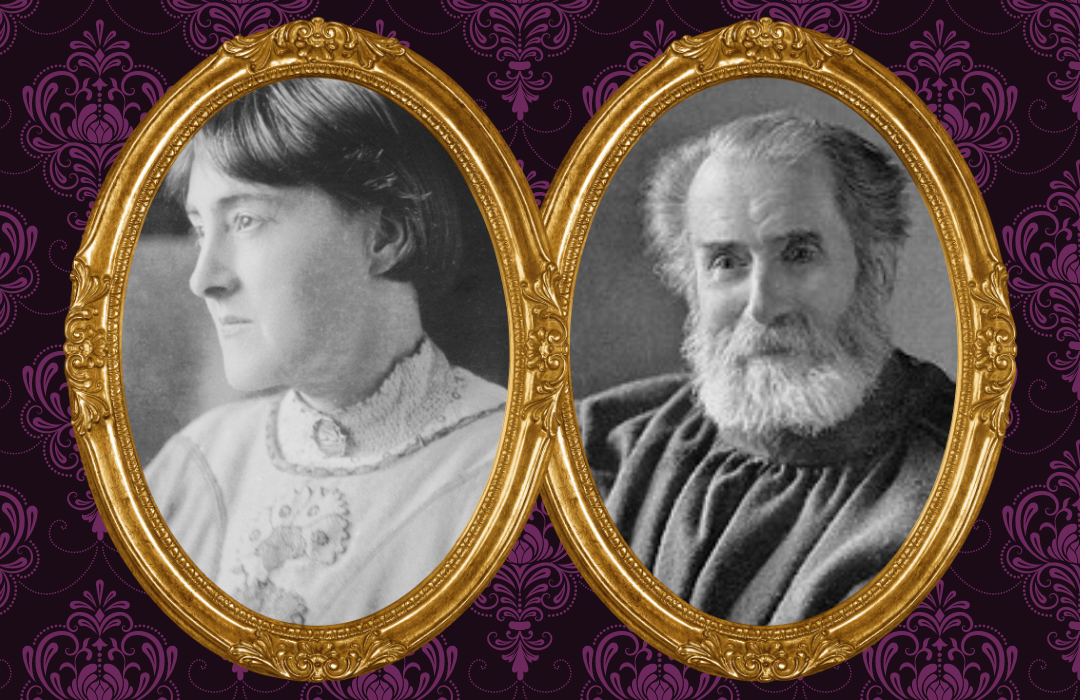
Elizabeth Gibson Cheyne and Thomas Kelly Cheyne circa 1911. Source.
'Abdu'l-Bahá's address at Manchester College
‘Abdu’l-Bahá and His entourage leave London at 10:50 in the morning and arrive in Oxford at 11:35. Thomas Kellly Cheyne has arranged the talk which takes place at three in the afternoon at Oxford University's Manchester College to an audience of professors, scholars and ministers. After a brief introduction, ‘Abdu’l-Bahá gives a masterful address, starting with science as the cause of man’s intellectual progress, which leads to an in-depth survey of the powers of perception. 'Abdu'l-Bahá follows this with an example of lack of perception, namely warfare, and poignantly asks His audience if the fundamental idea of Christianity have not been entirely forgotten, saying that the Balkan War is due to the fundamental basis of religion having been set aside. ‘Abdu’l-Bahá ends on an optimistic note: great universities are working on peace and reconciliation, mankind’s perception is becoming clearer, and His wish is for the audience to work for peace and unity in words and deeds in order to uproot the tree of warfare. Unusually, there are no questions when the floor opens. Professors come to shake ‘Abdu’l-Bahá’s hand, but it is T.K. Cheyne who is especially impressed. He will later write of 'Abdu'l-Bahá:
He was a complete man. No one in our time, so far as my observation reaches, has lived the perfect life like Abdul Baha.
Quoted in 'Abdu'l-Bahá in Britain page 92
The "spiritual philosopher" and the "angelic woman"
The most significant event of 'Abdu'l-Bahá’s visit to Oxford is not, however His address at Manchester College. This event had taken place in the hours preceding the talk. When 'Abdu'l-Bahá arrives in Oxford, He and His party head straight to “South Elms”, a sprawling property at 17 Parks Road, to spend a few hours with Thomas Kelly Cheyne and his devoted wife Elizabeth Gibson Cheyne. Thomas Kelly Cheyne, at 72 years old, is the foremost Western intellectual during 'Abdu'l-Bahá’s ministry. He is a highly-respected English theologian and Biblical critic with a Doctorate in Literature from Oxford University and becomes a Bahá'í five months before 'Abdu'l-Bahá’s visit through Ethel Rosenberg, the first British Bahá'í. Cheyne, at this point, has suffered from debilitating health for most of his life, lost sight in one eye in 1883, and for five years before 'Abdu'l-Bahá’s visit, he has suffered a progressive paralysis in his hands and feet, nevertheless publishing five books in this time period. As the paralysis progresses, it affects his throat, so few people can understand what he says, unless his loving wife Elizabeth translates for him. When ‘Abdu’l-Bahá arrives, He embraces the Doctor with loving grace, and praises his courageous steadfastness in his life’s work, despite declining health and increasing physical weakness, saying that the light of the mind and spirit shine through with radiant persistence through those veiling clouds. While they talk, Cheyne shows 'Abdu'l-Bahá what he has written about the Faith. Cheyne’s attentive attitude and faith so move the Master that 'Abdu'l-Bahá kisses him several times. In one of His last tablets to him in 1914, 'Abdu'l-Bahá calls T.K. Cheyne “my spiritual philosopher.” Cheyne himself, writing to Mr. Craven, a Bahá'í from Manchester on January 31, 1914 says:
Alláh’u’Abhá! Dear Baha'i brother... Why I am a Bahá'í is a large question, but the perfection of the character of Baha'u'llah and Abdu'l-Baha is perhaps the chief reason...
Quoted in 'Abdu'l-Bahá in Britain page 90, Note 464
'Abdu'l-Bahá then tells T.K. Cheyne a deeply prophetic story about another author, also affected in the throat, whose spirit also knew no defeat. It is the story of Abú Ḥamíd bin Abú Bakr Ibríhím, also known as ʿAṭṭár of Nishapur. ʿAṭṭár was a Persian poet and Súfi theoretician from the 12th-13th century who had an immense and lasting influence on Persian poetry and Sufism. He wrote a collection of lyrical poems and Manṭiq-uṭ-Ṭayr. "The Conference of the Birds" is his most celebrated work. 'Abdu'l-Bahá's story is fascinating. One day, ʿAṭṭár is traveling through the desert when he is set upon by thieves who rob him and injure his throat. Attar survives and reaches the city, where doctors attend to him. But the injury to his throat has rendered ʿAṭṭár mute. After the attack, he lives one more year, during which he writes the book that survives his entire legacy. The book in question is most probably Tazkirat al-Awliyá or "Biographies of the Saints", his only surviving prose work published shortly before his death. At the time 'Abdu'l-Bahá recounts this story, T.K. Cheyne is by this time also nearly mute, and, though he does not know it, only has two years left to live. During these two years, he, too, will write the one book that will outlive his legacy, his History of the Bahá’í Faith: The Reconciliation of Races and Religions. In the 1914 preface to this book, T.K. Cheyne writes a touching sentence:
'Abdu'l-Bahá (when in Oxford) graciously gave me a new name [Rúḥání (Spiritual)]. Evidently he thought that my work was not entirely done, and would have me be ever looking for help to the Spirit, whose “strength is made perfect in weakness."
Quoted in 'Abdu'l-Bahá in Britain page 90
Elizabeth Gibson Cheyne and Thomas Kelly Cheyne marry in 1911, two years before 'Abdu'l-Bahá's visit, when Elizabeth is 42 years old and Thomas, 70. Their marriage is happy, one of equals who share a passion for feminism, internationalism, universalism, and anti-racism, but they are most deeply bonded in their approach to God and spirituality. When 'Abdu'l-Bahá comes to visit, Elizabeth is at Thomas’ side, interpreting his inaudible answers, caring, devoted, solicitous. Her attitude deeply touches 'Abdu'l-Bahá, who, with tears in His eyes, tells Lady Blomfield and Mrs. Thornburgh-Cropper, on the train journey back to London:
She is an angelic woman, an example to all in her unselfish love. Yes, she is a perfect woman. An angel.
Lady Blomfield, The Chosen Highway
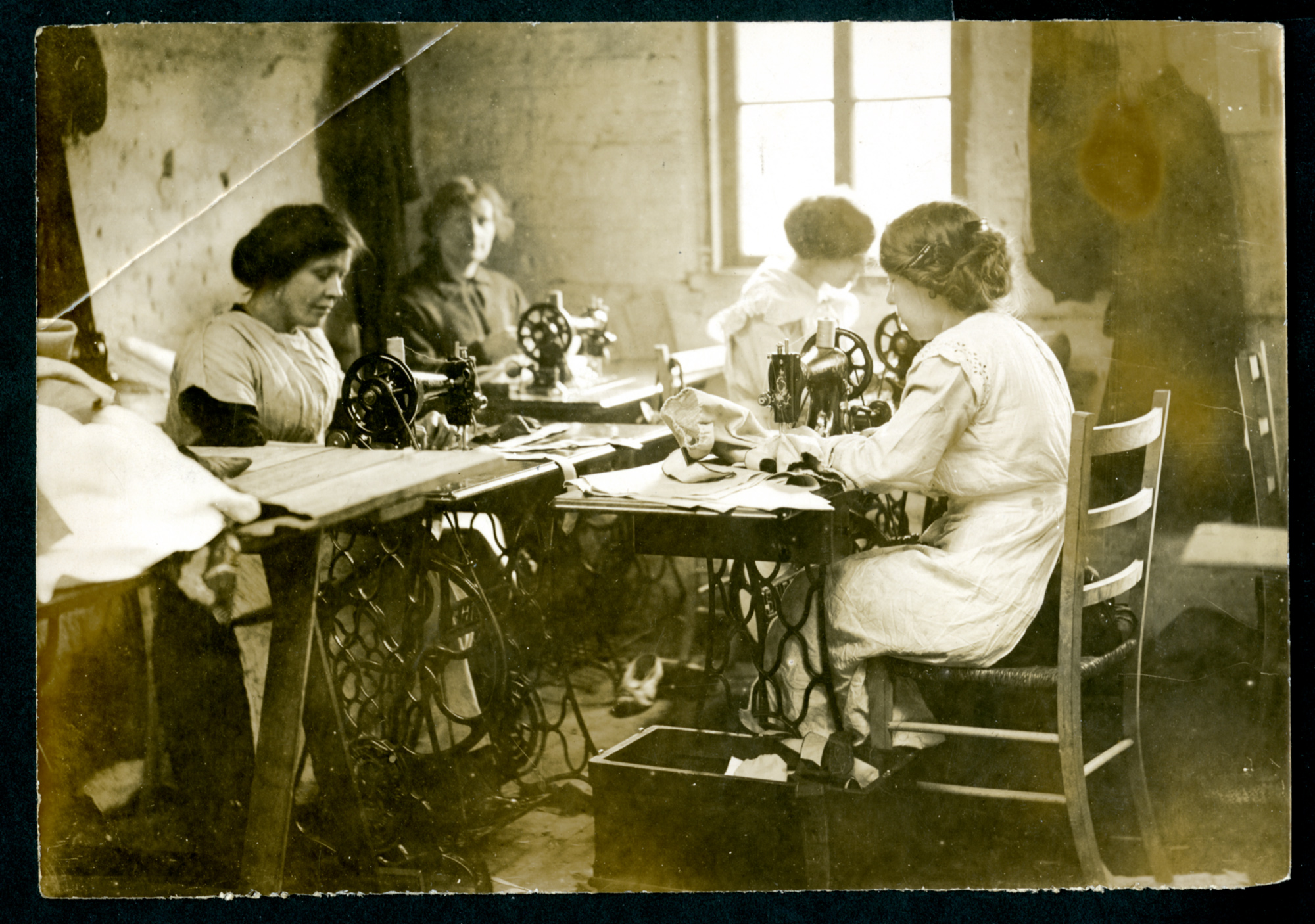
Working women, also suffragettes, in East London circa 1914-1915. Photograph from the Estelle Sylvia Pankhurst collection, International Institute of Social History (Amsterdam). From the British Library's article ‘"Women quite unknown’: working-class women in the suffrage movement."
On January 2, 1913, an automobile carries 'Abdu'l-Bahá and His party across the Albert Bridge and into the borough of Battersea, turning off from the main thoroughfare into narrow, dark, drizzling streets and stopping in front of the door of the Cedar Club House. Growing out of a club for factory girls started in the early 1880s, the Cedar Club House, now run by the women’s Service League, provides food to working mothers and their young children. The level of poverty encountered here by ‘Abdu’l-Bahá, is “unknown to American communities,” according to L. Heron Oliphant, who writes the report of this visit for Star of the West Volume III, number 18. The explanation Oliphant gives is that this extreme poverty in Europe is profoundly deep-rooted, generational, and highly resistant to any effort to alleviate it. Social workers and volunteers passionate about social justice and workers' rights, must have great spiritual strength to keep serving this community despite ever-present discouragement. This is where 'Abdu'l-Bahá chooses to spend His afternoon. They enter a large, warm, assembly room decorated throughout with red and green Christmas ornaments. Along the walls are two large tables where sixty women and about one hundred children are seated, and on the tables, trace evidence of the latter part of afternoon tea. Close to the door 'Abdu'l-Bahá has just passed through is a platform with all the requisite speaker paraphernalia, and where it is obvious everyone is expecting Him to speak from. But here is where 'Abdu'l-Bahá can convey immense empathy without every speaking one word. By ignoring the platform, and with His characteristic step, pacing up and down the center of the large assembly hall, 'Abdu'l-Bahá instantly establishes what Oliphant beautifully terms “the charm of comradeship.” All those present do not need to be told: He walks among them with perfect ease and comfort, into the body of the room, this Man is the real friend of the poor. As He paces, 'Abdu'l-Bahá’s eyes and smile radiate happiness, and as He mingles with them, His words are translated:
I am very glad to be among you, who are blessed in God's name with children. They are the true signs of his spiritual love. The most divine gifts of God. These little ones Will grow to be fruitful trees. We must look to them for the founders of many beautiful families. Let their education be directed in the ways of purity and useful service. Here are the seeds of the future race and upon them may be granted God's blessing.
Star of the West, Volume III, number 18 (7 February 1913), page 9
At the end of one table, 'Abdu'l-Bahá stops and pats the head of a pale little child, nestled its his mother’s arms. When the tiny hand stretches out towards Him, 'Abdu'l-Bahá gently closes it over a bright new shilling. Up and down the long rows of women and children, 'Abdu'l-Bahá bestows love, kindness, empathy, generosity to each. He pauses for a few moments and blesses each upturned faces, bestows on each a silver coin. His remarkably tender hands caress a baby’s cheek or chin. He offers words of comfort to the tiniest members of the audience, forgetting no one. Coming up on a mother whose twins are fast asleep, 'Abdu'l-Bahá leaves two pieces of silver underneath each of their chin, so that even those who sleep through will know they were not forgotten. As He does, two pairs of deep blue eyes open in wonder.
Not one of the hundred children present cry. Children are weary of strangers, but they are also sincere and spiritually attuned, particularly to the great spiritual power emanating from 'Abdu'l-Bahá. The women gaze thoughtfully at the figure of the Master, in his sparklingly white turban and brown ‘abá, so at home here, moving among them. Poor people have good reason to be suspicious of foreigners coming into their neighborhoods, particularly those with a religious mission, but 'Abdu'l-Bahá brings with Him such a profound embodiment of "deeds, not words," that it crushes the barrier of preconceived ideas. All the Master encounters in the faces of those present this afternoon are expressions of tolerance, gratefulness and understanding. A round of deafening applause marks 'Abdu'l-Bahá’s farewell. In the automobile taking Him home, He tells His companions:
I am truly happy when among the gatherings of the poor. It brings full joy to my heart. I come in contact with those in high stations of life, and those rich in possessions, but my joy is in being with those who are in material poverty, for their sufferings draw them nearer to God in spiritual gain.
Star of the West, Volume III, number 18 (7 February 1913), page 10
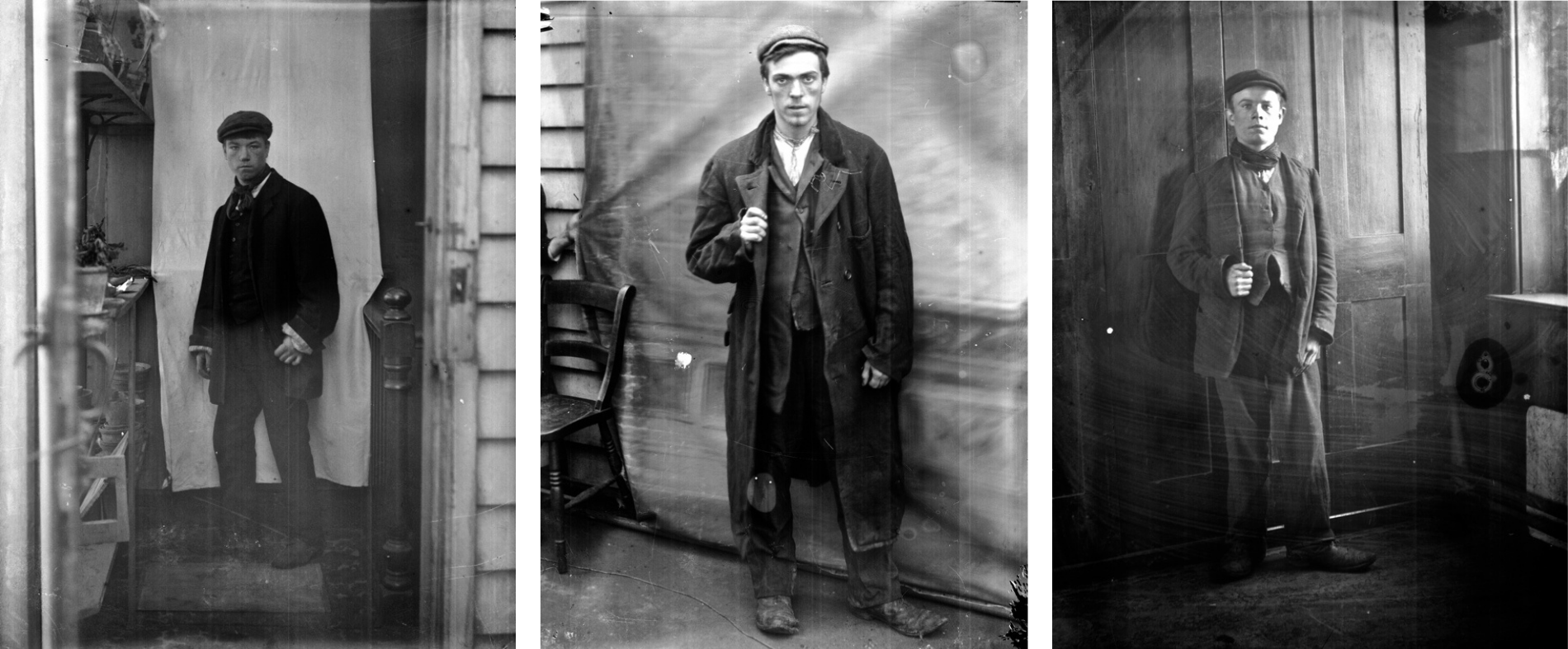
Three portraits of young men living at the Working Lads Institute around 1900. The Institute founded in 1876, offered a home to men who were involved in petty crimes, rehabilitating them through serving the poor and needy in the Whitechapel neighborhood of London. Later the young men could look for a job with the support and recommendation of the Institute. Photograph from the marvelous blog Spitalfields Life: Whitechapel Lads, used with permission.
As 'Abdu'l-Bahá, the Center of the Covenant, has been moving through continents, countries, and cities, powerful spiritual forces affect receptive people in a variety of ways. Jim Loft falls off a fence as He sees 'Abdu'l-Bahá, an 18-month-old William Sears starts having dreams of 'Abdu'l-Bahá for decades the day 'Abdu'l-Bahá speaks in Minneapolis, 300 kilometers away, a woman in America takes the steamship to Paris after her daughter shows her the photograph of 'Abdu'l-Bahá. This is one such story.
On January 4, 1913, 'Abdu'l-Bahá is speaking with guests when a man arrives at the door and asks “Is the lady of this house within?...Oh please, I must see her!" Lady Blomfield overhears the man and enters the hall. The man asks: "Are you the hostess of 'Abdu'l-Bahá?" Lady Blomfield answers: "Yes, do you wish to see me?" And the man responds: "I have walked thirty miles for that purpose." Ever the perfect hostess, Lady Blomfield invites the man to come in for rest and refreshment before he continues his story. The man’s appearance is that of a homeless person, but when he starts to speak, Lady Blomfield perceives something much deeper:
I was not always as you see me now, a disreputable, hopeless object. My father is a country rector, and I had the advantage of being at a public school. Of the various causes which led to my arrival at the Thames embankment as my only home, I need not speak to you. Last evening I had decided to put an end to my futile, hateful life, useless to God and man! Whilst taking what I had intended should be my last walk, I saw “a Face” in the window of a newspaper shop. I stood looking at the face as if rooted to the spot. He seemed to speak to me, and call me to him!
Lady Blomfield, The Chosen Highway
Lady Blomfield asks:
Let me see that paper, please.
It is the face of 'Abdu'l-Bahá. The man continues:
I read that he is here, in this house. I said to myself, "If there is in existence on earth that personage, I shall take up again the burden of my life.'" I set off on my quest. I have come here to find him. Tell me, is he here? Will he see me? Even me?"
Lady Blomfield responds:
Of course He will see you. Come to Him.
She leads the man to the room where ‘Abdu’l-Bahá receives visitors and knows. 'Abdu'l-Bahá Himself opens the door and greets him like a dear friend He has been expecting.
Welcome! Most welcome! I am very much pleased that thou hast come. Be seated.
The man, by now trembling, sinks down onto a low chair by 'Abdu'l-Bahá’s feet, unable to utter a word, as the other guests present seem fascinated by the unusual-looking new arrival. 'Abdu'l-Bahá holds one of the man’s hands, tenderly stroking the man’s bowed head with His other hand, and, smiling, says with loving compassion:
Be happy! Be happy! Do not be filled with grief when humiliation overtaketh thee. The bounty and power of God is without limit for each and every soul in the world. Seek for spiritual joy and knowledge, then, though thou walk upon this earth, thou wilt be dwelling within the divine realm. Though thou be poor, thou mayest be rich in the Kingdom of God.
As 'Abdu'l-Bahá speaks His words of comfort, strength, and healing, the man’s unhappiness appears, to Lady Blomfield, to melt away, in the warmth of the Master’s presence. When the man finally rises to leave 'Abdu'l-Bahá, Whom he has walked fifty kilometers to see, there is a new look on his face, his posture is straighter, his steps are more assured. He asks Lady Blomfield:
Please write down for me His words. I have attained all I expected, and even more.
And now what are you going to do?
I'm going to work in the fields. I can earn what I need for my simple wants. When I have saved enough I shall take a little bit of land, build a tiny hut upon it in which to live, then I shall grow violets for the market. As He says `Poverty is unimportant, work is worship.' I need not say "thank you," need I? Farewell.
And the man leaves as suddenly as he came in.
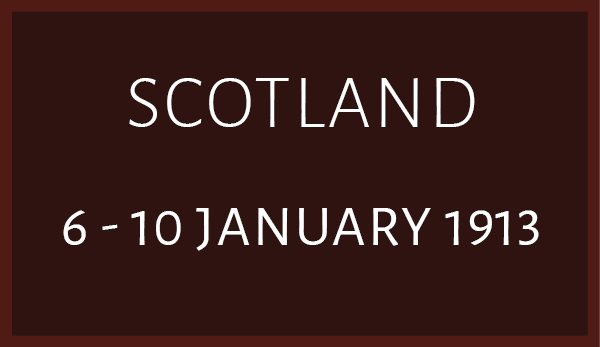
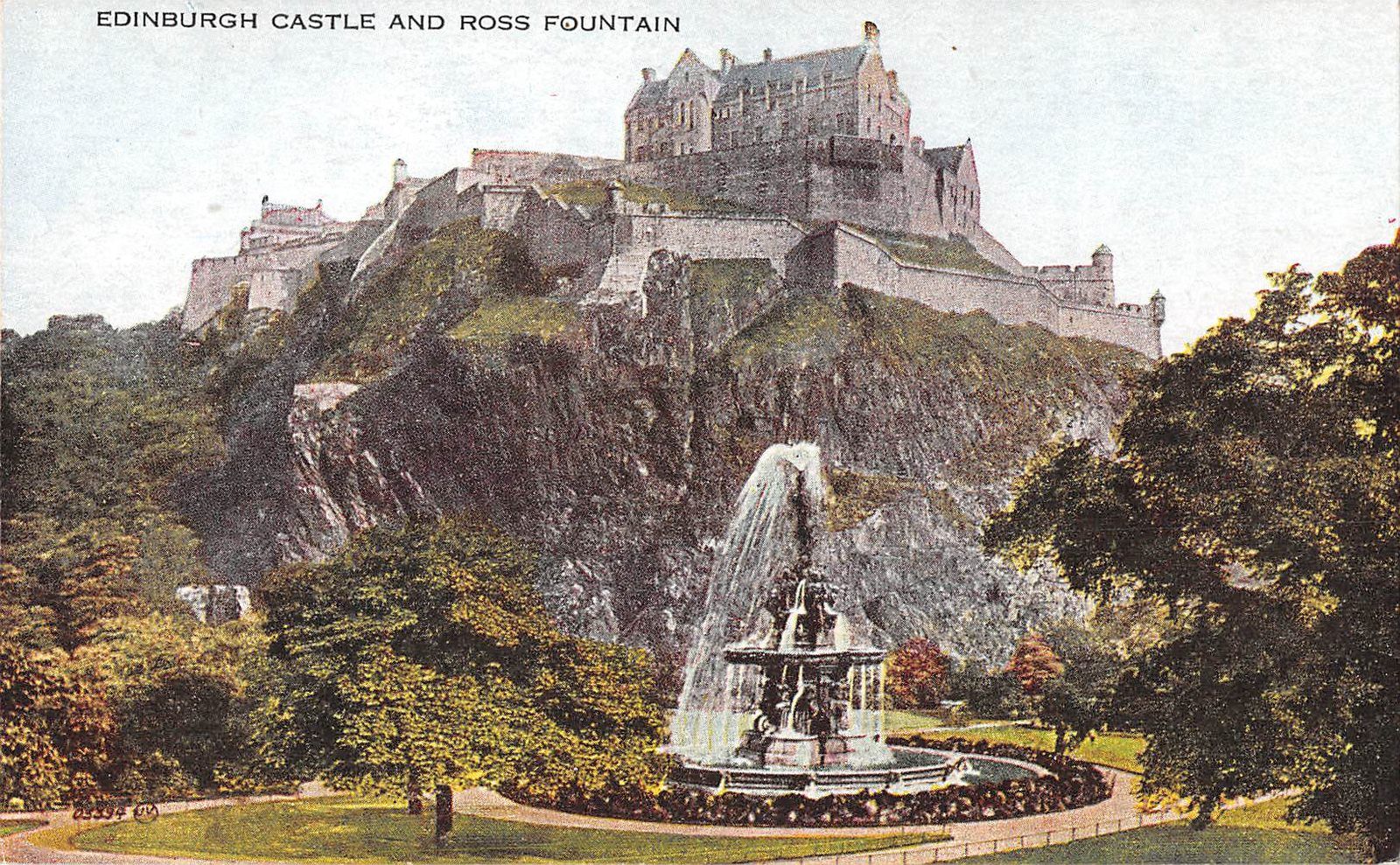
A postcard view of Edinburgh Castle. Source.
'Abdu'l-Bahá, accompanied by Hájí Amín, Mírzá Mahmúd-i-Zarqání, Mírzá Ahmad Sohrab, Siyyid Asadu’lláh-i-Qumí, and Lutfu'lláh Hakím (who will be elected to the first Universal House of Justice in exactly fifty years' time) leave London at 10 o’clock in the morning and cross England south to north, to Scotland. In the afternoon, as the train is approaching Edinburg, 'Abdu'l-Bahá assembles His party, and tells them:
We are now coming to Edinburgh, and this is the beginning of the diffusion of Divine fragrances there. You must consort with all the people with such devotion, radiance and spirituality, that all may testify that you are of heaven, and the servants of the Kingdom of God: that your hearts are illumined: and your souls adorned with the mysteries of the Kingdom.
'Abdu'l-Bahá quoted by Mahmúd-i-Zarqání, from 'Abdu'l-Bahá in Britain, page 116
This small moment on a moving train gives us a valuable insight into how 'Abdu'l-Bahá Himself sees part of what it is He was trying to accomplish in the West, and an even more valuable inkling into how He conveys His vision and mission to those around Him. In our limited vocabulary, we generally tend to call "diffusion of Divine Fragrances" by a more commonplace and less evocative expression, "teaching the Faith." But it is very valuable to pause for a moment and contemplate how Bahá'u'lláh, the Manifestation of God for this age, and 'Abdu'l-Bahá' the son of Bahá'u'lláh, the Center of His Covenant, the Perfect Exemplar of His teaching and foremost teacher of His Faith speak about this sacred duty enjoined upon us in the Kitáb-i-Aqdas. This very abridged collection of terms and phrases for teaching have been collected by us over a long period of time from the Tablets and prayers of Bahá'u'lláh and 'Abdu'l-Bahá that speak about teaching the Faith (For the full list, see here):
Advance the oneness of the world of man
Aid souls to reach the shore of the sea of faith
Attract all the hearts to the Kingdom of God
Bestow a heavenly spirit upon souls
Dispel the dark clouds so that the Sun of Truth may shine forth with the utmost intensity
Exhilarate and rejoice all the nations and peoples with the song of the love of God
Guide the nations and peoples of the world; Herald the Covenant
Illuminate the hearts with the splendor of knowledge
Make the melody of universal peace to reach the ears of the East and the West
Make the morning’s light to dawn in the hearts of the righteous
Promote the fundamental of universal peace and the divine principles
Promote the oneness of the world of humanity
Scatter the holy seed of the Teachings
Shed the light of Divine guidance upon souls
Teach the inner meanings of the [God’s Holy Books] with eloquence, understanding, vigor and skill
Unfurl the flag of the oneness of the world of humanity
Utter the praises of God and His attributes
'Abdu'l-Bahá's stay in Edinburgh, Scotland is significant, because, along with His ten-day stay in Hungary, it is a well-documented visit by 'Abdu'l-Bahá in a city seeing the "beginning of the diffusion of Divine fragrances," in other words, where the Faith is in its infancy. In Scotland, there is only one Bahá'í at the time of 'Abdu'l-Bahá's visit, Jane Whyte, and in Hungary, there are none.
The source for all the stories in this section are from Ahmad Sohrab's exhaustive daily diary, exceedingly well-annotated by David Merrick with a treasure trove of precious resources, and the result is a relatively complete picture of 'Abdu'l-Bahá "scattering the holy seed of the Teachings" in near-virgin territory.
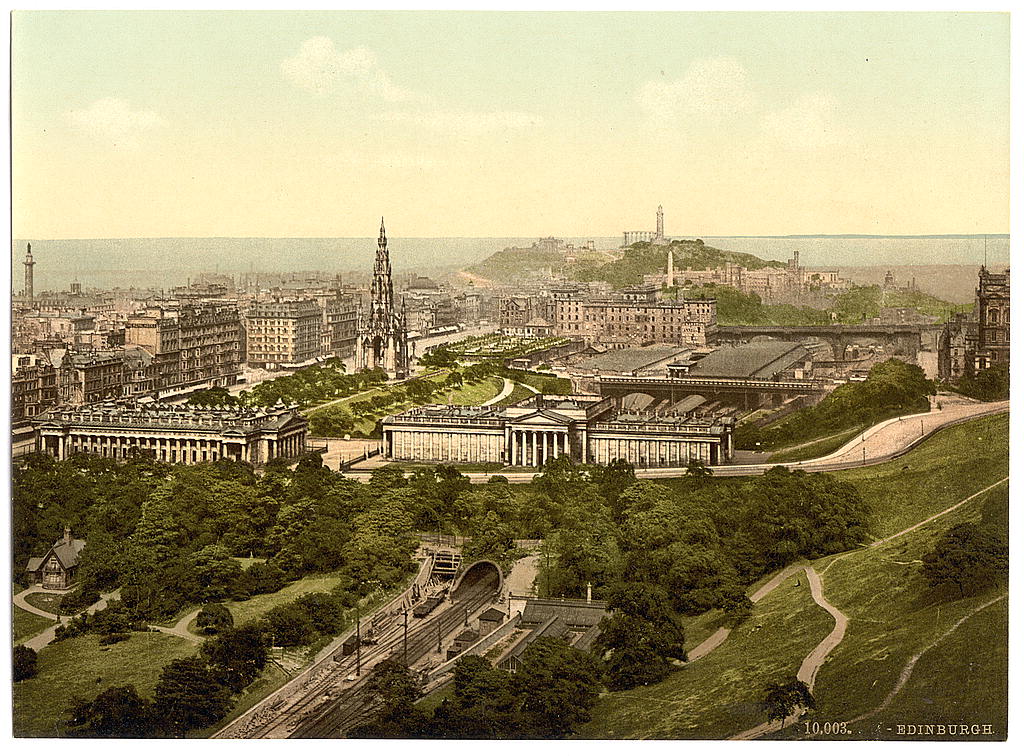
Edinburgh, Scotland viewed from the castle between 1890 and 1900. Source: Library of Congress.
Shortly after this, when 'Abdu'l-Bahá’s train pulls in at Edinburgh’s Waverley station, He is met by Jane Whyte, the first Scottish Bahá’í, Isabel Fraser and several other friends. During His stay in Scotland, 'Abdu'l-Bahá remains at the home of Jane and Dr. Alexander Whyte, Moderator of the General Assembly Free Church of Scotland and principal of the Divinity Faculty of Edinburgh University.
Jane Whyte had come on pilgrimage in March 1906 with Mrs. Thornburgh-Cropper. Before leaving, she had consulted with Professor Edward Granville Browne as to visiting 'Abdu'l-Bahá, then a prisoner of the Ottomans in ‘Akká. Browne’s reply had been: “Certainly, do not refuse so great an opportunity.”
And so Jane Whyte spent three days on pilgrimage. She was deeply affected by her pilgrimage and wrote eloquently about it afterwards. She would remember for a long time the figure of a seven-year-old boy, kneeling “in rapt adoration” before the Threshold of the Shrine of Bahá’u’lláh, the thought crossing her mind:
“What destiny lies before this boy?”
The 9-year old boy she saw was Shoghi Effendi.
Unable to have the farewell conversation with 'Abdu'l-Bahá she had wished for, she instead leaves Him a letter for 'Abdu'l-Bahá in which she says, among many other things, “I am a Christian.”
Upon her return to Scotland, Jane Whyte receives an extraordinary, now-famous Tablet from 'Abdu'l-Bahá. In it, 'Abdu'l-Bahá addresses Jane “O, captive of the love of God!” To her above-mentioned statement, 'Abdu'l-Bahá responds “O would that all were truly Christian! It is easy to be a Christian on the tongue, but hard to be a true one.”
And then, ‘Abdu’l-Bahá writes one of His masterpieces, a passage commonly known as “The Seven Candles of Unity.” You can listen to this passage, recited in its original Persian with transliteration and English subtitles by pressing on the graphic below:
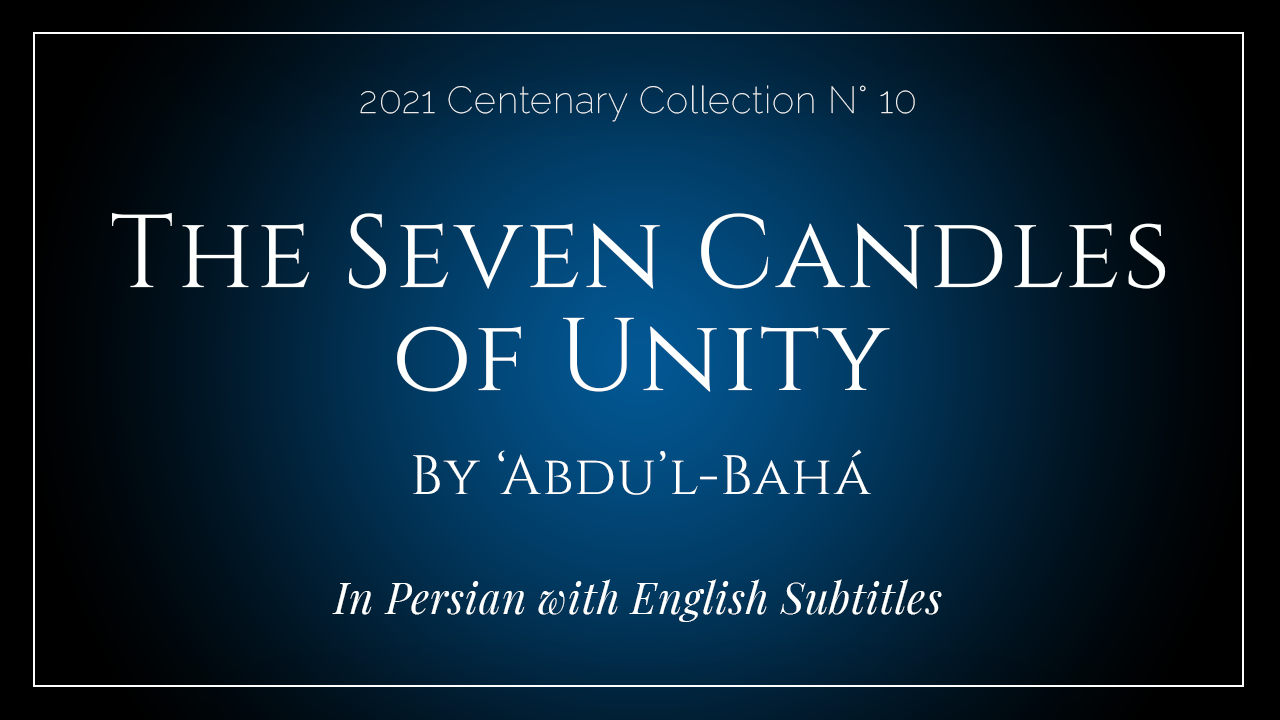
Click on the image above to hear an excerpt from 'Abdu'l-Bahá's Tablet to Mrs. Jane Whyte of Edinburgh, the famous passage known as The Seven Candles of Unity, recited in Persian with transliteration and English subtitles.
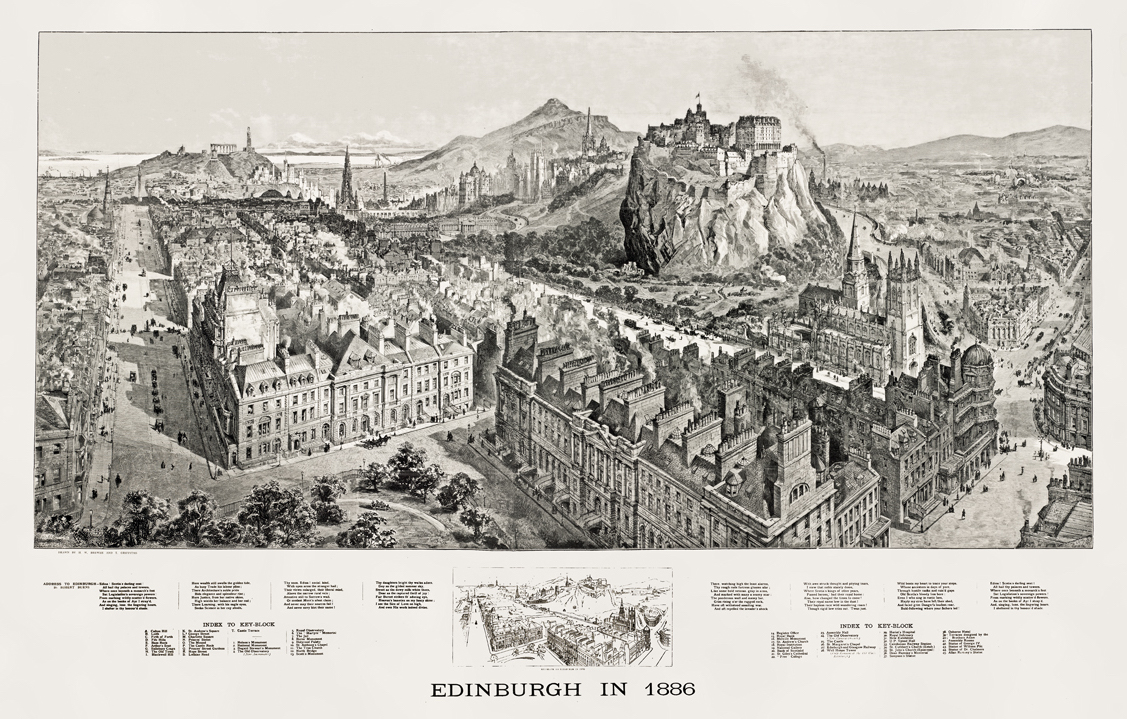
Panorama of Edinburgh in 1886. Source.
Isabel Fraser, who writes many of the articles published in Star of the West during 'Abdu'l-Bahá's visit, has come up to Scotland in advance as a sort of informal press agent, to contact local newspapers and publicize 'Abdu'l-Bahá's arrival. When she arrives in Edinburgh, she visits several editors and gives them literature about the Faith and articles to print.
One editor tells her: "The people of Scotland cannot realize what a wonderful event has happened in the history of Scotland. But I know and appreciate and will do everything to bring the principles of this Cause before the attention of the public." Isabel and the Whytes have diligently publicized 'Abdu'l-Bahá’s arrival in Edinburgh in three newspaper articles over a two-week period before His arrival, and so when the Master finally comes to Edinburgh, journalists are there to report on it.
After dinner, ‘Abdu’l-Bahá meets with several personalities: the Secretary of the Esperanto Society, the general Secretary of the Theosophical Society, several professors and many clergymen, accompanied by their wives. 'Abdu'l-Bahá speaks about his journey to America from Alexandria, about taking the RMS Cedric instead of the Titanic, and then moves on to much deeper subjects, on which He speaks at length and in great detail: the teachings of God for this age, the appearance and subsequent rejections of all the Manifestations of God of the past, the concept of unity, which only the power of the Holy Spirit can realize, through its eternal bond, binding the hearts of men.
'Abdu'l-Bahá also addresses current conflicts between nations and religions, based, for the most part on misunderstandings, and finally, causes a great stir among His devoted Christian audience by recounting in great detail His address to the Jewish community at Temple Emmanu-El in San Francisco. The guests regale 'Abdu'l-Bahá with an old Scottish song before He retires for the night.

Four sites visited by 'Abdu'l-Bahá in Edinburgh on January 7, 1913: Top left: the Outlook Tower (source); Top right: Holyrood Palace Arthur's Seat (source); Bottom left: Princes Street (source); Bottom right: the University of Edinburgh, photograph depicting Old College Quadrangle, University of Edinburgh (source).
Around 10:30 in the morning, many visitors start arriving to visit with 'Abdu'l-Bahá, some bringing children (one of them in traditional Scottish attire), and others to receive blessings. At 11 o'clock, Sir William Stowell Haldane, Scottish Development Commissioner, sends his magnificent car for ‘Abdu’l-Bahá to see the sights of Edinburgh: 'Abdu'l-Bahá is taken on a tour of the Outlook Tower, led by its President, Sir Patrick Geddes.
'Abdu'l-Bahá climbs the five flights of stairs to admire the panoramic view of Edinburgh, then witnesses a Camera Oscura projection of the panorama onto a large revolving table-top canvas. Other sites 'Abdu'l-Bahá sees on his driven tour are the Royal Mile, a succession of majestic streets in the city, Holyrood Palace, the British monarch's official residence in Scotland, perched atop of Arthur’s Seat, an ancient volcano. Later in the morning, 'Abdu'l-Bahá walks through a nearby garden, then down to Prince's Street, returning home to rest.
Around 5 in the afternoon, foreign students begin to arrive at the Whyte's home. At first, 'Abdu'l-Bahá meets them in a small drawing room, but when the crowd swells, they move to the large library. Approximately 200 students are present at this event, hailing from 15 Asian countries. Dr. Whyte's introduction of 'Abdu'l-Bahá is profound:
"Dear and honoured Sir, I have had many meetings in this house, but never have I seen such a meeting. It reminds me of what St Paul said, “God hath made of one blood all nations of men" and of what our Lord said, "They shall come from the East and the West, from the North and the South, and shall sit down in the Kingdom of God.'"
An Indian student speaks about the positive effects of the Bahá'í Faith, followed by a Syrian student who speaks about peace and brotherhood, then ‘Abdu’l-Bahá speaks on the oneness of religion. After the talk, a Persian student thanks 'Abdu'l-Bahá on behalf of the students and is met with applause, then the Master speaks in private to three Egyptian students.
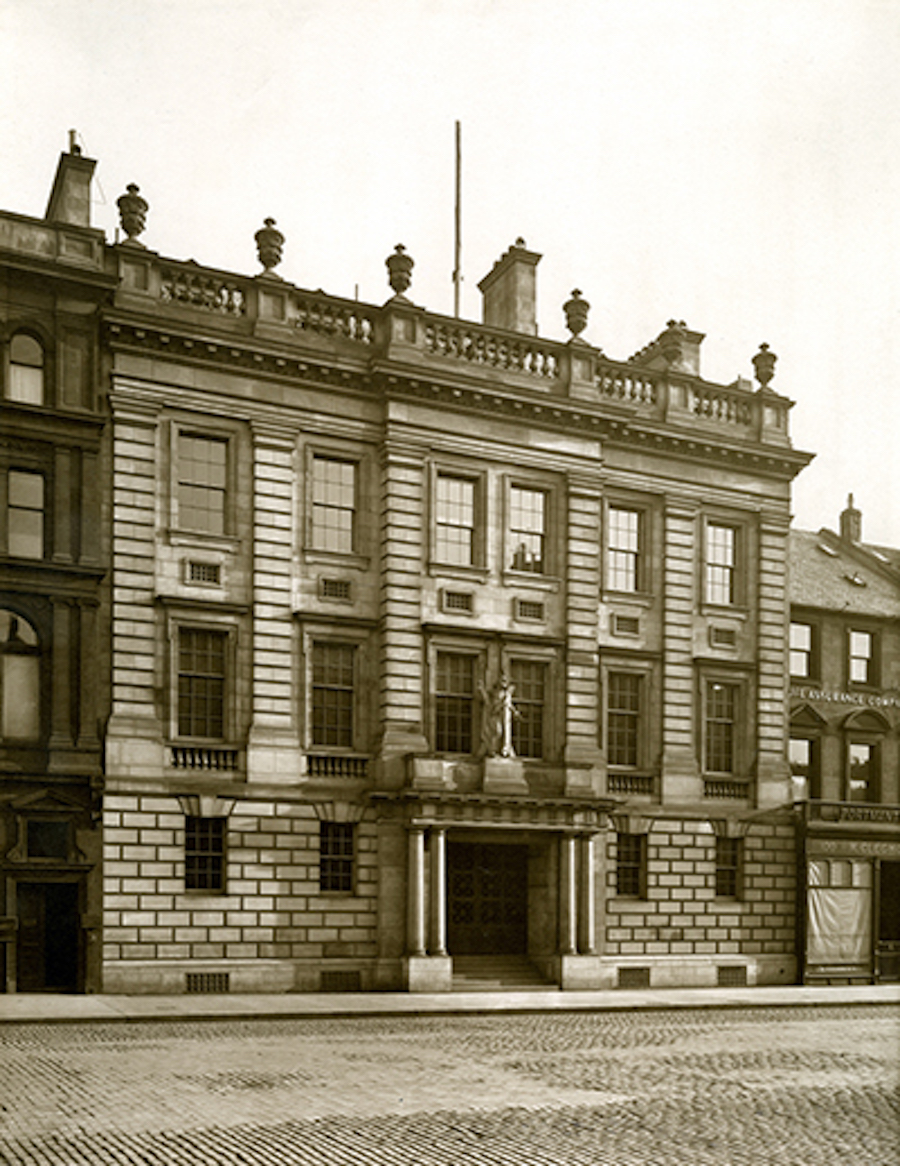
Freemasons' Hall at 96 George Street, Edinburgh, shortly after being completed in 1912, one year before 'Abdu'l-Bahá gives a speech in this same building. Architect: Brother C. Hunter Crawford. Photograph courtesy of the Grand Lodge of Scotland, used with permission.
On the evening of January 7, 1913 'Abdu'l-Bahá's gives His first public address in Scotland, hosted by the Edinburgh Esperanto society at the newly-built Freemasons’ Hall. As 'Abdu'l-Bahá arrives, the 100-person auditorium is filled to capacity and 300 people are waiting outside to come in. Every seat is taken, people are standing in the aisles, and reporters are seated around two tables. 'Abdu'l-Bahá takes His place on the platform, where are also seated three rows of prominent professors, scholars and clergymen of Edinburgh. 'Abdu'l-Bahá delivers a stirring speech on the need for a universal language, punctuating His address with funny stories that send the audience into fits of laughter, weaving these stories into a larger, eloquent narrative on unity and the benefits of a universal auxiliary language. At the end of His address, 'Abdu'l-Bahá speaks with several of those seated on the platform, and shakes hands with more than 200 people before returning home and being interviewed by a reporter.
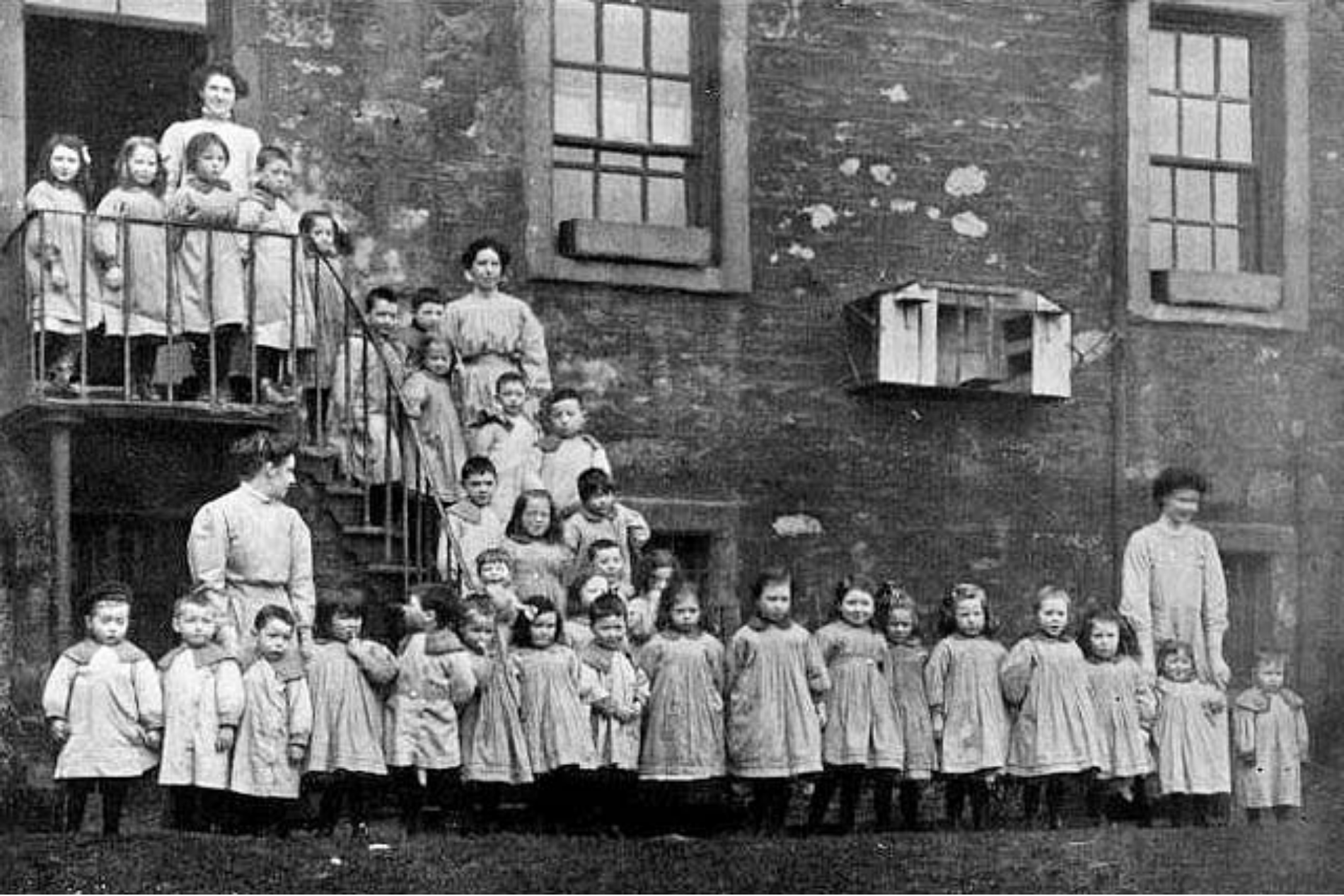
St Saviour's Child Garden, pictured here during a school muster in 1912 (source)
‘Abdu’l-Bahá continues to receive visitors after dictating many cables to Persia in the morning. A Muslim medical student from India wants 'Abdu'l-Bahá to officiate his wedding to a Scottish girl, but the license takes ten days to obtain from the city Registrar, and 'Abdu'l-Bahá leaves in just three days. Sir William Haldane car takes 'Abdu'l-Bahá to the Edinburgh College of Arts, where He admires the work of art students, then to North Canongate School, a school in a poor neighborhood for children ages 6-12.
This is 'Abdu'l-Bahá's fifth encounter with the poor in Britain in the winter of 1912-1913. 'Abdu'l-Bahá enters the school, and paces in the long cafeteria hall where the children are eating lunch, boys on one side and girls on the other. 'Abdu'l-Bahá is very pleased with His visit and praises the teachers for their service and self-sacrifice.
During His visit, the children sing 'Abdu'l-Bahá some nursery rhymes, and He, in turn, prays for them. The Master wins the hearts of the children, in the words of the principal Andrew Young, "with his great generosity and kindness." When 'Abdu'l-Bahá leaves North Canongate, He and His party walk to St Saviour's Child Garden, a kindergarten located a block away, trailed by a large band of North Cannongate children who are somehow under the impression that 'Abdu'l-Bahá is a special envoy of the King of England!
The toddlers at St Saviour's welcome 'Abdu'l-Bahá and the delighted teacher gives Him a tour of the kindergarten. 'Abdu'l-Bahá tells the teacher that her work is noble, and should be appreciated by everyone, that she is serving the future generation, and offers her His prayers for her confirmation and assistance. As 'Abdu'l-Bahá and His party get in the car to leave, hundreds of children wave farewell to the "King's Commissioner!"
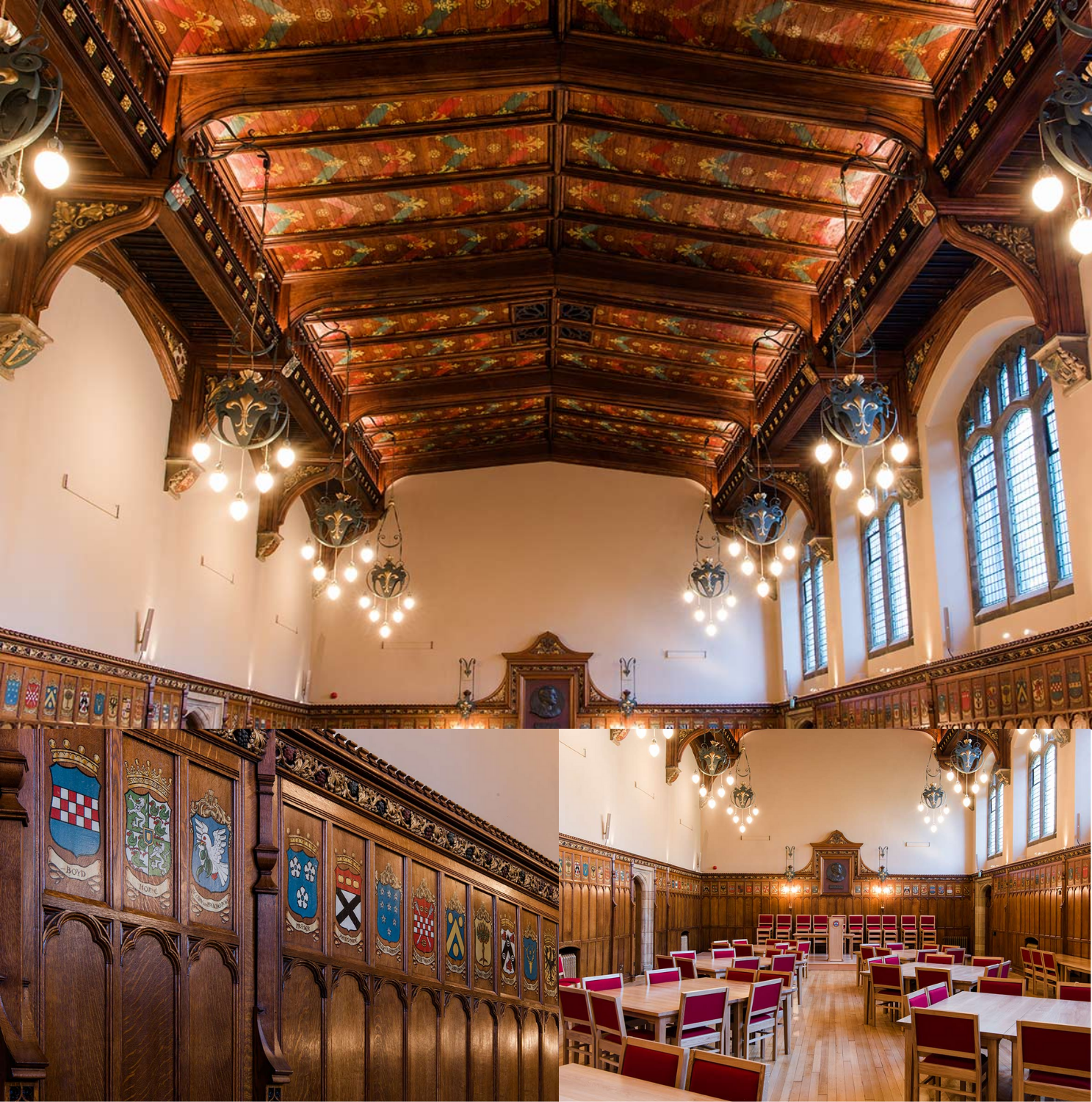
University of Edinburgh's Rainy Hall, the large dining hall with the world-famous ceiling where 'Abdu'l-Bahá gave a well-attended talk on January 8, 1913, on His second-to-last day in Scotland. Photographs courtesy of Ashwood Scotland Ltd. Please visit the page showcasing their restoration work of Rainy Hall for very fascinating details about the location.
'Abdu'l-Bahá gives His first talk of the day at Rainy Hall at New College, a renowned center for theological studies, and asks the audience, a mere nineteen months before the outbreak of World War I:
What is this native land, this fatherland that we glory over so much? We live but a few years on the surface of the earth; afterwards it becomes our eternal cemetery, as is has been the cemetery of all men and women that have lived since Adam. In the circumstances, is patriotic prejudice worth all the division it has caused?
Quoted in Anjam Khursheed, The Seven Candles of Unity, page 112 (Earl Redman, 'Abdu'l-Bahá in Their Midst)
After His address, the Reverend A. B. Robb makes quite an astute comment to 'Abdu'l-Bahá:
We have been in the habit of sending missionaries from the West to the East to preach the Gospel. Today we have a missionary from the East to preach the old Gospel in a new and original way. After all, it is not the words which have impressed us so much as the life. He has a right to speak, for He has spent forty years of His life in prison for the sake of the truth which was revealed to Him.
Quoted in Balyuzi, 'Abdu'l-Bahá, the Centre of the Covenant of Bahá'u'lláh pages 365-366 (Earl Redman, 'Abdu'l-Bahá in Their Midst)
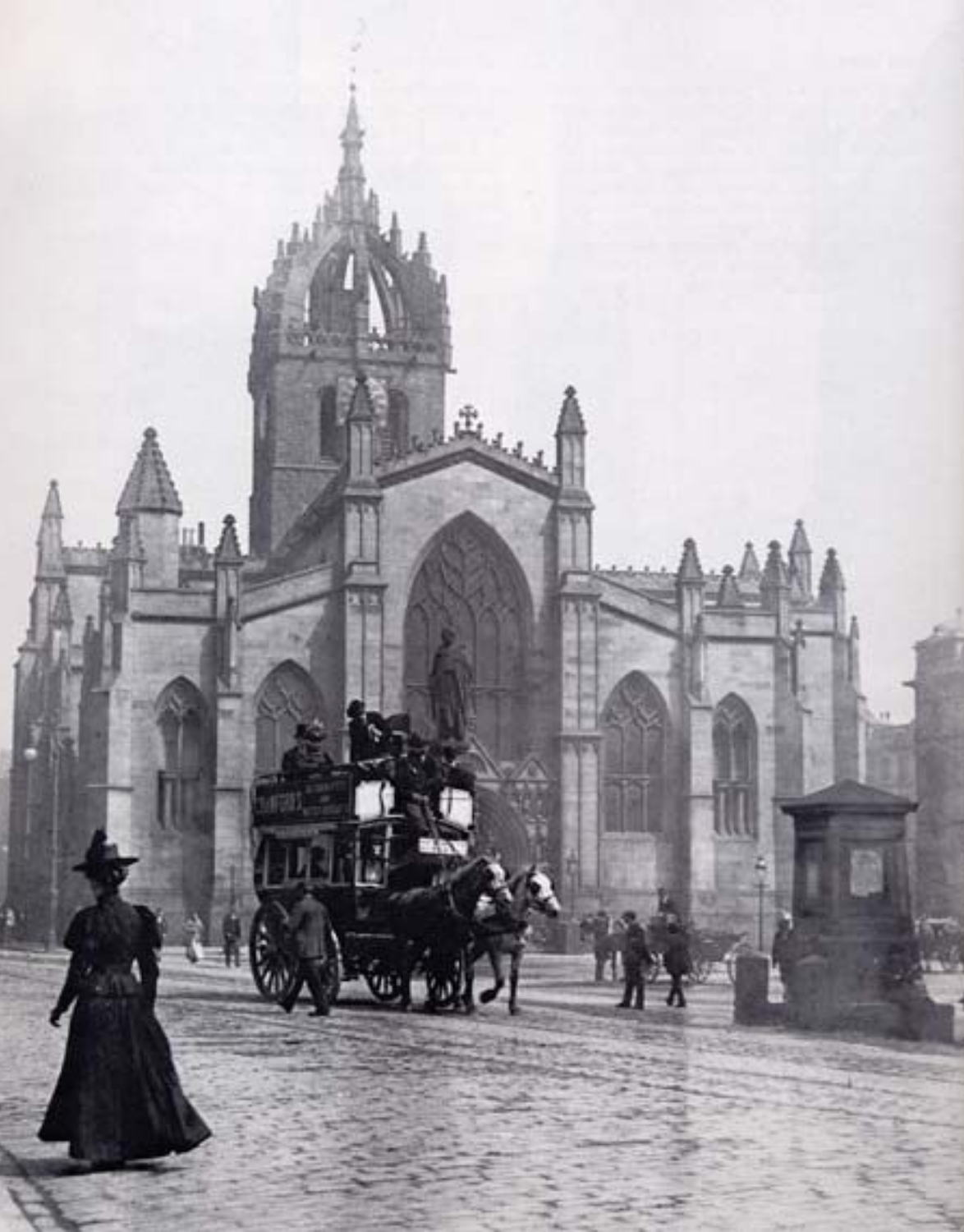
St. Giles Cathedral in Edinburgh, Scotland, date unknown. (Source).
After His talk at Rainy Hall, 'Abdu'l-Bahá returns home to rest briefly, then, at 8 in the evening, He attends a performance of Handel's Messiah at St. Giles' Cathedral, one of the most important medieval parish church buildings. This unusual locale and event is, in fact, the setting for 'Abdu'l-Bahá's sixth encounter with the poor in Britain in 1912-1913. The concert He attends this evening is for the benefit of the poor. As 'Abdu'l-Bahá takes His place in the front row of the gallery, thousands of Edinburgh's poor population, seated in the church, turn to look at Him. 'Abdu'l-Bahá listens carefully to the two-hour performance, yet another performance He attends which references Bahá'u'lláh's appearance indirectly, the first being the play Eager Heart. Handel's Messiah lyrics were all taken directly from the Holy Bible. The Messiah is much more than simply a musical masterpiece. Handel's lyrics are 52 individual Bible verses from both the Old and the New Testament and they include “Prepare ye the way of the Lord, make straight in the desert a highway for our God,” "And the glory of the Lord shall be revealed," "But who may abide the day of His coming?" but most magnificently, this verse from Psalm 24:7-10: "Lift up your heads, O ye gates, and be ye lift up, ye everlasting doors, and the King of Glory shall come in. Who is this King of Glory? The Lord strong and mighty, the Lord mighty in battle. Lift up your heads, O ye gates; and be ye lift up, ye everlasting doors; and the King of Glory shall come in. Who is this King of Glory? The Lord of Hosts, He is the King of Glory." It is beyond the scope of this effort to share all the lyrics here, but we encourage you to read them for yourself here. Below is the entire section relating this event from Adib Taherzadeh's 1963 "'Abdu'l-Bahá in Edinburgh," taken, not from the diary of Ahmad Sohrab, but from the diary of Mírzá Mahmúd-i-Zarqání for this day:
'Abdu'l-Bahá enjoyed the programme very much, and when He returned, said, "It was a good meeting. I saw the poor people were happy. The hearts of the poor are very tender, and so they are hurt easily. Once, in Baghdad, a poor man visited us. He sat on a small carpet. Putting his hands on it, he said to me, 'I suppose one can sleep longer and relax better on this carpet because it is very soft? I gave him the carpet. After a few days I saw him again. He said to me, 'I thought I would sleep better on it, but really, it did not make any difference, so I sold it.' " Then 'Abdu'l-Bahá continued, "The hearts of the poor break easily, so there are no limits to the ways we can give them happiness. In 'Akkà, many times I had the poor in my house. But you do not know the extent to which the poor in the East are in need: these poor people - what can they do!
From Adib Taherzadeh, "'Abdu'l-Bahá in Edinburgh" (compiled from Mahmúd-i-Zarqání's diary notes for Scotland)
Lutfu'lláh Hakím, who was also present at this event, recounts that 'Abdu'l-Bahá said two additional statements about the poor:
In reality the hearts of the poor are very tender and will be touched very soon. (...)Then the Master said the hearts of the poor will very soon be touched and so the more one be the Cause of the happiness of the hearts of the poor the better
1948 Letter from Lutfu'lláh Hakím, describing Abdu'l-Baha's visit to Edinburgh, from the Edinburgh Bahá'í Archives
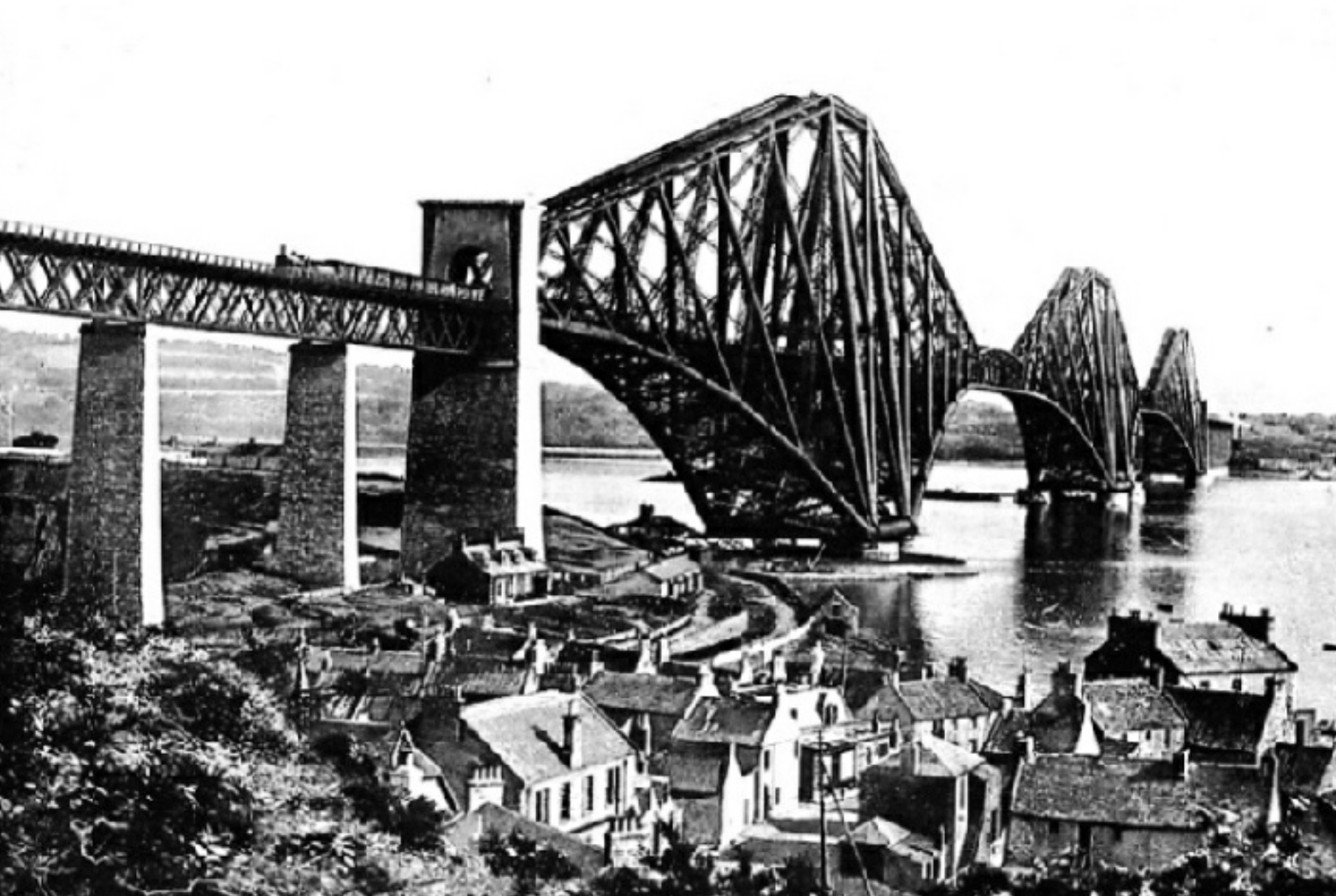
The Forth Bridge, the largest bridge at the time of 'Abdu'l-Bahá, view from North Queensferry (source)
'Abdu'l-Bahá spends the entire morning receiving visitors and answering their questions. He receives an interesting trio: a professor from Aberdeen, who asks about heredity, the immortality of the soul and the environment, the Secretary of the Islamic Society who has come to ask 'Abdu'l-Bahá to speak to his members, and a member of the Theosophical Society who asks about healing and reincarnation. Others come to be blessed, ask about the difference between Christianity and the Bahá'í Faith, and still others come to have long talks with 'Abdu'l-Bahá and share with Him their many questions and difficulties.
Every last one of them returns happy, their questions, queries, concerns, or problems answered comprehensively and to their satisfaction by 'Abdu'l-Bahá.
At 11:30, Sir William Stowell Haldane again sends his car for 'Abdu'l-Bahá's use. They first visit the studio of John Duncan, a foremost Celtic revivalist painter, then the party drives about 14 kilometers West of Edinburgh to visit a modern engineering marvel: the Forth Bridge, a cantilever bridge across the Firth of Forth, an estuary of several rivers. After lunch at the home of the Whyte's, 'Abdu'l-Bahá bestows a considerable amount of attention on Lancelot, the youngest of the Whyte sons, encouraging him to learn Persian.
Grown up, Lancelot Whyte will remember that "[Abdu'l-Bahá's] blessing on me made the East seem friendly for life."
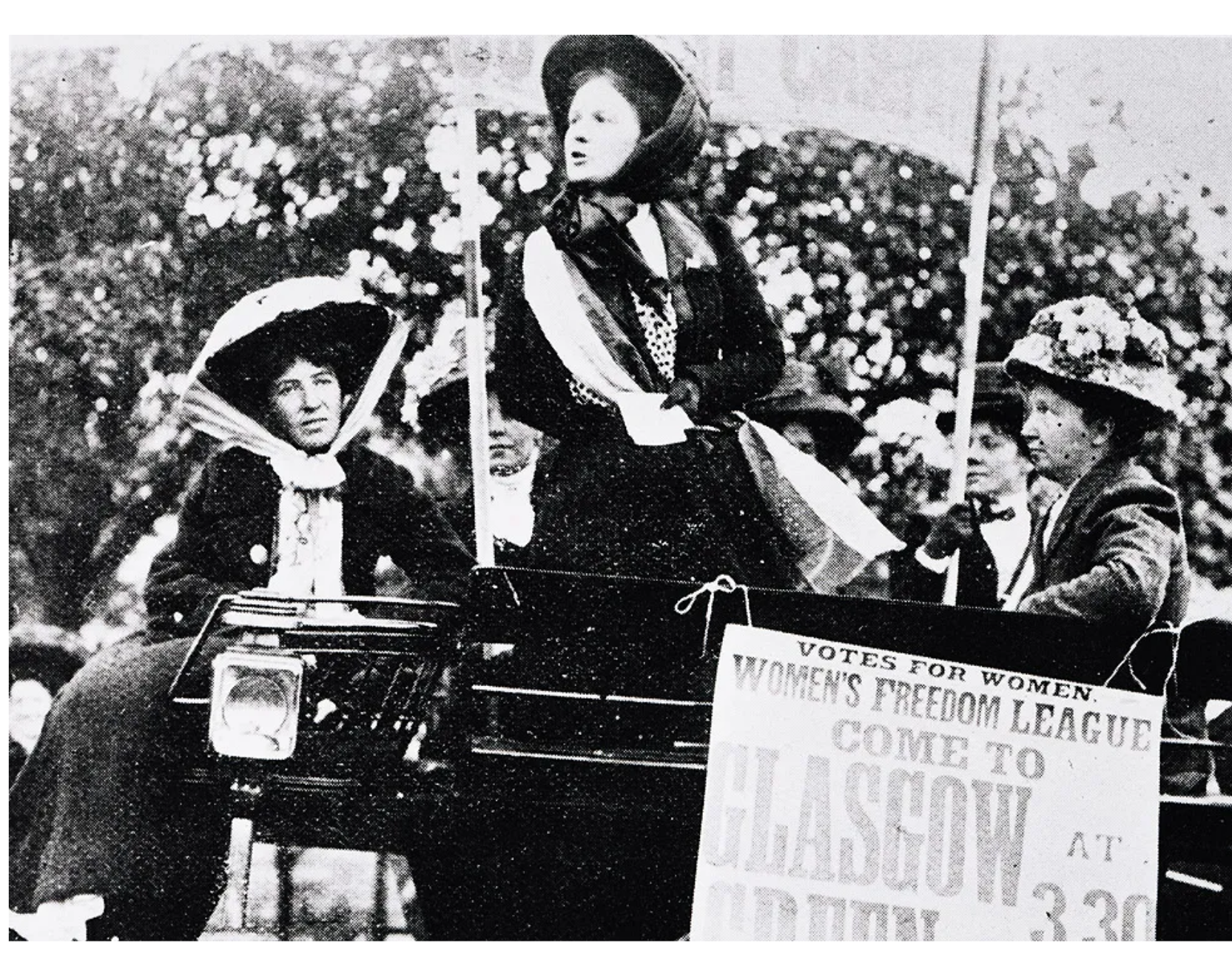
Scottish Suffragettes at a Women's Freedom League demonstration in Glasgow, Scotland in 1913 (source)
At 4 in the afternoon, Jane Whyte hosted the meeting of 150 Edinburgh women and men in her spacious library. Mrs. Whyte leads 'Abdu'l-Bahá in, and He gives a moving and dramatic talk on the subject of women’s rights, addressing the equality of women, stories of early Bahá'í heroines, the importance of motherhood, early childhood education, the necessity for women to study and train in every branch of science, art and social service, appealing to them by saying "Fit yourselves for responsibility, you will inevitably have it thrust upon you." These words would deeply move His audience.
The particularity of this audience is that it was composed of three distinct types of women: suffragists (who lobbied for women's right to vote), suffragettes (members of the women’s suffrage movement, in short radical/militant suffragists) and anti-suffragists (mostly men, not in favor of the women’s right to vote). Reaching out to these three different categories of audience in a way that could not only appeal to them but encourage them to cooperate, would have been a difficult task for anyone, but not for 'Abdu'l-Bahá: they were all pleased with their afternoon.
At the end of 'Abdu'l-Bahá’s address, Jane Whyte read a letter from a nurse in a Bulgarian hospital about the appalling conditions of the hospital and the inadequate medical treatment they were offering, asking for donations for the 150 sick and wounded, both Turks and Bulgarians, tended by this solitary nurse. Her maid, standing by the door, held a small tray for donations and everyone gave something. 'Abdu'l-Bahá gave £10, an equivalent of more than £1,100 in today’s currency.
After the women’s meeting, 'Abdu'l-Bahá spends quite some time speaking about the confirmations of Bahá'u'lláh in assisting them to perform services to the Faith, quoting an Arab poet: “ If divine assistance is with you, you can draw the globe toward yourself with a hair; if confirmation is cut from you, even the chains will be broken.”
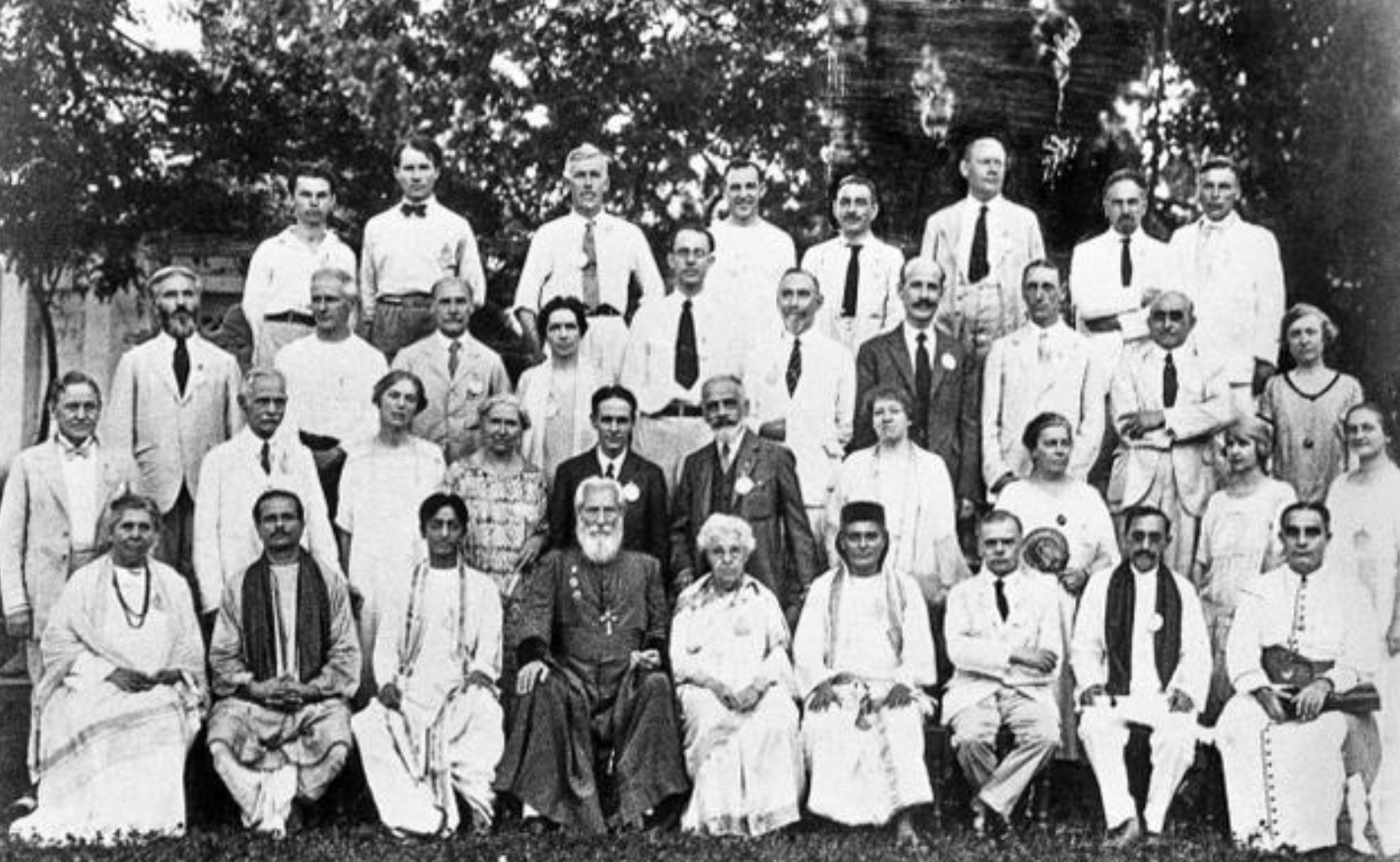
This is a photograph of a meeting of Theosophists in India, because no photographs of Theosophists in Scotland could be found (source).
In the evening of ‘Abdu’l-Bahá’s last night in Scotland, He addresses the Theosophical society, then dines with them. Upon arriving, 'Abdu'l-Bahá meets a Mrs. Brown, a Scot born in Ramleh, Egypt, and Jessie Osborne, and her seven daughters, one of whom has eight daughters and a son herself. Mrs. Osborne and her children come in as a procession and make a ring around ‘Abdu’l-Bahá who stands, surrounded and laughing. He congratulates Mrs. Osborne and tells her: "I hope your daughters may form a blessed family. Abraham was one single soul. God blessed him and today he is represented in millions of soul." ‘Abdu’l-Bahá then meets secretaries, treasurers, and presidents of various other lodges, including a young couple, assistants to the General Secretary to be married in June 1913. ‘Abdu’l-Bahá gives the couple a wonderful blessing: "May you become as one pearl in a casket! May you two become as one soul in two bodies!"
Members of the Theosophical Society have come from every part of Scotland, and even from as far away as Ireland to hear 'Abdu'l-Bahá speak. There are approximately 120 people, men, women, children and teenagers, crammed to overflowing in the second-floor lecture hall of their headquarters, flowing out of the door and down the stairs. At 8 o’clock in the evening, David Graham Pole, the General Secretary of the Theosophical Society gives a very short introduction in which he states it is the greatest privilege of his life to be in the presence of 'Abdu'l-Bahá who radiates love.
In opening His address, 'Abdu'l-Bahá praises the Theosophists, saying they “are always independent investigators of reality, released from mere imitation of the customs of your forebears and ancestors. Your purpose in life is to achieve and welcome the knowledge of reality, no matter from what region the light may dawn.” ‘Abdu'l-Bahá makes several vastly important points in this long address: True religion originates with God, and its purpose is to illuminate the world of humanity, to emancipate the human race, and to establish a complete fellowship between all hearts. 'Abdu'l-Bahá isolates blind dogma as the cause of strife and contention, particularly following a religion blindly rather than conducting an independent investigation of reality. If reality is one, it is not subject to division, and this absolute reality is the foundation of all religions. 'Abdu'l-Bahá then goes into a very complex discussion of the Macrocosm (the world), the Microcosm (man), their component atoms, and the various Kingdoms of existence, centered around the harmony inherent in nature, but ultimately leading to His point on the immortality of the soul of man. The latter subject leads into 'Abdu'l-Bahá’s work of art of a finale: the greatest Divine outpouring is not the immortal soul of man, rather it is the appearance of the successive Manifestations of God in the contingent world, or as we know it, progressive revelation, one Sun with multiple rays, all coming from the same source. 'Abdu'l-Bahá even complements this last metaphor with astronomical references, but ends with the most important point of His talk: all the manifestations of God show forth one essential truth. Man must never look at the dawning points, but always look at the Sun, he must recognize the light, no matter from where it shines. These are 'Abdu'l-Bahá’s closing words: “So long as we are seeking the light, and turning our attention constantly toward it, we shall love the light, no matter from which globe it may be shining. And now I have made you quite tired.”
At the end of His address, 'Abdu'l-Bahá delivers a prayer, then stands at the door and shakes hand with everyone, all very happy because the ideas 'Abdu'l-Bahá had shared were so close to their own beliefs. After a 30-minute rest, a dinner of Persian and Turkish dishes is served, and 'Abdu'l-Bahá dines with 15 of the Theosophical Leaders. After dinner, 'Abdu'l-Bahá inscribes in the Theosophical Society’s guest book the following words: "He is God. O God, from the Sun of Truth cast a ray upon this Society, so that it may be illumined.” 'Abdu'l-Bahá returns home close to midnight, having brought His visit to Scotland to a majestic and befitting end.
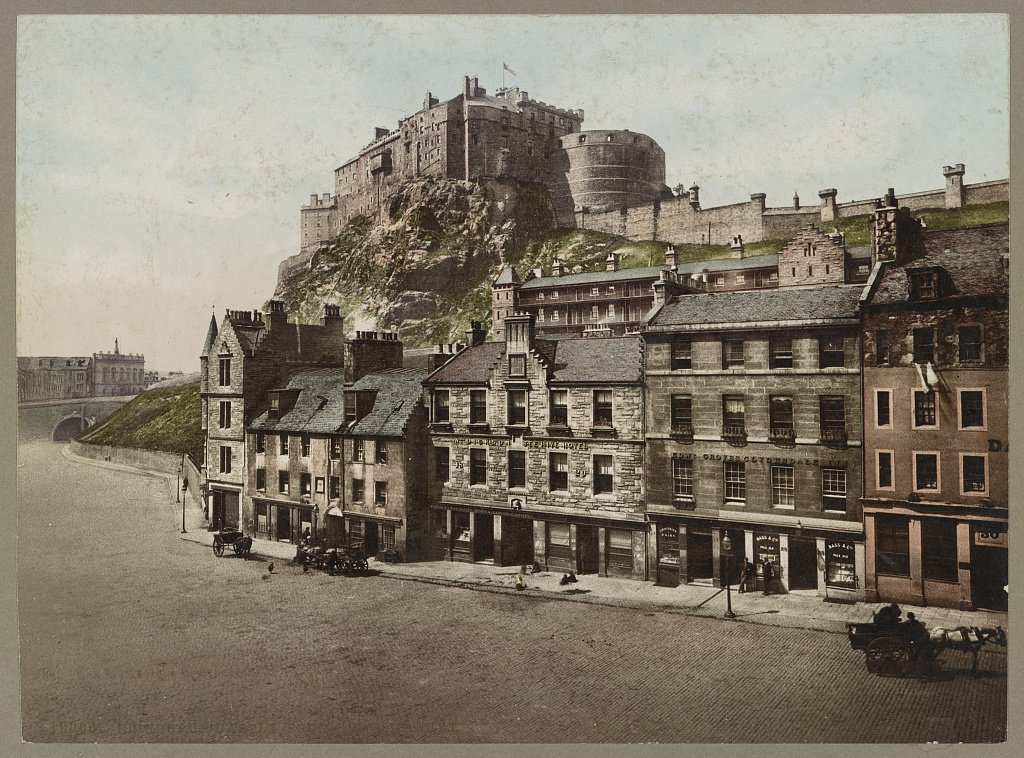
Edinburgh Castle from Grassmarket between 1890 and 1900. Source: Library of Congress.
'Abdu'l-Bahá is deeply pleased with the results of the work accomplished in Scotland. Over the course of His three full days in Edinburgh, 'Abdu'l-Bahá has given public and informal talks, all very well-attended, and many people approached the Master asking how they could join the Faith, and so 'Abdu'l-Bahá accomplished, as usual, what He had set out to do: He sowed the seeds of Truth in soil that He Himself prepared, leaving the work of deepening and encouragement to the local believers.
'Abdu'l-Bahá leaves a beautiful prayer in His own hand in Mrs. Whyte’s guest book, then at 9:45, before leaving for the station, 'Abdu'l-Bahá, never forgetting a single soul, asks to see the maids. When they are all gathered, He says,
"For the last few days you have served me. I am very pleased with you. I will never forget you. I will pray for you that you may become confirmed and assisted and that your heads be crowned with the diadems of eternal glory."
He then gives one guinea to each maid, ($5 in today's currency) and they are so overwhelmed, they all have tears in their eyes. Two cars then take 'Abdu'l-Bahá and His party to the station, where they meet William Main Page, the Secretary of the Esperanto Society, David Graham Pole, the General Secretary of the Theosophical Society, one of the Persian students, two ministers and several men and women who have all come to bid 'Abdu'l-Bahá farewell.
At 10:05 in the morning, as the train pulls away from the station, Ahmad Sohrab, our daily diarist and 'Abdu'l-Bahá's secretary, remembers seeing the waving hands and handkerchiefs of those still on the platform, watching their wonderful 'Abdu'l-Bahá leave their midst. In the train, 'Abdu'l-Bahá dictates several cables to Ahmad Sohrab, including one to Roy Wilhelm, in New York which reads:
SCOTLAND IS ILLUMINED CONVEY GREETINGS FRIENDS ABBAS.
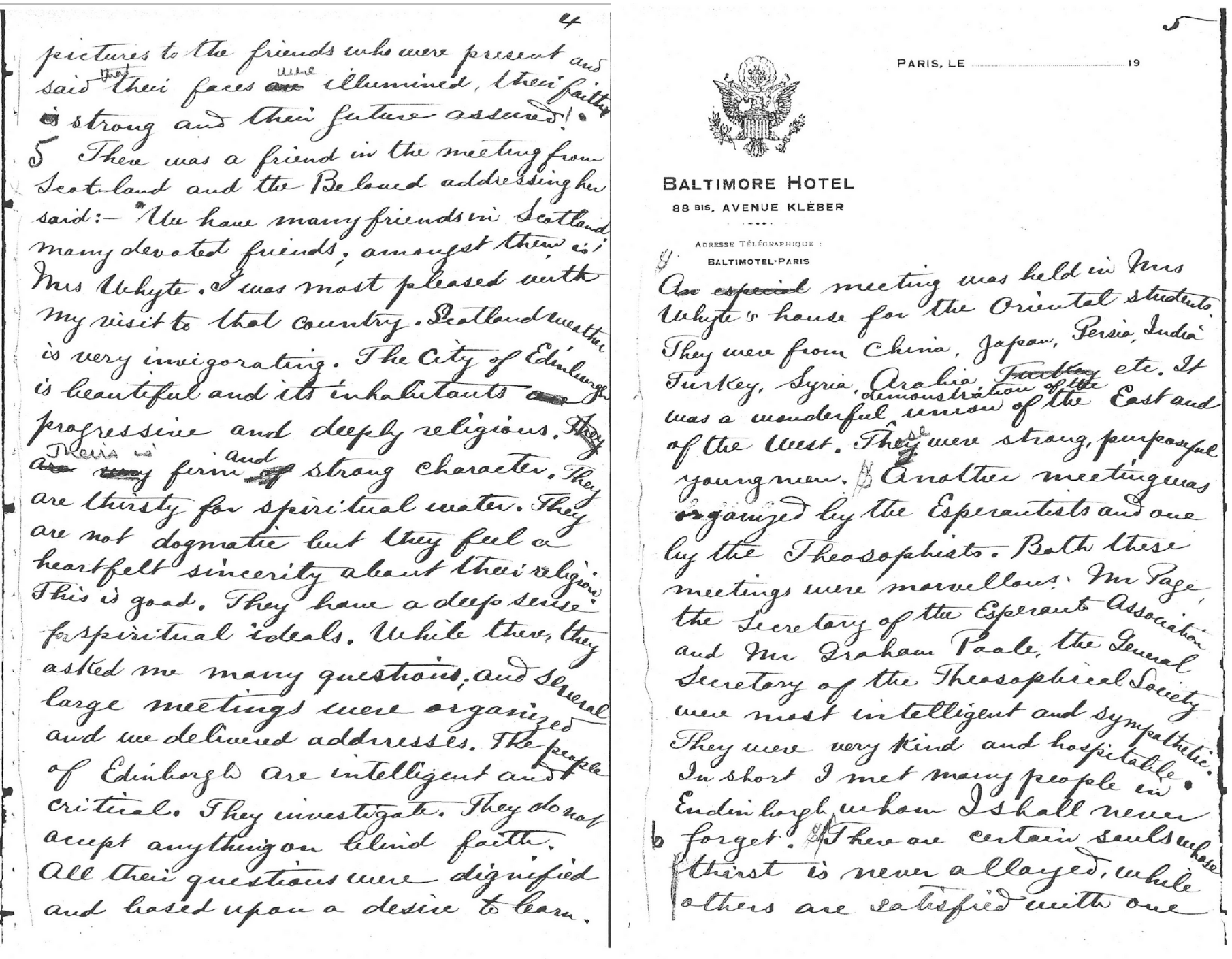
The two pages in Ahmad Sohrab's letters to Harriet Magee for 12 May 1913 where he recounts 'Abdu'l-Bahá's words about His stay in Edinburgh.
The importance of 'Abdu'l-Bahá's visit to Scotland cannot be underestimated. Not only did the Master, on the train arriving in Edinburgh, raise the consciousness of those around Him to the work they were about to do in Scotland, scattering the Divine fragrances, but, on the train leaving Edinburgh, He sends a cable specifically about the results of that four-day effort almost as soon as He leaves Scotland. 'Abdu'l-Bahá mentions Scotland at least three times after His journey there.
10 January 1913 - On the train from Edinburgh to London
In a third significant Scotland-related train moment, 'Abdu'l-Bahá comments to His companions about the visit to Scotland, speaking about as-yet-unseen assistance and confirmation:
Such soul-stirring influence among people is solely due to the Might and Confirmations of the Kingdom of God, that in the great gatherings of this city, and in the house of one of their eminent clergy, we, a few souls from Persia, were enabled to diffuse the signs and teachings of God with such power and might, and speak of the glory and greatness of Muhammad, the Messenger of God, to such an extent that all became humble and showed their humility and respect. The eye of creation has not seen such assistance and confirmations before. We must appreciate these confirmations and in thanksgiving arise in His service.
11 January 1913: London
On January 11, 1913, His first day in London after His visit to Scotland, 'Abdu'l-Bahá tells Alice Buckton:
You must go to Scotland. The people are immensely interested. Edinburgh has great capability. There are many people who are interested. You must go there and teach in churches, in societies, everywhere. We have scattered good seeds in that soil; now souls who can water this cultivation must go there.
14 January 1913: London
In London with Isabel Fraser, on January 14, 1913, our days after His departure from Scotland, 'Abdu'l-Bahá is still thinking of His northern visit. He looks out of the window for quite a long time, then turns to Isabel and says:
Communicate the following to Mr Pole of the Theosophical Society. I was exceedingly pleased with the high tone and spirituality of the meeting last evening. I am grateful for thy love. My hope for thee is that thou mayest become illumined like unto a bright torch in the kingdom of Baha'u'llah.'
12 May 1913: Paris
But perhaps the most extraordinary statement 'Abdu'l-Bahá makes about Scotland is while He is Paris on May 12, 1913, after His journey to Germany, Hungary, and Austria. 'Abdu'l-Bahá left Scotland almost exactly four months ago, to the day. A few friends have come in to speak to 'Abdu'l-Bahá and one of them, a woman, is Scottish. Speaking to her, 'Abdu'l-Bahá says:
We have many friends in Scotland, many devoted friends, amongst them is Mrs Whyte. I am most pleased with my visit to that country. Scotland's weather is very invigorating. The City of Edinburgh is beautiful and its inhabitants progressive and deeply religious. They are very firm and of strong character. They are thirsty for spiritual water. They are not dogmatic but they feel a heartfelt sincerity about their religion. This is good. They have a deep sense for spiritual ideals. While there, they asked me many questions; and several large meetings were organized and we delivered addresses. The people of Edinburgh are intelligent and critical. They investigate. They do not accept anything on blind faith. All their questions were dignified and based on a desire to learn. An especial meeting was held in Mrs Whyte's house for the Oriental students. They were from China, Japan, Persia, India, Turkey, Syria, Arabia, etc. It was a wonderful demonstration of the union of the East and the West. Those were strong purposeful young men. Another meeting was organized by the Esperantists and one by the Theosophists. Both these meetings were marvellous. Mr Page the Secretary of the Esperanto Association and Mr Graham Pole, the General Secretary of the Theosophical Society were most intelligent and sympathetic. They were very kind and hospitable. In short I met many people in Edinburgh whom I shall never forget.
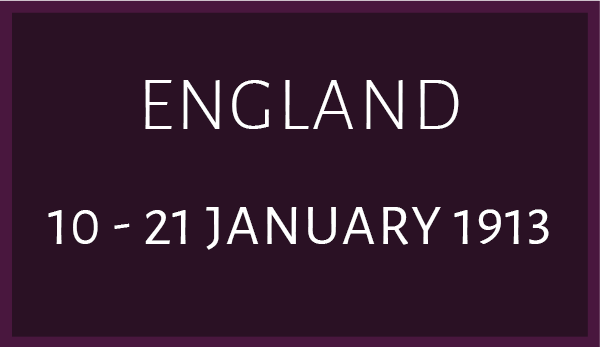
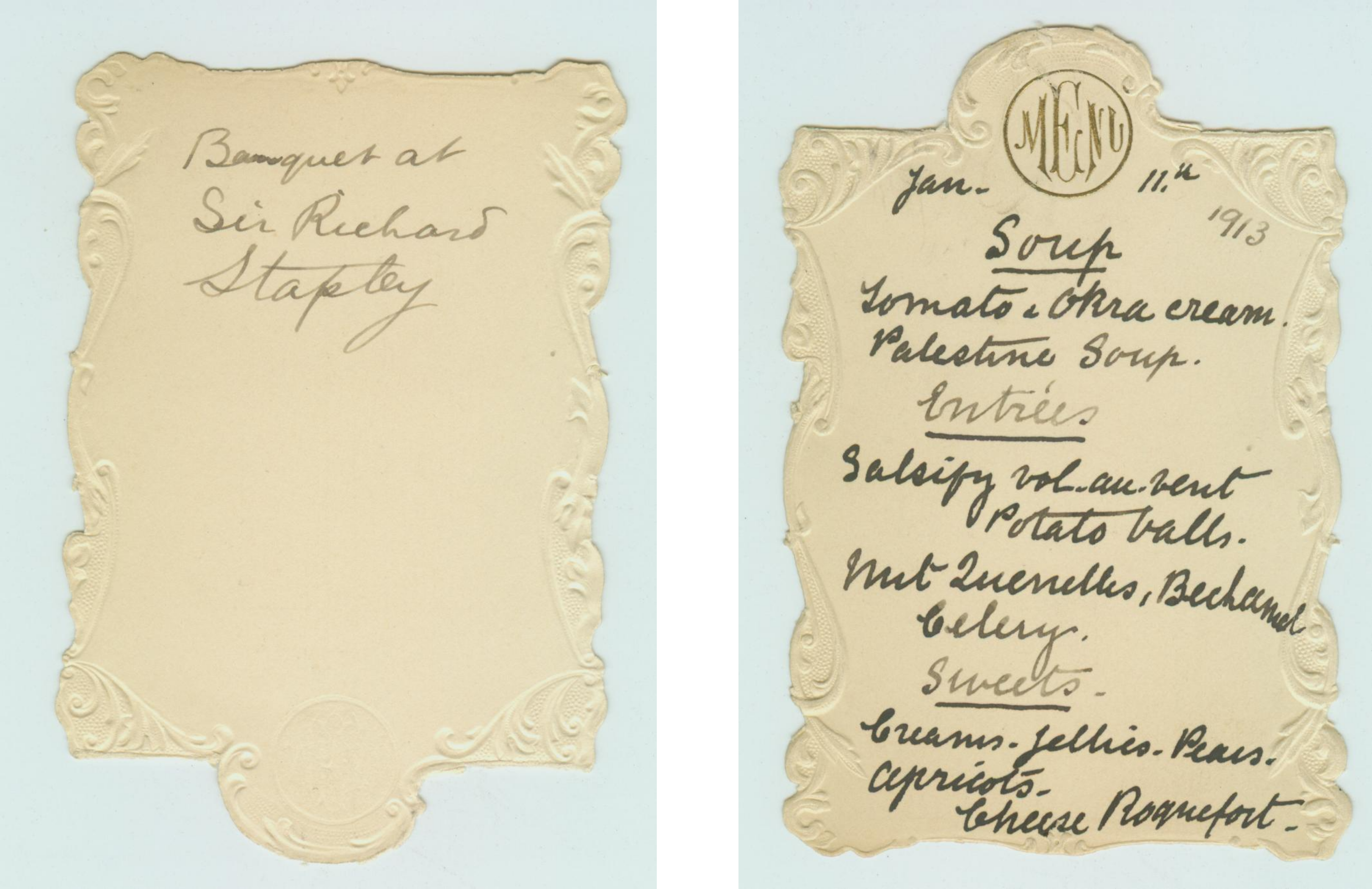
Vegetarian menu served at the Stapley's in honor of 'Abdu'l-Bahá. From Mírzá Ahmad Sohrab's diary letters to Harriet Magee, dated 11 January 1913. The menu reads, Left: Banquet at Sir Richard Stapley; Right: MENU, Jan 11th, 1913, SOUP: Tomato & okra cream; Palestine Soup; ENTREES: Salsify vol-au-vent, potato balls; Nut Quenelles, béchamel, celery; SWEETS: Creams; Jellies; Pears; Apricots; Cheese: Roquefort
After a busy first day in London and only an hour’s rest, 'Abdu'l-Bahá and His party are whisked away to Sir Richard and Lady Stapley’s palatial residence at 33 Bloomsbury Square. Siyyid Asadu’lláh has not been invited, but absolutely refusing to be separated from the Master for one evening, he hops on the roof of the car! When ‘Abdu'l-Bahá's car arrives with its extra guest atop, the Stapleys, unflappable in their social etiquette, will simply set an extra plate at the dinner table. The Stapleys are fixtures of London high society and their monthly dinners gather the intelligentsia of East and West. Having heard 'Abdu'l-Bahá speak, Lord Stapley arranges a (vegetarian) banquet in His honor. Also present are professors, clergymen, figures in the Peace movement, women philanthropists. Lady Stapley greets 'Abdu'l-Bahá upon His arrival, and guests file into the dining room “à la Parisienne”, man and woman, arm in arm, with the hostess and the guest of honor, Lady Stapley and the Master, entering last. The dining room is lavishly decorated with beautiful bouquets on the table and set in front of 'Abdu'l-Bahá a large cake with the word “Unity” written on it, decorated with four white doves on each corner and two hands clasping in the center to symbolize the unity of East and West. After dinner and coffee, the guests retire to a large, beautiful reception room, where Sir Richard Stapley welcomes 'Abdu'l-Bahá in eloquent and respectful, yet enthusiastic, terms.
'Abdu'l-Bahá’s address centers on Universal Peace and how to bring it about. His talk generates many questions by both men and women such as whether corporal punishment is acceptable for children, to which 'Abdu'l-Bahá replies that not even animals should be beaten. When asked if a country should be allowed to intervene when another country is in a state of disorder and its people oppressing each other, 'Abdu'l-Bahá replies that mankind is one family and the earth is one country, that there should exist cooperation, mutual aid and protection but that intervention should be free of self-interest and counsel should be focused on reconciliation. The guests are charmed and delighted by His answers. Then, 'Abdu'l-Bahá shares the most delightful and pragmatic story on Peace:
Once years ago I was sitting near the window of my room. Looking out of the window I observed there are many dogs in the square who are fighting amongst each other. Standing far away from the scene of turmoil there was a donkey. This donkey desiring to be a pacifist left his place and came over to divide these dogs with his muzzle. Not succeeding in this and realizing that the dogs would not listen to his pacific methods he turned around and began to kick and thus succeeded in dividing the dogs. Now these nations are fighting amongst themselves like dogs. Who is going to divide them?
To this direct question, Felix Moscheles, the English painter, writer, peace activist and Esperantist says:
I will be that donkey!
Moscheles’ witty and earnest repartee is met with laughter from everyone. Before leaving, 'Abdu'l-Bahá prays that the Stapleys’ house may ever be a center of peace and reconciliation and that its charming host and hostess be akin to the luminous stars. 'Abdu'l-Bahá gives the white dove cake decorations to guests as a souvenir of the Harbinger of Peace calling all those assembled to work, body, soul, and spirit for the Most Great Peace:
When a thought of war enters your mind, suppress it, and plant in its stead a positive thought of peace. These thoughts, vital and dynamic, will affect the minds of all with whom you come into contact, and like doves of peace, will grow and increase till they spread over all the land.
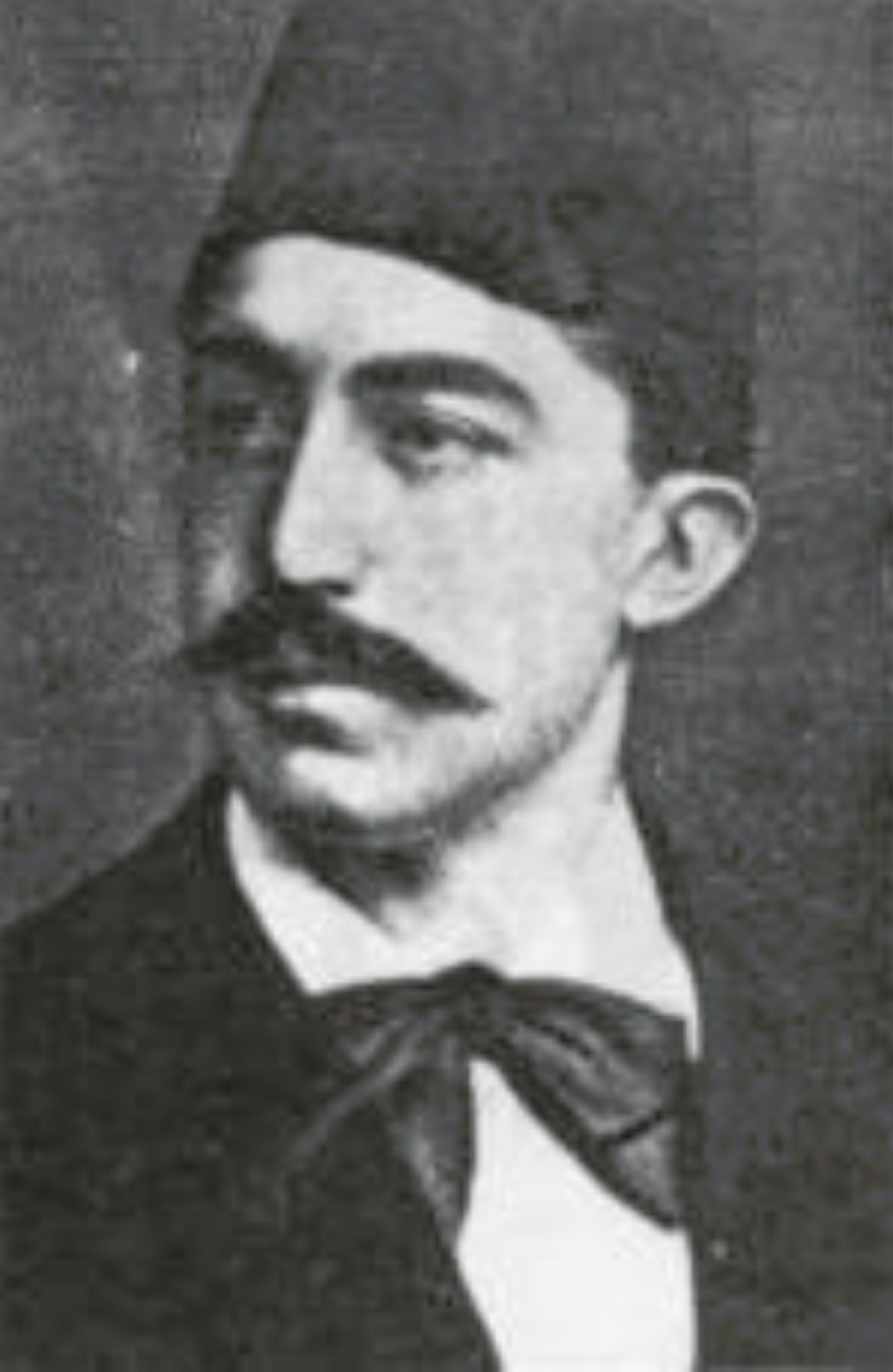
Dúst Muḥammad Khán, the Mu‘ayyiru'l-Mamálik
It had been so exceedingly easy for Persian notables to treat 'Abdu'l-Bahá with utter disregard. After all, He had been a prisoner since His childhood, first under their rule, then under the Ottomans'. Two years after His release by the Ottomans, 'Abdu'l-Bahá sets off to promulgate the Cause of Bahá'u'lláh from as many pulpits, temples, meeting houses, drawing rooms, hotels, churches and assemblies. In doing so, the Master travels to various European and American cities where notable Persians reside, and this is usually accompanied by constant and intense media coverage. Hearing and reading that a Persian nobleman is in town, these notables gravitate, out of curiosity, to meet Him. We have already seen an effect 'Abdu'l-Bahá has had on the former ruling class of Persia in His encounter with Masʻúd Mírzá, the Ẓillu’s-Sulṭán, eldest son of Náṣiri’d-Dín Sháh. This is another such encounter, and deeply significant too.
Dúst Muḥammad Khán, the Mu‘ayyiru'l-Mamálik, is a respected member of the Persian aristocracy. He is the former governor of Rasht Province, an architect, and is the son of a Persian Prime Minister. He is also the husband of one of Náṣiri’d-Dín Sháh's daughters. Dúst Muḥammad Khán arrived in Europe several years prior with the Sháh himself on the latter's tour of Europe. This is the story of his intense relationship with 'Abdu'l-Bahá over the course of five days between January 13 and 19, 1913.
January 13, 1913: Day 1
Dúst Muḥammad Khán, a Persian nobleman, comes to meet 'Abdu'l-Bahá at 97, Cadogan Gardens. He is invited to stay for lunch, during which he and other Persian ministers sit to 'Abdu'l-Bahá’s right and He serves them heaping plates of delicious food. Evidently, Dúst Muḥammad Khán spends the afternoon with 'Abdu'l-Bahá, because he accompanies the Master to an address at Caxton Hall at 4 in the afternoon that same day, when 'Abdu'l-Bahá speaks to the Peace Society.
January 14, 1913: Day 2
Although neither Ahmad Sohrab nor Mírzá Mahmúd-i-Zarqání mention Dúst Muḥammad Khán is present, he must evidently have heard 'Abdu'l-Bahá’s after dinner table talk at 97, Cadogan gardens. Ahmad Sohrab describes the subject of 'Abdu'l-Bahá's talk as "the most exhaustive exposition" on the subject of the occult that he has ever heard from the Master. 'Abdu'l-Bahá opened by laying out the four schools of reincarnation, defining the specific beliefs of each school, and giving the Bahá'í perspective on reincarnation. He then spoke about other subjects, such as transanimation (the transmigration of souls), the return of generic and specific forms of phenomena and even the question of the preservation of the individuality of the spirit. The reason we believe Dúst Muḥammad Khán must have been present for this exposé is because none of the events he attended with 'Abdu'l-Bahá that day spoke on this topic, yet, by his own account, 'Abdu'l-Bahá's words on reincarnation and immortality of the spirit kept the poor man up all night.
January 15, 1913: Day 3
The next day, January 15, as 'Abdu'l-Bahá is getting ready to leave for Bristol, Dúst Muḥammad Khán arrives at 9 in the morning. In the two days he has spent in the 'Abdu'l-Bahá’s gravitational pull, Dúst Muḥammad Khán is deeply impressed with the love and respect shown to the Master by everyone around Him, but even more enraptured with 'Abdu'l-Bahá’s talks and addresses, and marvels at the kindness and attention the English show Him. He tells Ahmad Sohrab when he arrives, that "after hearing the Master talk on reincarnation and immortality of the spirit, he went to his room and sat all night thinking over it. He did not even take off his coat. He thought and thought till eight o'clock when he left the Hotel to come to the Master." He is to be 'Abdu'l-Bahá’s guest all day today, and when 'Abdu'l-Bahá leaves for the station, Dúst Muḥammad Khán is in His car. He boards the train with the Bahá'í party to Bristol from Paddington. Dúst Muḥammad Khán is with 'Abdu'l-Bahá and Ahmad Sohrab when Major Wellesley Tudor Pole gives them a driving tour of Bristol. After 'Abdu'l-Bahá’s talk at the Clifton Guest House, Mírzá Mahmúd-i-Zarqání, the other eminent diarist of 'Abdu'l-Bahá’s Journeys to the West, notices Dúst Muḥammad Khán, standing awe-struck by the bows and curtsies of eminent English personalities, tears running down his cheeks.
January 16, 1913: Day 4
The next day, January 16, 'Abdu'l-Bahá chooses only Dúst Muḥammad Khán to accompany Him on a drive through Bristol with Major Wellesley Tudor Pole, leaving even Ahmad Sohrab behind. Later, the party returns to London.
January 17, 1913: Day 5
Dúst Muḥammad Khán travels with 'Abdu'l-Bahá in Lord Richard Stapley’s car to go to the Mosque at Woking with Lady Blomfield and Ahmad Sohrab. The rest of the Persian party joins them by train.
January 19, 1913: Day 6
There is no record of Dúst Muḥammad Khán visiting 'Abdu'l-Bahá again before January 19, two days before 'Abdu'l-Bahá’s departure. The eminent Persian, former Governor of Rasht and Nasirid’in Shah’s son in law enters 'Abdu'l-Bahá’s presence and attempts to kiss His hand, but the Master does not allow it, as Bahá'u'lláh had abrogated this islamic expression of ultimate meekness in the Kitáb-i-Aqdas. Instead, He tells Dúst Muḥammad Khán the story of Bahá'u'lláh’s self-imposed retirement into the mountains of Kurdístan for a period of two years. This episode concludes the story of Dúst Muḥammad Khán and 'Abdu'l-Bahá in London, but Dúst Muḥammad Khán is one of the first Persian notables to welcome 'Abdu'l-Bahá in Paris on January 22, 1913, and they will meet several times in the French capital before the Persian nobleman's journey home.
What is interesting about the concluding episode in England is that Dúst Muḥammad Khán, having seen the greatness of 'Abdu'l-Bahá, wants to express his humility by kissing 'Abdu'l-Bahá’s hand. What 'Abdu'l-Bahá does is not simply to disallow the ritual, but rather to offer the man a glimpse of the even greater majesty of Bahá'u'lláh, the greatest Manifestation of God, willingly retiring to remote mountains in absolute poverty in the garb of a dervish. The entire episode, from January 13 to 19 is a lesson about the interplay between humility and greatness. One of of the most mysterious facets of 'Abdu'l-Bahá, the Mystery of God, is how someone so perfect in all aspects, can also be so humble. It is hard to imagine in what other circumstances the Sháh's son-in-law, and an elite member of the Persian aristocracy, a ruling class having traditionally persecuted the Bahá'ís, could have spent six days in close quarters with, and fully embraced by, the son of the Prophet of the Bahá'í Faith.
Mírzá Mahmúd-i-Zarqání had been so moved when he saw Dúst Muḥammad Khán weeping in Bristol, that he too wept, but also rejoiced at the familiarity of this scene, played out time and again as eminent Persians would get a glimpse of the majesty of 'Abdu'l-Bahá in the West, no longer a prisoner, but held in high esteem by Westerners, and say: “What great glory God conferred upon us... what a Sun of grandeur and felicity rose from the horizon of the East, but alas, alas, we did not heed it...”
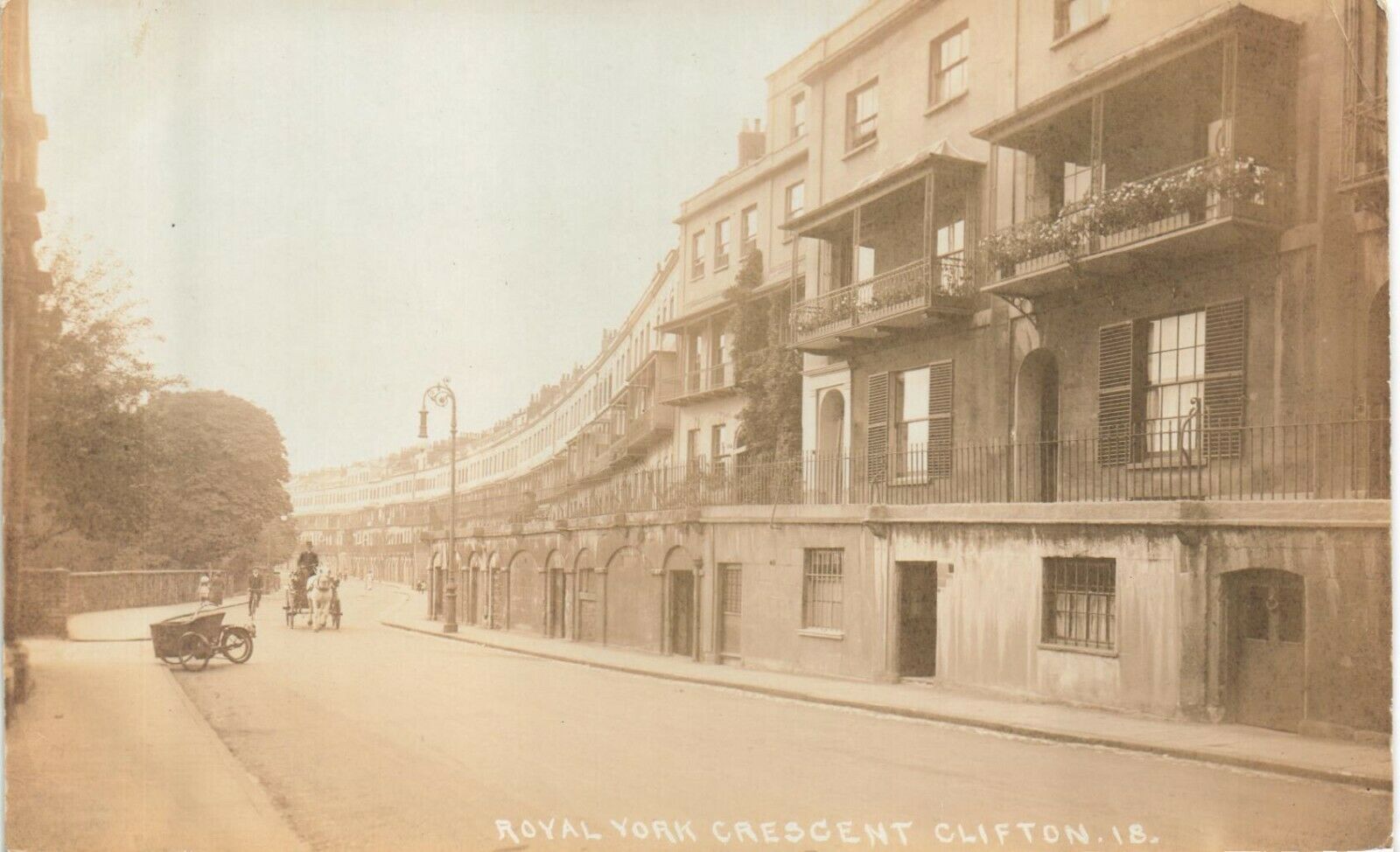
Old postcard showing Clifton's Royal Crescent road in Bristol. Wellesley Tudor Pole's house was located at number 17. (source)
On the morning of January 15, 1913, 'Abdu'l-Bahá and His party, including our dear Dúst Muḥammad Khán, leave London at 10 in the morning and arrive three hours later, at 1 in the after in Bristol. Major Wellesley Tudor Pole who welcomes them with two automobiles and takes them on a scenic drive past the river Avon and past the River Avon Gorge before arriving in Clifton. Clifton is one of the oldest and most affluents neighborhoods of Bristol, West of the city center and by all accounts, a charming area with delightful views. Its greatest landmark is the Royal York Crescent, where Major Tudor Pole's home, the Clifton Guest House is located. 'Abdu'l-Bahá has a deep fondness for Clifton. He has made sure He returns here, even just for one night, before leaving England. During His stay, according to the Clifton Chronicle, 'Abdu'l-Bahá will tell Wellesley Tudor Pole that of all the places He has seen in Europe and America, He has found that Denver in America and Clifton in Europe had the most temperate and delightful climate, with Clifton having His preference. Even Dúst Muḥammad Khán falls in love with Clifton, exclaiming with admiration and wonder at the beautiful scenes they encounter during their country drives. At 7 in the evening, 'Abdu'l-Bahá gives two interviews to newspapers, and the following morning, He gives one more. In the course of one of these interviews, 'Abdu'l-Bahá conveys His "Message to Clifton" to a journalist from "The Clifton Chronicle"
I am most delighted and pleased with the situation of Clifton and its surrounding valleys and hills. Therefore, before returning to the Orient I have again come here to spend one night. In reality the people of Clifton are very intelligent. They have the capability of understanding every problem. Their consciousness yearns for the search of reality. They understand selfless objects and they are willing to work for philanthropy. It is my hope that they will be assisted to serve the whole of humanity. May they become the means of creating good fellowship between the children of men. May they entirely relinquish those blind dogmas which have created strife in the world of humanity. May they become instrumental in putting into practice the Heavenly teaching. May each one of them become a Heavenly lamp to enlighten humanity, so that this gloomy darkness of strife and contention between peoples may be entirely dispelled, and nation and nation show friendlier fellowship towards each other, and the day of universal justice and the day of the unification of all the races and all religions may become apparent. This is my message to Clifton people.
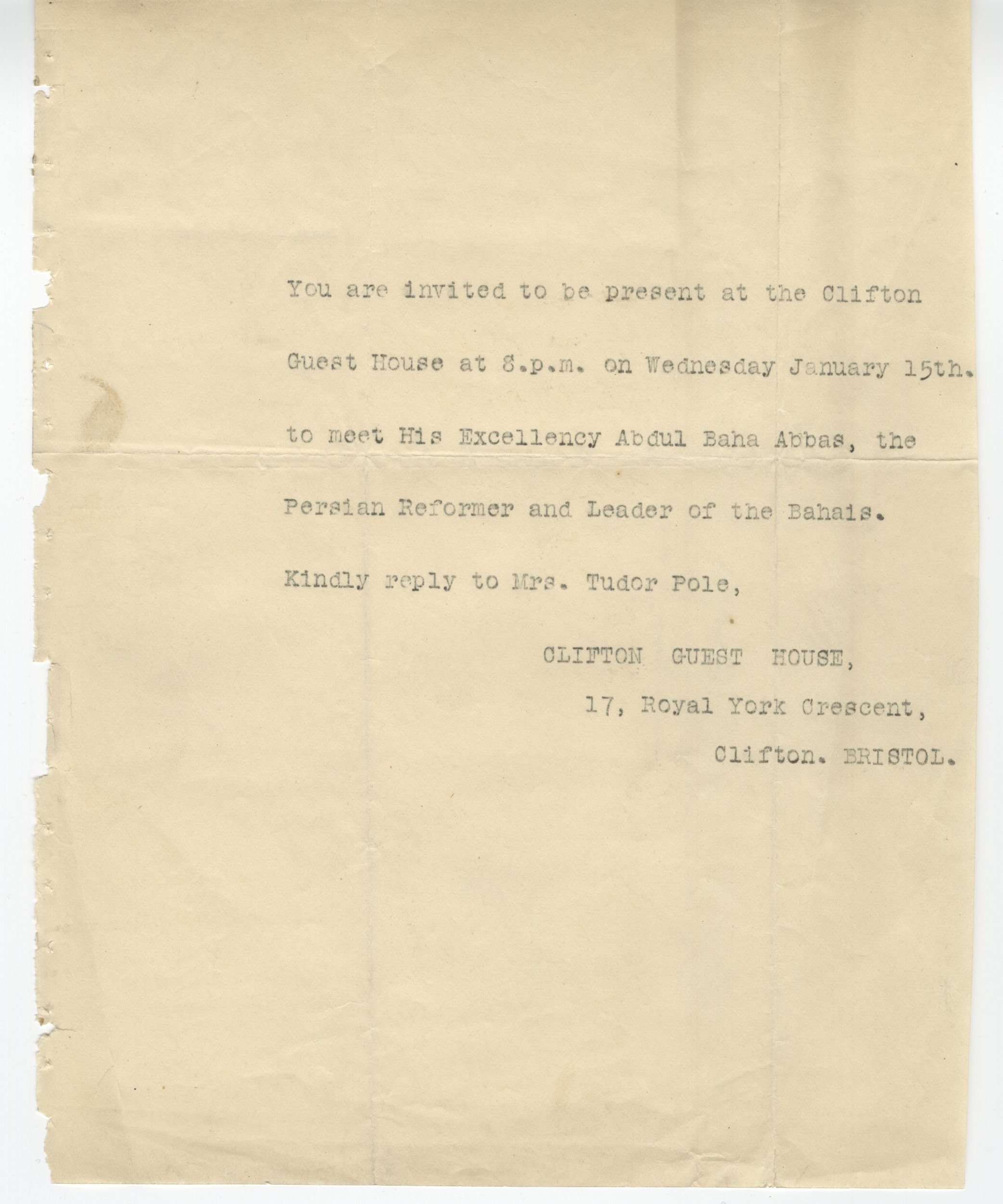
Invitation for a talk by 'Abdu'l-Bahá at Wellesley Tudor Pole's home in Bristol. From the scans of Ahmad Sohrab's Diary for January 15, 1913.
Wellesley Tudor Pole has sent out invitations, and between 120 and 150 people gather to hear 'Abdu'l-Bahá speak. At 8:30 in the evening, 'Abdu'l-Bahá comes down from His room and the audience rises to meet Him. He bids them to be seated and proceeds to give a powerful introduction to His address:
Every age requires a central impetus or movement. In this age, the boundaries of terrestrial things have extended; minds have taken on a broader range of vision; realities have been unfolded and the secrets of being have been brought into the realm of visibility. What is the spirit of this age. what is its focal point? It is the establishment of Universal Peace, the establishment of the knowledge that humanity is one family…this glorious century has been besmeared with war and strife, hatred and rancor. Bloodthirsty wolves are tearing the sheep of God. Destruction is more widespread than in all the ages of the past. We hear on every side praises of the wonders of this cycle, its achievements, its refinements, its genius… If you compare the past with this age, impartial judgment will call this the age of human fratricide. All the religions are revealed for the sake of good fellowship.
Star of the West, Volume IV, Number 1 (March 21, 1913)
'Abdu'l-Bahá then gives a complete and concise overview of the Bahá'í teachings, proving that “Religion was destined to be a remedy for the sickness of humanity” and expounds on Bahá'u'lláh’s major principles: the independent investigation of truth, the oneness of the human race, international peace, the harmony between science and religion, the elimination of all forms of prejudice, the equality of the sexes, universal comfort and welfare for all members of society, an international court of arbitration, universal education, and the need for a universal auxiliary language, being the main principles. After His address, 'Abdu'l-Bahá shakes hands with everyone, the scene that moves Dúst Muḥammad Khán to tears, and speaks for half an hour to eight Egyptians. The next day after another drive, four photographs are taken and 'Abdu'l-Bahá and His friends leave Bristol around noon on January 16, 1913. Bristol is very important in 'Abdu'l-Bahá's journeys to the West, and not only because He favored its climate, but because it is the scene of the deepening of a spiritual friendship and bond with Wellesley Tudor Pole that will be transmitted, through Tudor Pole's extraordinary loyalty of spirit, to Shoghi Effendi when he comes to England for his studies. The deep bond between Wellesley Tudor Pole and 'Abdu'l-Bahá bears fruit in the next two years, too, when Tudor Pole will move heaven and earth, risk protocol, and even endanger his own military career, to ensure that 'Abdu'l-Bahá's safety is preserved in Haifa during World War I. But this is a story to be continued in Part VIII.
.

'Abdu'l-Bahá addressed a gathering of Egyptian, Turkish, Indian and British friends in the mosque's courtyard in Woking, Surrey. Photo: Bahá'í World News Service.
On Friday, January 17, 1913, 'Abdu'l-Bahá leaves London and drives for an hour and a half to visit the Mosque in Woking. The visit has been arranged by Alice Buckton, who grew up in Surrey, and there are several important aspects to this visit. 'Abdu'l-Bahá visits the mosque on a Friday, a sacred day of worship in Islam, and with the visit to this Mosque, 'Abdu'l-Bahá will have promulgated the message of Bahá'u'lláh in the Houses of Worship of four major religions: Christian (Anglican, Baptist, Congregationalist, Episcopalian, Methodist, New Thought, Presbyterian, Quaker, Reformed Church, Spiritualist, Unitarian, and Universalist churches, and Quaker Meeting Houses, among other Christian denominations), Jewish (three Reform Judaism Temples), Hindu (a Brahmo Samaj), and outside a Muslim house of Worship, the Sháh Jahan Mosque in Woking, one of only two mosques in England at the time.
Driving through lovely lanes, the automobile finally arrives to the Mosque where the Mulláh is preaching. Alice Buckton welcomes 'Abdu'l-Bahá and leads Him to the Asiatic Quarterly Review building, which functions as a theological college. Henry Leitner, whose father built the Mosque 15 years prior is also present. After lunch, the 3 o’clock afternoon call to prayer is heard, and all join in, 'Abdu'l-Bahá going inside the Mosque and removing His boots to pray. Immediately after prayer, 'Abdu'l-Bahá exits the Mosque and stands out in front. A large crowd made up of Asians and Europeans, Muslims, Jews and Christians (and many newspaper reports) assembles in the courtyard to listen to 'Abdu'l-Bahá’s words. In the crowd are several Muslim and European personalities, such as George Robert Stowe Mead, Dr. John Pollen, Syed Ameer Ali, Dr. Syed Abdul Majid, Shah Mohammad Naimatullah, Prince and Princess Ourousoff among others. 'Abdu'l-Bahá speaks about the oneness of humanity and the oneness of religion, the message of Bahá'u'lláh for today, and the dangers of blind dogma and imitation. During 'Abdu'l-Bahá's address, it starts to rain abundantly. Umbrellas open but no one leaves. After speaking, 'Abdu'l-Bahá stands inside the door of the Mosque and, hands upraised, chants a heart-rendering prayer in Arabic, His voice ringing out and reverberating through the still air. The event is widely reported, and looking at the photograph today, such a diverse crowd assembled in the shadow of a European Mosque in front of which 'Abdu'l-Bahá has just spoken, is a moving reminder of how far 'Abdu'l-Bahá, the Center of the Covenant has elevated the glory of the Cause of Bahá'u'lláh. It was a few decades ago only, in His own lifetime, that mosques were the places edicts were read condemning the followers of Bahá'u'lláh to perpetual incarceration. And today, in the courtyard of a Mosque, 'Abdu'l-Bahá has promulgated the Message of Bahá'u'lláh.
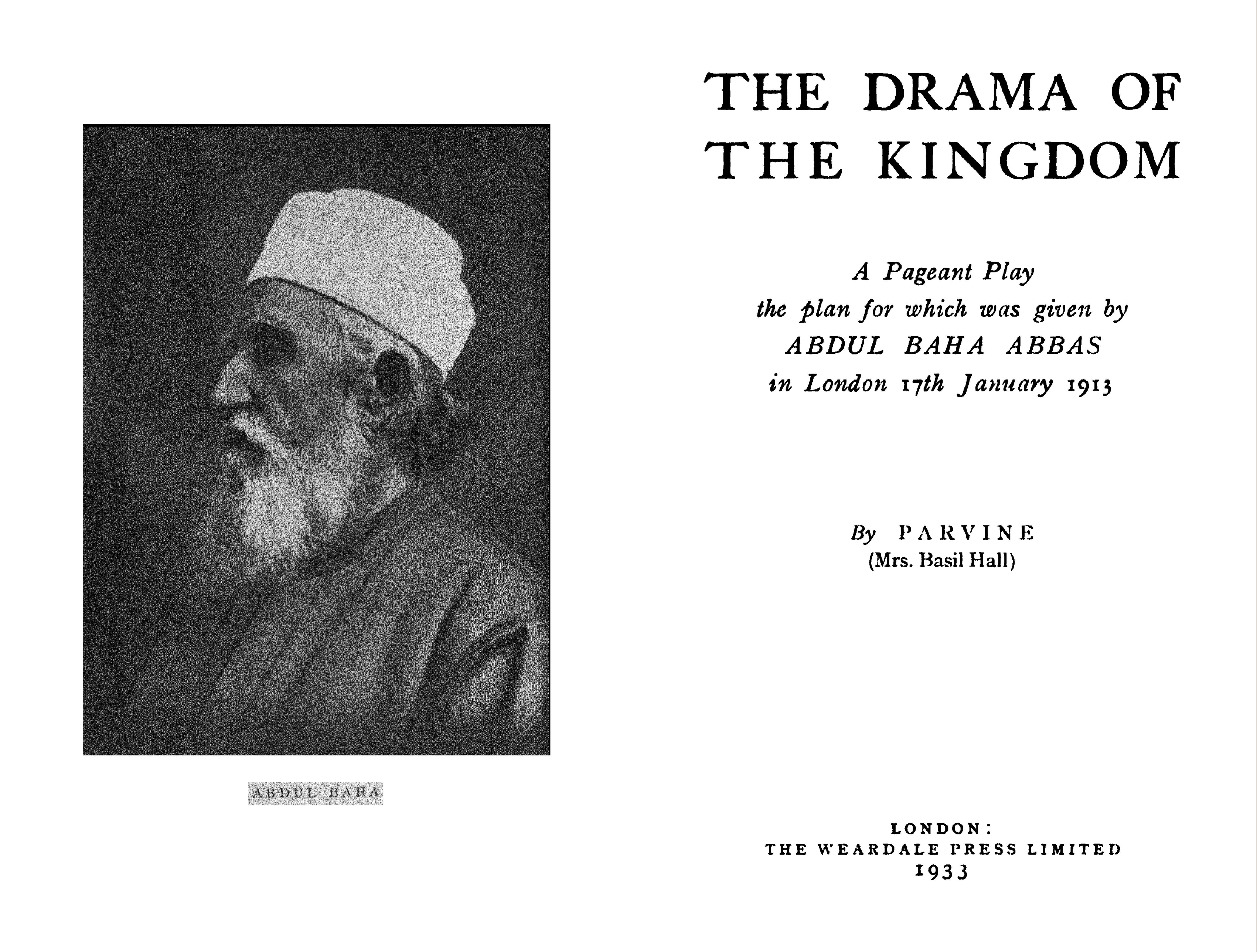
Title page of 'Abdu'l-Bahá's play, "The Drama of the Kingdom," by "Parvine" (Mrs. Basil Hall), the plan of which is given by 'Abdu'l-Bahá in London on January 17, 1913. (Internet Archive)
'Abdu'l-Bahá has been a Master of the written word since His youth. When in Adrianople in His mid-twenties, 'Abdu'l-Bahá composes a masterful 1,000-word commentary on the hadith "I was a Hidden Treasure." In 1875 in 'Akká, He composes the first of His treatises,"The Secret of Divine Civilization",and still in 'Akká, in 1886, He writes an early history of the Bábí religion called "A Traveler's Narrative." 'Abdu'l-Bahá of course graces us with exquisite revealed prayers and Tablets, but to these, starting in 1906 with "Some Answered Questions", and His exquisite table talks, we discover in 'Abdu'l-Bahá a master orator. This is further evidenced in 1911, by His iconic Paris Talks at 4, Avenue de Camoëns in Paris, France and His many public and private addresses in the United States and Canada, compiled under the very apt title, "The Promulgation of Universal Peace." 'Abdu'l-Bahá has also written a very small handful of exquisite poems, including one in Ottoman Turkish, and in March 2021, the Universal House of Justice released "Twenty-six prayers revealed by 'Abdu'l-Bahá," and the twenty-sixth selection is ‘Abdu'l-Bahá's most well-known prayer-poem in the form of a mathnaví, a persian form of poetry made of any number of rhyming couplets of ten or eleven syllables. It can also be argued, from a literary standpoint, that some of 'Abdu'l-Bahá's most majestic Tablets are poetic treasures in themselves, such as the Tablet of Visitation for Thomas Breakwell.
But not until January 17, 1913 does 'Abdu'l-Bahá grace us with His literary talents in the field of the dramatic arts. This night, 'Abdu'l-Bahá composes a play in four acts, and with this work, we can admire the breadth of his mastery of the word in every single one of its forms. On the evening of January 17, 1913, after the day trip to the Woking Mosque, 'Abdu'l-Bahá is in the drawing room of Gabrielle Enthoven, whom He calls "Hamsáyih" (meaning "Neighbor"), and asks her:
What is your great interest in life?
to which Mrs. Enthoven replies:
The Drama.
'Abdu'l-Bahá then says:
I will give you a play. It shall be called the Drama of the Kingdom.
'Abdu'l-Bahá then proceeds to outline, without notes, and without pausing, a spiritual play for Gabrielle Enthoven, which will be written down by Mary Basil Hall and later approved by Shoghi Effendi. The play centers around the call of the Herald of the Kingdom, the appearance of the Promised One and a new Message from God, and humanity's dual reaction to it: belief and disbelief, enkindlement and apathy or doubt. In almost exactly 19 years, Shoghi Effendi will say:
It is certain that with the spread of the spirit of Bahá'u'lláh a new era will dawn in art and literature. Whereas before the form was perfect but the spirit was lacking, now there will be a glorious spirit embodied in a form immeasurably improved by the quickened genius of the world.
Letter from Shoghi Effendi dated 3 April 1932 found in the compilation "The Arts"
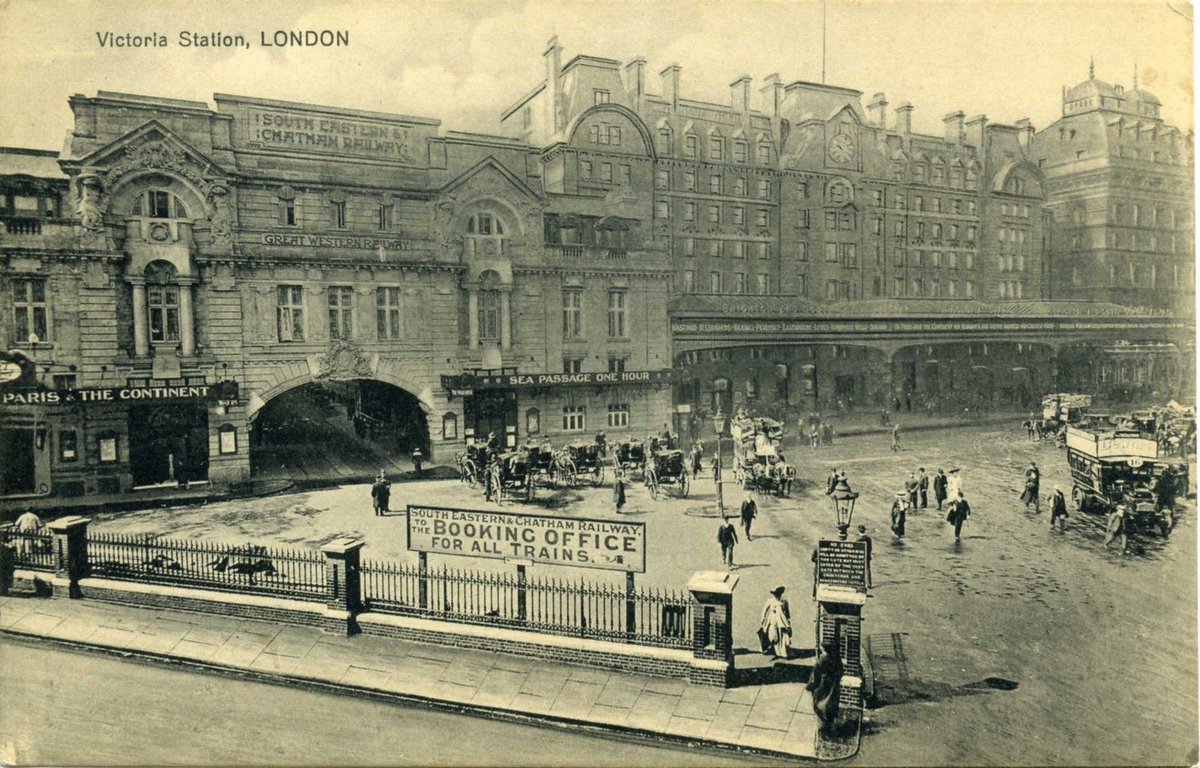
Vintage postcard showing Victoria Station in London with a sign on the left saying "To Paris - The Continent". (source)
At Victoria Station, many Bahá'ís arrive to bid 'Abdu'l-Bahá farewell. His Royal Highness, Sir Ameer Ali, the Maharaja of Jhalawar, who invited 'Abdu'l-Bahá to dine on January 18, is also present, and offers 'Abdu'l-Bahá a beautiful wreath of flowers in front of the crowd of hundreds gathered to witness the Master's final departure from English shores. People bring many books and photos for 'Abdul Bahá's signature or a line of prayer. In one He writes: "O Thou Lord of Unity, confirm this person who is old in faith and young in love, to summon people to Thy Kingdom," and to another He writes: "'Abdu'l-Bahá begs providence and protection from the Threshold of Unity on behalf of this maidservant of God." And with these last expressions of love to the English people He loves so much, 'Abdu'l-Bahá departs for Paris, France, on the long, final, leg of the journey that will bring Him home in eleven months.
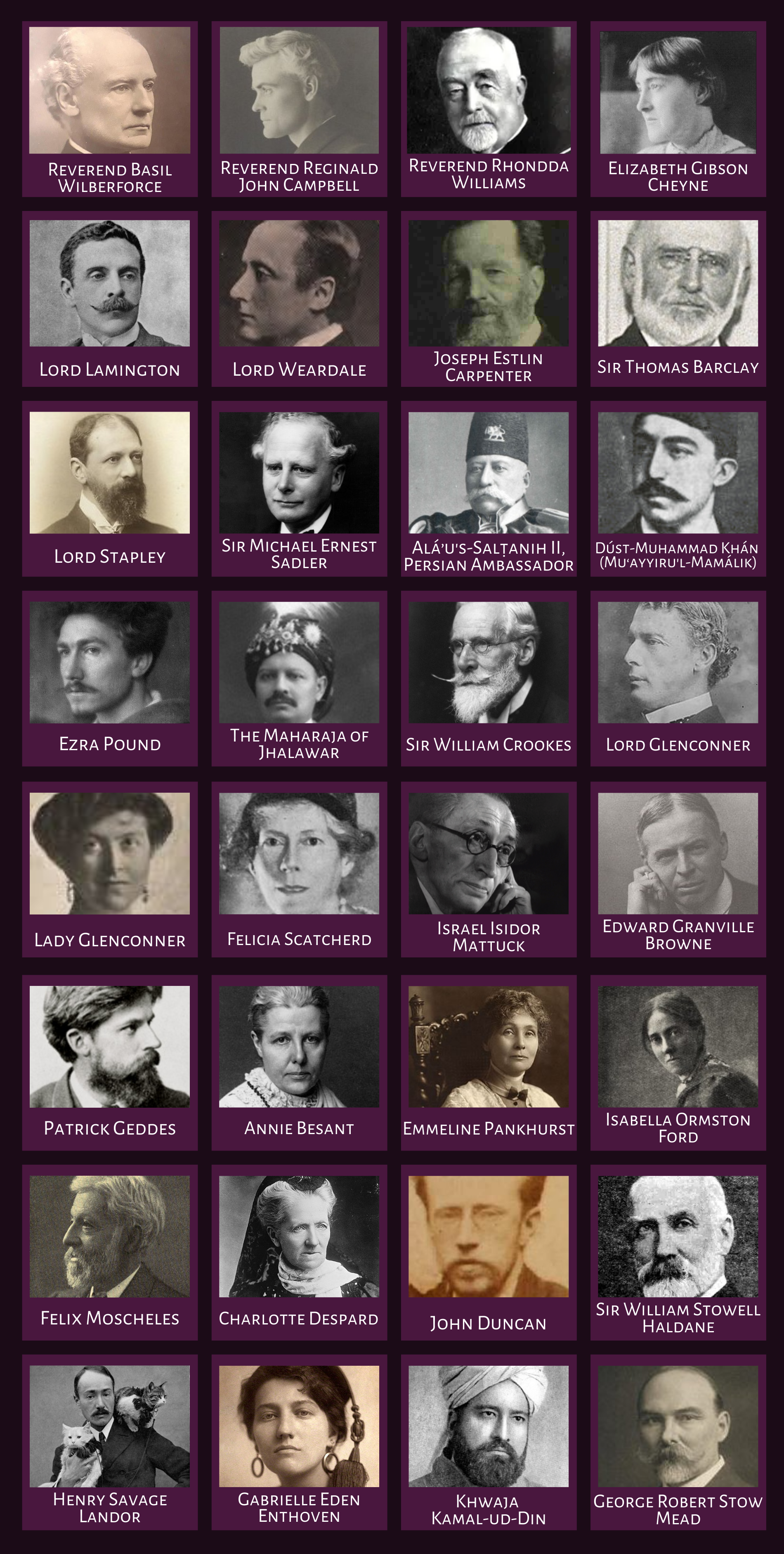
Reverend Reginald John Campbell, a British Congregationalist and Anglican divine who became a popular preacher while the minister at the City Temple and a leading exponent of 'The New Theology' movement of 1907;
Reverend Rhondda Williams, a Welsh Congregational minister.;
Reverend Roland Corbet (no information or photo found);
Elizabeth Gibson Cheyne, Poet and writer, wife of T.K. Cheyne, eminent Oxford scholar who became a Bahá'í ;
Charles Wallace Alexander Napier Cochrane-Baillie, 2nd Baron Lamington, (Lord Lamington), a British politician and colonial administrator who served as Governor of Queensland and Governor of Bombay;
Philip James Stanhope, 1st Baron Weardale (Lord Weardale), a British Liberal Party politician and philanthropist;
Joseph Estlin Carpenter,a Unitarian minister, principal of Manchester College, Oxford, an expert in Sanskrit and a pioneer in the study of comparative religion;
Sir Thomas Barclay, a distinguished authority on International Law, a writer on economic subjects and a British Liberal politician.;
Sir Richard Stapley (Baron), a British businessman, philanthropist and Liberal Party politician;
Annie (Elizabeth) Jenner Stapley, Lady Stapley (Baroness) (no website or photo found);
Sir Michael Ernest Sadler, an English historian, educationalist and university administrator at the universities of Manchester, Vice-Chancellor of the University of Leeds and a champion of the English public school system;
Mihdí Khán Mushíru'l-Mulk (‘Alá’u's-Salṭanih II), the Persian Ambassador;
Dúst-Muhammad Khán, the Mu‘ayyiru'l-Mamálik, son-in-law of Násiri’d-Din Sháh, former Governor of Rasht province in Persian, son of a Prime Minister of the Sháh, an architect by trade, builder of palaces and amphitheaters;
Ezra Pound, an expatriate American poet and critic, a major figure in the early modernist poetry movement (From Jasion p. 62);
Sir Ameer Ali, the Maharaja of Jhalawar (Bhawani Singh, Raj Rana Bahadur of Jhalawar), who paid Him many visits and gave an elaborate dinner and reception in His honor;
Sir William Crookes, a British chemist and physicist who worked on spectroscopy, he was a pioneer of vacuum tubes, inventing the Crookes tube in 1875 which eventually changed the whole of chemistry and physics;
Edward Priaulx Tennant, 1st Baron Glenconner, (Lord Glenconner), a Scottish Liberal politician who invited 'Abdu'l-Bahá to his home;
Pamela Adelaide Genevieve Wyndham Glenconner Grey (Lady Glenconner), an English writer, one of the Wyndham Sisters in John Singer Sargent's famous painting, and part of "The Souls";
Felicia Scatcherd, an English journalist and spiritualist;
Israel Isidor Mattuck, Lithuanian-born, Harvard-educated Rabbi, and one of the most influential figures in the development of the Liberal Jewish Synagogue in Great Britain and the wider Liberal Jewish movement;
Professor Edward Granville Browne, a British Iranologist, he published numerous articles and books, mainly in the areas of history and literature and met Bahá'u'lláh in 'Akká in 1891;
Professor Patrick Geddes, a Scottish biologist, sociologist, Comtean positivist, geographer, philanthropist and pioneering town planner; Albert Dawson, editor of the Christian Commonwealth (no article or photo found);
Annie Besant, a British socialist, theosophist, women's rights activist, writer, orator, educationist, and philanthropist;
Emmeline Pankhurst, a British political activist best remembered for organizing the UK suffragette movement and helping women win the right to vote;
Isabella Ormston Ford, an English social reformer, suffragist, writer, and public speaker passionate about socialism, feminism and workers' rights;
Felix Moscheles, an English painter who painted 'Abdu'l-Bahá's portrait in oil on January 3, 1913;
Charlotte Despard, an Anglo-Irish suffragist, socialist, pacifist, Sinn Féin activist, and novelist, a founding member of the Women's Freedom League, Women's Peace Crusade, and the Irish Women's Franchise League, and an activist in a wide range of political organizations over the course of her life;
John Duncan, a Scottish painter;
Sir William Stowell Haldane, a Scottish civil servant who was Crown Agent for Scotland, and who is the generous friend who lent his luxurious car to 'Abdu'l-Bahá in Edinburgh;
William Main Page, a British lawyer, Esperantist, and Secretary of the Esperanto Society (no photo found);
David Graham Pole,the General Secretary of the Theosophical Society (no photo found);
Henry Savage Landor, an English painter, explorer, writer, known for his witty style, and anthropologist;
Gabrielle Eden Enthoven, an English playwright, amateur actress, theatre archivist, and prolific collector of theatrical ephemera relating to the London stage, she is also Lady Blomfield's upstairs neighbor whom 'Abdu'l-Bahá nicknames "Hamsayih" (meaning "Neighbor") and to whom He speaks His play, "The Drama of the Kingdom";
Khwaja Kamal-ud-Din,an Indian-born British Muslim intellectual, prominent figure of the early Ahmadiyya movement and the author of numerous works about Islam;
George Robert Stowe Mead, an English historian, writer, editor, translator, and an influential member of the Theosophical Society, as well as the founder of the Quest Society. His scholarly works dealt mainly with the Hermetic and Gnostic religions of Late Antiquity, and were exhaustive for the time period.
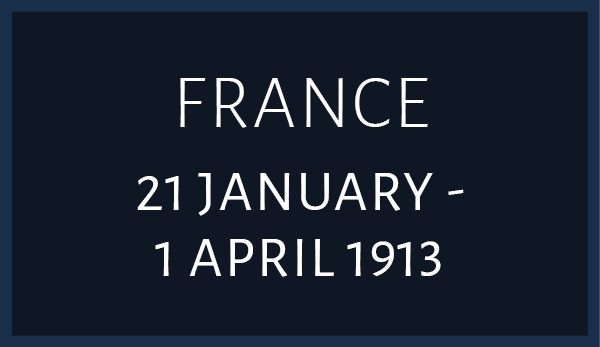
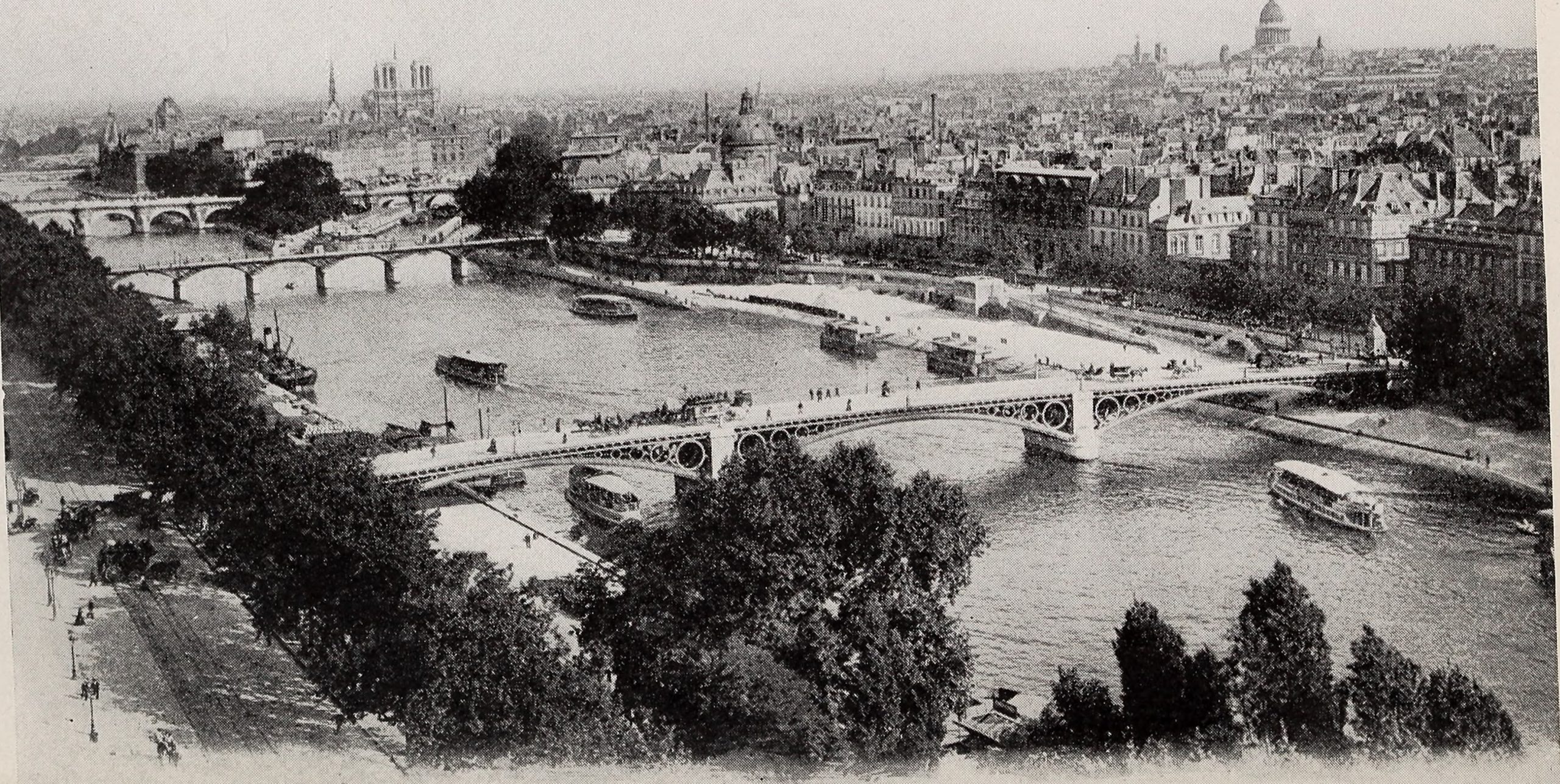
Paris in 1913. Wikimedia Commons.
During His two stays in Paris between January and June 1913, 'Abdu'l-Bahá manages the logistics of arranging housing and travel for His daughter Rúḥá Khánum, who comes to Paris for a throat operation, and visits her very frequently before and after the surgery. During His second visit to Paris, unlike His first, 'Abdu'l-Bahá gives very few public lectures. He does, however, have an extraordinary prolific meeting schedule, and gives informal daily talks to three types of audiences:
- Bahá'ís;
- Persian, Ottoman, and Arab notables;
- French/foreign intellectuals, artists, and religious/spiritual leaders.
The most unusual characteristic of the Paris Bahá'í community in 1913 is the lack of local French believers. The Paris community is largely made up of American, English, Persian, Russian, and South African believers with almost no French Bahá'ís, apart from rare exceptions, most distinguished among which is the wonderful Hippolyte Dreyfus, the first French Bahá'í, but also including Georgine d'Ange d'Astre, Paul Richard, and Victor and Fanny Ponsonaille, even though the latter live outside Paris walls.
During the first part of His 1913 stay in Paris, 'Abdu'l-Bahá has many conversations with the believers in Paris about how to overcome the obstacles posed by materialism and reach the hearts of Parisians, the most significant of which are shared below, by date. This section is perhaps one of the most relevant sections of the entire chronology for our current daily reality because we see 'Abdu'l-Bahá working closely with local believers to find ways to teach the Faith, and to find receptive souls in a materialistic society. It is moving to see how directly, frankly, and openly 'Abdu'l-Bahá addresses the problem of how to bring spirituality and God into conversation with people who are not open to such topics, something many of us, in our respective communities, deal with on a daily basis. When you read 'Abdu'l-Bahá's words comparing Parisians to well-fed horses, bees, earthworms, we urge you to think beyond 1913. Paris, in terms of its materialistic and hedonistic excesses, was light-years ahead of all the other cities 'Abdu'l-Bahá visited. Tragically, now, the world is in its entirety, with perhaps some exceptions, at the level of materialism that Paris was when the Master was making His regretful observations. In this section, 'Abdu'l-Bahá even speaks about atheism, which is becoming a reality as the excesses and misuse of religions become rampant.
On the bright side, it is also fascinating to observe how all 'Abdu'l-Bahá's predictions about how "this indifference will be changed into a deep and lasting interest and in the very center of Paris the Standard of Bahá'u'lláh shall be upraised" come to be realized: today, the National Bahá'í Center of France is located in what still can be considered the extended center of Paris, in the prestigious 16th arrondissement, not far from the Arc de Triomphe.
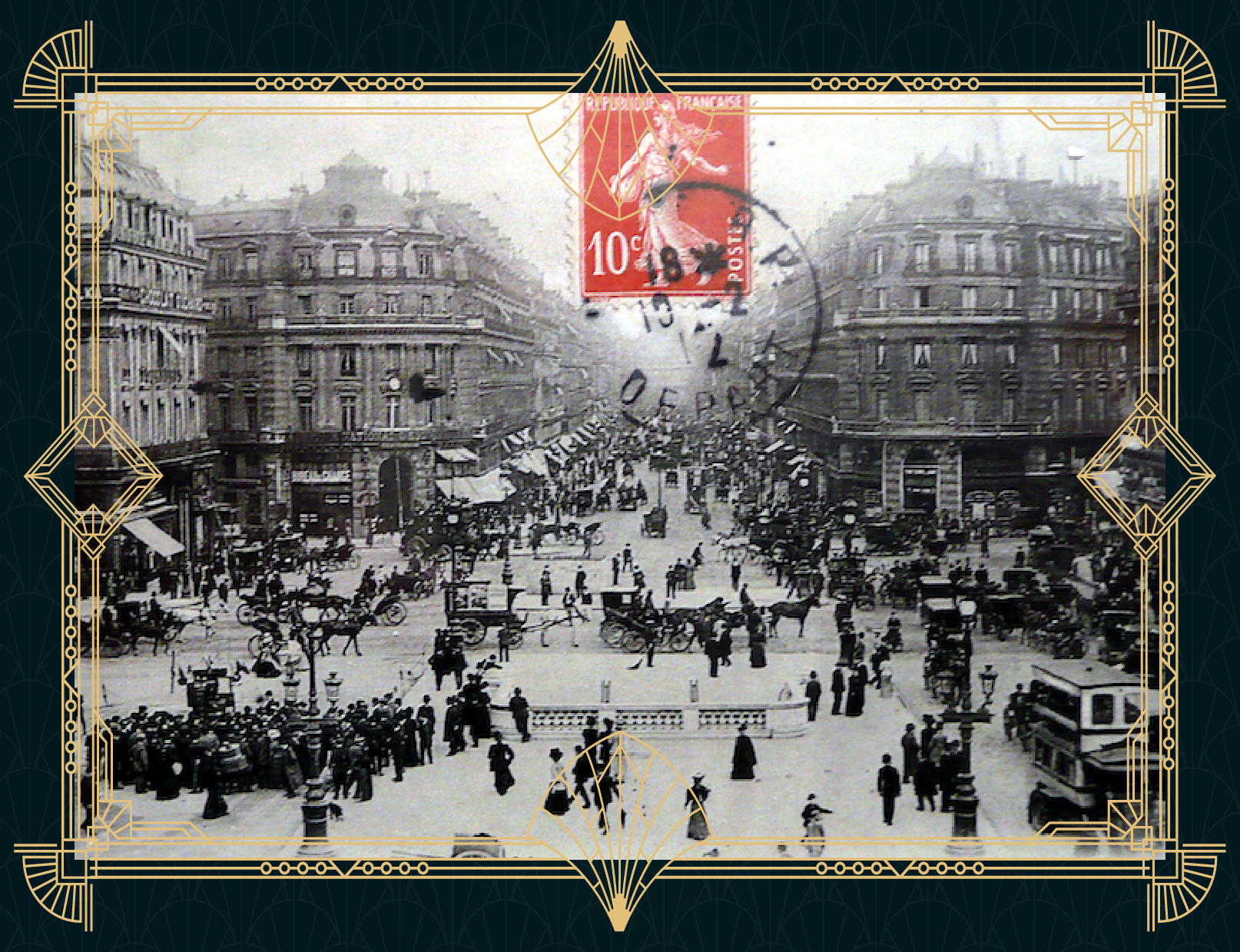
Ahmad Sohrab quotes ‘Abdu'l-Bahá's words on the spiritual destruction affected by materialism:
The Parisian people are submerged in the sea of materialism. They are intoxicated with the wine of desire and selfish appetites. They think these material objects are permanent. They put their trust in them while all such things are subject to change. Today the palaces of the ancient kings are destroyed, The fishermen dry their nets on the ruined walls and the owls are making their nests in the cornices. It is my hope that you may enkindle such a lamp in Paris as to make city city radiant. Man must lay the foundation of such a palace, which may stand the encroachment of time, day unto day it may become newer, and its imperial pinnacles reach to the height of the heaven.
Jan Jasion, 'Abdu'l-Bahá in France: 1911 & 1913, page 301
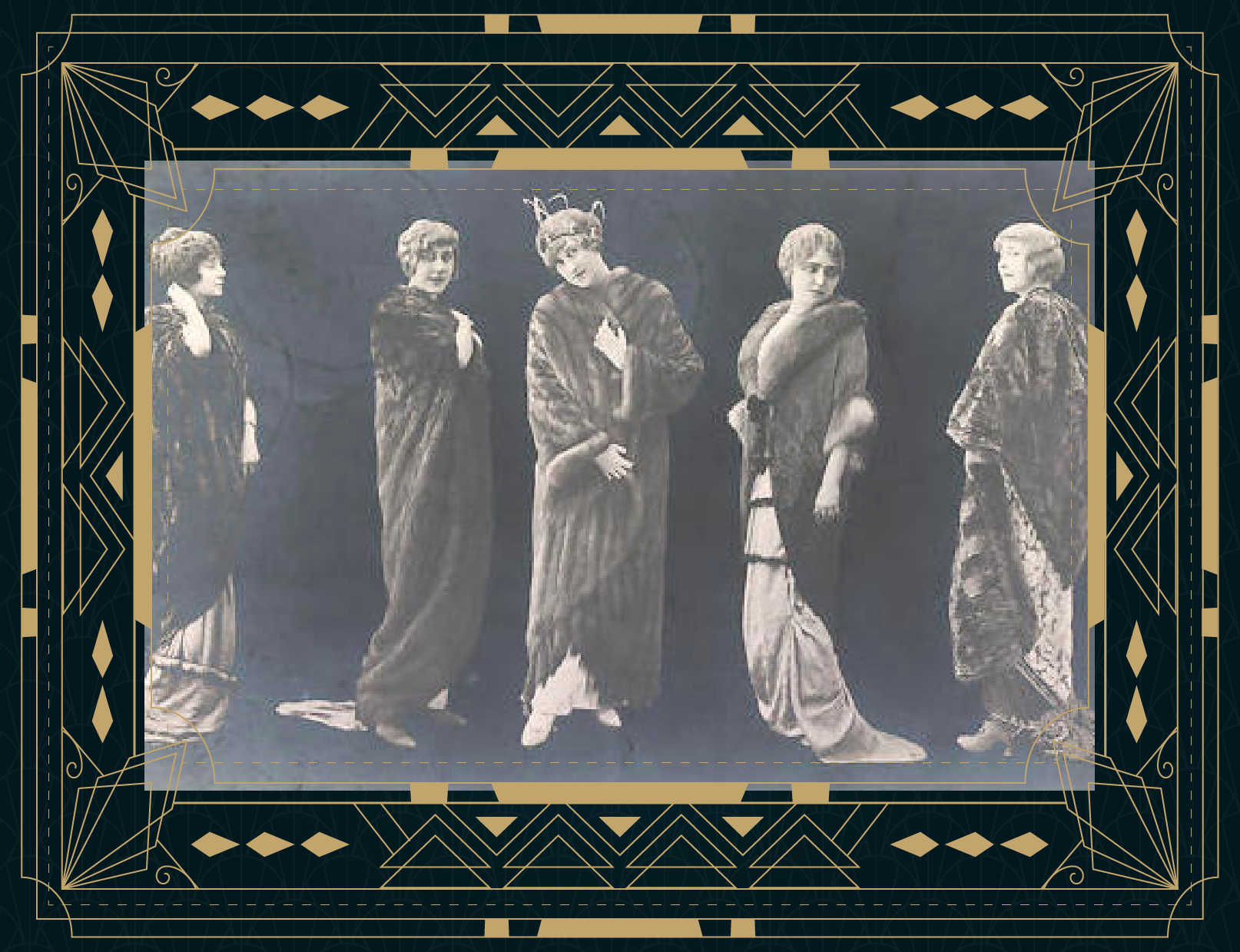
Parisian silhouettes, fur coats, Winter 1913-1914, fashion magazine. Source: Wikimedia Commons.
I have come again to Paris so that I may see if the seed I have sown last year has sprung up. Praise be to God, I can see that they have taken root. On this account I am very happy. I hope that this cause will not remain stationary but that day-by-day these seeds will take firmer root in the ground and that these meadows may become succulent and full of flowers. That this ideal illumination may become manifest.
Jan Jasion, 'Abdu'l-Bahá in France: 1911 & 1913, page 305
May you become more illumined day by day. May you be the means of making Paris radiant, for this city is very dark. Parisians are submerged in the sea of materialism. They are living upon the earth; may you give them wings whereby to soar. Be ye hopeful! God will confer upon you a great power, so that you may become enabled to deliver them from this dungeon. Then they shall hear the song of the Kingdom. Continue to keep your meetings. Be kind to all the newcomers. The more you show them kindness, the better it will be. Be ye kind to everyone. When you meet them, tell them how happy you are to see them, show the happiness in your face, in your words, and in your actions. Then they will be attracted to the Cause.
Mírzá Ahmad Sohrab letter to Harriet Magee, 27, January 1913
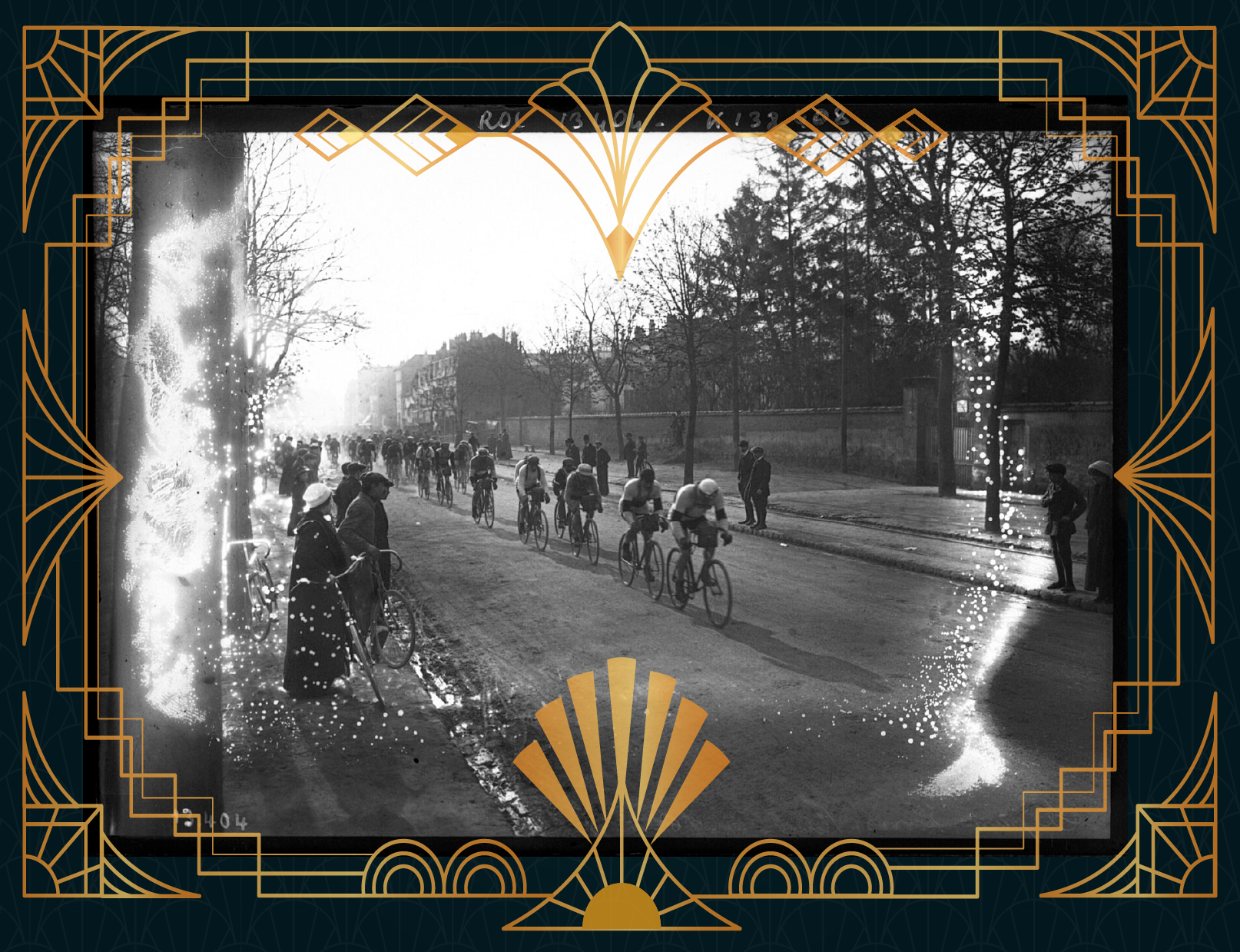
Start of Paris-Roubaix bicycle race in 1911. Source: Wikimedia Commons.
'Abdu'l-Bahá starts His noonday address today by speaking about Paris, to the assembled friends by speaking about the different kinds of trees. Some trees grow and develop rapidly and others take a long time before showing forth leaves and blossoms. 'Abdu'l-Bahá says it is evident that Paris is one of these trees which may take a long time to grow, and that it is His hope that it may give much fruits. Paris in reality is a very artistic city. It has many interesting sights for the tourists. Many charming spots to intrigue the eyes. 'Abdu'l-Bahá ventures to say that one might state that material civilization has pitched its tents in Paris; but the tent is so big that there are great patches of obscurity under it. It is His hope that very luminous lamps may be enkindled under this tent so that the darkness may be dispelled. These lamps are the Bahá'ís, and it is 'Abdu'l-Bahá's hope that they may cast their rays all around, that they may bestow light, so that they may become able to free these souls from the darkness of the world of nature.
At another point in the day, ‘Abdu'l-Bahá says:
Paris is like unto a green meadow, the people are like unto the sheep, they are grazing in this meadow, they drink of the flowing streams. The materialists, cow-like, graze also with the rest. They never raise their heads to see whether there is any heaven or any stars. They are submerged in the sea of materialism...Some souls are like unto dry wood, others are like unto wet wood and there are others who are like unto the stones.
Mírzá Ahmad Sohrab letter to Harriet Magee, 28, January 1913
In the morning, when Ahmad Sohrab enters the presence of 'Abdu'l-Bahá, the Master says: "Paris is very cold. Can you do something to make it warmer?" Then 'Abdu'l-Bahá continues, by saying He was happy in London, although He had not been feeling well. Continuing, He says:
"Here, my health is very good, but I am very unhappy because I observe that people are thinking of everything else except God. Paris is like unto a beehive: the people are the bees. They are busy honey-making but their honey consists of the pursuits of pleasure and the gratification of desires."
Mírzá Ahmad Sohrab letter to Harriet Magee, 29, January 1913
That same day, in speaking to an Eastern Bahá'í, 'Abdu'l-Bahá explains to him that it is only the beginning of the promotion of the Cause of God in this city. Paris is very dark, He says, but He is hopeful that through the Bestowals of the Most Great Luminary, that in the centre of this pitched darkness, the Divine Lamp may become ignited. His Power alone transforms the dark earth into luminous substance and suffering the hard rock to yield flowers and hyacinths. He is now sowing the seeds and and it may take sometimes before they germinate in the soil.
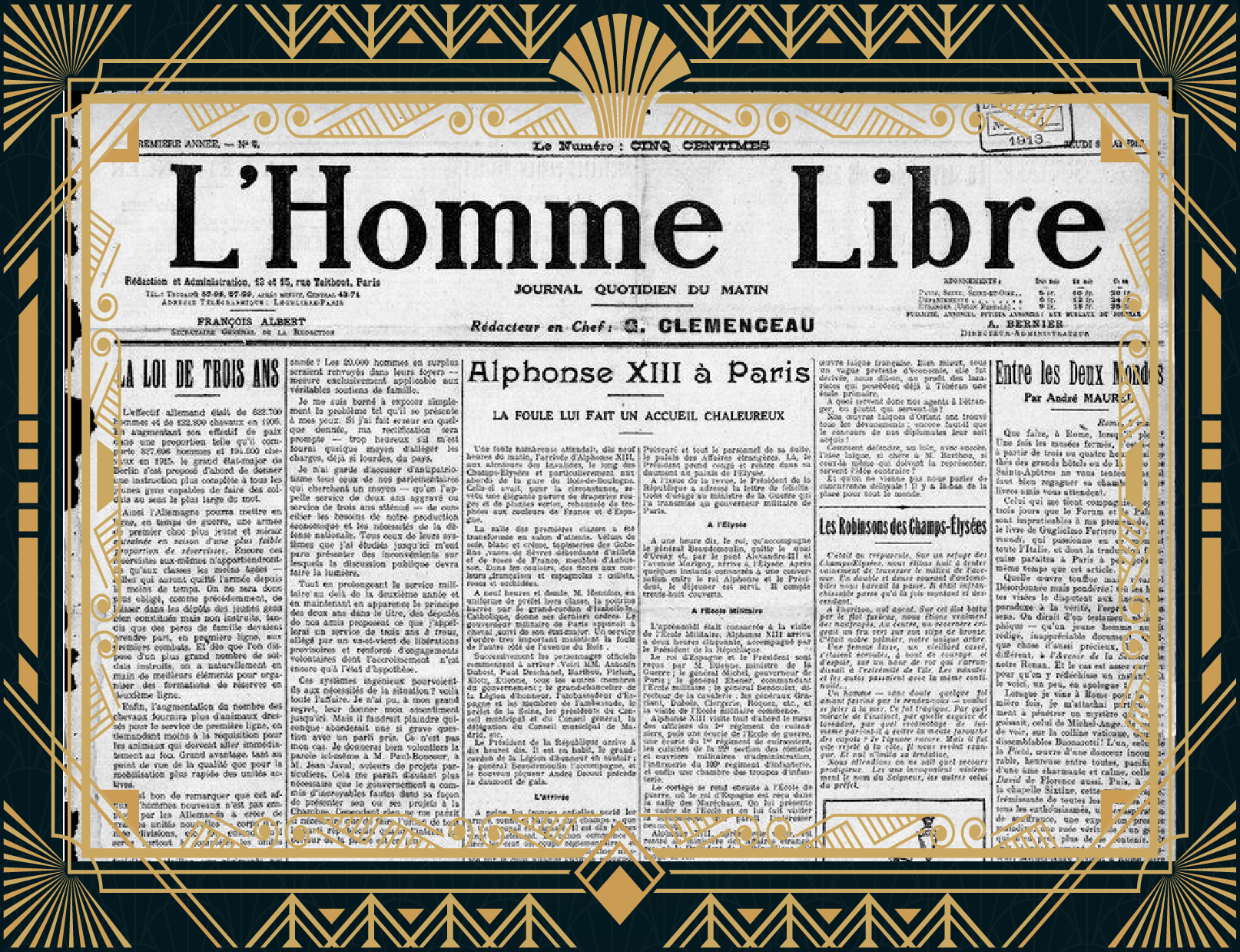
"L'Homme libre" (The Free Man) number 4, May 8, 1913, page 1. Source: Wikimedia Commons.
Mírzá Ahmad Sohrab paraphrases 'Abdu'l-Bahá's powerful words at some point during the course of the many interviews with friends He has this day. This same imagery and the content of 'Abdu'l-Bahá's words can also be found identically reported in Mahmud's European Diary but under the date of January 28.
The Master says He has come to Paris, but finds Paris is very cold. He was anticipating that in this trip He should behold in this city the luminous torch of the Love of God. Now having arrived, He finds that the inhabitants are steeped deeper in the darkness of materialism. Every mention is on their lips except the mention of God. They entertain every thought except the thought of the Kingdom of God. Every call is being heard in Paris except the call of the world of Light. As He ponders over this condition of the Parisians, He finds that like unto the worms, they are crawling in the dark strata of the earth. Day unto Day they are going deeper and deeper, never desiring to extricate themselves from the gloom of these narrow labyrinths of the earth. Therefore, it is His hope that the friends who are living in Paris may show an effort, and may make a movement, that perchance its inhabitants may obtain a new tongue, may receive an new exhilaration, may take a goodly portion, and a share from the heavenly illumination.
Mírzá Ahmad Sohrab letter to Harriet Magee, 29, January 1913
On that same day, 29 January 1913, 'Abdu'l-Bahá speaking to Georgine d'Ange d'Astre tells her that "the sleepy ones must become mindful":
When a person is a light sleeper, one single touch will awake him, if he sleeps heavily, then one must awake him by shaking him. Another person may sleep so soundly that he may need a big stick so as to awaken him. But if the big stick does not give the desired effect, we may have to bring into service the noise of a cannon and if now this will not also awake the sleeper we will then have to use dynamite. In short, the sleepy ones must become mindful. I give you the glad tidings that this indifference will be changed into a deep and lasting interest and in the very center of Paris the Standard of Bahá'u'lláh shall be upraised.
Jan Jasion, 'Abdu'l-Bahá in France: 1911 & 1913, pages 327-328

Sometime during the day on February 7, 1913, 'Abdu'l-Bahá and 19 Persians pose for a photograph underneath the Eiffel Tower. This photograph is emblematic of 'Abdu'l-Bahá's visits in France because He is in front of the ultimate iconic French landmark, the Eiffel Tower. But the photograph is even more emblematic of His 1913 visit to France because it shows 'Abdu'l-Bahá surrounded by Persians in France, which is an accurate, given the intensity and frequency of His association with Persian, Ottoman, and Arab notables, princes, and diplomats during this stay.
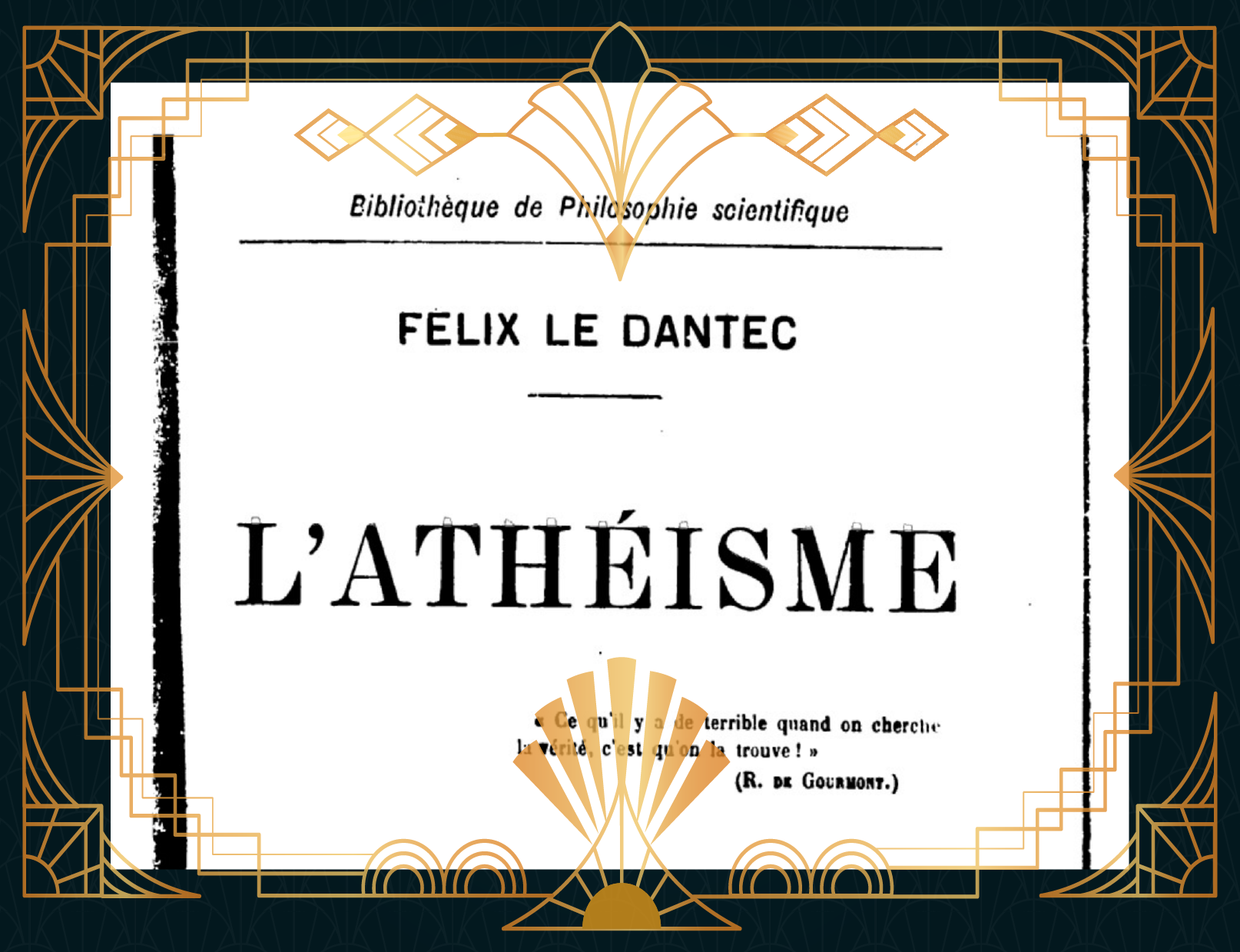
Bibliothèque de philosophie scientifique: Atheism by Félix Le Dantec. Cover quote: "The terrible thing, when are you seeking truth, truth is that you find it!" - R. De Gourmont. Source: Gallica.
On 14 February 1913, after a very emotional chant by Mírzá 'Alí-Akbar-i-Rafsanjáni, 'Abdu'l-Bahá speaks to members of His entourage about heedlessness:
It is very strange that in Paris one may chant the prayers of Bahá'u'lláh. The people of Paris are very heedless. They are in the pursuit of worldly pleasures and amusements. The majority working all day, spend their earnings during the night either on theater or drink or gratification of passion. They know nothing of God. Darkness has environed them. The darkness of religion, the darkness of morals and the darkness of heedlessness prevent men from seeing even their own hands. These are three waves of darkness one over another.
Jan Jasion, 'Abdu'l-Bahá in France: 1911 & 1913, page 365
The same day, 'Abdu'l-Bahá revisits this theme speaking about atheism:
The people of Paris are of two kinds, first the followers of the so-called religion; second, the free thinkers. The former follows blindly the priests; the latter does not like to hear the word of religion mentioned. However, all these shall change. The power of the world of God shall influence the hearts to such an extent that not a trace of these thoughts shall remain. There have been atheists always but when the religion of God becomes manifest all these things are forgotten.
Jan Jasion, 'Abdu'l-Bahá in France: 1911 & 1913, page 383

On February 16, 1913, 'Abdu'l-Bahá goes with Hippolyte Dreyfus to visit the French photographer Valentin Vaucamps who wants to take a natural color photograph of the Master. Jan Jasion believers the photographer's studio is located at 12, Avenue de la grande armée in Paris, but the address it not entirely certain.
Vaucamps obtained a patent in France in 1895, a second one in the United States in 1898 for his process of color photography, and a third patent relating to a special photographic paper for color photography. This photograph of 'Abdu'l-Bahá is part of the world history of color photography. It was published in the Roger Ballone and Luc Fellot encyclopedia of the art entitled "Histoire mondiale de la photographie en couleurs" (Paris: Hachette, 1981).
The reason most websites erroneously indicate the date of this photograph as 1911 is because in the 1992 reprint of the 1981 "The Crown of Beauty: The Bahá'í Faith in the Holy Land," the photographer is erroneously identified as Nadar and the date wrongly listed as 1911.
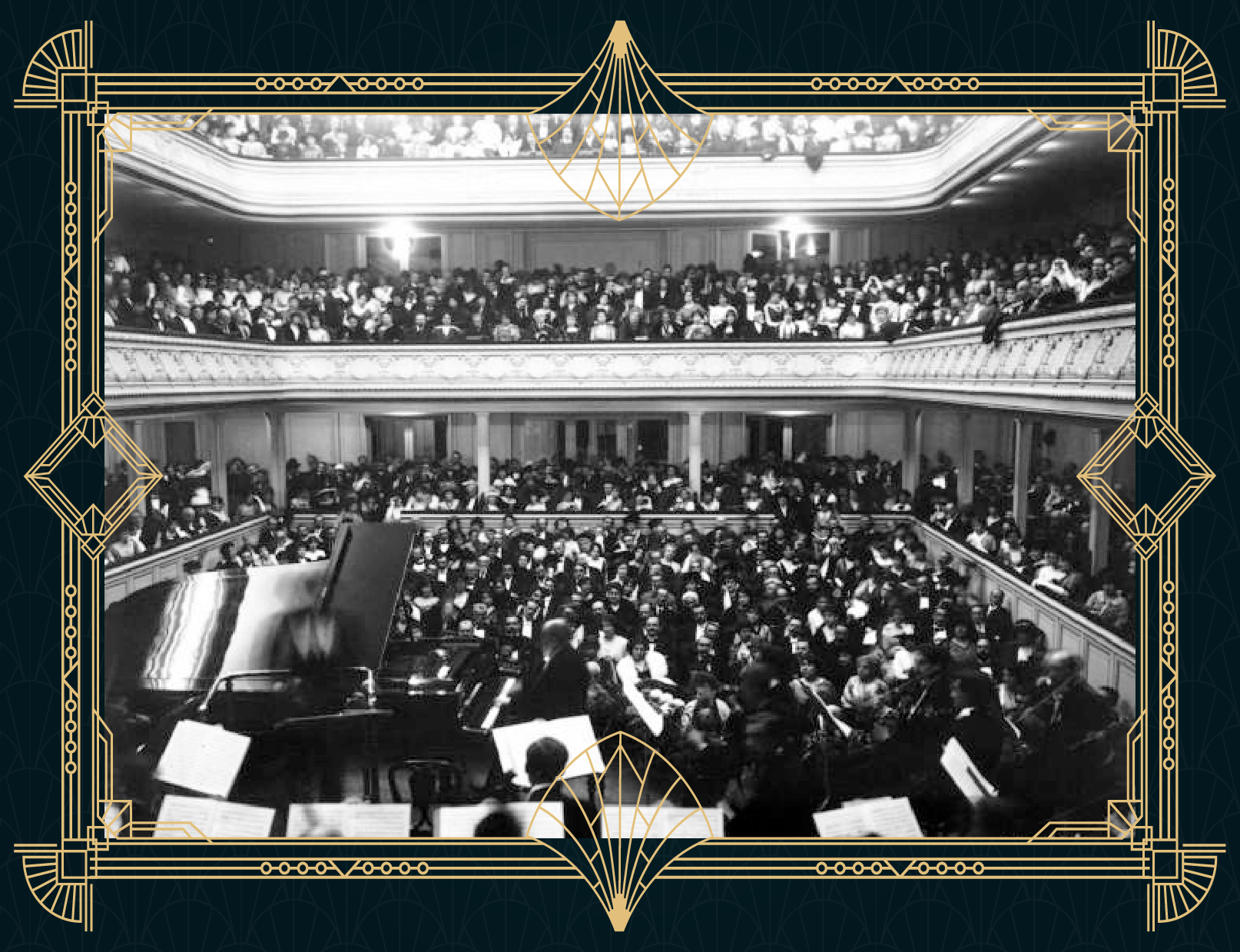
Camillle Saint-Saëns, Salle Gaveau, Paris, 1913, Source: Wikimedia Commons.
This morning we drank tea in the presence of Our Beloved. In His personal remarks He was sad and melancholy. A tone of regret ran through every phrase He uttered: How dead to all spiritual emotions are the people of Paris!" He regretfully said. "The inhabitants of this city are engrossed in the whirlpool of pleasure and self-gratification. When I look upon Paris it seems to me, it is like unto a corpse on which creep thousands of worms. These worms climb up and down through the dead putrefied corpse sucking its blood and pleased with its flesh. They do nothing else."
Jan Jasion, 'Abdu'l-Bahá in France: 1911 & 1913, page 421
20 February 1913, 'Abdu'l-Bahá's noonday talk at 30, rue St. Didier
Now Europe in reality is in the utmost beauty and adornment. Material civilization has advanced greatly. It is a body in the utmost of comeliness, but regrettable it is that it is not animated by the Spirit. How pitiful that it has not the heavenly illumination! How sad that it does not enjoy the Breaths of the Holy Spirit. It is a mirror in the utmost of transparency but a thousand times alas! That the rays of the Sun of Reality are not reflected therein. It is a tree most verdant and elegant but alas it produces no fruits. It is a flower with great delicacy and loveliness but how pitiable it lacks sweet fragrance. Outwardly it is very progressive but spiritually it has no motion whatsoever. Come! Will you? Come ye together! Concentrate your spiritual forces. Arise with much fervour and enthusiasm. Show ye a united effort. Let a new attraction take possession of your hearts. Let a new spirit sweep over your temples, so that the host of the Fire of the Love of God which is enkindled in your holy of holies may flame forth and set a spiritual conflagration to the whole of Europe. It is a pity you must not rest day and night till you have breathed a new spirit and ignited a light in this lamp.
Jan Jasion, 'Abdu'l-Bahá in France: 1911 & 1913, page 423
9 March 1913, 'Abdu'l-Bahá's Prayer for Paris
O God! This Paris is a lamp in the utmost transparency but it is in need of the light. It is a body in the greatest of comeliness but it is in need of the spirit. O God, illumine this lamp. And confer life upon this body. It is a pity that Paris be deprived of Your eternal bestowals. It is a pity that a great city like unto this be prevented from obtaining the splendours of the sun of Thy Mercy. O God! Awaken these souls. Make them mindful.
Jan Jasion, 'Abdu'l-Bahá in France: 1911 & 1913, page 476
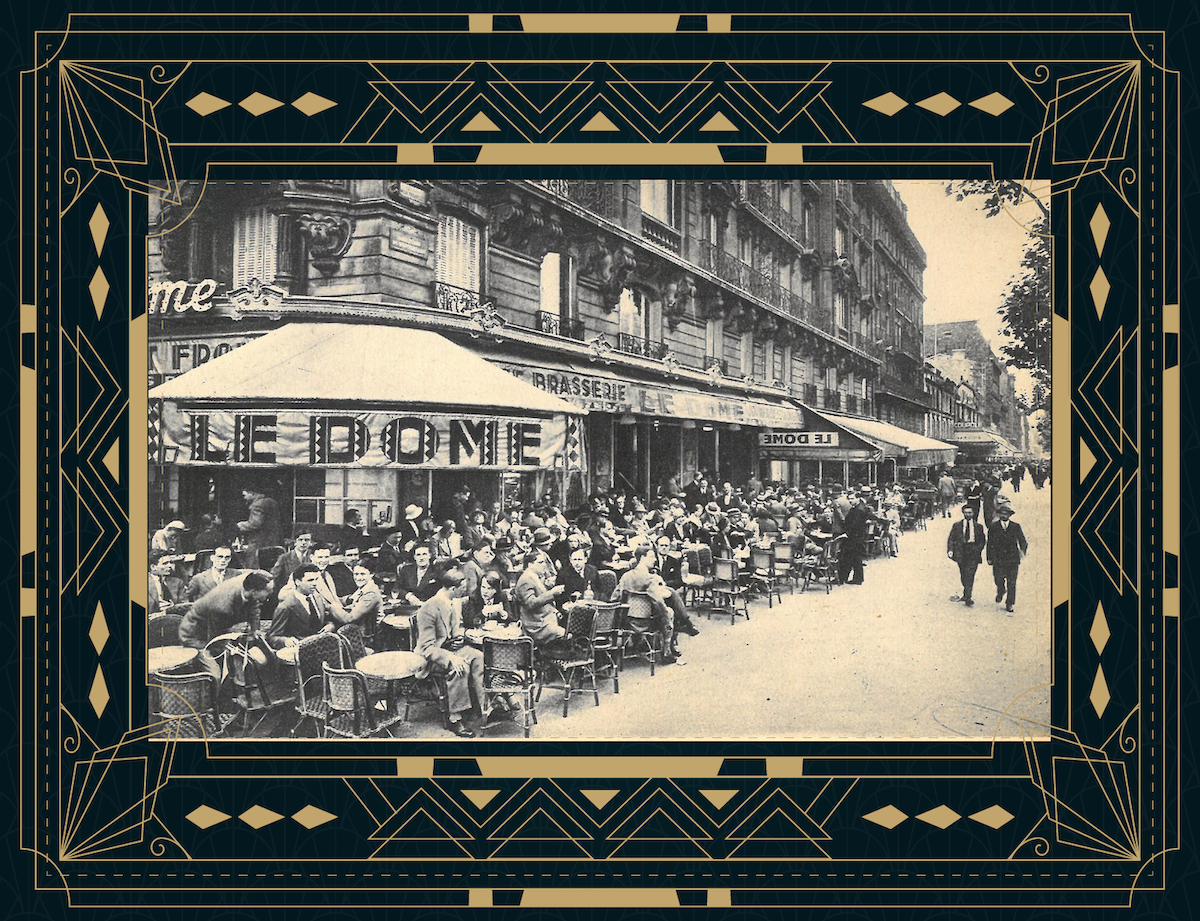
One night I got out of my bed to turn the electric button. I was so weak that I fell on the floor and swooned. For a long time I was unconscious. Then when I came to myself cold perspiration ran throughout all my body. With the greatest difficulty I arose and reached myself the bed. Then I went under the coverlet and was shaking with cold. Under such conditions I have stayed in Paris hoping that the Fire of the Love of God will be ignited in the hearts. Otherwise I have nothing to do in this city.
Jan Jasion, 'Abdu'l-Bahá in France: 1911 & 1913, page 483
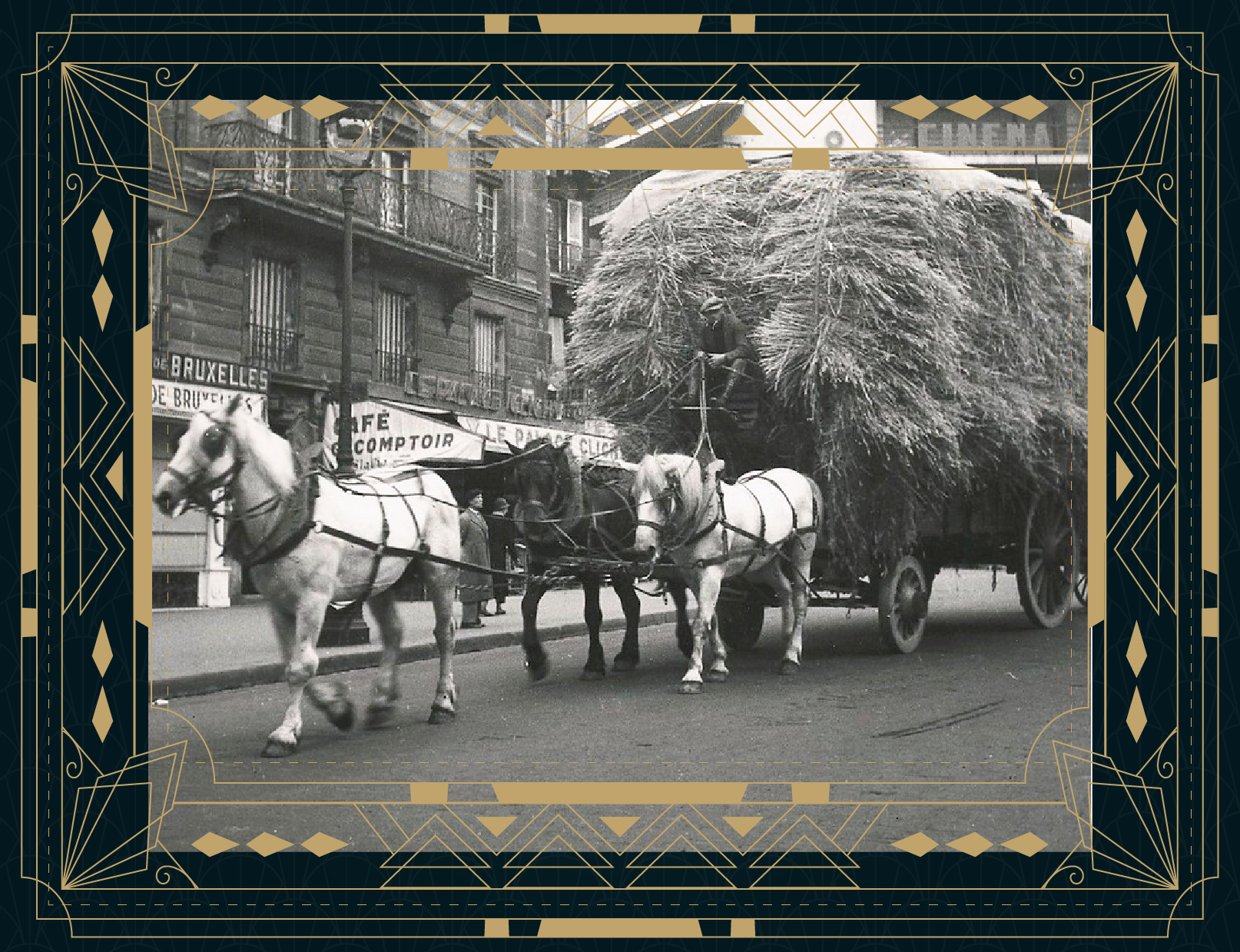
On 18 March 1913, 'Abdu'l-Bahá addresses a few Persians on the topic of materialism in Paris, a talk that is also faithfully reported in Mahmud's European diaries:
Paris is like a very large, clean stable where many millions of horses are well-fed, well-kept and well-trained; but you do not expect to find spirituality, the knowledge of God, the Love of God in a stable. Do you? If you do find, then God has worked a miracle.
Jan Jasion, 'Abdu'l-Bahá in France: 1911 & 1913, page 496
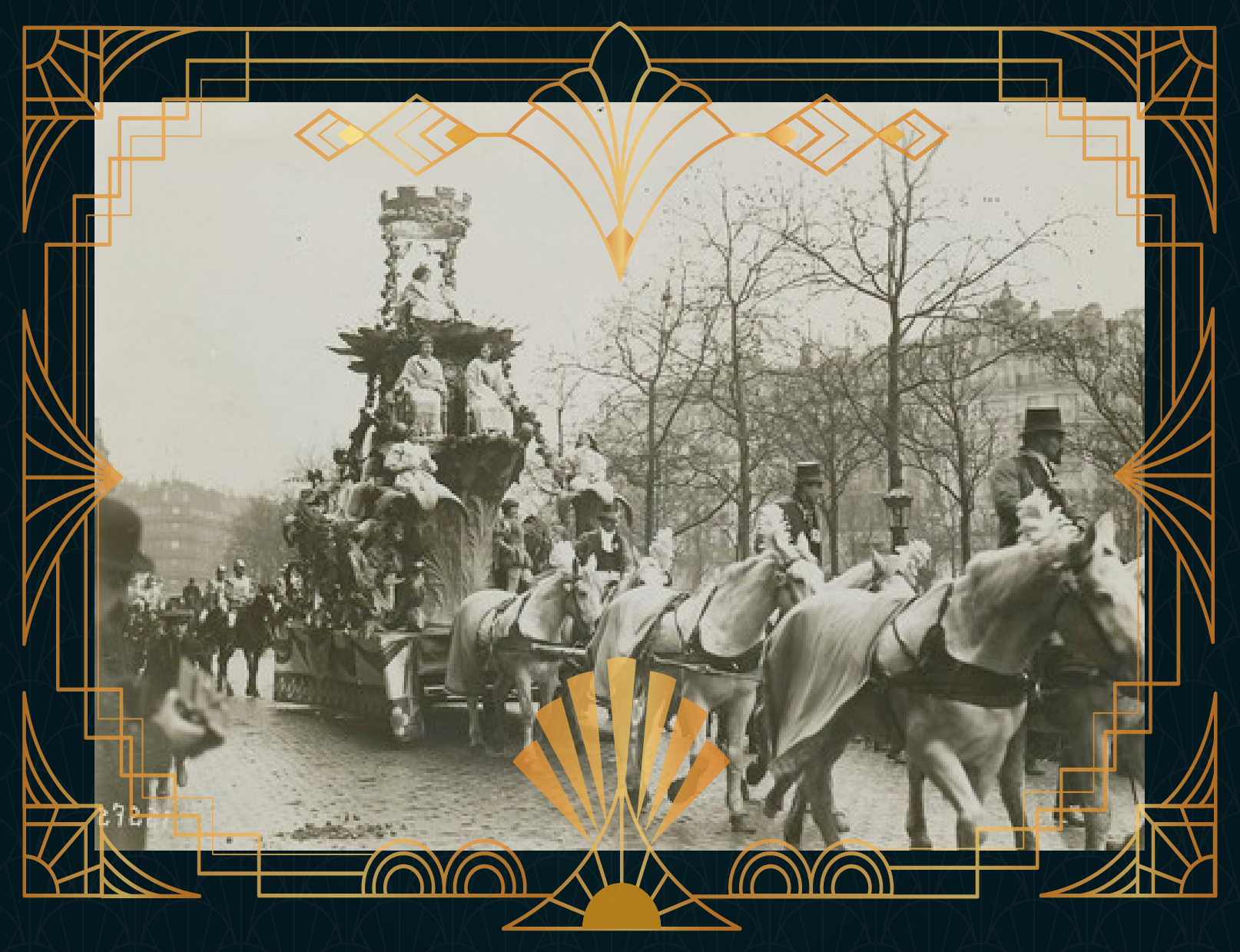
Through the open window of His compartiment, 'Abdu'l-Bahá gives the gathered believers one last important piece of advice before He leaves for Germany and Central Europe:
I shall never forget you. You will be always in my memory. I leave you here as my own souvenirs. May God assist and confirm you! My last advice to you is to arise in the spreading of the Cause and the teaching of the souls.
Jan Jasion, 'Abdu'l-Bahá in France: 1911 & 1913, page 538
To be continued after Germany, Hungary, and Austria
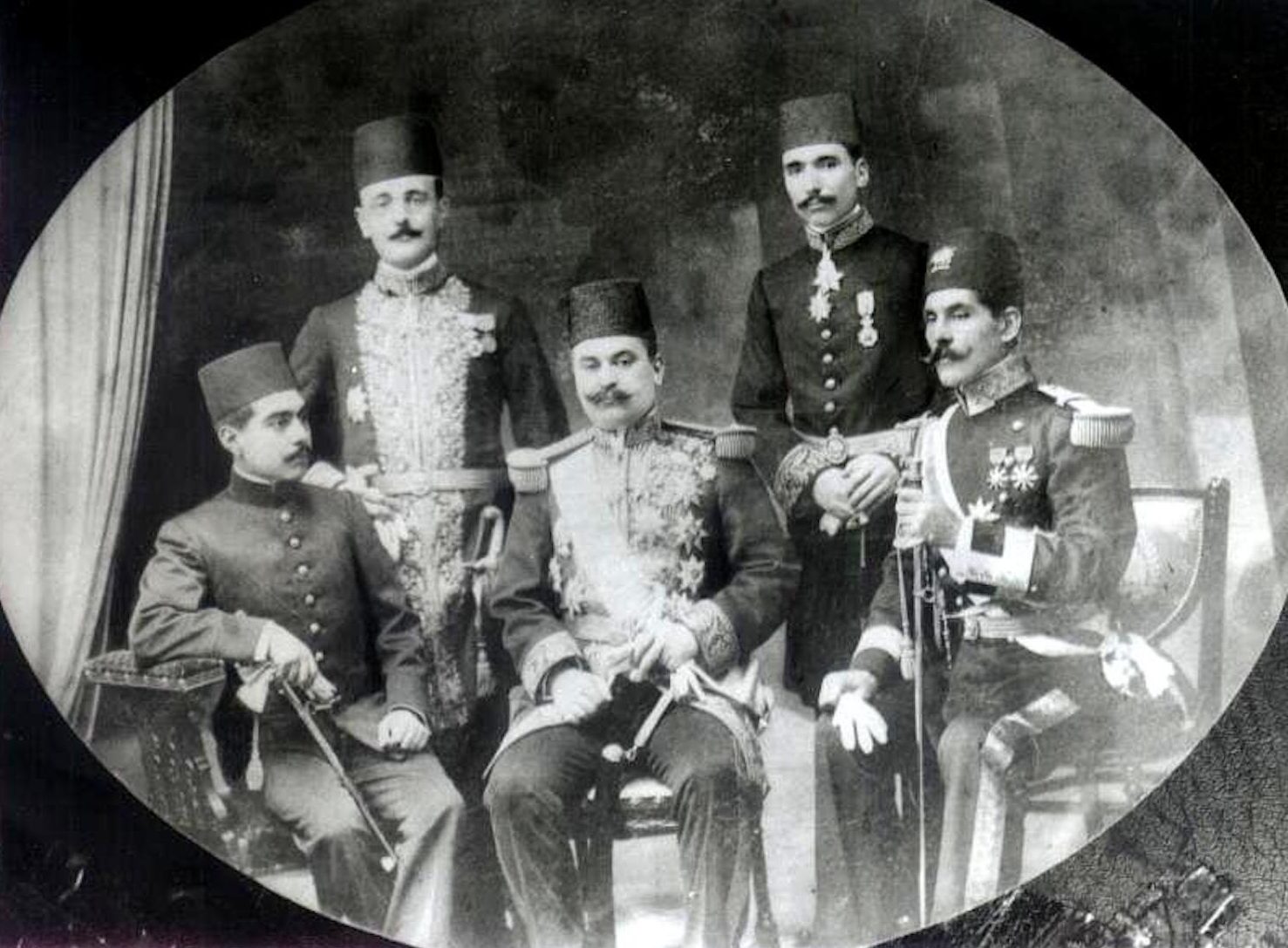
The Persian Delegation at the funeral of King Edward VII , 20 May 1910. Exactly three years later, 'Abdu'l-Bahá will have numerous meetings with two important men in this photograph: ‘Abdu’ṣ-Ṣamad Khán, the Mumtázu’s-Saltaníh, the Persian Ambassador, seated in the middle of the photograph, and Nuṣratu’d-Dawlih (the Triumph of the State), aka Fírúz Mírzá Fírúz, the son of Prince ‘Abdu’l-Ḥusayn Farmánfarmá and the Persian attaché in Paris, seated to his left, leaning on his sword. Wikimedia Commons.
'Abdu'l-Bahá has previously met with Persian and Ottoman diplomats, not only in Paris in 1911, but also in New York and Washington D.C. in 1912 and in England in 1911, in 1912 and in 1913. But the intensity with which He meets with Persians, Ottomans, and Egyptians, princes, sons of princes, brothers of princes, attachés, ambassadors, ministers, diplomats, generals, former governors is simply extraordinary. And we will present, as accurately as possible, 'Abdu'l-Bahá's staggering efforts to reach out to these diplomats and notables during His stay in Paris in 1913. This section and its follow-up after 'Abdu'l-Bahá's return from Central Europe are very long, but are a precise and essential historical record of 'Abdu'l-Bahá's feat in elevating the status of the Faith of Bahá'u'lláh in the eyes of the Eastern ruling class.
It is important to bear in mind three additional things:
First, almost all of the notables 'Abdu'l-Bahá meets in Paris are either directly involved, or just one or two generation removed from fathers and grandfathers who despised the Bahá'í Faith and virulently persecuted the Báb and Bahá'u'lláh and Their followers.
Second, 'Abdu'l-Bahá's stay in Paris is perfectly nestled between two important events, where many of the diplomats and notables attend and give them an opportunity to meet with The Master.
- The London Peace Conference (London, September 1912 – August 1913), aimed at ending the First Balkan War; and
- The Arab Congress of 1913 (Paris, 18 - 23 June 1913), aimed at discussing increased autonomy for Arab people (most notably Egyptians, who called for the Congress) living under Ottoman rule;
Third, no matter how impressive the portrait we attempt to paint here seems, we must remember it is only a partial picture of what must have been an even more intense few months. 'Abdu'l-Bahá's secretaries and prolific diarists Ahmad Sohrab and Mírzá Maḥmúd-i-Zarqání both received instructions from 'Abdu'l-Bahá at various times to either redact their diaries, not to name certain individuals, or record information pertaining to certain meetings. This explains why we have so little information on the important meeting that takes place on June 6, 1913.
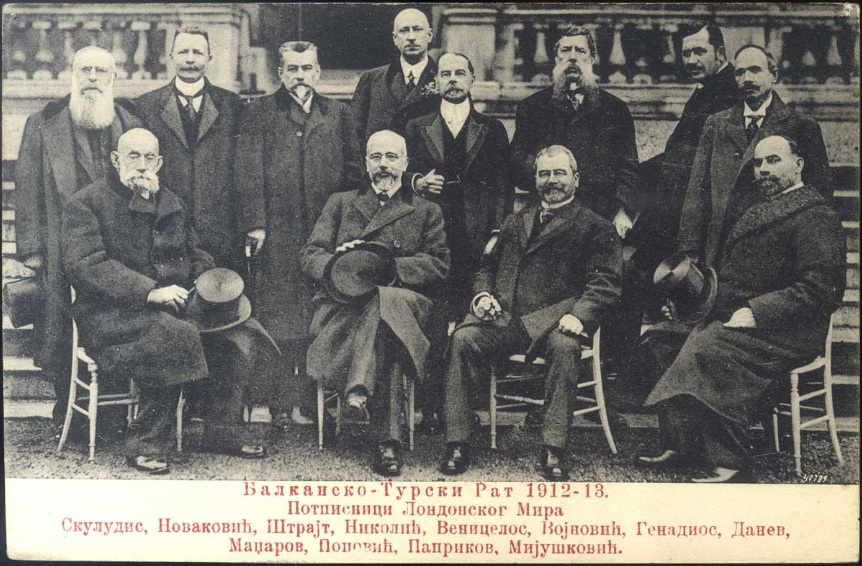
Delegates of Balkan States at the London Conference of 1912–13. From left to right: Stephanos Skouloudis (Greece), Stojan Novakovic (Serbia), Georgios Streit (Greece), Andra Nikolic (Serbia), Eleftherios Venizelos (Greece), Lujo Vojnovic (Montenegro), Ioannis Gennadios (Greece), Stoyan Danev (Bulgaria), Michail Madjarov (Bulgaria), Jovo Popovic (Montenegro), Stefan Paprikov (Bulgaria), Lazar Mijushkovic (Montenegro). Wikimedia Commons.
January 1913
22 January 1913: The day after 'Abdu'l-Bahá arrives in Paris, He is visited by a number of Persian princes including the Persian attaché Nuṣratu’d-Dawlih, Fírúz Mírzá Fírúz (seated on the left in the first photograph of this section), Dúst-Muḥammad Khán, the Mu‘ayyiru'l-Mamálik (with whom 'Abdu'l-Bahá just spent a considerable amount of time in England and who saw him just 3 days ago in London when he tried to kiss the Master's hand) and Mírzá Míhdí Khán-i-Ghaffarí (Vazír-Humáyún (Deputy to the King), Qá’im-Maqám (Vicegerent)), a Persian Bahá’í who held a number of governorships. 'Abdu'l-Bahá speaks to them about His Journey to America and His talks in various churches and peace societies.
Sometime this week: The Persian attaché, Nuṣratu’d-Dawlih arrives to visit 'Abdu'l-Bahá after the philosopher Henri Bergson has left. The attaché had wanted to participate in the conversation and is astonished to hear that 'Abdu'l-Bahá has, in essence, "won" a spiritual argument with the materialist philosopher.
23 January 1913: Dúst-Muḥammad Khán returns to see 'Abdu'l-Bahá the very next day with the secretary of the Persian legation, on behalf of the Ambassador of Persia to France. Jan Jasion posits that the First Secretary of the Persian legation is perhaps Ardishír Khán Naẓar-i-Áqá, who is a member of a distinguished Persian family of diplomats living in Paris: his father is the former Persian ambassador to France, General Naẓar-i-Áqá and his brother is Yúsuf Khán Naẓar-i-Áqá, the first Counsellor of the Persian Legation. They have a conversation with 'Abdu'l-Bahá on the history and the intricacies of the current situation in Turkey and Persia.
24 January 1913: Three "important Persians" call on 'Abdu'l-Bahá after lunch. It is important to note that for some of these meetings, 'Abdu'l-Bahá may have asked the diarists, Ahmad Sohrab and Mahmúd-i-Zarqáni to redact the names of the people He met with. This is also important because we should remember that given this fact, the real number of Persian notables encountered and the number of meetings is most probably much higher than this sketch presents. After the three important Persians call on 'Abdu'l-Bahá, the Master sends some of the Persian Bahá'ís to see ‘Abdu’ṣ-Ṣamad Khán, the Mumtázu’s-Saltaníh (the Distinguished One of the Kingdom), the Persian Ambassador, on His behalf.
25 January 1913: A Bahá'í, Hájí Abu'l-Hasan-i-Ardakání brings two prominent Persian leaders of the recent revolution to 'Abdu'l-Bahá. One of the remarkable features of 'Abdu'l-Bahá meeting this politicians is that they are leaders of various Persian political factions. Some are in Paris because they have been exiled, and others are here for reasons of health, while others have come to support their children in school in France. The content of their conversations with 'Abdu'l-Bahá focuses on the recent events in Persia and its poor leadership, bowing down to foreign powers. To these men, on January 25, 1913, 'Abdu'l-Bahá speaks at length on Leadership. See Jan Jasion, '"Abdu'l-Bahá in France: 1911 & 1913," page 312.
26 January 1913: Dúst-Muḥammad Khán returns to see 'Abdu'l-Bahá in the early afternoon, and 'Abdu'l-Bahá tells him and other Persians present that if the Bahá'í Faith had appeared in America today, there wouldn't be a single soul who would not either be a Bahá'í, or a friend of the Faith.
27 January 1913: ‘Abdu’ṣ-Ṣamad Khán, the Mumtázu’s-Saltaníh, the Persian Ambassador, pays 'Abdu'l-Bahá a visit. We have no further details on what was said, but evidently a plan had been made, because on that same evening, 'Abdu'l-Bahá returns the courtesy and calls upon the Persian ambassador at his very beautiful Parisian home, located at 9, rue de Sontay in the prestigious 16th arrondissement of Paris.
28 January 1913: In the afternoon, 'Abdu'l-Bahá takes Mírzá Mahmúd-i-Zarqaní to pay a visit to ‘Abdu’ṣ-Ṣamad Khán, the Mumtázu’s-Saltaníh, the Persian ambassador, staying until the evening. Later, 'Abdu'l-Bahá receives the first visit of two eminent Ottoman notables: Ahmet Pașa (Aḥmad Páshá), a former Ottoman general in exile in Paris and Sâlih Münîr Pașa, a former Ottoman Minister in three ministries and current member of the Turkish delegation negotiating with the Balkan League in London to end the First Balkan War They are accompanied by their wives.
29 January 1913: Another Ottoman official pays 'Abdu'l-Bahá a visit, one the Master has known a long time: Reșid Mumtaz Pașa (or Mustafa Rashíd Mumtáz Páshá) the former Governor of Beirut (including Palestine) from 1897 to 1903, when 'Abdu'l-Bahá was re-incarcerated. Later, Reșid Mumtaz Pașa becomes a senator and minister of the interior. In 1913, he is the leader of the Ottoman delegation negotiating with the Balkan League in London to end the First Balkan War. When he was the governor of Beirut, Reșid Mumtaz Pașa was hostile and overbearing towards 'Abdu'l-Bahá, but in Paris, he is contrite and respectful. When he arrives, the former governor is immediately taken into 'Abdu'l-Bahá's room for an interview. That same evening, 'Abdu'l-Bahá visits the Ottoman diplomat in his home. The talks to end the Balkan war started in December 1912 but have been interrupted since the attempted coup on January 28. Reșid Mumtaz Pașa is in Paris on his way back to Istanbul to consult with his government when he meets 'Abdu'l-Bahá.
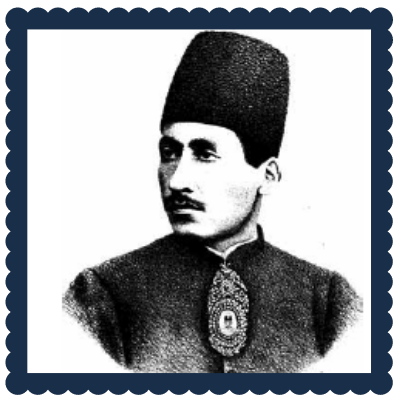
Mírzá Míhdí Khán-i-Ghaffarí (Vazír-Humáyún (Deputy to the King), Qá’im-Maqám (Vicegerent))
30 January 1913: In the afternoon, 'Abdu'l-Bahá receives the visit of a very prominent Persian notable: Mírzá Míhdí Khán-i-Ghaffarí (Vazír-Humáyún (Deputy to the King) also titled the Qá’im-Maqám (Vicegerent). Mírzá Míhdí Khán-i-Ghaffarí has recently arrived from Egypt and is a Bahá'í. 'Abdu'l-Bahá enquires from him after the health of Mírzá Abu’l-Faḍl and is rejoiced by the news He is given. Later, a senior member of the Persian Legation is waiting for 'Abdu'l-Bahá when He returns from visiting Hippolyte Dreyfus. Jan Jasion believes this Persian is Yúsúf Khán Naẓar-i-Áqá, the Counsellor of the Persian Legation, because Sohrab describes him as the "Chargé d'affaires", and there was no such post at the Persian Embassy at that time, the closest post to this being Counsellor of the Legation.
31 January 1913: Míhdí Khán-i-Ghaffarí, the Qá’im-Maqám, a Persian Bahá'í, returns to pay 'Abdu'l-Bahá a visit the next day. Míhdí Khán-i-Ghaffarí is a Bahá'í and one 'Abdu'l-Bahá calls His "old friend," a "firm Bahá'í," and "one who has served the Cause very faithfully," to Sohrab when he enters the room. The Master enquires about the Persian believers in a city in Persia.
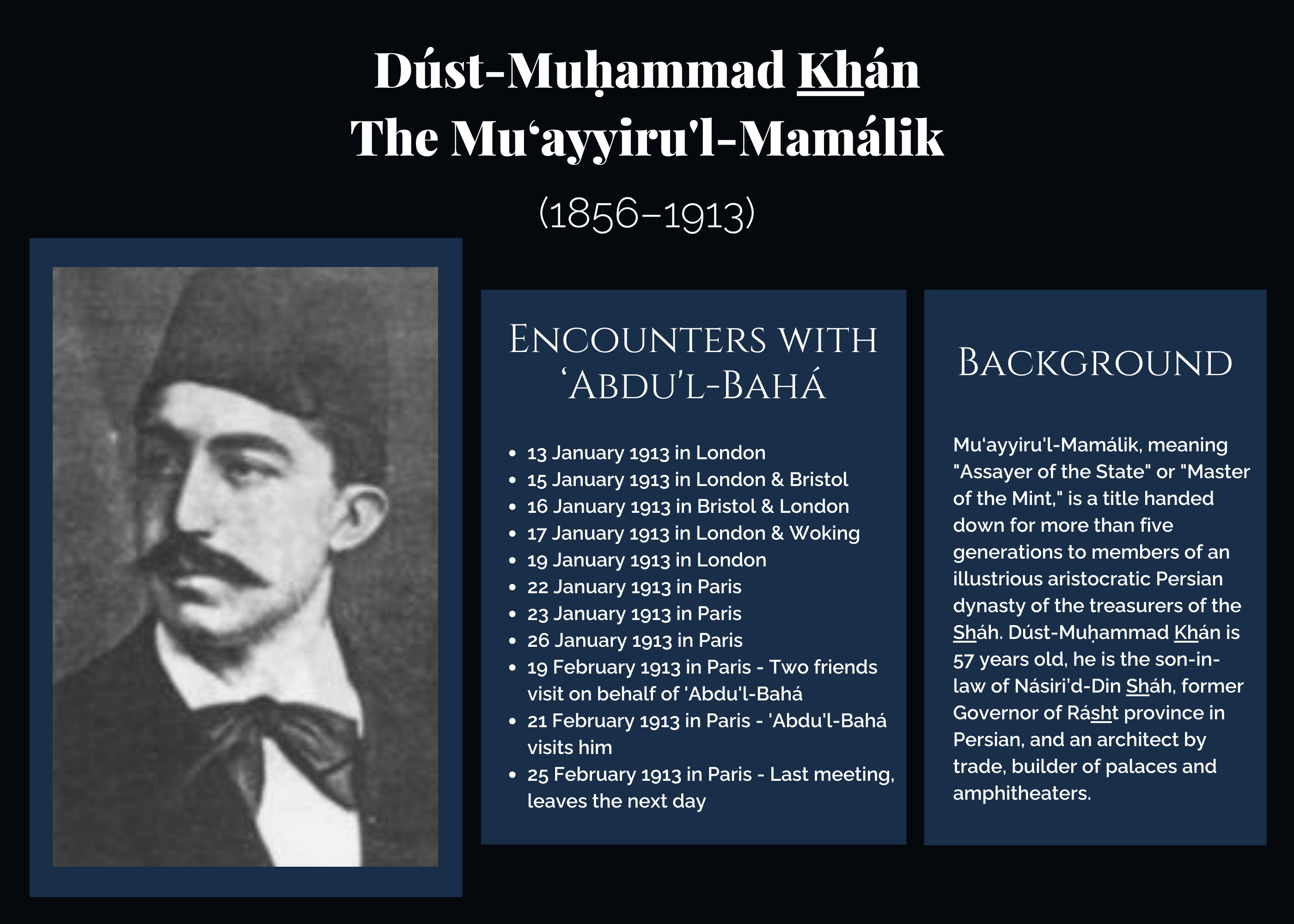
February 1913
1 February 1913: 'Abdu'l-Bahá dines at the home of Laura and Hippolyte Dreyfus-Barney along with some of the most important Persian diplomats in Paris: Mírzá Míhdí Khán, Persia's Envoy Extraordinary and Minister Plenipotentiary in Great Britain and the brother of Abu’l-Qásim Khán (Náṣiru’l-Mulk), the Regent of Persia and ‘Abdu’ṣ-Ṣamad Khán, the Mumtázu’s-Saltaníh, the Persian ambassador, the First Secretary Ardishír Khán Nazar-i-Agá and Mír Siyyid Muḥammad, the Intiẓámu’s-Salṭanih, a Persian Bahá’í nobleman described as being very devoted to ‘Abdu’l-Bahá.
7 February 1913: After the photograph of 'Abdu'l-Bahá and a group of Persian men is taken below the Eiffel Tower, 'Abdu'l-Bahá returns to His hotel to find a group of "formerly prominent Persians" waiting for Him, but we have no further details on who they may have been.
9 February 1913: ‘Abdu’ṣ-Ṣamad Khán, the Mumtázu’s-Saltaníh, the Persian ambassador comes to the hotel for a private interview with 'Abdu'l-Bahá
10 February 1913: Jan Jasion reports from Sohrab's diaries that several prominent Persians arrive to meet 'Abdu'l-Bahá in the early afternoon and speak with the Master about recent events in Persia. Their names are not written down, Jasion ventures to guess "probably on the instructions of 'Abdu'l-Bahá in order to protect them."
14 February 1913: 'Abdu'l-Bahá receives a visit from more prominent Persians at 4 in the afternoon, but they are not identified.
15 February 1913: Abdu'l-Bahá calls on Reșid Mumtaz Pașa (Mustafa Rashíd Mumtáz Páshá) the former Governor of Beirut, returning to His hotel before four in the afternoon.
16 February 1913: Reșid Mumtaz Pașa returns to visit 'Abdu'l-Bahá, but we again have no details on the meeting.
17 February 1913: Mír Siyyid Muḥammad, the Intiẓámu’s-Salṭanih, a stalwart Bahá'í and member of the Persian nobility calls on 'Abdu'l-Bahá in the morning to speak about the political situation in Persia.
19 February 1913: 'Abdu'l-Bahá sends Ahmad Sohrab and Mírzá Mahmúd to call on Dúst-Muḥammad Khán, because the Master has heard he is feeling ill. Later this day, and before 'Abdu'l-Bahá's noon-day address, the Persian ambassador, ‘Abdu’ṣ-Ṣamad Khán, the Mumtázu’s-Saltaníh, calls at the hotel and has a private interview with 'Abdu'l-Bahá. Mír Siyyid Muḥammad, the Intiẓámu’s-Salṭanih arrives at 3:30 in the afternoon along with two other Persians, one a well-known Bahá'í. Later still, several prominent persians are present at dinner, with 'Abdu'l-Bahá in His hotel.
20 February 1913: 'Abdu'l-Bahá sends a flower pot of lilies of the valley to the Persian attaché, Nuṣratu’d-Dawlih, who has been recently had surgery. The Persian attaché had welcomed 'Abdu'l-Bahá on His first full day in Paris on January 22.
21 February 1913: After His morning tea, 'Abdu'l-Bahá calls on Nuṣratu’d-Dawlih, the Persian attaché, in person, in the company of Ahmad Sohrab. The 24-year-old prince, still recovering from surgery, is very moved by 'Abdu'l-Bahá's visit and concern over his health. They speak about the very difficult situation currently engulfing Turkey and Persia, and the role played in the current situation by previous generations of administrators lacking a sense of public service as well as government mismanagement. 'Abdu'l-Bahá speaks at great length on this subject, and His address to the prince, as well as His touching parting words to him can be read in Jan Jasion's "'Abdu'l-Bahá in France: 1911-1913" pages 424-425. Upon returning to His hotel, 'Abdu'l-Bahá speaks significant words regarding the Persian noblemen He has been meeting with in Paris:
All the enemies of this Cause have become friends. With the power of the Love of God, I love them all. All the princes and statesmen and leaders of Persia are now the friends of this Cause while, the fathers and the grandfathers of many of them were the greatest enemies.
Jan Jasion, "'Abdu'l-Bahá in France: 1911-1913" page 425
That same day, February 21, 1913, after a masterful address at the Alliance Spiritualiste which you can read on pages 426-436 of "'Abdu'l-Bahá in France: 1911-1913" 'Abdu'l-Bahá again calls on a sick Persian notable, this time Dúst-Muḥammad Khán, who has been ill for a few days. Upon 'Abdu'l-Bahá's return to the hotel, Hüsnü Bey (Husni Bey), the Ottoman Consul General is waiting to speak to Him, along with some Persian students. The Master speaks to them about the elimination of prejudices.
23 February 1913: Reșid Mumtaz Pașa, the former Governor of Beirut, and Sâlih Münîr Pașa, a member of the Turkish delegation negotiating with the Balkan League, pay 'Abdu'l-Bahá a visit. Sâlih Münîr Pașa shows great reverence to 'Abdu'l-Bahá, and 'Abdu'l-Bahá speaks at length to the two Ottoman statesmen in Turkish. Later on, Nuṣratu’d-Dawlih, the Persian attaché, visits 'Abdu'l-Bahá with his younger brother, whom Jasion believes is Prince Muḥammad-'Alí Farmánfarmáiyán, a student of Economics in Paris. Jasion notes that a strong bond of friendship has developed between the Persian attaché and 'Abdu'l-Bahá because many more meetings between them have taken place beyond those we have records for in diaries of the time. A partial conversation between them and the Master is found on pages 440-441 of "'Abdu'l-Bahá in France: 1911-1913."
24 February 1913: Mírzá Míhdí Khán, Persia's Envoy Extraordinary and Minister Plenipotentiary in Great Britain, calls on 'Abdu'l-Bahá.
25 February 1913: Dúst-Muḥammad Khán, the Mu‘ayyiru'l-Mamálik, who has been a constant companion of 'Abdu'l-Bahá since London, comes to bid farewell to the Master as he is returning to Persia the next day. Online dates of Dúst-Muḥammad Khán's death are ambiguous, but it seems that he died on a boat in Odessa, Ukraine, on his way back to Persia. There is no record of the dinner on this date in "'Abdu'l-Bahá in France: 1911-1913", but 'Abdu'l-Bahá had gone to Hippolyte and Laura Drefyus' home on Sunday, February 23, to discuss the upcoming dinner which is supposed to have taken place on this night, to which a high-ranking Persian from Azerbaijan has been invited.
27 February 1913: Even though 'Abdu'l-Bahá has been so ill that he has received his morning guests while in bed, He still finds the strength to go out and pay a visit to the Persian ambassador, ‘Abdu’ṣ-Ṣamad Khán, the Mumtázu’s-Saltaníh.
28 February 1913: After a four-day illness, 'Abdu'l-Bahá's health has improved and, in the afternoon, he receives a high-ranking Persian politician, Muḥammad-Valí Khán-i-Tunukábuní (the Sipahdár-i-A‘ẓam (the Greatest Commander). Muḥammad-Valí Khán-i-Tunukábuní is the leader of the constitutionalist revolutionary forces from Iran's Northern provinces of Gílán and Mázindarán and known as one of the greatest statesmen and military commanders of Persian history as well as its wealthiest nobleman. Muḥammad-Valí Khán-i-Tunukábuní had met A.L.M. Nicolas, the great Orientalist often quoted by Shoghi Effendi's footnotes in the Dawn-Breakers, in Persia and is well-acquainted with the Báb's teachings.
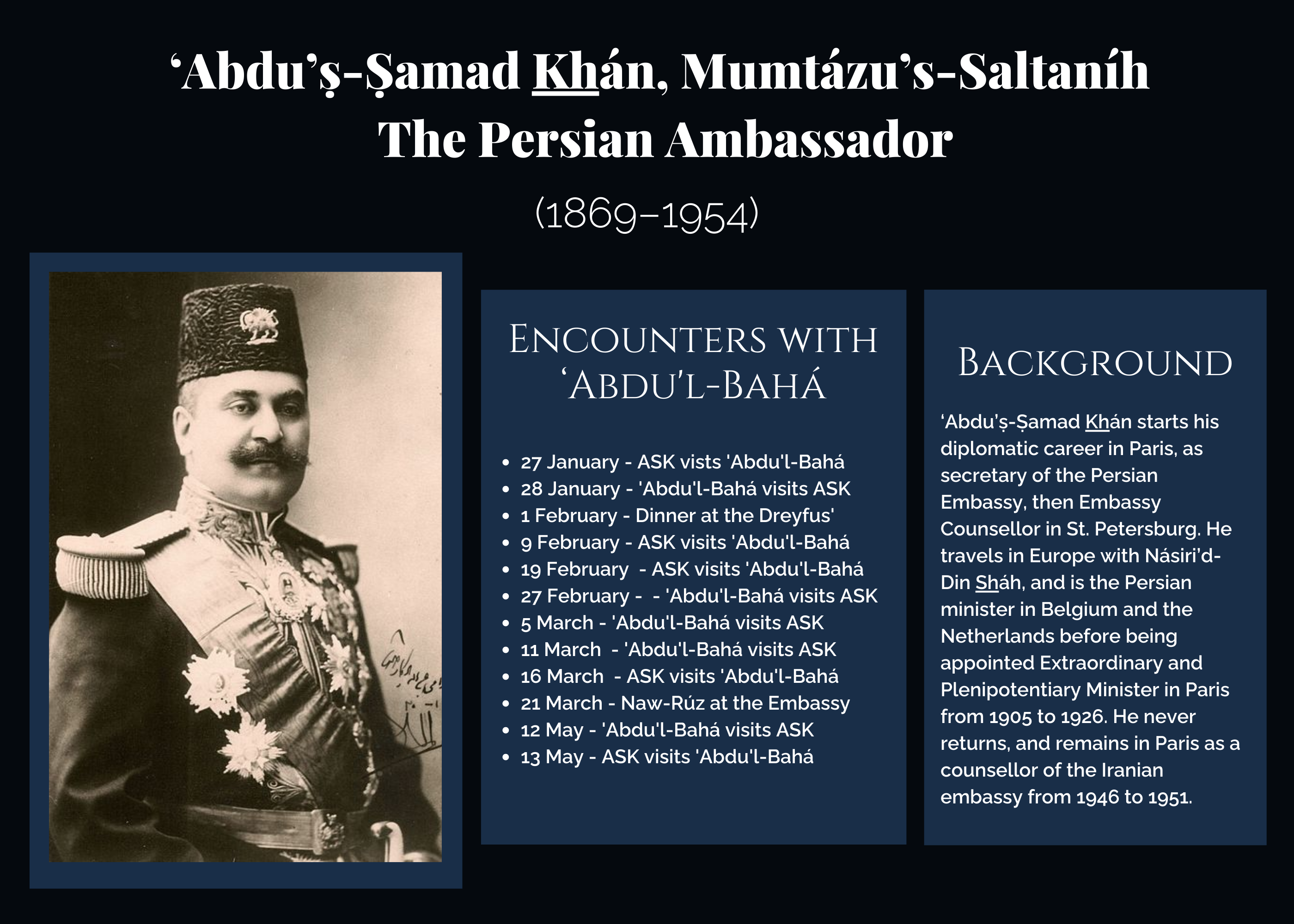
March 1913
2 March 1913: Even though 'Abdu'l-Bahá's voice is still weak after His illness, He takes the time to speak at length with several unnamed Persian noblemen who have come to call on Him.
5 March 1913: In the early evening, 'Abdu'l-Bahá calls on the Persian ambassador, ‘Abdu’ṣ-Ṣamad Khán, the Mumtázu’s-Saltaníh. Also present is Abu’l-Qásim Khán (Náṣiru’l-Mulk, the Champion of the State), the Regent of Persia, a Persian politician educated at Oxford University. He was appointed Minister of Finance in 1898, Prime Minister in 1907 and 1909, and Regent of Persia from 1910 to 1914. Their meeting lasts an hour and a half. Probably by design, there is no record of what was spoken about in this meeting, even though Ahmad Sohrab, the diarist, was present. Jan Jasion provides valuable information on the reasons of Abu’l-Qásim Khán's presence in France: he is on an official visit and has meetings with the French president, Raymond Poincaré, as well as Stephen Jean-Marie Pichon, the minister of foreign affairs.
6 March 1913: On a day that 'Abdu'l-Bahá is so fatigued that He does not give His daily talk, He still meets for an hour, from six to seven in the evening with the high-ranking politician and leader of the Persian Revolution, Muḥammad-Valí Khán-i-Tunukábuní (the Sipahdár-i-A‘ẓam (the Greatest Commander).
7 March 1913: 'Abdu'l-Bahá receives several Persian dignitaries in the afternoon, and, according to Ahmad Sohrab, His talk with them contains one humorous story after another.
8 March 1913: After His noon-day talk, 'Abdu'l-Bahá pays a two-hour visit to Sâlih Münîr Pașa, the member of the Turkish delegation negotiating with the Balkan League, whose wife has come to visit Him several times.
11 March 1913: 'In the afternoon, Abdu'l-Bahá pays a long visit to the home of the Persian ambassador, ‘Abdu’ṣ-Ṣamad Khán, the Mumtázu’s-Saltaníh, returning to His hotel after nine in the evening.
12 March 1913: 'Abdu'l-Bahá pays a visit to Reșid Mumtaz Pașa, the former Governor of Beirut.
13 March 1913: 'Abdu'l-Bahá has tea with Mírzá Míhdí Khán, Persia's current Envoy Extraordinary and Minister Plenipotentiary in Great Britain (and brother of the Náṣiru’l-Mulk, the Regent of Persia) at the Hotel Astoria for an hour between 4 and 5 in the afternoon. Mírzá Míhdí Khán is the future Persian Envoy Extraordinary and Minister Plenipotentiary to the United States in 1914-1918 and, according to Ahmad Sohrab, their discussion that afternoon covers topics such as the differences between Eastern and Western civilization, the high cost of living in America, and the status of Persian students in Paris. An excerpt can be read on page 485 of "'Abdu'l-Bahá in France: 1911-1913."
15 March 1913: After lunch, 'Abdu'l-Bahá calls on Muḥammad-Valí Khán-i-Tunukábuní (the Sipahdár-i-A‘ẓam (the Greatest Commander), and they have a long conversation. 'Abdu'l-Bahá returns to His hotel around five in the afternoon, very tired.
16 March 1913: The Persian ambassador, ‘Abdu’ṣ-Ṣamad Khán, the Mumtázu’s-Saltaníh, visits 'Abdu'l-Bahá for about an hour, late in the day.
17 March 1913: Mír Siyyid Muḥammad, the Intiẓámu’s-Salṭanih, the Persian Bahá'í nobleman, arrives in the morning for a private interview with 'Abdu'l-Bahá in the course of which the Master relates to him a story from the early life of Bahá'u'lláh indicative of the confusion in the Persian government. You can read this story on page 492 of Jan Jasion's 'Abdu'l-Bahá in France: 1911-1913."
20 March 1913: On the occasion of Naw-Rúz, the Persian ambassador, ‘Abdu’ṣ-Ṣamad Khán, the Mumtázu’s-Saltaníh, sends 'Abdu'l-Bahá a large bouquet of flowers.
21 March 1913: The Persian ambassador, ‘Abdu’ṣ-Ṣamad Khán, the Mumtázu’s-Saltaníh, sends 'Abdu'l-Bahá a large pot of flowers for Naw-Rúz. Many Eastern notables including Mír Siyyid Muḥammad, the Intiẓámu’s-Salṭanih, attend the Naw Rúz luncheon at 'Abdu'l-Bahá's hotel, and according to Hassan Balyuzi, are "much surprised" to encounter each other at the event. Later in the afternoon, accompanied by Hippolyte Dreyfus, 'Abdu'l-Bahá gives an eloquent address at the Persian Embassy at 64, avenue de Malakoff.
22 March 1913: 'Abdu'l-Bahá takes a taxi and pays a visit to Sâlih Münîr Pașa, the member of the Turkish delegation, and his wife. Several Ottomans and a journalist are present and 'Abdu'l-Bahá speaks about the essential and non-essential aspects of religion in Turkish, with Sâlih Münîr Pașa translating in French. Present at this meeting is Mehmet Ṣerif Pașa, an Ottoman General who attended the prestigious military academy École Saint Cyr in France. He was the Ottoman attaché to Berlin and Paris, and the Ottoman ambassador to Stockholm from 1898 to 1908. After the Young Turk Revolution, he was exiled to Paris and worked as the editor of "Le Mecherouttiete."
23 March 1913: 'Abdu'l-Bahá calls on Ahmet Pașa (Aḥmad Páshá), a former Ottoman general in exile in Paris, who, unfortunately, is not at home.
25 March 1913: 'Abdu'l-Bahá pays a very significant visit to Muḥammad-Valí Khán-i-Tunukábuní (the Sipahdár-i-A‘ẓam (the Greatest Commander), who has just returned from Nice, in the south of France. 'Abdu'l-Bahá asks Ahmad Sohrab to translate into Persian three letters He has just received from two eminent American Bahá'ís, Ellen Beecher and Juliet Thompson, and which the Master considers exceedingly important, and the . Sipahdár-i-A‘ẓam is so impressed by these letters, that he begins to relay the story of the martyrdom of Badí', from the perspective of the executioner, while 'Abdu'l-Bahá listens. You can read the entire heartbreaking account on pages 515-519 of "'Abdu'l-Bahá in France: 1911-1913." After he has finished his account, 'Abdu'l-Bahá has some tea with Sipahdár-i-A‘ẓam, then tells him: "Rest thou. assured that God will confirm you and assist thee and as a sign of this I will kiss both thy cheeks."
28 March 1913: In the evening, 'Abdu'l-Bahá calls on Ahmet Pașa (Aḥmad Páshá). The major story in all the newspapers today has been the Balkan War. Two days ago, the Serbs took Adrianople (Edirne) from the Ottomans/Turks, aided by the Bulgarians. On March 28, 'Abdu'l-Bahá has a meeting with several unnamed important Persians and speaks to them about the 26 March fall of Adrianople, and how it had been prophesied by Bahá'u'lláh in the Súriy-i-Ra'ís:
The day is approaching when the Land of Mystery [Adrianople/Edirne] and what is beside it shall be changed, and shall pass out of the hands of the King, and commotions shall appear, and the voice of lamentation shall be raised, and the evidences of mischief shall be revealed on all sides, and confusion shall spread by reason of that which hath befallen these captives at the hands of the hosts of oppression. The course of things shall be altered, and conditions shall wax so grievous, that the very sands on the desolate hills will moan, and the trees on the mountain will weep, and blood will flow out of all things. Then wilt thou behold the people in sore distress.
Bahá'u'lláh, The Súriy-i-Ra'ís
29 March 1913: Lunch today has been especially prepared for 'Abdu'l-Bahá by one of His Ottoman Pashá friends (which is not specified), and sent to the Master's Hotel.
30 March 1913: Muḥammad-Valí Khán-i-Tunukábuní, the Sipahdár-i-A‘ẓam and Naṣru’s-Salṭanih, one of the leaders of the Persian Revolution, comes to visit 'Abdu'l-Bahá and they talk about the recent fall of Adrianople (Edirne) and Bahá'u'lláh's prophecy in the Súriy-i-Ra'ís.
31 March 1913: On the day before He leaves for Germany, 'Abdu'l-Bahá meets with both Persian and Ottoman diplomats in His hotel, Martha Pension at 97, rue Lauriston. At three in the afternoon, two Persian notables come to visit 'Abdu'l-Bahá, and the Master receives them in His own room: Ṣamṣámu’s-Salṭanih (Sword of the Kingdom), aka Najaf-Qulí Khán), a Persian Prime Minister and leader of the Iranian Constitutional Revolution, and an unnamed Persian notable. Ṣamṣámu’s-Salṭanih mentions that he has rented an apartment at 4, avenue de Camoëns, where 'Abdu'l-Bahá had stayed during His 1911 sojourn in Paris and where He had given the addresses that became Paris Talks. Apparently, the concierge of the building, finding out that Ṣamṣámu’s-Salṭanih was Persian, showed him extreme courtesy, and asked whether he belonged to the same nation as as "Le Maître 'Abdu'l-Bahá'" ("The Master 'Abdu'l-Bahá"), and if so, the concierge was ready to serve him at all times, That same concierge even told Ṣamṣámu’s-Salṭanih that an American had come by the apartment after 'Abdu'l-Bahá's departure and bought His chair for $700! During His conversation with the two Persians, 'Abdu'l-Bahá tells them about His trip to America and the beauty of the American landscape, in particular the majestic skyward mountains of Colorado. One of the two Persians has read an account of 'Abdu'l-Bahá's address at the Jewish Synagogue, and so the Master speaks at length on His October 12, 1912 talk at Temple Emmanu-El in San Francisco. That evening, Ahmet Pașa, is waiting for 'Abdu'l-Bahá when He returns to the hotel at 7 in the evening. The Master and the exiled Ottoman general, speak for half an hour before 'Abdu'l-Bahá retires for the night.
To be continued after Germany, Hungary, and Austria
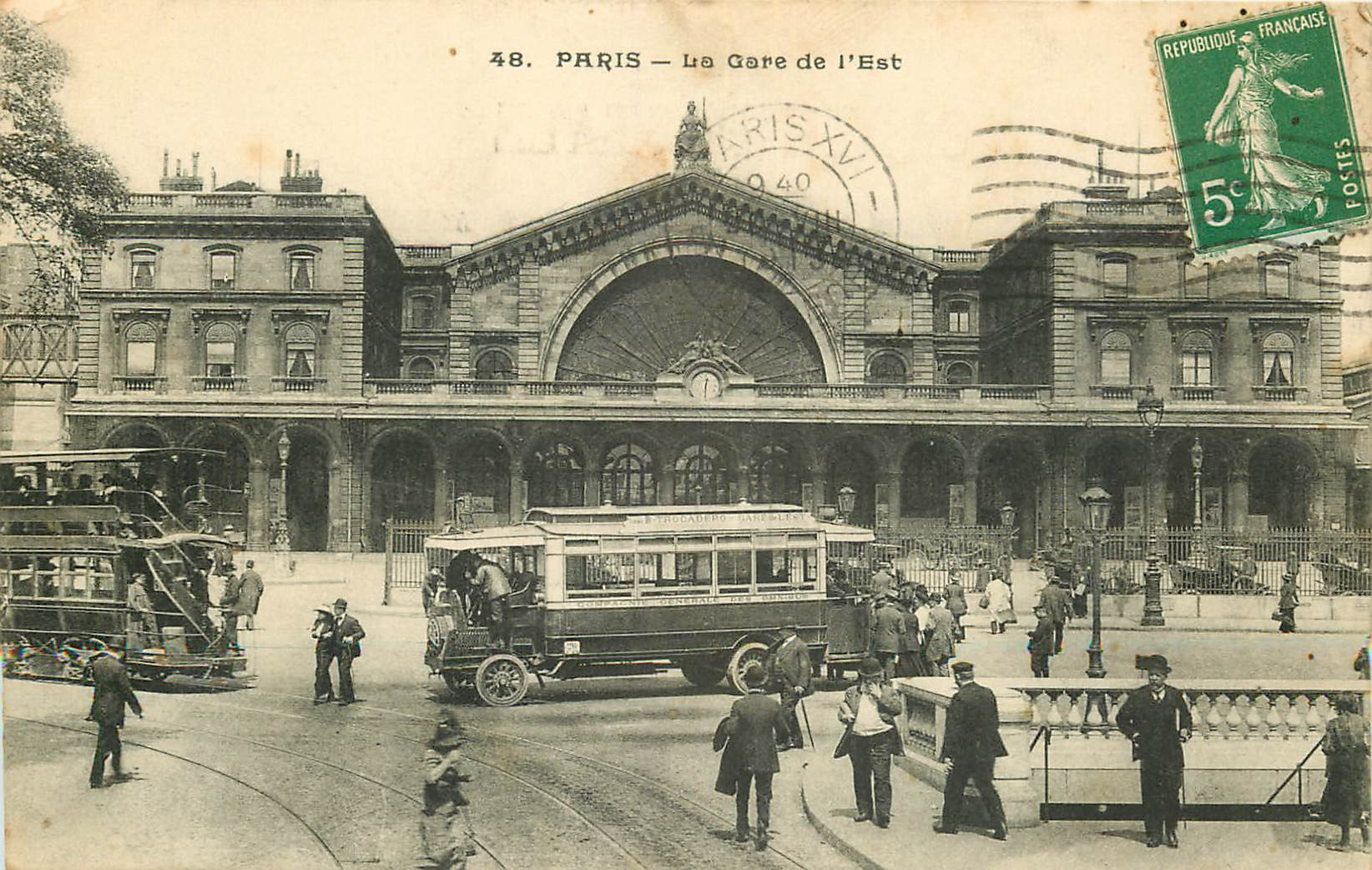
Gare de l'Est, Paris's train station for all Eastward-bound destinations (source).
After seventy consecutive days in the same city, something utterly unheard-of in His travels up to this point, 'Abdu'l-Bahá is once again in motion: the Center of the Covenant is traveling East, towards Germany and Central Europe. The very approximative "plan" is to stay a couple of days in Stuttgart, return to Paris and then the Holy Land. On the morning of His departure for Stuttgart, 'Abdu'l-Bahá gives instructions to Isabel Fraser and Dorothy Hodgson to go to London. 'Abdu'l-Bahá's anticipation for His trip to Germany is palpable as He tells the two stalwart Bahá'í women:
We are going to Stuttgart today. While there, we will be engaged in spreading the Cause of God. We are looking forward to raise the Call of the Kingdom in Stuttgart and to cry at the top of our voice.
Jan Jasion, 'Abdu'l-Bahá in France: 1911 & 1913, page 301
'Abdu'l-Bahá leaves His hotel, accompanied by Hippolyte and Laura Dreyfus and many Persian Bahá'ís at 8:15 in the morning. They arrive at Gare de l'Est, where there are many people waiting to bid 'Abdu'l-Bahá farewell. Among the crowd is a little girl and her mother. When 'Abdu'l-Bahá sees the child, His face becomes wreathed with joy and He says: "My friend has come to bid me farewell. I am very glad." After His parting words to the Bahá'ís (see the last vignette in "Meetings with Bahá'ís"), 'Abdu'l-Bahá's train leaves at 9:00 with His four Persian companions, to whom He gives instructions to discard their Eastern garb and headgear for a Western style of dress. Things are about to change.
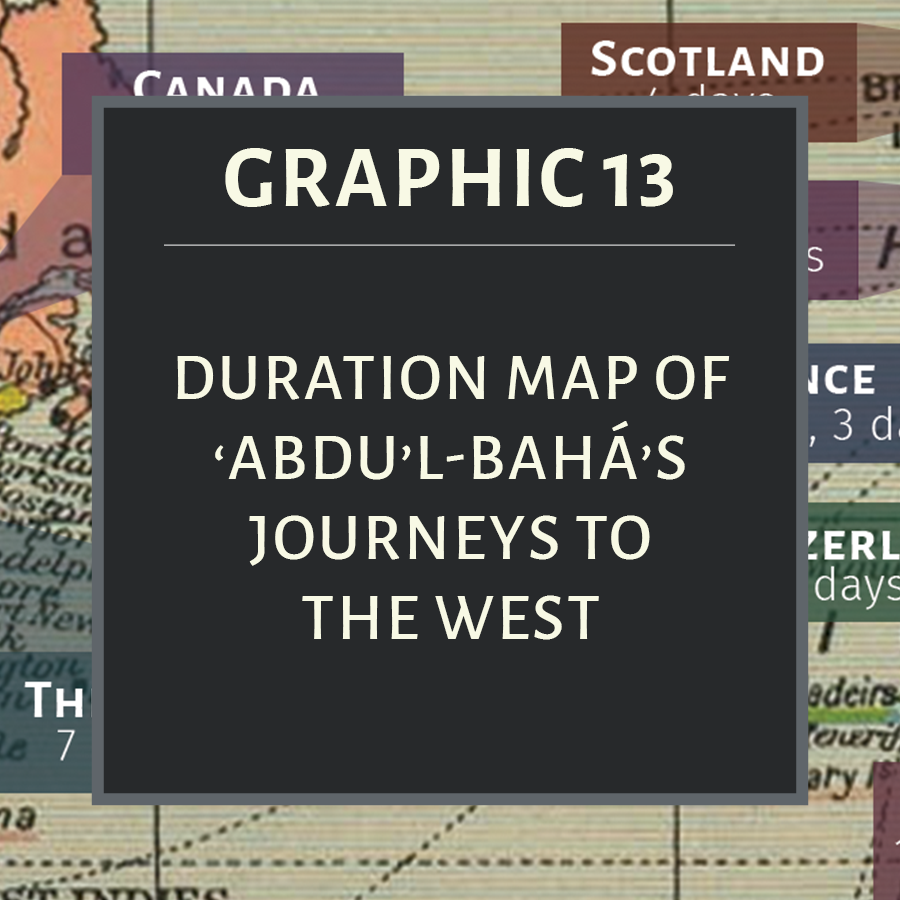
Map of the total time ‘Abdu’l-Bahá spent in each of the 10 countries He visited on 3 continents during His 3-year Journeys to the West. A table breaking down the visits and days spent (amounting to the total time indicated on the map) is below. Both original graphics by Violetta Zein. Base Map: 1910 map entitled “The World: Colonial Possessions and Commercial Highways” Edited by Sir Adolphus William Ward and others. Wikimedia Commons.
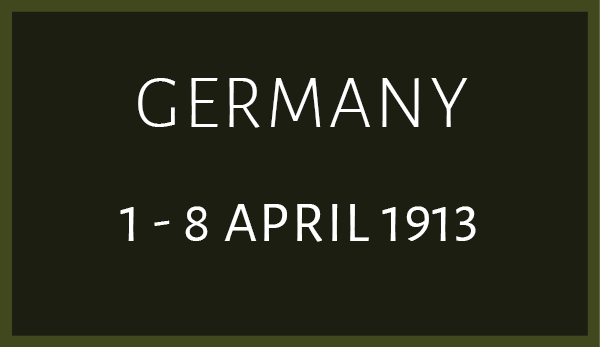
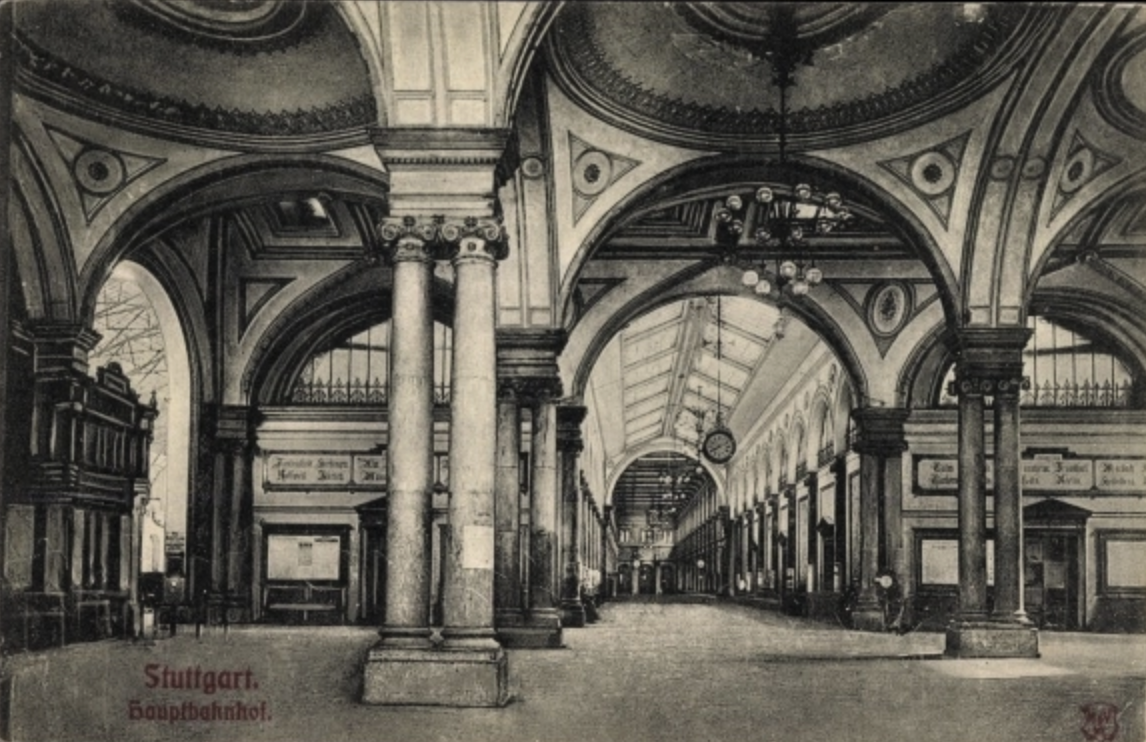
The main hallway of the train station in Stuttgart (source)
A very wonderful chapter is about to open in 'Abdu'l-Bahá's Journeys to the West. His visit to Germany from the very beginning is marked with a burst of joy unlike we have yet seen. Below are two of the most distinctive events to happen on the train ride. Ahmad Sohrab paints a delightful picture of 'Abdu'l-Bahá enjoying the beautiful Spring scenery on the train ride East after leaving Paris. The reason this is significant is that one must remember how deeply 'Abdu'l-Bahá loves nature. In almost every country He visits, the Master gathers seeds, and young plants to bring back to the Holy Land to add to the gardens at Bahjí. In every single city He stays in, 'Abdu'l-Bahá spends long hours walking in gardens, very often exhausting His young companions. What Germany represents for 'Abdu'l-Bahá, the lover of nature, is His first experience of an almost magical spring. This is the Master's very first spring season in Europe. He arrived at the very end of August 1911, leaving in December 1911 for Egypt, experienced the tail end of the spring in America from April to June 1912, and then arrived for His second journey in Europe mid-December 1913. The utter gorgeousness of the German spring in the Black Forest, its hills, valleys and parks, is an immense source of joy for 'Abdu'l-Bahá who, very frequently comments on how gorgeous the season, the landscape and the nature is during His days in the region of Stuttgart. It is also significant because the Germany Bahá'ís are so enkindled, 'Abdu'l-Bahá often makes allusion to the physical springtime around Him being mirrored in the divine, spiritual springtime around Him as He spends time with the Germans. It is fair to say this period of His journeys was, without a doubt, 'Abdu'l-Bahá's favorite for these and other reasons. Ahmad Sohrab describes the train journey:
The train moves and slowly adds to its speed. We look out of the window, we see the weeping faces of the believers, their hands are in the air, hats and handkerchiefs are waving and then, only one turn, and they are shut off from our view and we find ourselves looking at the meadows, blooming trees, cultivated fields, vast stretches of forests, happy, contented farming communities, busy industrial centers, rushing rivers, large towns (?), and beautiful hills covered with blossoming trees all abloom! These latter appear from a distance as snow-capped mountains. Every now and then, the Master gleefully exclaims: “How divine! How beautiful nature is! It is clothed in its gala robes! I am glad to travel at this time of the year. How all creation is transformed with the touch of the spring”.
Ahmad Sohrab, Letters to Harriet Magee, 1 April 1913
The second, and truly extraordinary thing that differentiates 'Abdu'l-Bahá's journey to Stuttgart from almost every other journey He has undertaken is that the German friends have no idea 'Abdul-Bahá is coming. The Master had specifically asked Hippolyte Dreyfus not to telegram ahead because he was going to "surprise" them. Ahmad Sohrab describes ‘Abdu'l-Bahá's joy at the idea of surprising the German believers:
While the train was speeding along, laughingly and boyishly , ['Abdu'l-Bahá] was telling us that this was the best thing: We will arrive in Stuttgart, take our rooms in a hotel, settle down, and then call up the friends! How will they be surprised! Was not this a fine plan? We were going to surprise them! When they come to the hotel they will find us in their midst but now they know nothing about it at all! Yes! This is the best plan!
Ahmad Sohrab, Letters to Harriet Magee, 1 April 1913
'Abdu'l-Bahá and His friends arrive in Stuttgart at 8 in the evening, and the Master alights from the train station (pictured above), and walks straight to the Hotel Marquardt, which abuts the train station. They book rooms, and in this hotel, 'Abdu'l-Bahá has an unusually-spacious room, which will come in handy in the next few days. Then, Ahmad Sohrab calls Wilhelm Herrigel. When he announces that 'Abdu'l-Bahá is in Stuttgart, he can tell from the tone of the man's voice that Herrigel almost jumps up in the air with delight and surprise saying "What! What! Abdu'l-Bahá here! in Stuttgart! Is this possible!" Within a few minutes, Herrigel is already at the Hotel Marquardt and is brought into 'Abdu'l-Bahá's room. The Master embraces the stunned German and kisses him very affectionately (obviously EXTREMELY pleased His surprise was so successful!) and tells him: "You see! I have come! I have fulfilled my promise!" 'Abdu'l-Bahá arriving amongst the believers of Stuttgart is a sudden infusion of intense joy that ripples through the local community, and they can hardly believe it! That night, 'Abdu'l-Bahá's dictates an extremely apt telegram that is "flushed to all parts of the Orient, Paris, London, New York, Washington, Chicago, San Francisco, etc":
With joy and happiness
we have arrived at Stuttgart
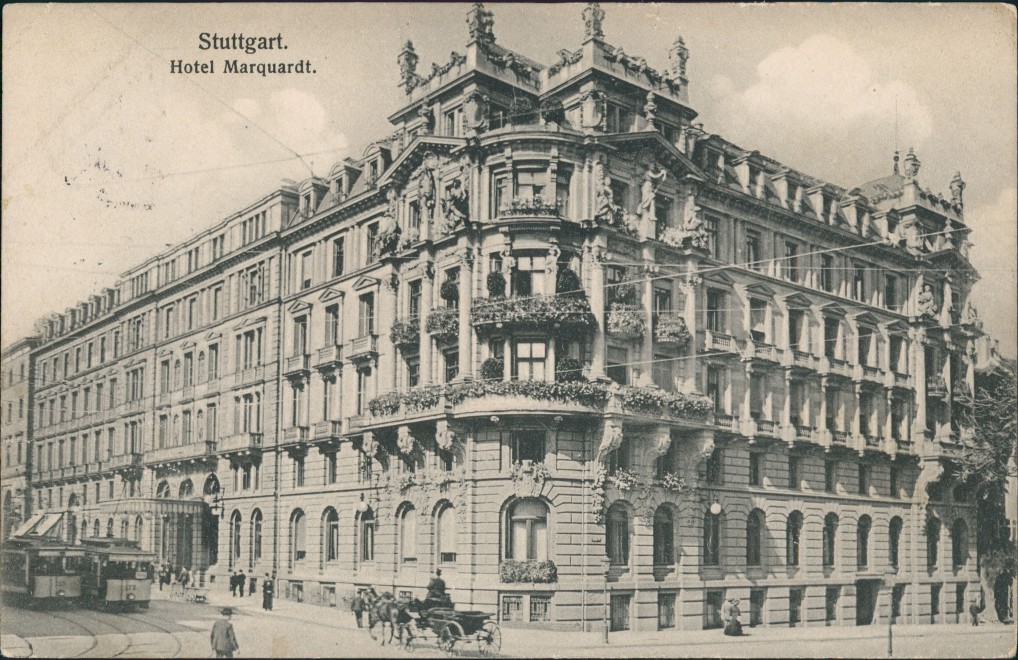
The Hotel Marquardt in Stuttgart in 1913. (Source)
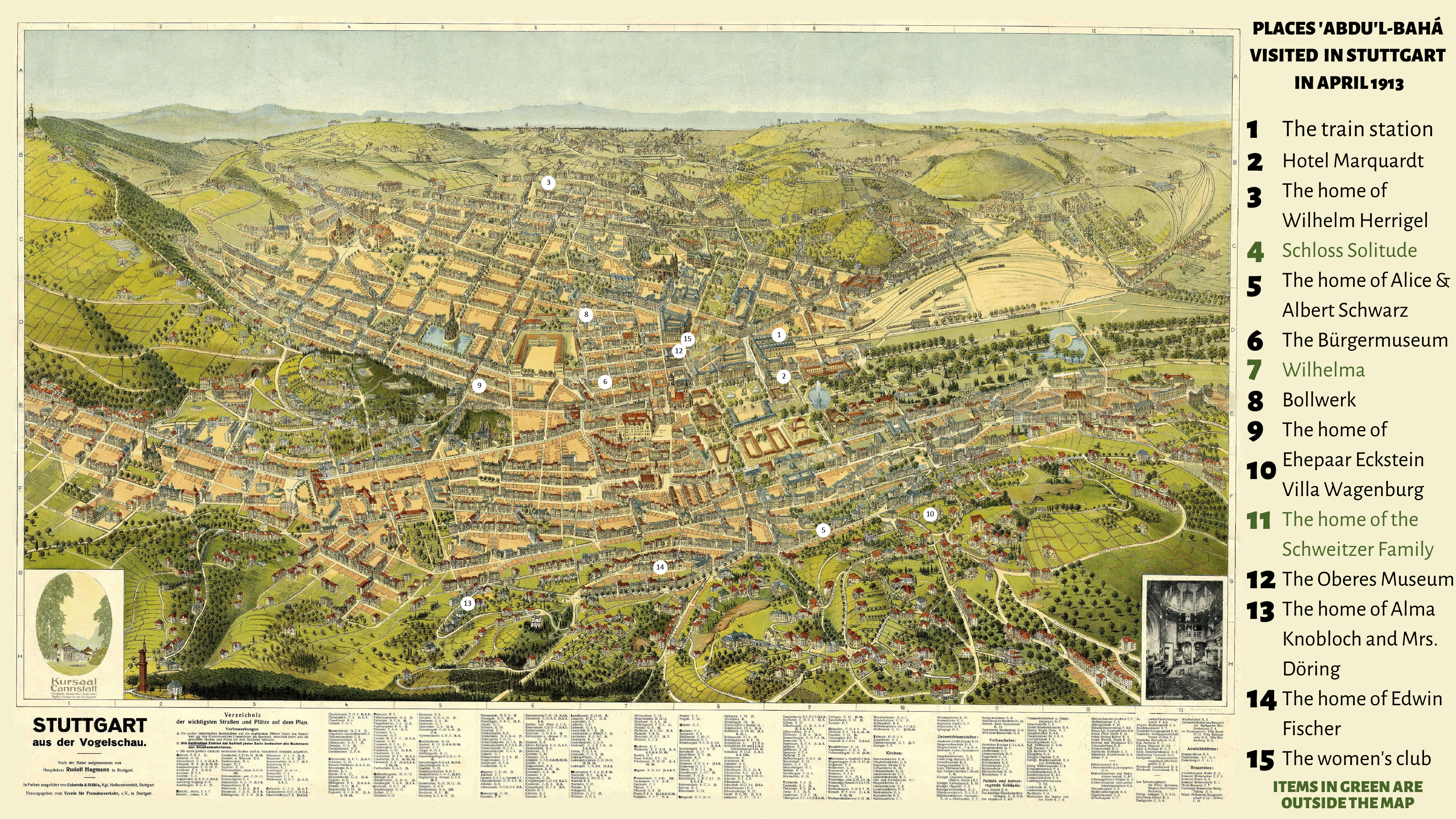
Map of Stuttgart with list of places visited by 'Abdu'l-Bahá during His two stays in Stuttgart provided by Alexander Meinhard.
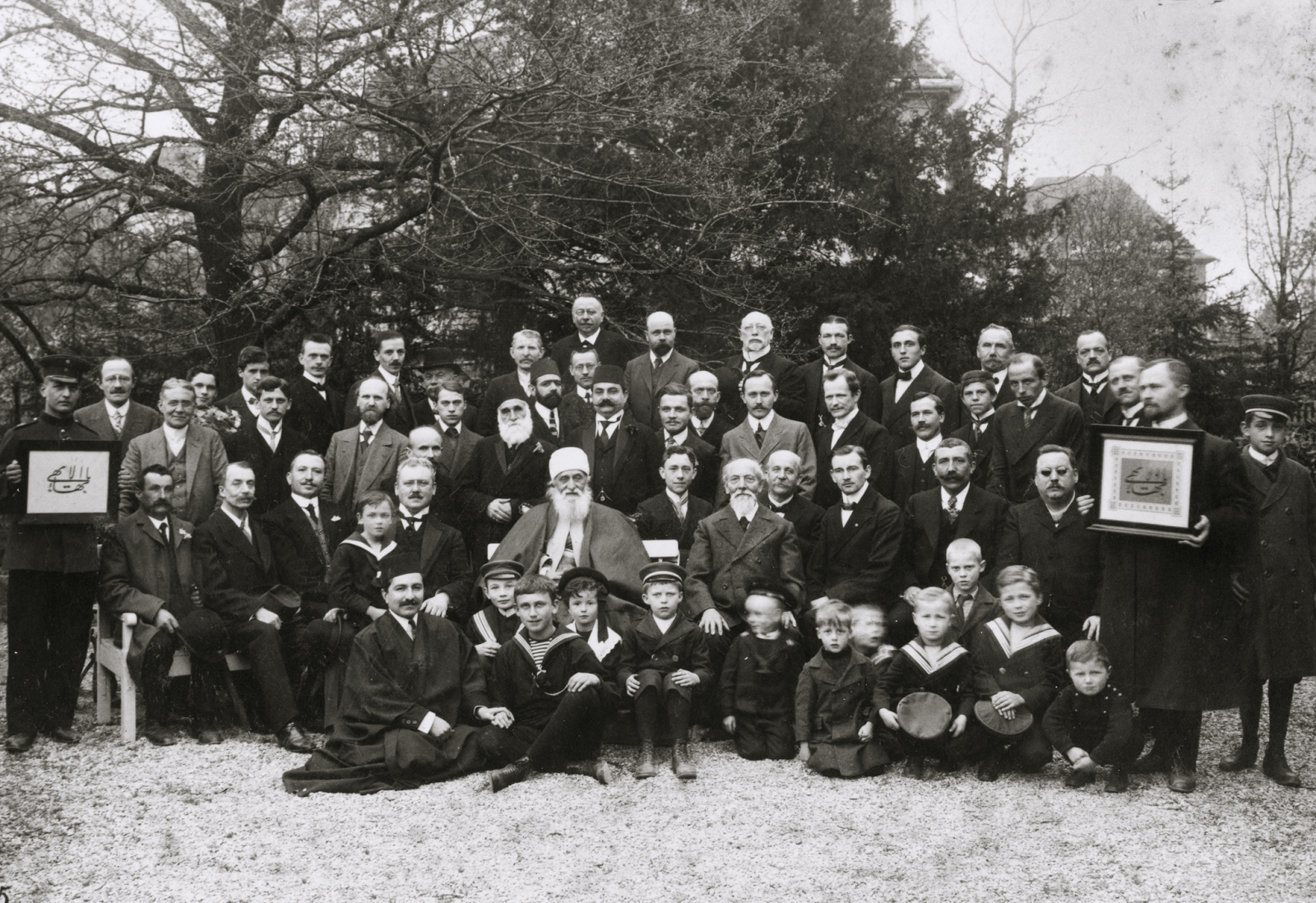
'Abdu'l-Bahá during His stay in Stuttgart. No date specified. Please contact us if you have information on the date this photograph was taken.
The intensity of this day reminds Ahmad Sohrab of 'Abdu'l-Bahá’s days in America, and that is truly saying something. At six in the morning, letters and telegrams are already pouring in from Budapest, asking for 'Abdu'l-Bahá to visit. Sohrab says that "through the air of Stuttgart, we inhaled a scent of spiritual activity, even in the early morning." The believers start arriving at 8 in the morning, each carrying a bouquet of flowers for 'Abdu'l-Bahá and they strike Sohrab as having two supreme distinguishing characteristics: their love and their sincerity. Many of them cry and kiss the hem of 'Abdu'l-Bahá’s garment. Ahmad Sohrab, who has traveled with 'Abdu'l-Bahá for many months, says that “He ['Abdu'l-Bahá] also unveiled the face of His love in a manner not witnessed before to all those who had the privilege of witnessing Him this morning,” and describes the scene in the Marquardt hotel suite as “the East and the West were gathered together in this room, exercising toward each other the utmost of kindness.” 'Abdu'l-Bahá describes Stuttgart as a “good city” and “delightfully situated,” “a worthy place to become the Vineyard of the Kingdom” and hopes that each of those visiting Him will become “a heavenly gardener so that they may sow pure seeds in the prepared soils and the variegated flowers may grow therefrom.” To three friends who arrive with flowers in their hands and tears in their eyes, 'Abdu'l-Bahá says He is happy because He has come to Stuttgart while nature is welcoming the Spring, and that although this is the material Spring, the beauty of the divine spring may pitch its tent in Stuttgart. When Alma Knobloch comes, 'Abdu'l-Bahá greets her with great affection, saying His heart is attached to her, that her heart is pure and attracted and that she is the “Herald of the Kingdom,” a phrase He has spoken previously in New York to Lua Getsinger.
Two actors are brought in to meet 'Abdu'l-Bahá, and when one asks about the influence of theater on the public, 'Abdu'l-Bahá says “The plays should endeavor to elevate the ideals of humanity and not degrade them. The theater is like unto a school and the playwright must ever think how to educate his audience through the characterizations of noble ideals and personalities. The actors must embody in their uttered words and deeds, while in their roles, the noblest emotions, the highest motives, the most delicate art, the tenderest feelings, and the most attractive appearances. The chief aim of the theater should become the spiritualization of humanity.” Throughout the entire morning, to His absolute delight, 'Abdu'l-Bahá is surrounded by children, to His right and to His left, sitting on His lap, and He embraces them and shows them love. One really senses that after a difficult 70-day sojourn in Paris, 'Abdu'l-Bahá is truly happy in Germany, surrounded by exquisitely-beautiful nature, hordes of children, and enkindled, active, local believers.
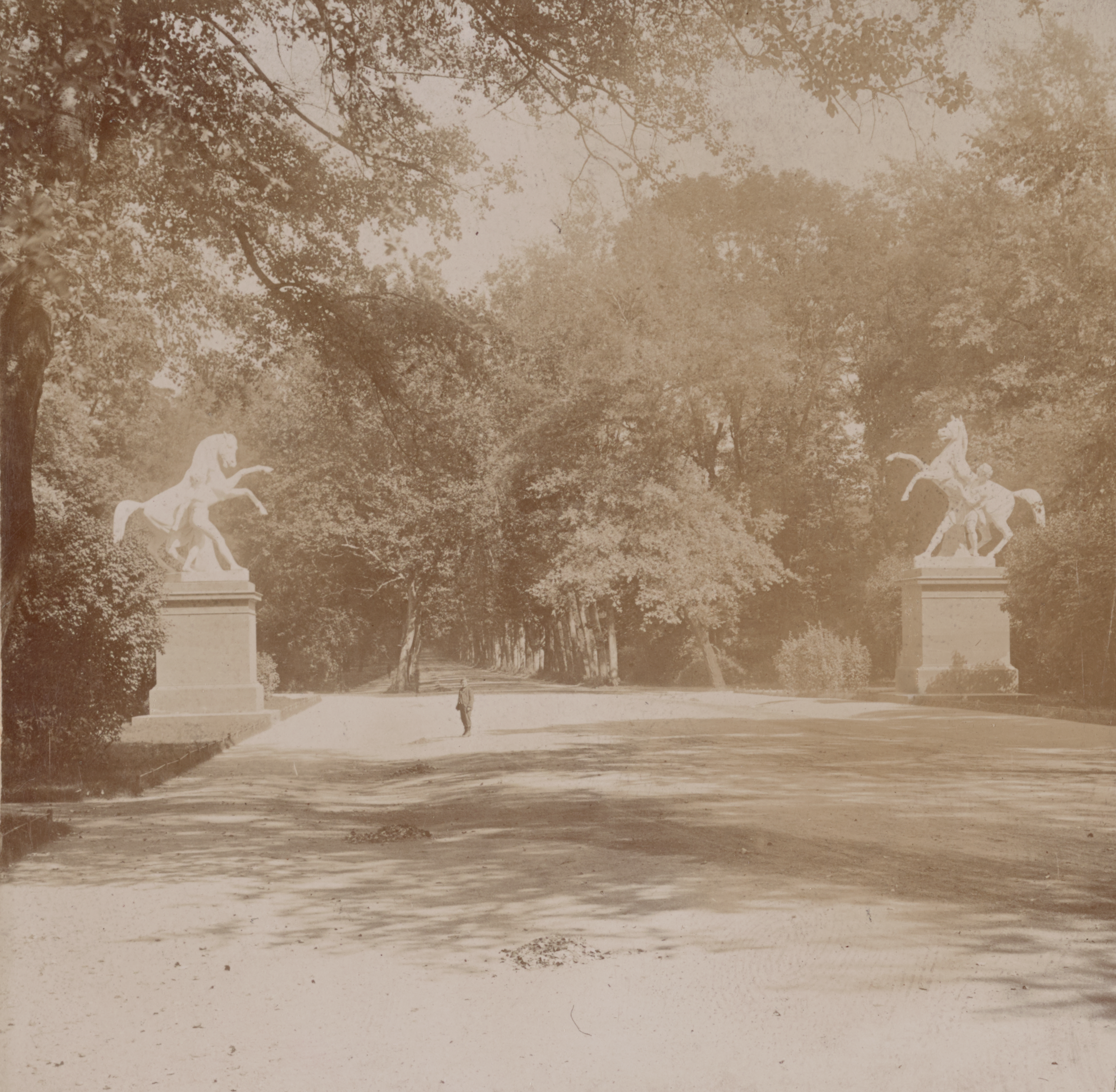
The Royal Park in Stuttgart seen in 1895, where 'Adbu'l-Bahá, walked through, sat on a bench, and spoke with a gardener on April 2, 1913. Library of Congress (cropped stereographic image).
Starting at nine in the morning, 'Abdu'l-Bahá’s room fills, empties, fills again, empties again, then refills with wave after wave of groups of friends. In all the other cities 'Abdu'l-Bahá has visited, most recently Paris, for example, visitors would usually come in for interviews with 'Abdu'l-Bahá either individually, or by twos. In Stuttgart, to accommodate the massive flow, the interview format is discarded, and what takes its place are more accurately described as a series of successive meetings. The Master speaks to the friends about the “very radiant” meetings of the night before, and how the fire of the love of God is enkindled, how He beheld the breaths of the Holy Spirit, and the confirmations of the Kingdom of Abhá, and that the influence of that meeting will be felt throughout Germany and how He hoped it would yield great results.
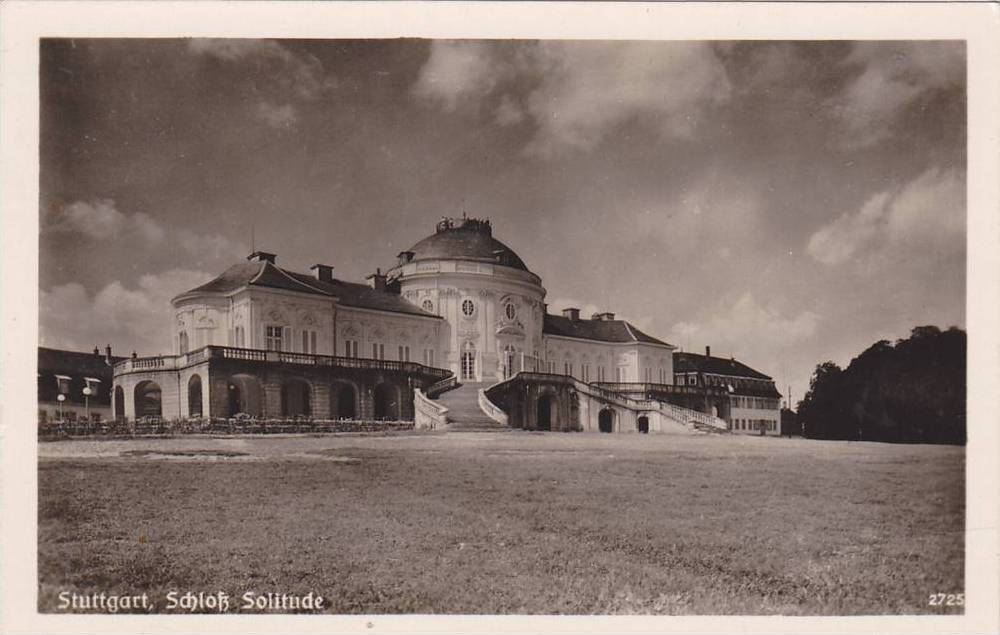
'Abdu'l-Bahá drove with Albert Schwartz as far as Schloss Solitude on April 3, 1913. Schloss Solitude is a Rococo palace and hunting retreat commissioned by the Duke of Württemberg and completed in 1769. It is located on a ridge between Leonberg, Gerlingen and Stuttgart. Source.
Albert Schwarz takes the Master for a very beautiful countryside drive at three in the afternoon. During this drive, 'Abdu'l-Bahá sees spring in all its splendor: valleys of blossoming trees, pine forests and prairies carpeted with wild flowers. Eventually, they arrive at the Schloss Solitude, a 200-year old palace open to the public. 'Abdu'l-Bahá walks through the entire palace, greatly interested by historical events connected to the place, especially Napoleon’s room. After the country visit, 'Abdu'l-Bahá gives a talk, later in the afternoon, at the home of Albert and Alice Schwarz on the fundamental unity of religion, the oneness of mankind, brotherhood and love. After the talk, 'Abdu'l-Bahá has a private interview with the Minister of the King (unnamed), then heads to His first public address at the Bürger Museum.

Inside of the Bürgermuseum, photograph courtesy of Alexander Meinhard.
There is no room to move when 'Abdu'l-Bahá enters the Bürger Museum, as the hall is filled to capacity with between 500 and 600 people. 'Abdu'l-Bahá’s Persian words are translated into English by Ahmad Sohrab, then into German by Adolf Eckstein, who is aided by dozens of audience members when he cannot remember an English word in German. 'Abdu'l-Bahá gives a stirring talk about His imprisonment and His subsequent Journeys to the West, with the aim of promulgating a message of unity. 'Abdu'l-Bahá offers a lengthy prayer on behalf of the assembled audience, and at the end of the talk, so many people want to shake His hand that it is impossible to move around. When it comes time to leave, the people file into a row, “like a regiment of soldiers,” and 'Abdu'l-Bahá shakes hands with almost everyone, before returning for dinner at the home of the Schwarz family and finally returning to the Marquardt Hotel.
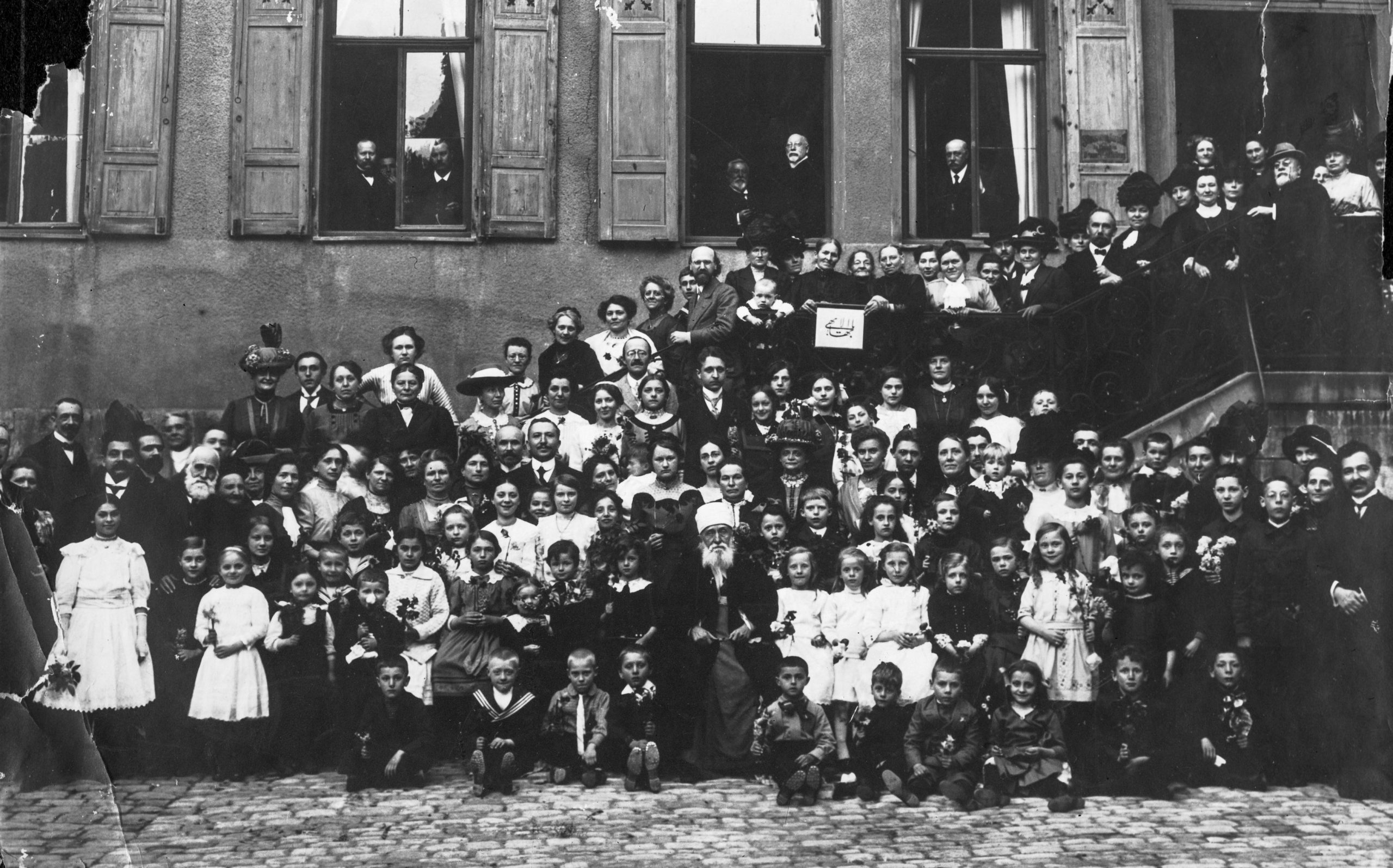
This photograph of 'Abdu'l-Bahá surrounded by festively-dressed children with flowers in their hands was taken after the children's party to welcome Him to Esslingen, outside the hall of the museum where the party took place, on April 4, 1913. Bahá'í Media Bank.
'Abdu’l-Bahá relates a teaching story from His early childhood in Stuttgart on April 4, 1913:
It is good to be a spreader of the Teachings of God in childhood. I was a teacher in this Cause at the age of this child (eight or nine years). This reminds me of a story. There was a man, highly educated, but not a Bahá’í. I, but a child, was to make of him a believer. The brother of this man brought him to me. I stayed with him, to teach him. He said, “I am not convinced, I am not satisfied.” I answered, “If water were offered to a thirsty one, he would drink and be satisfied. He would take the glass. But you are not thirsty. Were you thirsty, then you too would be satisfied. A man with seeing eyes sees. I can speak of the sun to every seeing one, and say it is a sign of the day; but a blind person would not be convinced because he cannot see the sun. If I say to a man with good hearing, listen to the beautiful music, he would then listen and be made happy thereby. But if you play the most beautiful music in the presence of a deaf man, he would hear nothing. Now go and receive seeing eyes and hearing ears, then I will speak further with you on this subject.” He went; but later he returned. Then he understood and became a good Bahá’í. This happened when I was very young.
Star of the West, Volume IX, Number 19 (February 7, 1919), page 201
At four in the afternoon of 4 April, Albert Schwarz, accompanied by his wife and daughter, bring ‘Abdu’l-Bahá to Esslingen, about ten kilometers away. Anna Köstlin has organized a large children's meeting. The Esslingen Bahá'ís have decorated a large hall with plants and flowers and filled it with 50 children and 80 adults, the children are all holding flowers and greet 'Abdu'l-Bahá by forming two lines when He enters. After 'Abdu'l-Bahá's short talk, everyone has tea and cake and a large group photograph is taken in front of the hall. The meeting is a wonderful event and the children wave their flowers as the Master leaves. That evening, children are again mentioned, in a question from Mrs. Schwarz who asks 'Abdu'l-Bahá what would be best in terms of studies for her daughter Ollie who is studying Art. To this, 'Abdu'l-Bahá responds that parents must "let the children study that which they like best."
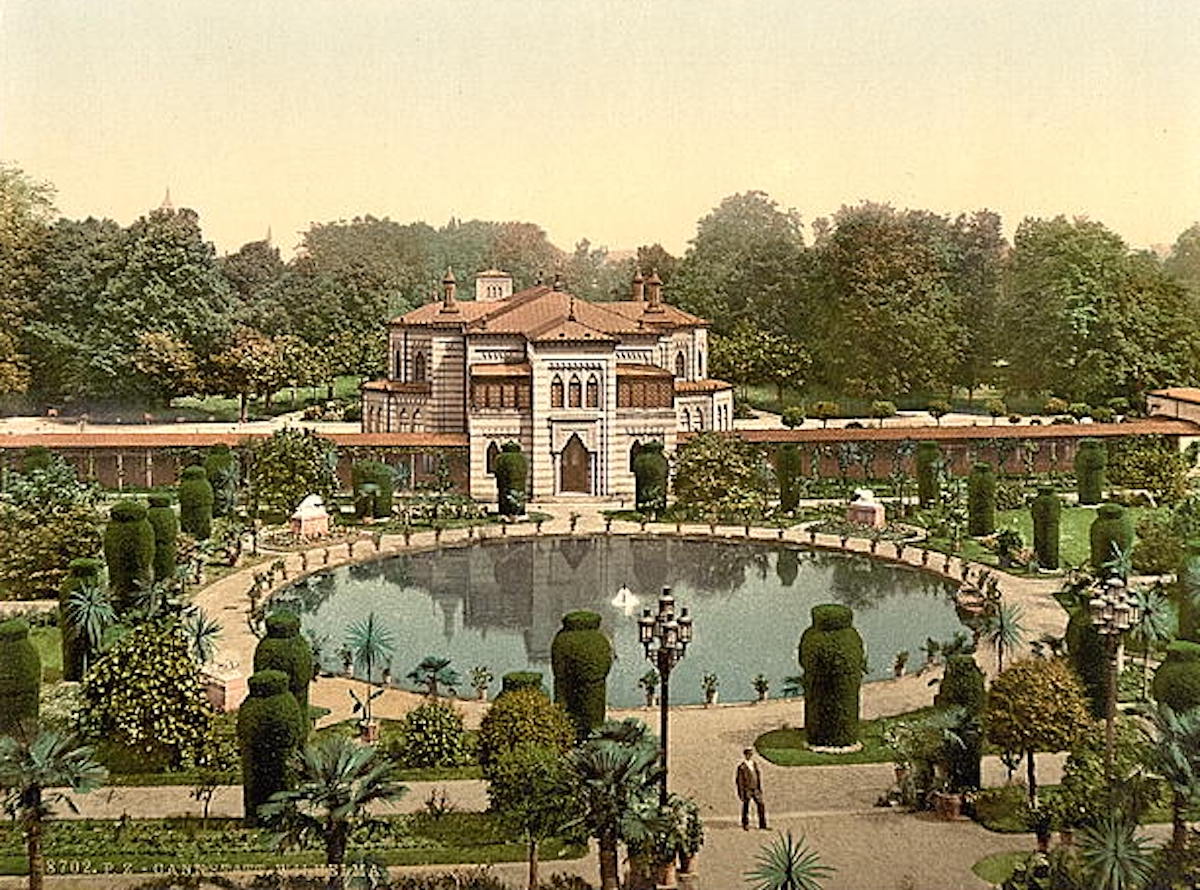
Wilhelma, the Royal Palace of Emperor Wilhelm, in the north of Stuttgart, which 'Abdu'l-Bahá visited on April 5, 1913. Wikimedia Commons.
Back at the Hotel Marquardt, in Stuttgart, the next morning, ‘Abdu’l-Bahá speaks about the children’s meeting:
The effect of last night’s meeting will be put on record in the world of eternity. The mentioning of it will be throughout the centuries and will be recorded in the countries of the Orient. Because these children are tender plants, their hearts are clear and transparent. They have not yet come to the dross of the world; that is why Christ said: “Blessed are the children, for they are of the Heavenly Kingdom.
Ahmad Sohrab letter to Harriet Magee, 5 April 1913
According to Ahmad Sohrab, 'Abdu'l-Bahá finds the German Bahá'ís so "warm and enkindled" that He decides to extend by a few days what had originally been planned as only a short visit of one or two days to Germany. 'Abdu'l-Bahá receives many visitors during the day, and at 3 in the afternoon, Dr. Edwin Fischer, Albert and Alice Schwartz take the Master to visit Wilhelma, the Royal Palace of Emperor Wilhelm, where 'Abdu'l-Bahá spends two hours walking through the buildings. In the evening, 'Abdu'l-Bahá addresses Esperantists, and has a few more meetings.
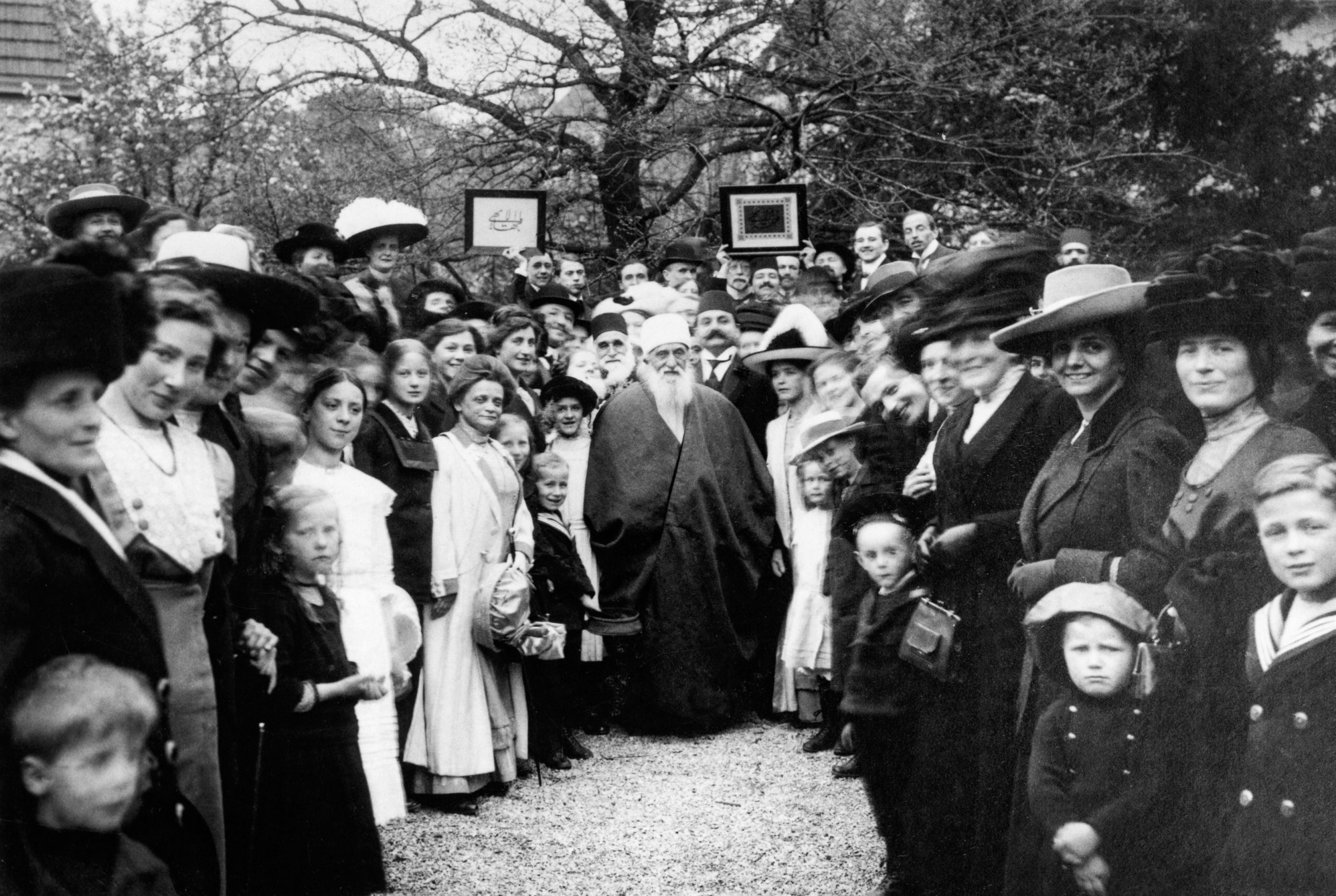
'Abdu'l-Bahá and around 100 friends at Villa Wagenburg in Stuttgart, on April 6, 1913. Bahá'í Media Bank.
'Abdu'l-Bahá again meets many people in the morning and Albert Schwartz takes the Master for a drive outside of Stuttgart where they see beautiful scenery of mountains and valleys, the Black Forest and flowering cherry trees. Ahmad Sohrab describes 'Abdu'l-Bahá at being enraptured by the landscape and the Master Himself remarks He is glad to have seen Germany in the spring. Upon their return, many photos are taken in Villa Wagenburg, due to the large size of the crowd assembled.
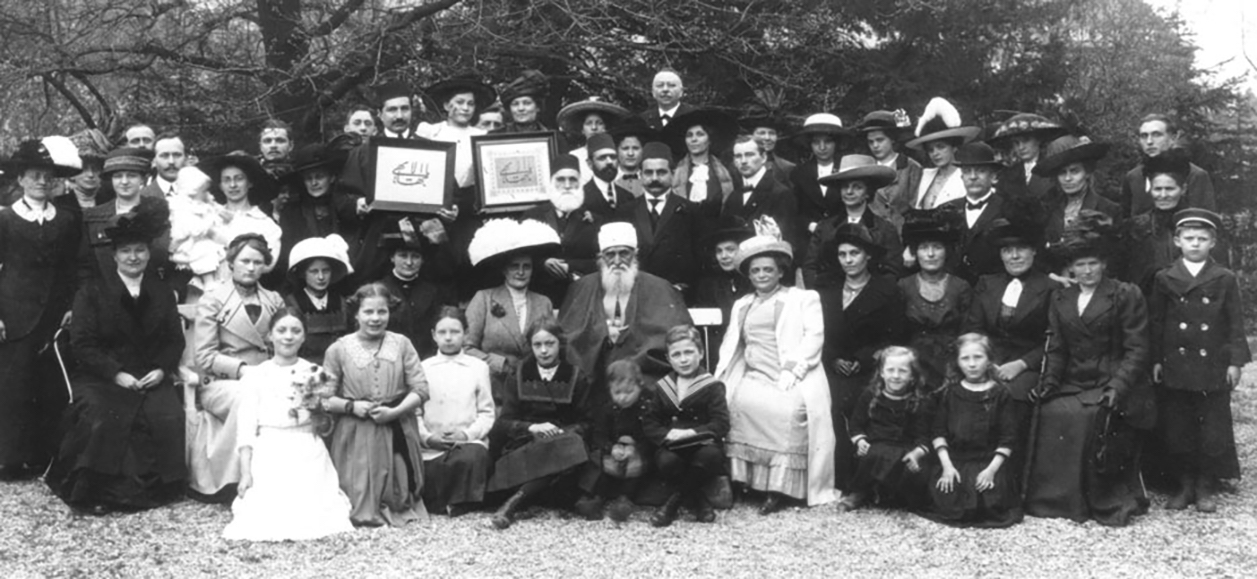
'Abdu'l-Bahá and friends at Villa Wagenburg in Stuttgart, on April 6, 1913. 'Abdu'l-Bahá in Germany.
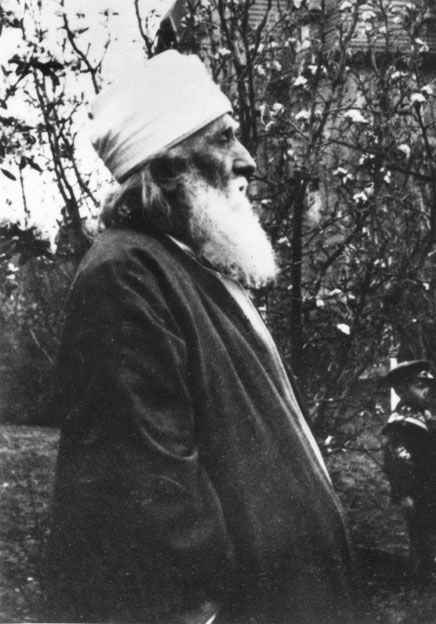
'Abdu'l-Bahá in the garden of Villa Wagenburg, April 6, 1913. 'Abdu'l-Bahá in Germany.
'Abdu'l-Bahá visits Mr and Mrs Schweizer in Zuffenhausen, then returns to Stuttgart, and gives His most well-attended public talk at the Oberes Museum in front of 800 people. The meeting is organized by the Bahá’í women of Stuttgart. After the meeting, 'Abdu'l-Bahá has dinner at the home of Alma Knobloch and Annamarie Döring. Even though 'Abdu'l-Bahá is tired from a long day, He climbs the four stories to their apartment.
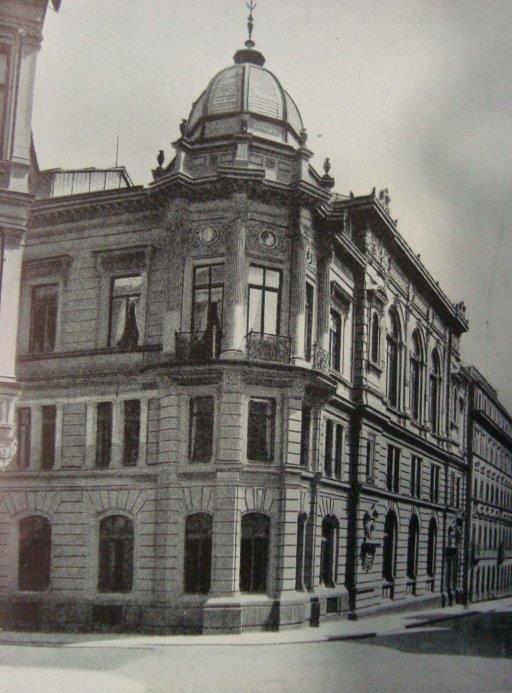
The Oberes Museum in Stuttgart, where 'Abdu'l-Bahá gave a public talk. Photograph courtesy of Alexander Meinhard.
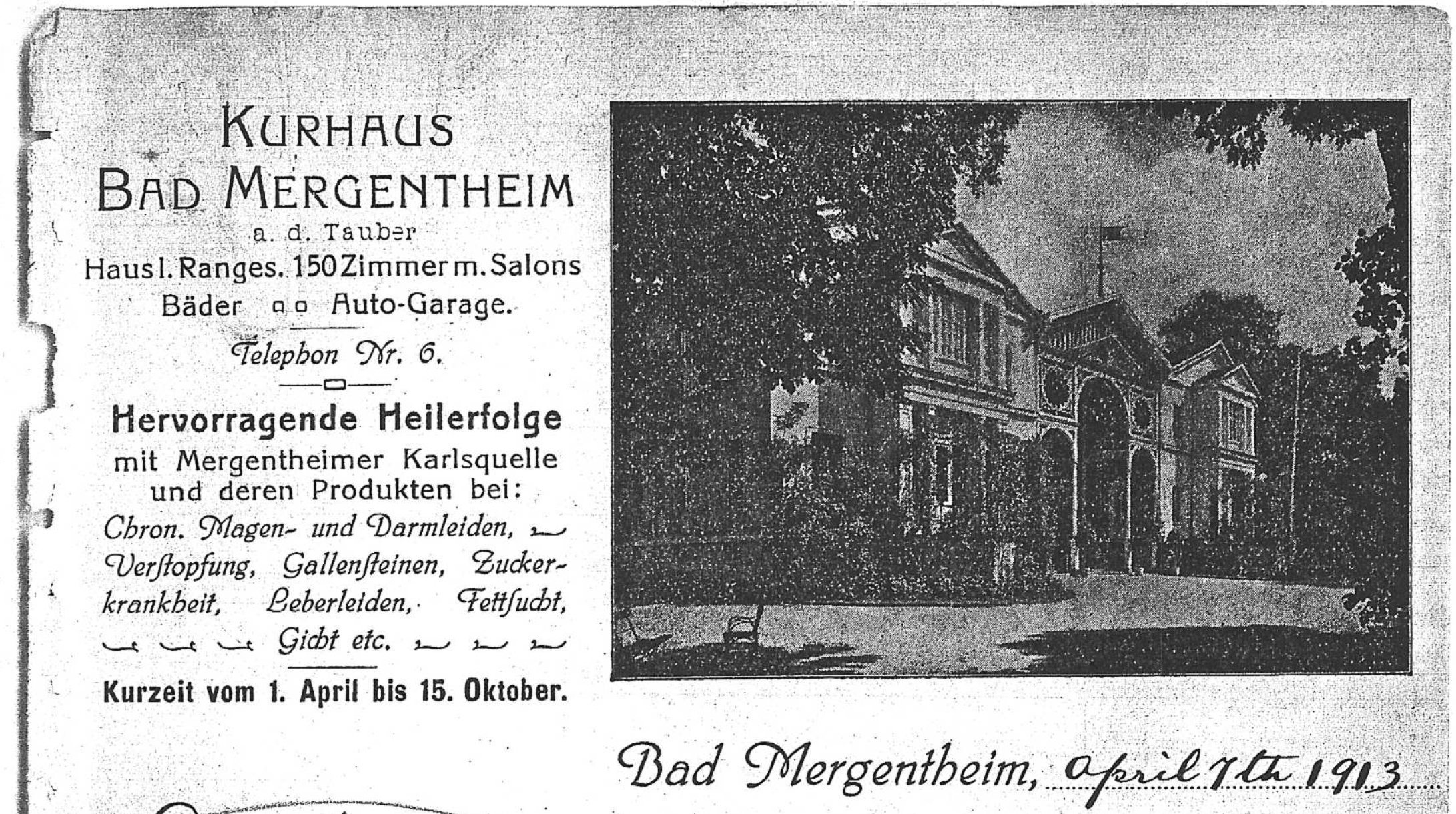
The hotel letterhead that Ahmad Sohrab writes his diary entry for April 7, 1913 on while 'Abdu'l-Bahá visits Bad Mergentheim.
"Here we are in the most beautiful part of Germany! Mergentheim Baths!" Ahmad Sohrab's enthusiastic diary entry echoes what 'Abdu'l-Bahá tells his companions on the long drive, that God has sent Him to Germany in the Spring so that He may love every part of it.
'Abdu'l-Bahá leaves Stuttgart shortly after ten in the morning on April 7, and travels 60 kilometers north to Bad Mergentheim at Albert Schwarz's invitation, arriving at four in the afternoon. Albert Schwarz is the owner of the health spa and hotel that are the fame of this quiet little town. 'Abdu'l-Bahá rests and takes a walk around the beautiful surroundings then has a lovely evening regaling His friends with a half-dozen funny stories.
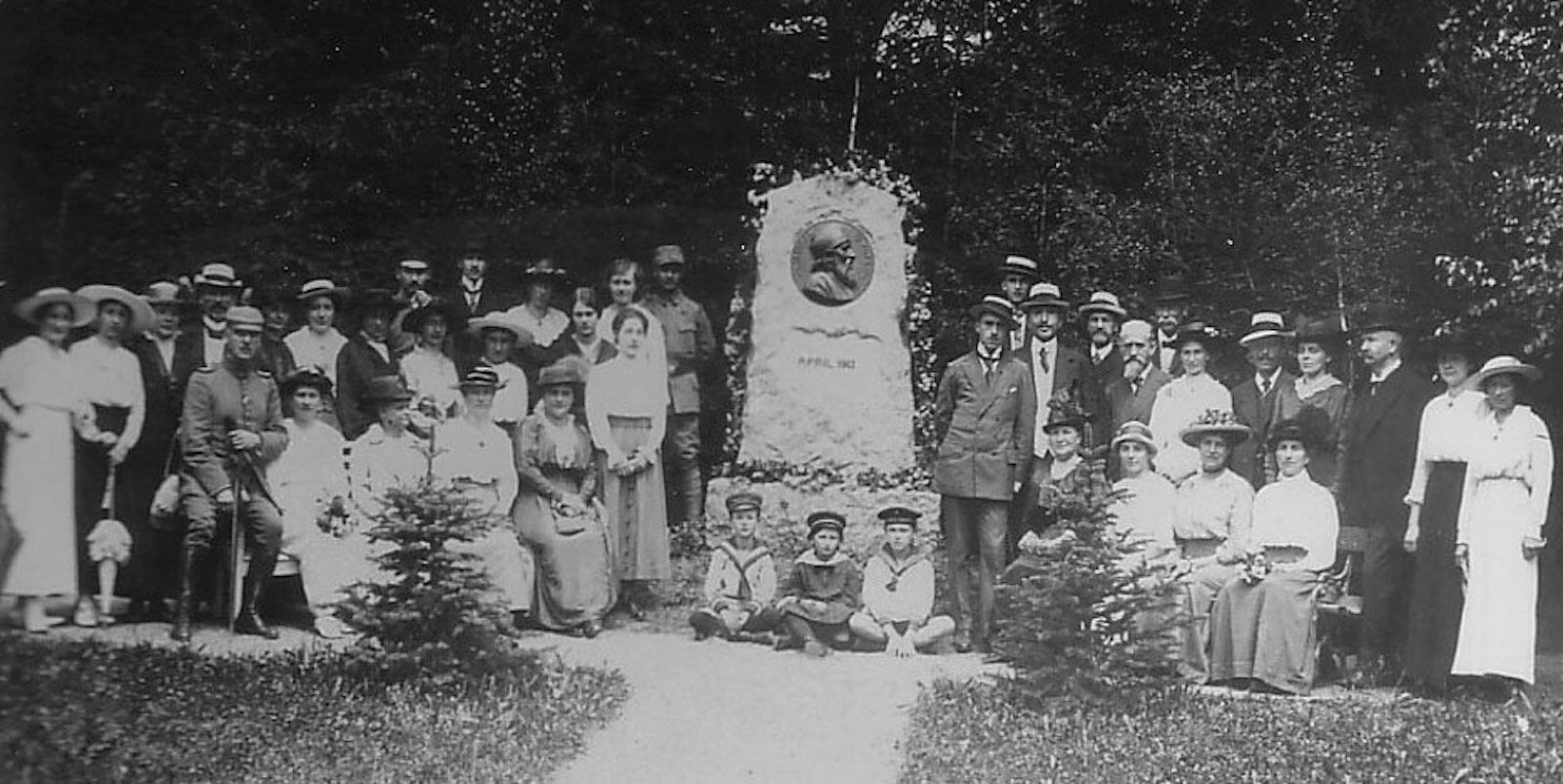
“This is a wonderful place, the atmosphere has an extremely beneficial effect on the sick. The surroundings are lovely and pleasing to the eye." Abdu'l-Bahá spoke these words on April 7, 1913 in Bad Mergentheim when he visited the Kurhaus and the Kurpark.' In memory of his visit, the Stuttgart and Esslingen friends erected a memorial stone in 1916. Photograph and caption from 'Abdu'l-Bahá in Germany.
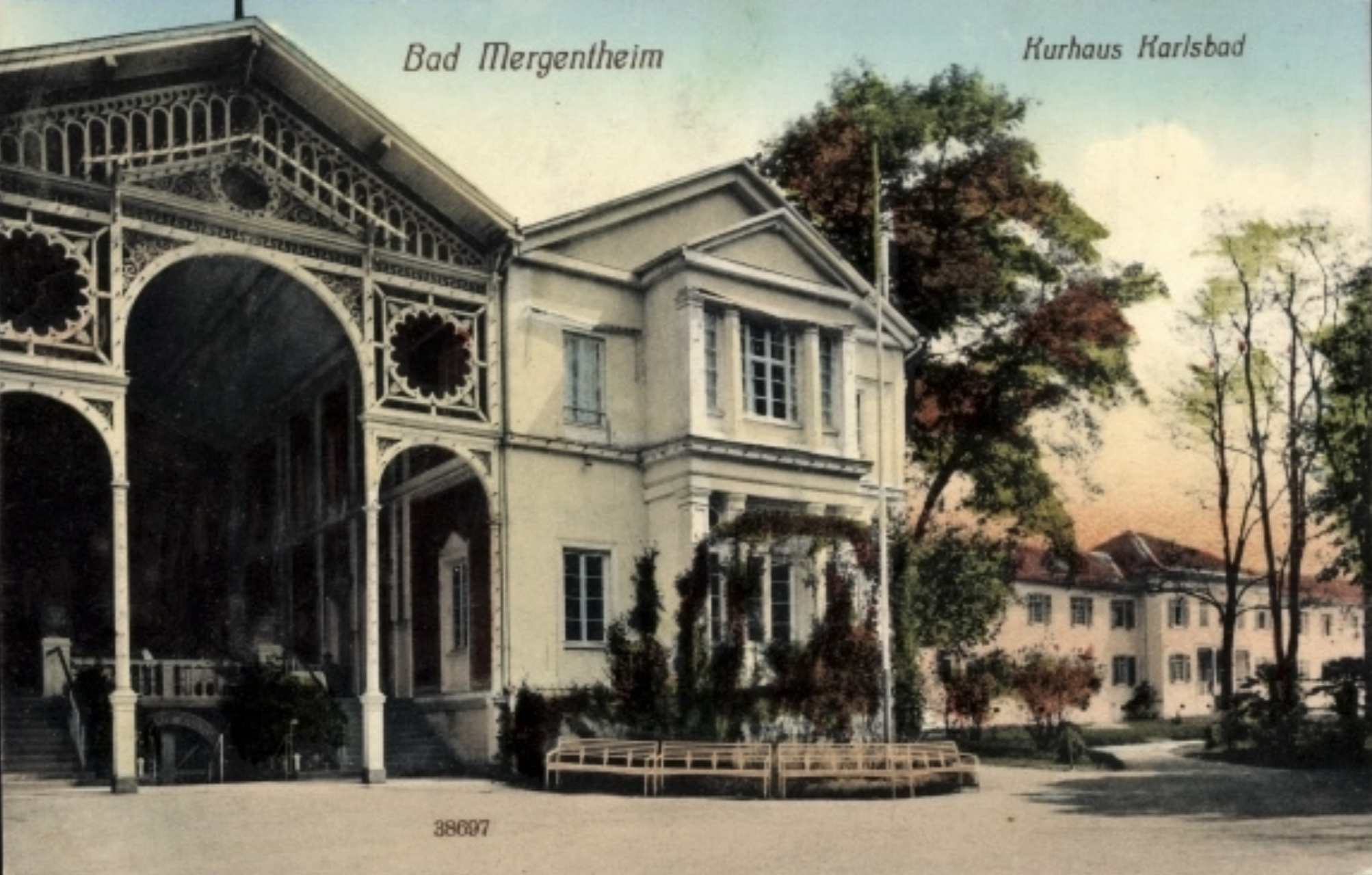
Bad Mergentheim, where 'Abdu'l-Bahá spends April 7-8, 1913. This view is the same view as the one on the letterhead to the hotel. Source.
On His second day in Bad Mergentheim, 'Abdu'l-Bahá tells Ahmad Sohrab that He has never heard so many nightingales singing in such a lovely setting since He had left Persia, which would have been sixty-one years ago, as 'Abdu'l-Bahá left Ṭihrán for Baghdád in 1852. 'Abdu'l-Bahá goes on to describe the setting as an earthly paradise. After a tour of the water-bottling factory, 'Abdu'l-Bahá inscribes a lovely prayer in the Guestbook of the hotel at Bad Mergentheim:
O Almighty! 'Abdu'l-Bahá arrived in this hotel and observed the utmost of consideration on the part of everyone. For one night He rested here. O God! Make this hotel blessed and successful.
In keeping with ‘Abdu'l-Bahá's unfailing generosity and thoughtfulness throughout His Journeys to the West, the Master has all the maids and servants called out, then proceeds to give each of them some money. On the return trip back to Stuttgart, they stop in the town of Beilingen, where Albert Schwarz is building a power plant for the area, and the town of Weinsberg, where 'Abdu'l-Bahá rests and visits a small museum for Theobald Kerner. They arrive in Stuttgart after two in the afternoon.
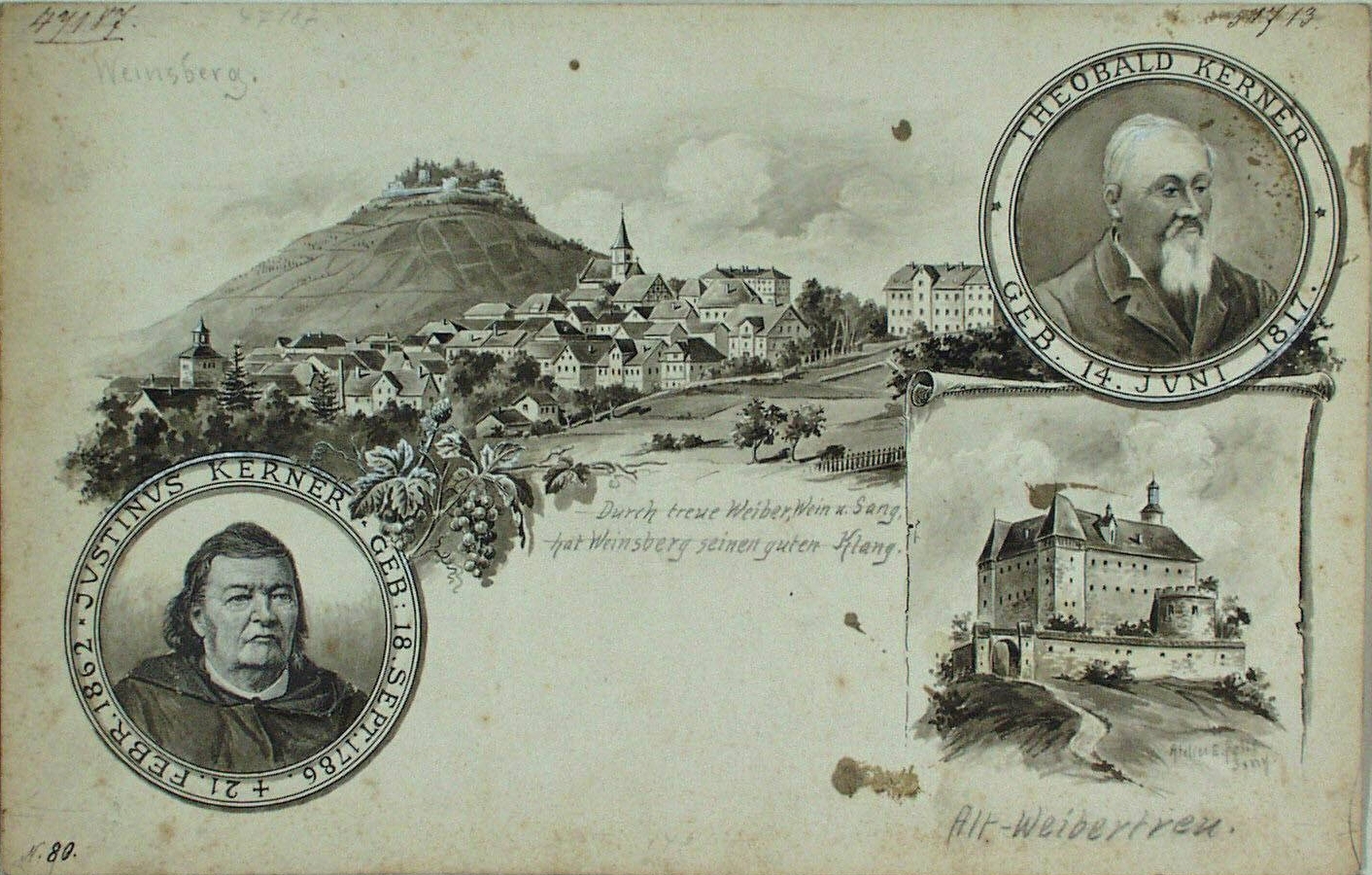
1907 commemorative postcard of the city of Weinsberg, with its most illustrious son, Theobald Kerner, who passed away that same year, six years before 'Abdu'l-Bahá visits his home and museum with great interest on April 8, 1913. Wikimedia Commons.
Lipót Stark, who has been organizing the Master's visit in Budapest with his wife, has sent 'Abdu'l-Bahá a telegram saying: "Everything ready. Lecture rooms, translators, reception, newspapers, over one thousand invitation issued." ‘Abdu’l-Bahá boards the train to Budapest at 8 in the evening, with over a hundred Bahá'ís bidding Him farewell at the Station and the first leg of 'Abdu'l-Bahá's visit to Germany ends as it has started, with a lovely surprise. Just as 'Abdu'l-Bahá had surprised the Germany Bahá'ís with His unexpected arrival, Anna Köstlin and the Esslingen Bahá’ís have arranged a surprise for 'Abdu'l-Bahá: when Anna Köstlin asks Him to look out of the window, He sees the Esslingen platform filled with Bahá’ís waving white handkerchiefs and flowers in the air, and 'Abdu'l-Bahá, waves back with a "radiant, surprised, happy face."
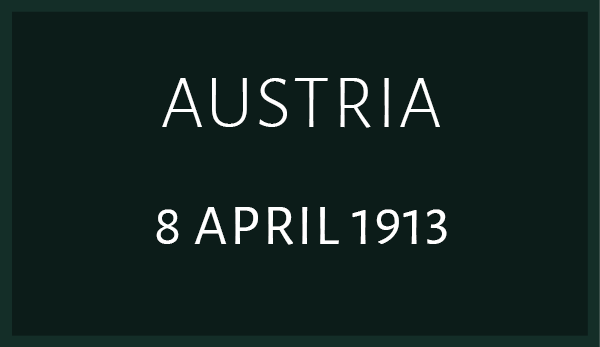
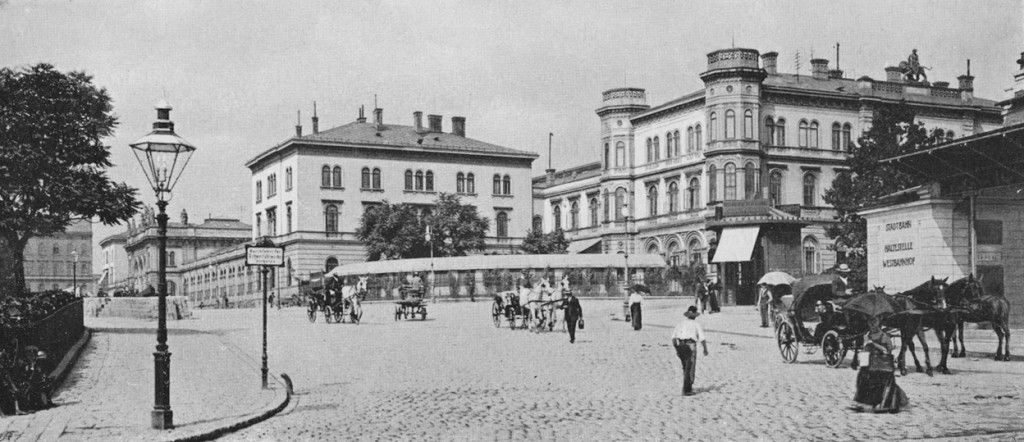
Vienna's Westbahnhof, the train station for westbound arriving and departing trains, including destinations such as France and Germany. Mahler Foundation.
After leaving Stuttgart at 8 in the evening and passing through Esslingen, the train crosses into Austria at 2 in the morning and Ahmad Sohrab is awoken by Customs offficials asking if they have anything to declare. They arrive in Vienna at 8:10 in the morning and are welcomed by the brother of Ahmad Bageroff, his wife and their three children who welcome 'Abdu'l-Bahá to Vienna with happy faces and flower bouquets. 'Abdu'l-Bahá and His party cross Vienna by taxi in order to reach the train station on the other side of the city and board their train bound for Budapest.
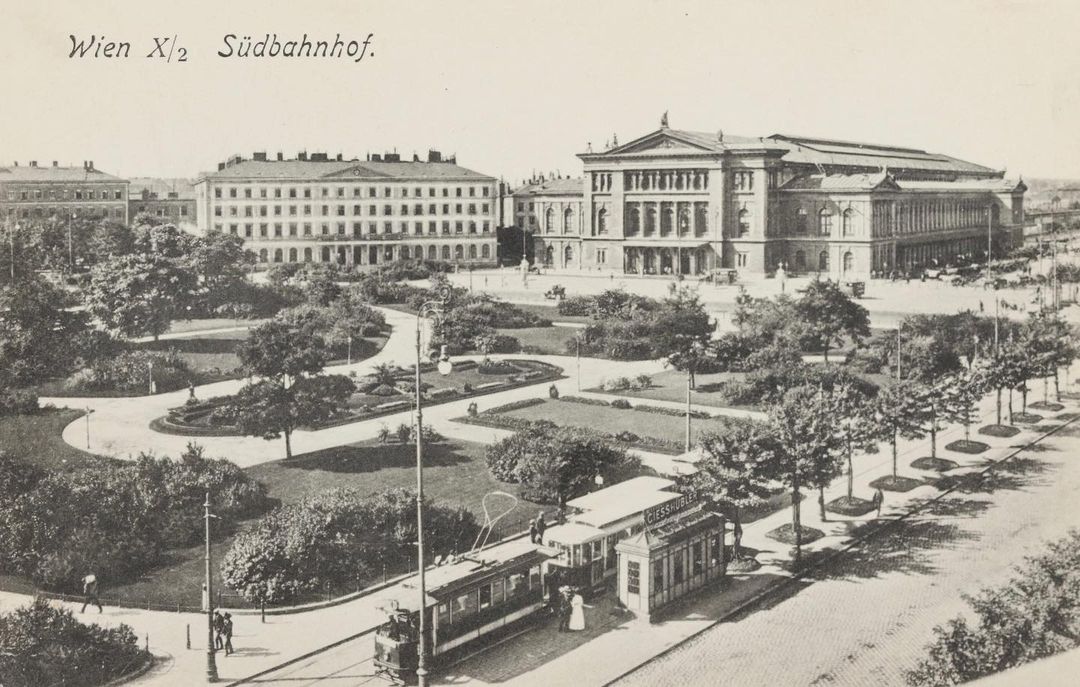
Vienna's Südbahnhof, the train station for arriving and departing southbound trains, for destinations such as Hungary but also Croatia and Italy, among others. Downtown Vienna blog.
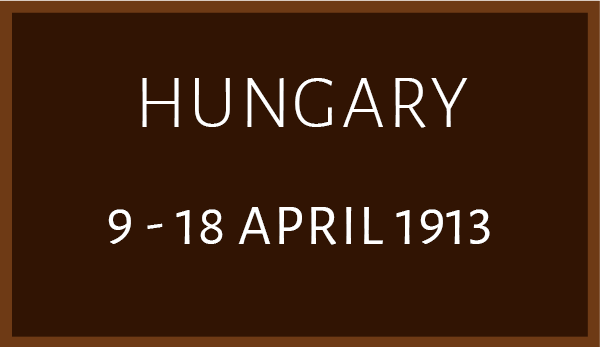
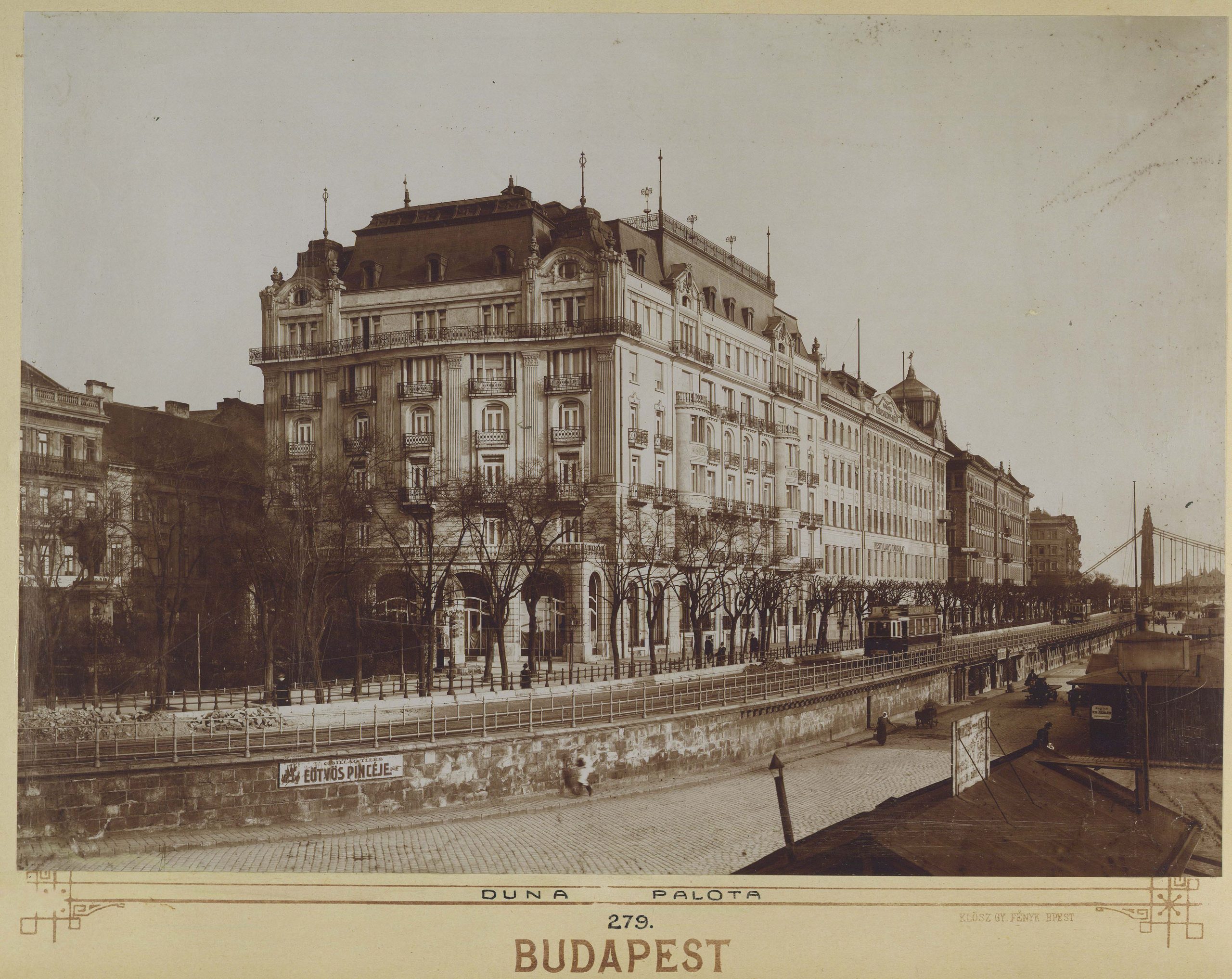
The Hotel Ritz in Budapest, where 'Abdu'l-Bahá stayed for His nine days in Hungary. Source.
When 'Abdu'l-Bahá visited Scotland, there was only one Bahá'í, Jane Whyte, living there. But there are no Bahá'ís in Hungary before 'Abdu'l-Bahá arrives, and this sets Hungary apart from every other country visited by the Master in His Journeys to the West. Until 'Abdu'l-Bahá sets foot in Budapest, Hungary, there has been no Bahá'í visitor to the country, and there is no Bahá'í living there, even though there are highly-enkindled souls seeking to learn more about the Bahá'í Faith. And so in Hungary, it is 'Abdu'l-Bahá who brings the Bahá'í Faith to the country with His ten-day visit in April of 1913. One more particularity of Hungary, is that, because there are no Bahá'ís living there, every single detail of 'Abdu'l-Bahá's stay, the media coverage, appointments, is all managed by various societies, with Lipót Stark and his wife Karolina having been the ones who repeatedly asked 'Abdu'l-Bahá to come until He finally agreed, and who were the ones to arrange most of His talks while the Master was still in Germany.
In Budapest, 'Abdu'l-Bahá stays in the elegant and newly-constructed Ritz Hotel, on the bank of the Danube River. As soon as 'Abdu'l-Bahá arrives, a large group of eminent thinkers, artists and reports meet Him, including Dr. Germanus Gyula, Lipót and Karolina Stark, Umrao Singh Sher Gil and his Hungarian wife, Balogh Vilma, a journalist, Kunos Ignác, and Simonyi Sándor. They welcome 'Abdu'l-Bahá in the name of several humanitarian societies, and Lipót Stark gives Ahmad Sohrab several newspapers containing articles about 'Abdu'l-Bahá's arrival. 'Abdu'l-Bahá thanks the assembled friends for their spiritual susceptibilities and praises God that difficulties were removed so that He is able to be in their midst and Leopold Stark thanks the Master for His sacrifices with these words:
In the name of all present we welcome the blessed Presence of ‘Abdu’l-Bahá. We admire your great life and we offer You our thanks and deep gratitude, that at Your age, You take upon Yourself these long journeys for the sake of helping and comforting humanity. Such labours, such sacrifices as ‘Abdu’l-Bahá endures are our great examples, that we may know how to live and to serve humanity.
Martha Root, ‘Abdu’l-Bahá’s Visit to Budapest’, in Star of the West, vol. 24, no. 3 (June 1933), p. 84
‘Abdu’l-Bahá replied with His hope that every one of them would be assisted in service to the world of humanity, as there is no greater cause than the Oneness of the world and universal peace, adding that they must set the souls free from ancient religious, racial, political and patriotic prejudices, for as long as these prejudices lasted, it would be impossible for the human world to find peace and security, and that here, in Hungary, they must emphatically proclaim the oneness of the human race, the oneness of the native land and the oneness of mankind, that they were all the progeny of one Adam, the sheep of one shepherd and the trees of one orchard. 'Abdu'l-Bahá continued in this vein of unity and oneness, and at the end, a photographer requested to a picture. Three pictures were taken, one with everyone, one with the Persians and one of 'Abdu'l-Bahá alone on the bench.
According to the National Spiritual Assembly of Hungary's booklet entitled "In the Footsteps of 'Abdu'l-Bahá in Budapest, 1913," during the ten days of 'Abdu'l-Bahá's visit to Budapest, there were:
39 talks and events (ranging from lectures, home visits, interviews, discussions with individuals or groups);
29 newspaper articles about His visit;
12 locations visited by 'Abdu'l-Bahá;
7 meetings with societies;
2 public lectures; and
2 talks at the Theosophical Society, and
one full day of 'Abdu'l-Bahá's visit to Hungary was spent inside the Ritz hotel, due to illness.

'Abdu'l-Bahá, His secretaries and His reception committee in front of the Hotel Ritz in Budapest, Hungary. No date given. Courtesy of the National Bahá'í Archives of Hungary.
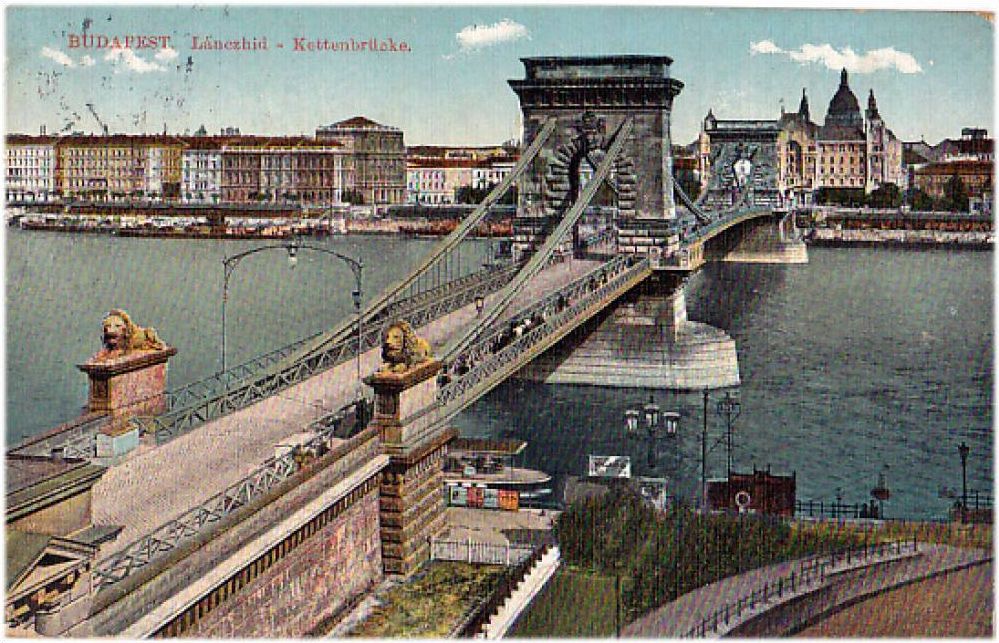
The Chain Bridge between Buda and Pest, across the Danube, where 'Abdu'l-Bahá walked on His first full day in Budapest, on April 10, 1913. Source.
In the morning, after visiting with Edward Moore's family, 'Abdu'l-Bahá crossed the Chain Bridge to Buda with Charles Moore, Edward's youngest son. People recognize 'Abdu'l-Bahá from the newspaper articles and one person even asks Him for His autograph. During the day, at the Hotel, 'Abdu'l-Bahá receives many visitors, and 'Abdu'l-Bahá tells them "it was His hope that Budapest might become a centre for the reunion of the East and West, and that from this city the light might emanate to other places." In the evening, 'Abdu'l-Bahá gives His first talk to 50 people at the Theosophical Society. 'Abdu'l-Bahá calls them "a noble, spiritual gathering because they were most diligent in their endeavors for peace and fellowship." He was introduced by the President of the Society, Robert Nadler, who after giving a history of the Cause, introduces 'Abdu'l-Bahá with these words:
I bid welcome to our Master Abdul Baha. I have no doubt that I express the feelings of those who are present that it is the greatest privilege of our lives and our supreme happiness to entertain in our midst one who is such a pure channel of the spirit of God. Many of us have studied these Teachings and have come to admire its progressiveness and its lofty idealism. (...) The western people in striving to discover the physical laws of nature have completely forgotten the spiritual laws of inner life and have overlooked idealism and absolute Reality. We are doing now our utmost effort to gain the lost ground and for this very reason it is with the greatest pleasure that we welcome in our midst the noblest and the sublimest Representative of the spiritual life of the East and we hope that he will feed us tonight with the ideal sustenance which God so abundantly has showered upon him. Abdul Baha, I welcome you with all my heart and soul.
Ahmad Sohrab's letters to Harriet Magee April 10, 1913, page 6
Abdu'l-Baha replies that He is greatly pleased to address such a spiritual assembly. He calls them a noble, spiritual gathering because they are most diligent in their endeavors for peace and fellowship, and in His address takes some of the themes of western material progress and eastern spiritual truths covered by Robert Nadler in his lengthy introduction, expertly interweaving them with the Bahá'í teachings on the oneness of mankind. His words profoundly move the audience that Robert Nadler thanks Him very effusively, prompting 'Abdu'l-Bahá to give an additional explanation about the emotions of the human heart. Robert Nadler invites 'Abdu'l-Bahá to return on April 12 and speak to the Theosophical society for a second time.

Photograph of 'Abdu'l-Bahá taken on April 9, 1913 in Budapest and published in a newspaper. The caption reads: "An Asian Prophet in Budapest. Abdul Baha, who has eight million followers in the world." Courtesy of the National Bahá'í Archives of Hungary.
Many people arrive to speak to 'Abdu'l-Bahá, their curiosity peaked by the newspaper articles about Him and his visit. 'Abdu'l-Bahá is occupied with receiving visitors from the morning until the afternoon. Professor Nadler is granted permission to paint 'Abdu'l-Bahá's portrait. He will later tell Martha Root:
When I saw ‘Abdu’l-Bahá, He was in His seventieth year. I was so impressed and charmed with His Personality that I had the great longing to paint His portrait. He consented to come to my studio, but said He could not give me much time because He was so busy. I marvelled at His expression of peace and pure love and absolute good-will. He saw everything with such a nice eye; everything was beautiful to ‘Abdu’l-Bahá, both the outer life of Budapest and the souls of all. He praised the situation of our city, our fine Danube in the midst of the town, good water, good people. Oh, He had so many beautiful thoughts! I was inspired, and I knew I did not have much time, so I concentrated very much. He gave me three sittings.
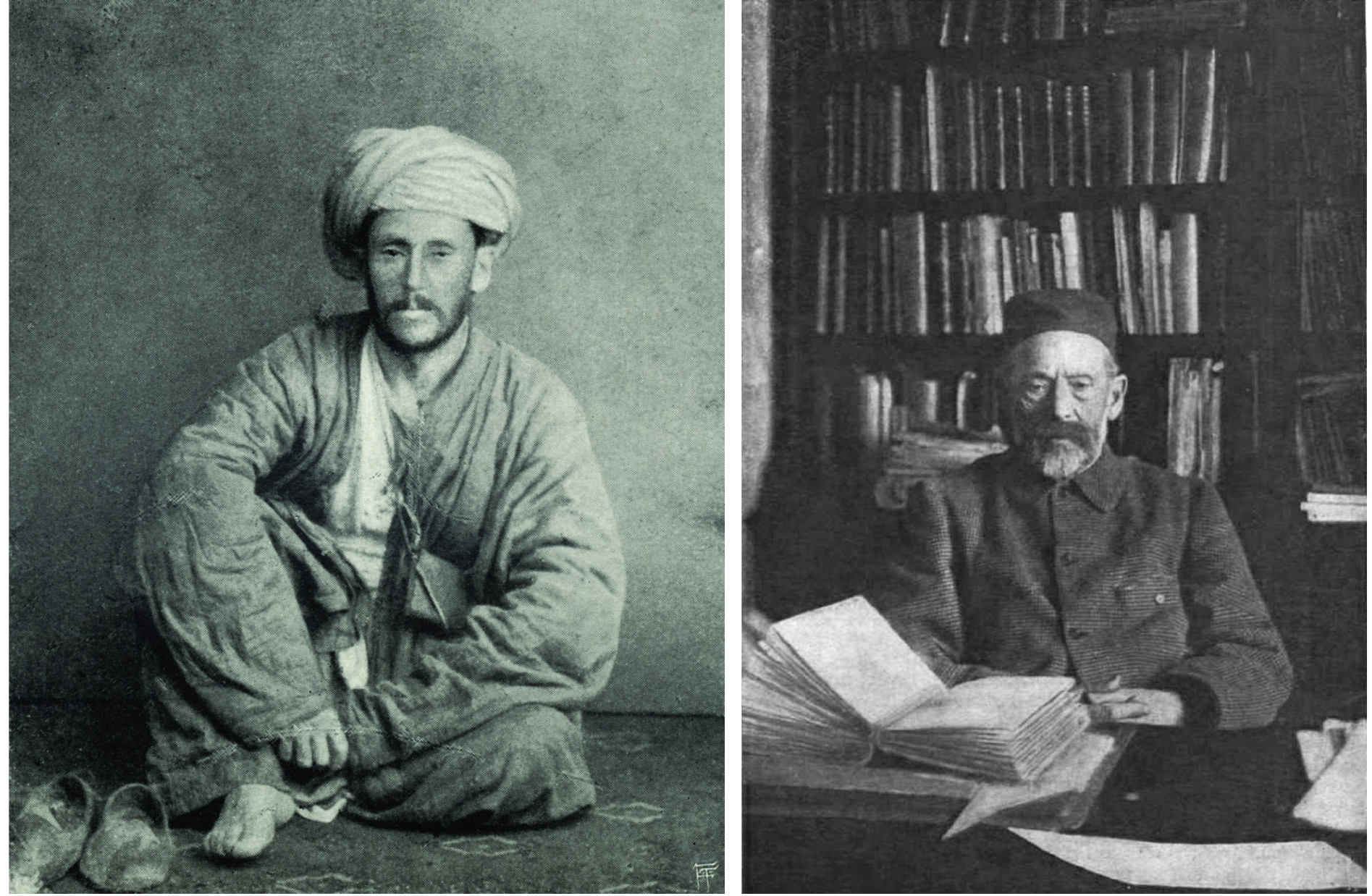
Armin Vámbéry Left: dressed as a dervish in 1860 (Wikimedia Commons), Right: Later in life, close to the time when He meets 'Abdu'l-Bahá in 1913 in Budapest. (Wikipedia.hu).
At 4 in the afternoon ‘Abdu’l-Bahá visits Professor Arminius Vámbéry, the most eminent orientalist of Hungary, and 82 years old and in ill health at the time. 'Abdu'l-Bahá spoke to Vámbéry about His travels, talks in churches and synagogues and about the oneness of religion. Professor Vámbéry is deeply affected by the words of 'Abdu'l-Bahá and will refer to the Bahá'í teachings as the only medicine that can successfully be used against the disease that affects all nations today. Vámbéry passes away five months after 'Abdu'l-Bahá's visit to Budapest.
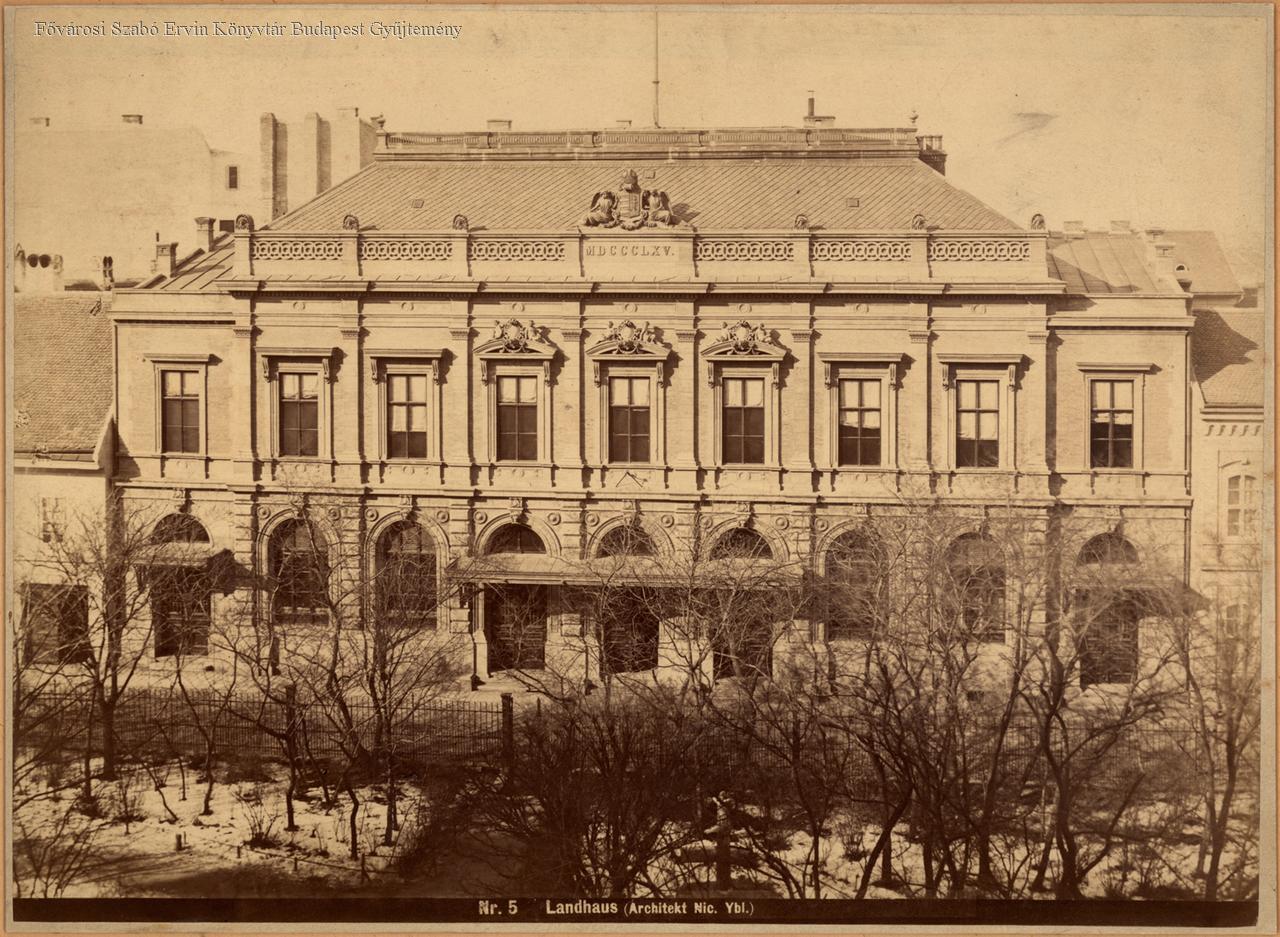
House of Representatives where 'Abdu'l-Bahá speaks on April 11, 1913. The picture above is taken from the National Museum. In the foreground are the trees of the Museum Garden. On the facade of the House of Representatives is engraved the year 1865 when the building was built and the coat of arms of Hungary with angels, like those mentioned in the story below. (Budapest Picture Archive) (Budapest Picture Archive)
After His visit to Vámbéry, ‘Abdu’l-Bahá arrives at the House of Representatives, the old Parliament Building. 'Abdu'l-Bahá, so tired He is barely able to speak, manages to give a powerful address to 1,000 people. Martha Root, when writing the story of 'Abdu'l-Bahá's visit to Hungary, says that 'Abdu'l-Bahá was standing directly beneath the coat of arms of Hungary, two white-winged angels, pictured in the image above. Standing on the high platform of the building that used to be the Hall of Parliament, the audience sees a holy teacher, come to speak about the oneness of religion, with, to His left, Prelate Giesswein, a Catholic, and to His right, Dr. Goldziher, a Jew. Martha Root says: "Suddenly the people, as if sensing the deep significance of the moment, burst into tremendous applause. They felt, if they did not understand, that 'Abdu'l-Baha standing between the Catholic Prelate and the Jewish Orientalist represented the reconciliation of these two great religions."
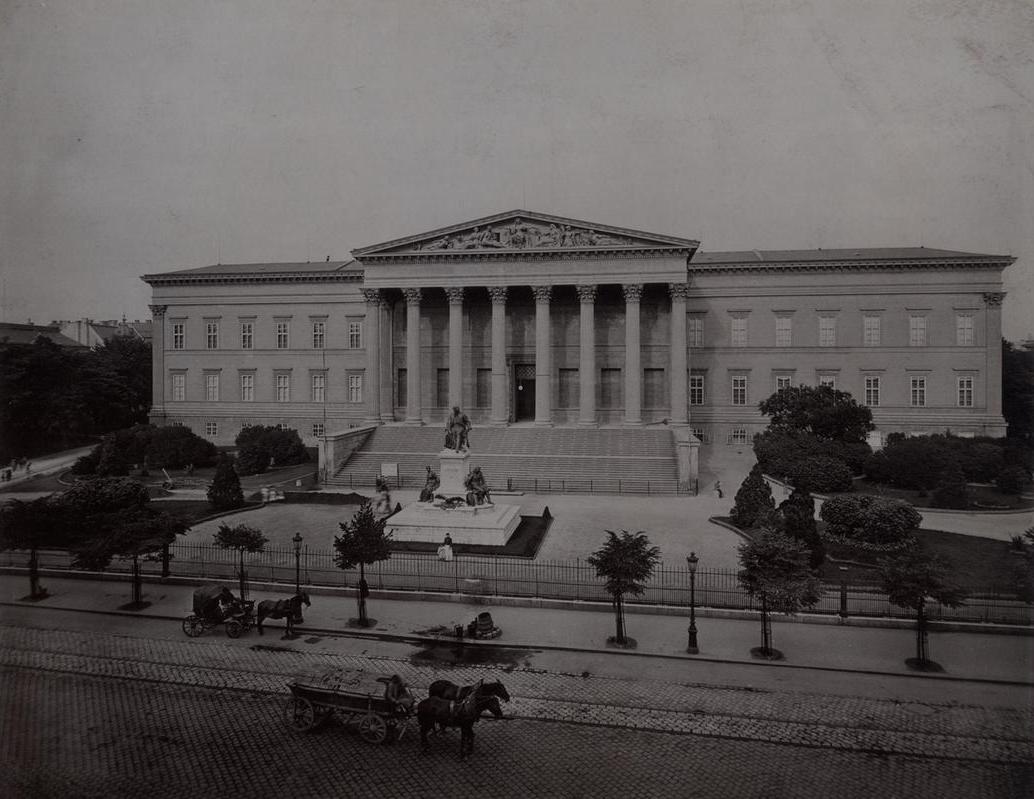
The National Museum Building in Budapest, twenty years before 'Abdu'l-Bahá gives a talk here in April 1913. Budapest Picture Archive.
On 12 and 13 April, 1913, 'Abdu'l-Bahá received many visitors, was invited to speak at the Turanian society by Paikert Alajos, sat for another session of painting for Professor Nadler, spoke to a Jewish Rabbi, received Umrao Singh Sher-Gil and His Hungarian wife, then visited the latter and their family the next day. A violent snowstorm started on April 12, 1913, and continued through the day. In the morning of April 14, 1913, they spent a quiet morning working on correspondence, and around noon, when the weather had cleared, 'Abdu'l-Bahá called on the Turkish Consul General and spoke to him about the situation in Asia and the need for unity. Then, 'Abdu'l-Bahá paid a two-hour visit to Dr. Vámbéry.
'Abdu'l-Bahá's address to the Turanian Society took place at 7 in the evening at the National Museum Building. Hungarian Turanism is a cultural movement that seeks to associate Hungarians to their Central Asian roots. 'Abdu'l-Bahá spoke to 200 prominent men and women about Turanian culture (one of the early tribes of the Avestan era, east of Iran) and noted that it had been destroyed by religious conflict, moving on to speak about how to attain a long-lasting peace.
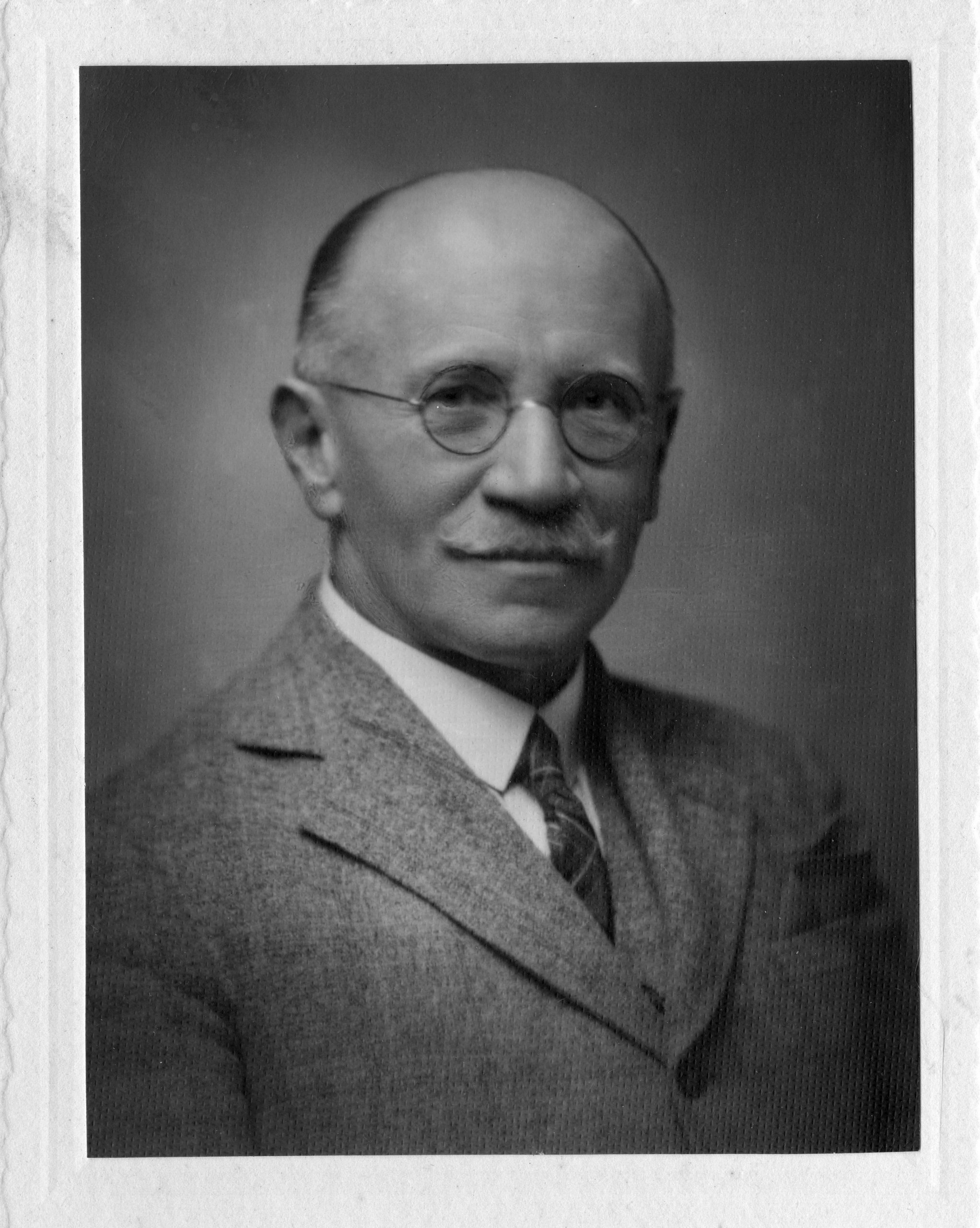
Lipót Stark (sometimes seen anglicized as Leopold Stark), who gave a lecture to the Theosophical Society in 1912, a year before 'Abdu'l-Bahá visits Hungary, invited 'Abdu'l-Bahá to Hungary, organized His visit, he and his family are called "Apostles" by 'Abdu'l-Bahá and is tasked by 'Abdu'l-Bahá to organize the Bahá'ís in Budapest after His departure. Bahá'ís of Hungary Website.
The snow storm returns on April 15, 1913. This unexpected cold front that has engulfed England, France, Germany and Austria as well, and 'Abdu'l-Bahá catches a cold. He nonetheless receives many visitors and gives many talks, one on one and to two or three individuals at a time each day. On April 16, 1913, 'Abdu'l-Bahá does not leave the Hotel Ritz. During this time, the most significant events have to do with the Stark family. On April 15, 1913, a conversation takes place between 'Abdu'l-Bahá and Lipót Stark's wife, Karolina, and their family. When Lipót Stark had heard through the Theosophical Society in London, that 'Abdu'l-Bahá was in Europe, he had twice asked 'Abdu'l-Bahá to visit Hungary, and even offered to pay for His trip. ‘Abdu'l-Bahá, as per His never-broken rule, politely declined this generous offer of financial assistance. In 1912, Stark gave a talk introducing the Bahá'í Faith at the Budapest Theosophical Society, which was published in their Journal. This article has yet to be found. Stark continued to contact Ahmad Sohrab in London, Paris and Stuttgart, where 'Abdu'l-Bahá decided, at long last, to visit Budapest. Stark made all the arrangements for the visit, but on April 15, 1913, it comes to light that even Lipót Stark's wife had been active in the effort to bring 'Abdu'l-Bahá to Budapest.
Ahmad Sohrab in his diary calls Lipót and Karolina Stark "the pure channels of introducing the Cause to Hungary." Lipót Stark speaks seven languages, his wife speaks six, both fluently, and is by all accounts a very charming and exceptionally-capable woman. Lipót Stark is a leading figure of the Hungarian technical intelligentsia, chief engineer and later CEO of Magyar Villamossági Rt, he plays a large role in organizing the logistics for Budapest's supply in electricity. Stark shows a great interest in spiritual matters, and the home he has built with his wife is a cosmopolitan one, where the foreign intelligentsia of Budapest meet. Lipót Stark credits her, speaking to 'Abdu'l-Bahá, by saying "the success of these meetings chiefly belongs to my wife because when she is interested in a Cause, she works untiringly and enthusiastically. I have done very little. I am a busy man."
When Stark says this, Karolina Stark immediately chimes in:
We will do everything we can to spread these teachings in Hungary. Oh I am so very happy to see the Master so pleased with our humble effort. Really, I am myself astonished at the interest manifested all around. People before the coming of the Master were surprised at our daring to invite Him to a country wherein no one has heard anything about the Bahá’í revelation. I was afraid a little myself that perhaps the public and the press will be indifferent but, I said, I will do everything possible and leave the rest in the hand of the Master. Now I am so glad, so happy that the Cause is received in Budapest with such seriousness and dignity. We could not do this in a hundred years.
Ahmad Sohrab letter to Harriet Magee, 15 April 1913
In the afternoon of April 15, Karolina Stark returns to enquire after 'Abdu’l-Bahá's health. He then tells her:
I love you and your husband very much. You are my daughter and he is my son. You are the first Apostles to introduce the Cause of Bahá'u'lláh to Hungary and this honor shall be handed down to all your future posterity. The members of your family shall glorify in you. God shall confirm you always. Rest thou assured. I will be always with you and your husband.
Ahmad Sohrab letter to Harriet Magee, 15 April 1913
Mrs. Stark replies:
I will spare no effort and shall strive all the time to promulgate these spiritual principles in Hungary and will do my utmost to serve The Cause.
Later this same day, 'Abdu'l-Bahá speaks to Lipót and Karolina Stark and to Edward Moore about the future of the Faith in Hungary:
The Cause will be spread very much in this country. Blessed Souls shall arise to serve the Bahai revelation. They will be the means of the happiness of your hearts. The banner of the Cause shall be unfurled over the cities of Hungary. For the present those amongst you who are interested in the Cause, gather ye together once a week, read the Tablets of Bahá'u'lláh, speak on the Cause and whenever you find a thirsty soul, offer him the cup of this salubrious water. Rest ye assured that Baha-Ullah shall confirm you and you shall be assisted by God in this Work!
Ahmad Sohrab letter to Harriet Magee, 15 April 1913
When Lipót Stark asks the Master which books should be translated and circulated first, 'Abdu'l-Bahá responds: The Hidden Words, Kalimát-i-Firdawsíyyih (Words of Paradise), Tajaliyyát, Ṭarázát, Bahá'í Proofs by Mírzá Abu’l-Faḍl-i-Gulpáygání, and other small pamphlets containing historical accounts. Finally,on April 17, at last, the snow melts, the sun returns, and with it, so does 'Abdu'l-Bahá's health. 'Abdu'l-Bahá visits the Starks at their home, and speaks to Lipót and Karolina, their son, their cook, maid and governess, saying:
From this house, the lights of guidance have shone forth. From this house, the call of the Kingdom of Abha has been raised. This is the first home in Hungary in which the name of Bahá'u'lláh was mentioned. May it become always a center of guidance. May many Bahá'í meetings be held here! . . . In the future people will come from all parts to visit this house, because this is the first house from which the glad tidings of the appearance of the Kingdom of Abha was issued.
Ahmad Sohrab letter to Harriet Magee, 17 April 1913
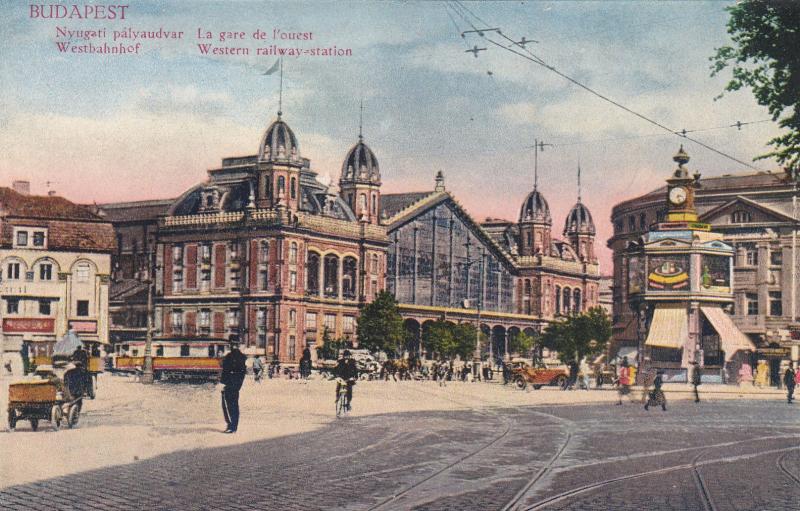
Budapest's Western train station for trains departing towards Austria, Germany, and France among other destinations. Source.
On His last day in Hungary, 'Abdu'l-Bahá visits Robert Nadler one last time to sit for His painting, and many people are waiting for Him at the Ritz hotel when He returns. After meeting with them, 'Abdu'-Bahá consents to Edward Moore recording His voice chanting a prayer. At two in the afternoon, a large number of friends, Hungarians, Turks, Americans and Indians, among which 30 new Bahá'ís, are there to bid 'Abdu'l-Bahá farewell. To His assembled friends, 'Abdu'l-Bahá says ‘He had set a flame aglow, and the day would break when its light would shine visibly to everybody. He explained that the origin of a tree is only a small seed, but if it develops and begins to grow, it will bear a beautiful fruit.’
This list is taken from Ahmad Sohrab's letters to Harriet Magee, Martha Root's article in Star of the West and the National Spiritual Assembly of Hungary's website page for 'Abdu'l-Bahá's visit to Budapest:
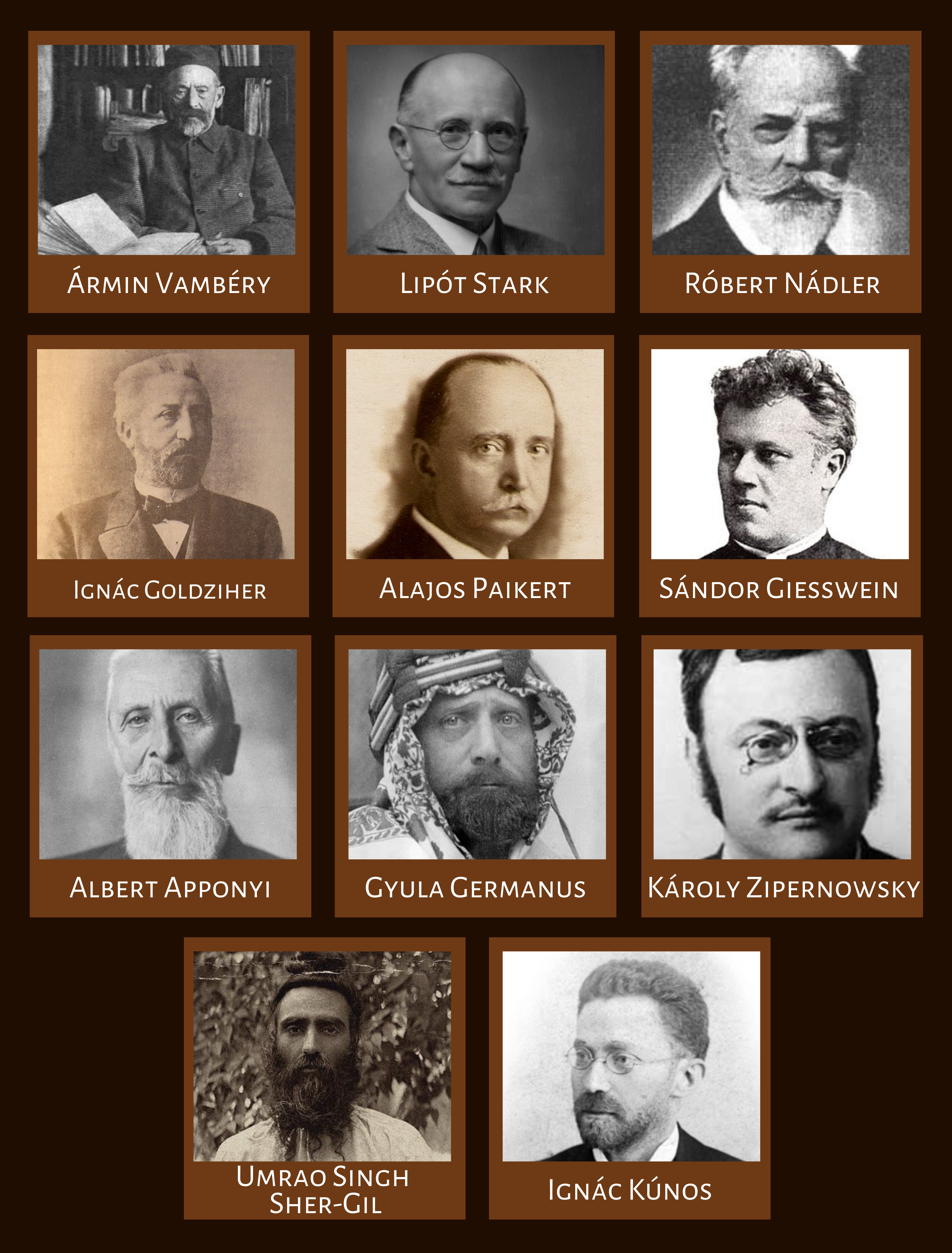
Professor Arminius Vámbéry, considered the first Hungarian Bahá'í, and one of the most erudite Orientalists of his time;
Lipót Stark,a brilliant scientist, mechanical engineer, engineering historian, founder and president of the National Association of Hungarian Electric Power Plants, and first CEO of the Electricity Company;
Dr Ignác Goldziher, a Jewish Hungarian scholar of Islam and Orientalist, considered on one of founders of modern Islamic studies in Europe;
Alajos Paikert, Hungarian agronomist, lawyer, museum director, founder of the Hungarian Turanian Society and former Austro-Hungarian Chargé d’Affaires in Washington DC for Agricultural affairs;
Sándor Giesswein, (often referred to as Prelate Alexander Giesswein) very well-known and respected Hungarian thinker and pacifist, Pontifical Prelate, Member of Parliament, President of the Hungarian National Esperanto Association (1911), President of the Hungarian Peace Association (1910);
Count Albert Apponyi, Hungarian politician, minister and landowner and aristocrat;
Gyula Germanus,Hungarian professor of Persian, Arabic and Turkish languages at the Oriental Institute of Budapest University, writer and Islamologist, member of the Hungarian Parliament and member of multiple Arabic academies of science, who made significant contributions to the study of the Arabic language, history of language and cultural history. He was a follower of the famous orientalist, Sir Ármin Vámbéry;
Károly Zipernowsky, an Austrian-born Hungarian electrical engineer. He invented the transformer with his colleagues (Miksa Déri and Ottó Bláthy) at the famous Hungarian manufacturing company Ganz Works and he contributed significantly with his works also to other AC technologies.
Professor Róbert Nádler,a well-known Hungarian artist, painter and teacher;
Umrao Singh Sher-Gil, a Sikh aristocrat and photographer from Lahore, where he married his second wife, Hungarian opera singer, Marie Antoinette Gottesmann Baktay;
Ignác Kúnos, a Hungarian linguist, turkologist, folklorist, a correspondent member of the Hungarian Academy of Sciences. At his time he was one of the most recognized scholars of the Turkish folk literature and Turkish dialectology and president of the Oriental Commercial University;
Personalities for which no photo was found (feel free to contact us if you find a photo/website for these individuals)
Karolina Stark, Lipót Stark's wife (no website or photo found);
Edward W. Moore, the manager of Mining Machinery of America (no website or photo found);
Professor Kovácsne, (no website or photo found);
Balogh Wilma, (no website or photo found);
Alexander Simoriyi, Editor of Pesti Hirlap, (no website or photo found);
Achmed Domet, (no website or photo found);
Eigel Efendi, Secretary of the Turkish Consulate (no website or photo found)
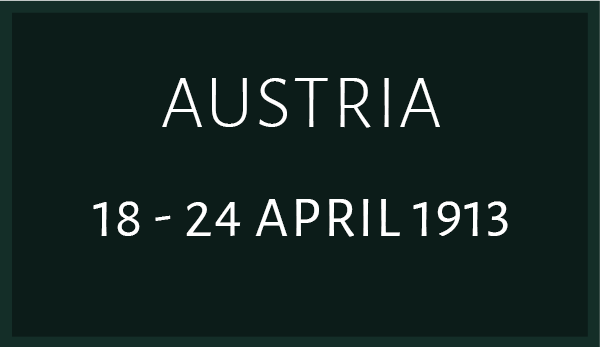
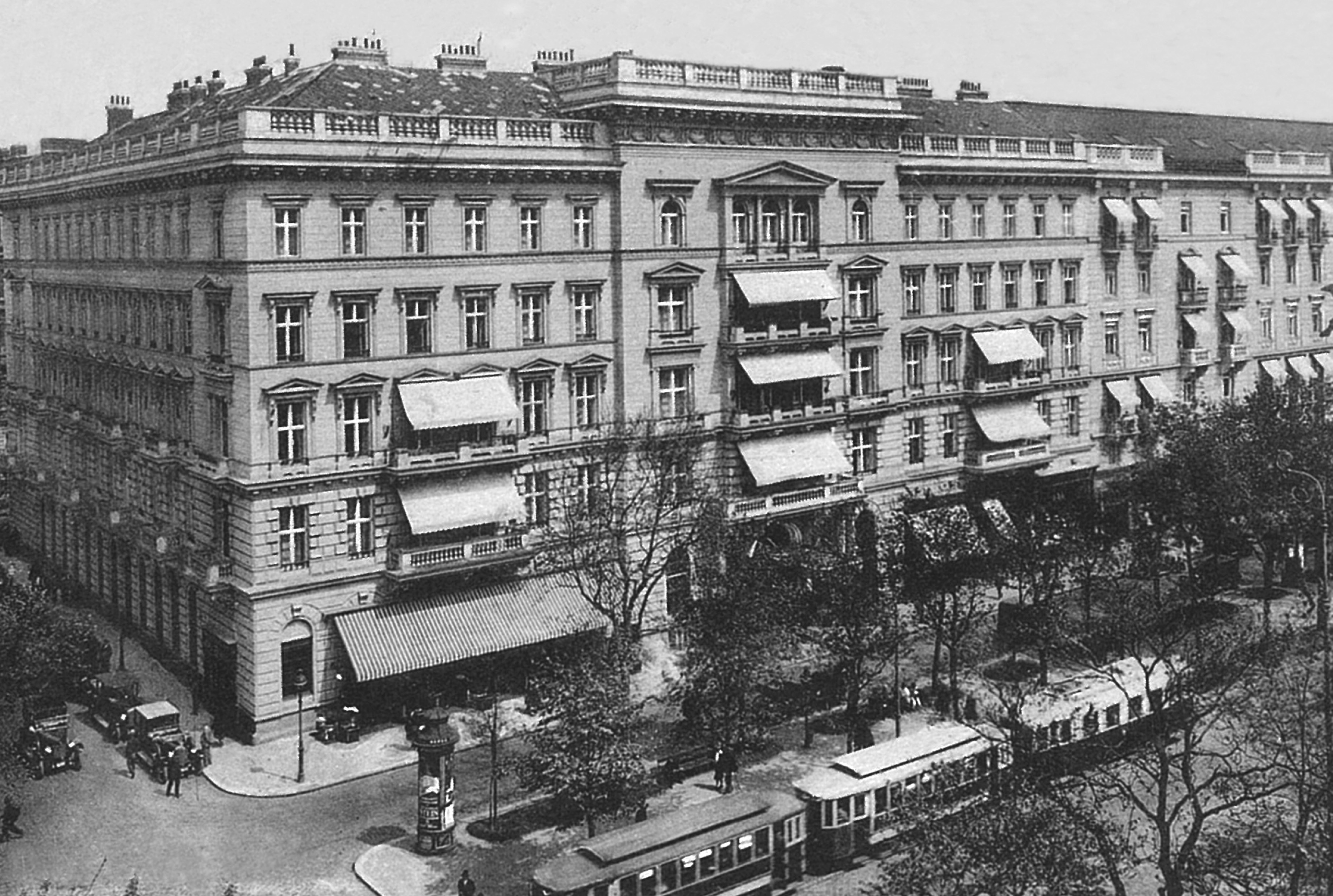
The Grand Hotel in Vienna, the best hotel of the city. Photograph from "140 years of the Grand Hotel Wien"
‘Abdu’l-Bahá’s and His party arrive in Vienna, Austria at 6:30 in the evening on April 18, 1913 and after a first, less-than-stellar hotel, they settle in for their stay at the excellent Grand Hotel. The next morning, on April 19, a very enthusiastic Theosophist, Mr. Cordes tells 'Abdu'l-Bahá he has heard of the Bahá'í Faith in India from a travel teacher and has come to Vienna to meet Him, with words that amount to a declaration of burning Faith:
I hope that as a result of my trip to Vienna, the light of guidance may shine, the eyes may receive a new sight, the hearts be gladdened and the spirits rejoiced. For the realization of this object, I have come to Vienna.
Ahmad Sohrab letter to Harriet Magee, 19 April 1913
'Abdu'l-Bahá visits the Ottoman ambassador, a man previously opposed to the Bahá'ís, and stays for lunch. Later in the day, Alexander Engelhardt sculpts 'Abdu'l-Bahá's face in clay in twenty minutes. After His second walk of the day, 'Abdu'l-Bahá and Mr. Cordes head to the Theosophical Society for 'Abdu'l-Bahá's first talk in Vienna, to 100 people.
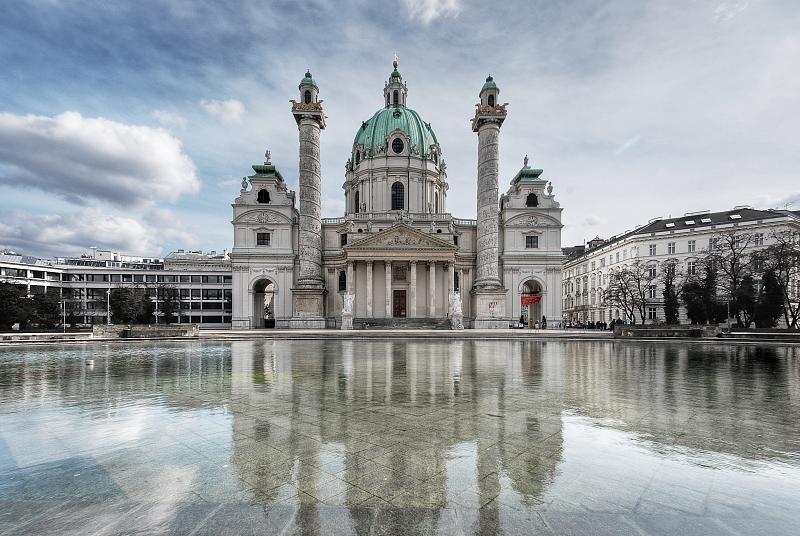
Speaking to Mr. Herrigel on April 20, 1913, 'Abdu'l-Bahá's speaks of the future of the city:
The City of Vienna will become a center for the Cause of God. Only after my departure the friends must not remain inactive. They must work with greater zeal and enthusiasm.
Ahmad Sohrab letter to Harriet Magee, 20 April 1913
'Abdu'l-Bahá, walking around Vienna, joins people entering a palatial-looking domed church, Karlskirche, or St. Charles' Church, widely considered the most outstanding Baroque church in Vienna, with an opulently-decorated interior. 'Abdu'l-Bahá walks around the church for about ten minutes and donates money before returning to the hotel and speaking to Theosophists. 'Abdu'l-Bahá calls on a Persian minister in the afternoon, then returns to visit the Ottoman Ambassador.
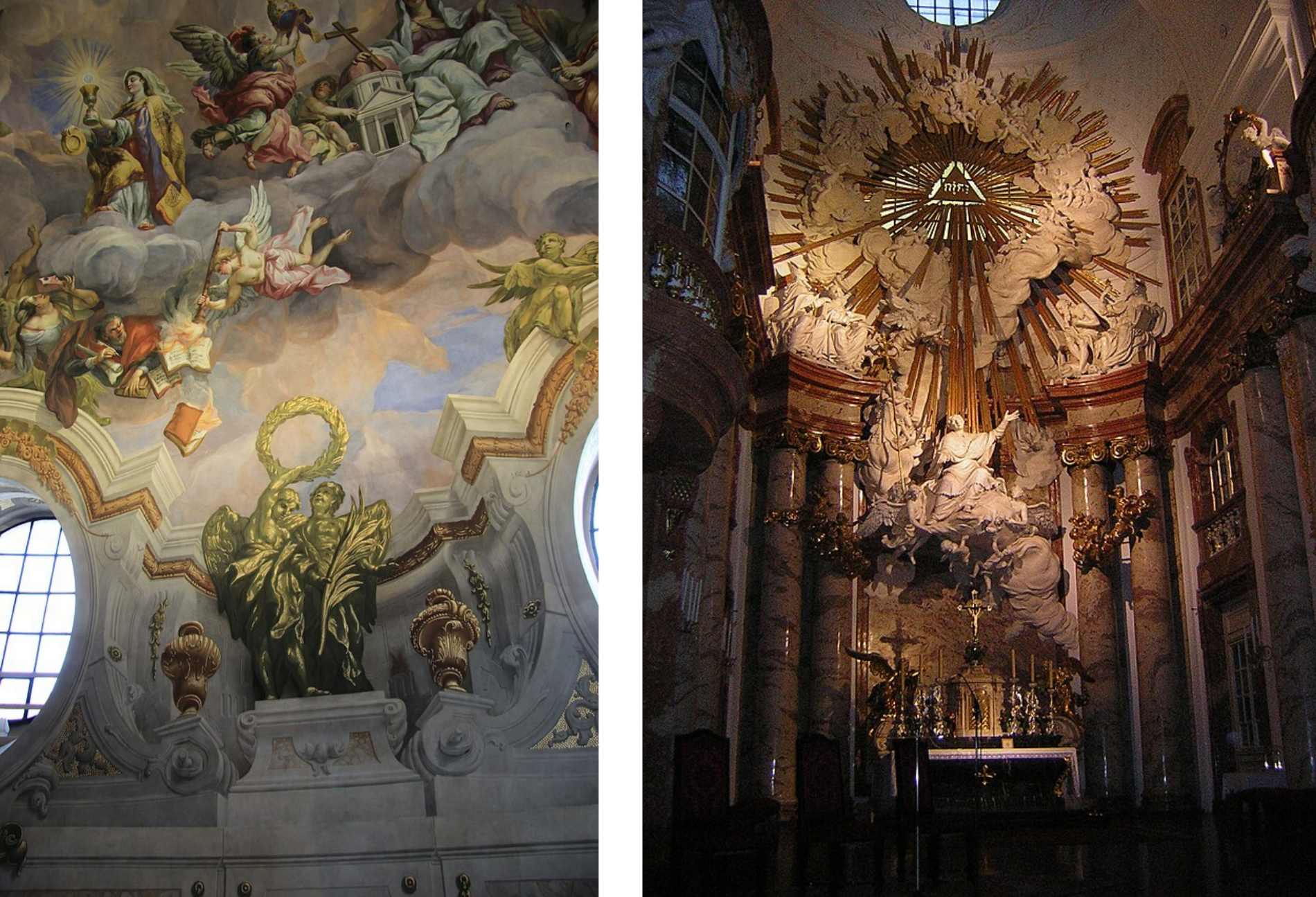
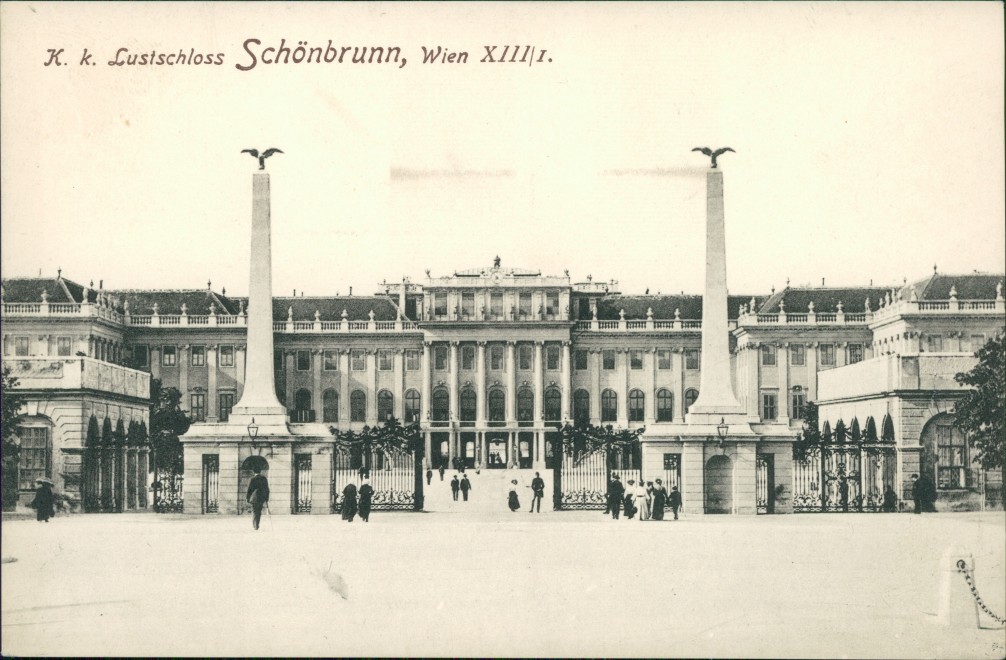
The Schönbrunn palace in Vienna, the Emperor's summer residence, which 'Abdu'l-Bahá sees on a drive, on April 21, 1913. Source.
After a morning spent receiving guests, answering correspondence and visiting with the Persian minister, 'Abdu'l-Bahá is taken for a drive in the afternoon and sees Schönbrunn Palace, the summer residence of the Emperor. At 7 in the evening, 'Abdu'l-Bahá climbs 120 steps to speak to at the Lodge of the Theosophical Society in front of an audience of 200, but 'Abdu'l-Bahá's cold is worsening, as His voice is hoarse at the end of the night, after speaking for two hours.
The next day, April 22, a reporter from Die Zeit comes to interview ‘Abdu’l-Bahá. When he asks where there are the most Bahá'ís, 'Abdu'l-Bahá answers "In Persia, although there are many of them in America." To the reporter's question as to whether the Bahá'í faith is a sect of Islam, 'Abdu'l-Bahá answers "This movement is neither a sect nor an Islamic denomination. It is the religion of love and brotherhood toward all humanity!" When the reporter asks where 'Abdu'l-Bahá comes from, the response is characteristically delightful: "I come now from Budapest. I have been in America where I have travelled through many large cities and spoke in many churches. After nearly 8 months, return from California to N.Y. I sailed for Liverpool. Then London, Bristol, Edinburgh, Paris, Stuttgart, Mergentheim, Budapest and now in your delightful city." You sense that 'Abdu'l-Bahá has finally touched the journalist who exclaims "You are wonderful to travel so much at this age!" to which, the Master, as is His wonderful habit, replies: "The power of God assists me."
Indeed only the power of God could assist 'Abdu'l-Bahá to accomplish such a feat as His travels to the West. It is impossible to overestimate the achievement of these years of constant teaching, promulgating, speaking and meeting.
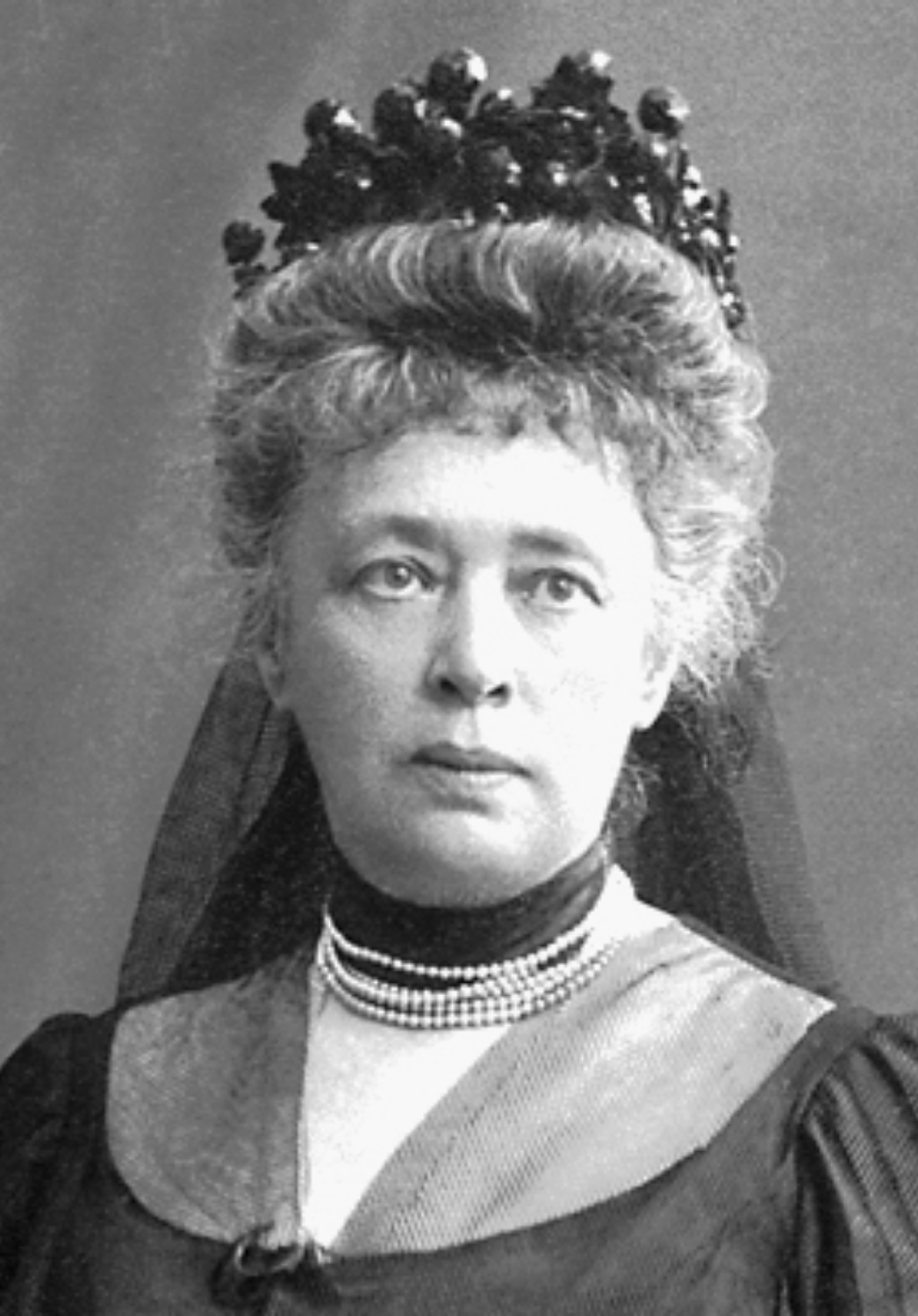
Baroness Bertha von Suttner is an Austrian-Bohemian pacifist and novelist. In 1905, she becomes the second female Nobel laureate (after Marie Curie in 1903), the first woman to be awarded the Nobel Peace Prize, and the first Austrian laureate. She meets 'Abdu'l-Bahá in Vienna on April 23, 1913. Wikimedia Commons.
In the morning of April 23, a crowd of people are waiting to speak to 'Abdu'l-Bahá. But notable among the visitors is Baroness Bertha Von Suttner, a tremendously impressive woman. Baroness Von Suttner is an Austrian pacifist, and is known for having written one of the nineteenth century's most influential books, the anti-war novel "Lay Down Your Arms" (1889). Arrangements have made in order for Baroness Von Suttner to visit ‘Abdu'l-Bahá at 3:30 in the afternoon, and before her arrival, the Master had sent her a large bouquet of roses, lilacs and lilies of the valley. A close friend of Albert Nobel's, Von Suttner becomes one of the leaders of the international peace movement, and founds the Austrian Peace Society in 1891. She stands out as a forceful leader at the male-dominated peace congresses and by the 1900s, she is referred to as the "generalissimo of the peace movement". For these efforts, she is awarded the Nobel Peace Prize in 1905, the very first woman Nobel Peace Prize laureate, and only the second female Nobel laureate in history after Marie Curie in 1903. As she enters the room, the Baroness expresses her sorrow over the tragic events of the past few months, and she sounds hopeless. ‘Abdu'l-Bahá immediately counters with a hopeful note and they start a back and forth dialogue on attaining International Peace:
(‘Abdu'l-Bahá) Ah, the day of Hope hath dawned! After every sorrow there is joy, after every night there is the glorious day. God willing through your efforts, we will succeed. I have heard much of your name and your unselfish service to the Cause of Peace. I testify that you are a lover of humanity.
(Baroness Von Suttner) I am very grateful for your words of encouragements and inspirations. I have done very little and with less results.
(‘Abdu'l-Bahá) You have sown the seeds and God shall cause them to grow.
(Baroness Von Suttner) I hope so.
(‘Abdu'l-Bahá)I have been looking forward to this visit. While I was in Chicago and Omaha you were there of the same time but it was not destined that we meet each other. I had to come to Austria to pay you a visit.
(Baroness Von Suttner) I was very sorry that I could not meet you in America for I have always heard of this Movement.
(‘Abdu'l-Bahá) Yes! One of the greatest teachings of Bahá'u'lláh is regarding international Peace. We must not lose our hope and courage. The beginning of a downpour of rain is only a few drops. In the early dawn, the Sun rises slowly, giving us here and there a few feeble rays but it is sure that before long it will be stationed in the meridian of its glory. Truly I say, the spirit of this age is universal Peace. In every age a great impelling idea has been born and developed. There has been an age of scholasticism, another age belonging to the development of philosophy and natural sciences. The lost age was the age of freedom and the march of democracy throughout many lands. But this 20th century is the century of the promotion of international Peace, the proclamation of the oneness of the world of humanity, the brotherhood of man, the union of religions, the solidarity of various nations and the universalization of all the great ideals, common to the children of man. All the people are the sheep and God is the real Shepherd of this flock and is kind to all. The earth is one sphere. This geographical boundaries are made by man, calling one piece of land Austria, another Germany, a third French, a fourth England and so forth. The days in Oriental cities instinctively divide the various quarters [pg 18] amongst themselves and if by chance one crosses the boundary of another, he will be attacked. But these boundary lines are all imaginary. They have no real existence.
After the Baroness leaves, 'Abdu'l-Bahá dictates more tablets, receives Karolina Stark who has arrived from Budapest, then immediately leaves to call on the Persian Ambassador for two hours and heads straight from the Persian Embassy to the Theosophical Society, but one senses 'Abdu'l-Bahá is getting physically tired, as, before the meeting starts, He asks for their indulgence to rest "for a minute or two."
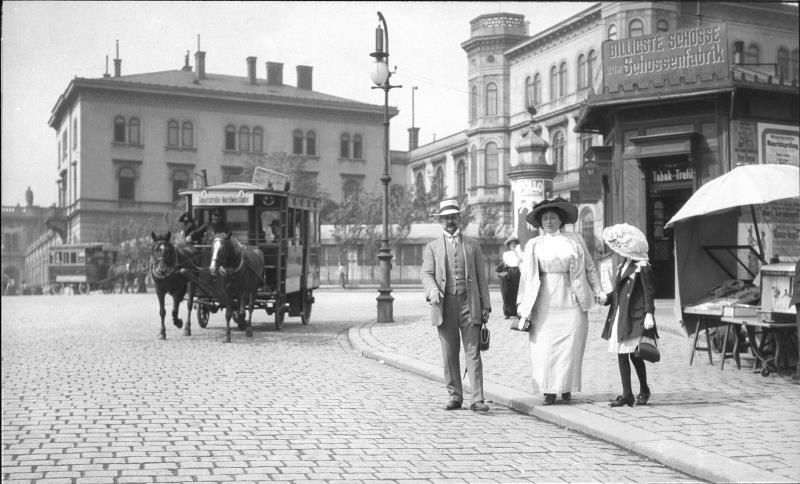
Vienna's Westbahnhof, western-bround train station in 1913. 'Abdu'l-Bahá arrived here on April 8 on the way to Budapest, and on April 24 on the way to Stuttgart. When arriving from Budapest, he would have arrived at Südbahnof, the southbound train station. Source.
The morning of His departure, as is His custom, 'Abdu'l-Bahá makes sure to thank the maids, and other hotel staff before heading to the station. A crowd of people have come to see Him off as His train leaves Vienna at 10 in the morning, bound for Stuttgart.
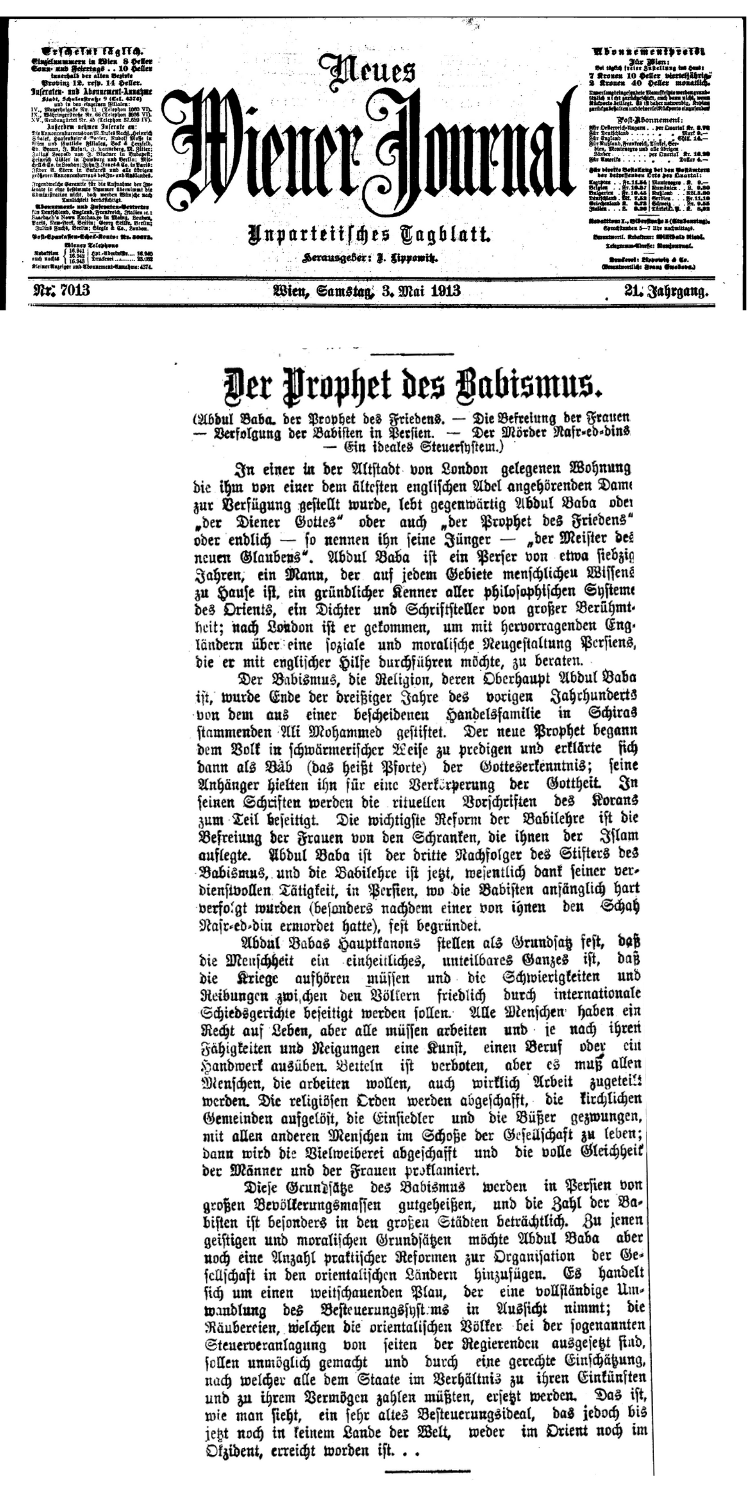
Neues Wiener Journal article courtesy of Amín Egea; translation courtesy of David Menham.
The New Vienna Journal - Impartial Daily Paper - Vienna Saturday 3rd of May 1913 - Publisher: S. Sippowitz - 21st Year
The Prophet of the Babis
Abdul Baha the Prophet of Peace. - The liberation of Women - Persecution of the Babis in Persia. Nasredin's Murderer - An ideal Tax System.
In an apartment in the old town of London, which was made available to him by a lady belonging to the oldest English nobility, currently lives Abdul Baha or the Servant of God, or also the Prophet of Peace, or finally, that's what his Disciples call him, the Master of the New Faith.
Abdul Baha is a Persian of about seventy; a man who is at home in every field of human knowledge, with a thorough knowledge of all the philosophical systems of the Orient, "is a poet and writer of great renown" ; he has come to London to discuss his social and moral restructuring of Persia with outstanding Englishmen which he would like to carry out with English help.
Babism, the religion of which Abdul Baha is the head, was founded at the end of the 1830s by Ali Mohammed, who came from a modest merchant family in Shiraz. The new prophet began to preach enthusiastically to the people and then declared himself to be the Bab (that is, the gate) of the knowledge of God; his followers considered him to be a manifestation of the Godhead.
Babi doctrine is the liberation of women from the barriers imposed by Islam. Abdul Baha is The third successor to the founder of Babism, and the Babi doctrine is now, largely thanks to his meritorious work, in Persia, where the Babis were initially severely persecuted (especially after one of them had murdered the Shah Nasr-ed-din), it has been firmly established.
Abdul Baha's main canons hold as the principle that humanity is a unified, indivisible whole, that wars should cease and that difficulties and friction between peoples should be peacefully resolved through arbitration tribunals - all human beings have a right to life, but everyone must work and - depending on your skills and inclinations, practice an art, a profession or a craft. Begging is forbidden, but “all people who want to work must really be assigned work." Religious orders abolished - church communities dissolved, hermits and penitents forced to live with all other people in the bosom of society; then polygamy will be abolished and full equality between men and women will be proclaimed.
These principles of Babism are endorsed by large masses of the Persian population, and the number of Babis is considerable, especially in the large cities. To these spiritual and moral principles, however, Abdul Baha would like to add a number of practical reforms to the organization of society in the oriental countries.
It is a far-sighted plan that envisages a complete transformation of the taxation regime; the robberies to which the oriental peoples are exposed to in the so-called tax assessment on the part of the rulers are to be made impossible and replaced by a fair appraisal, according to which everyone would have to pay the state in proportion to their income and property.
It is believed that this is a very old ideal of taxation, but it has not yet been achieved in any country in the world, neither in the Orient nor in the Occident. . .
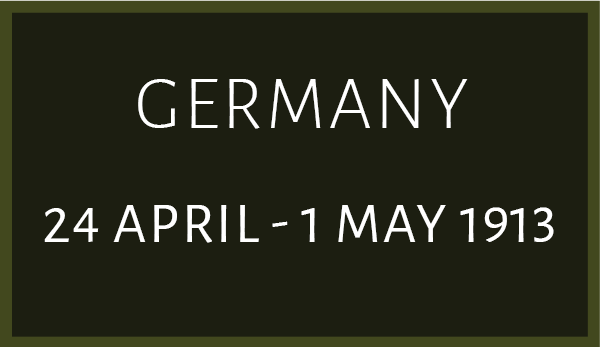
24 - 25 April 1913 - ESSLINGEN AND STUTTGART - Another surprise and second talk at the Bürger Museum
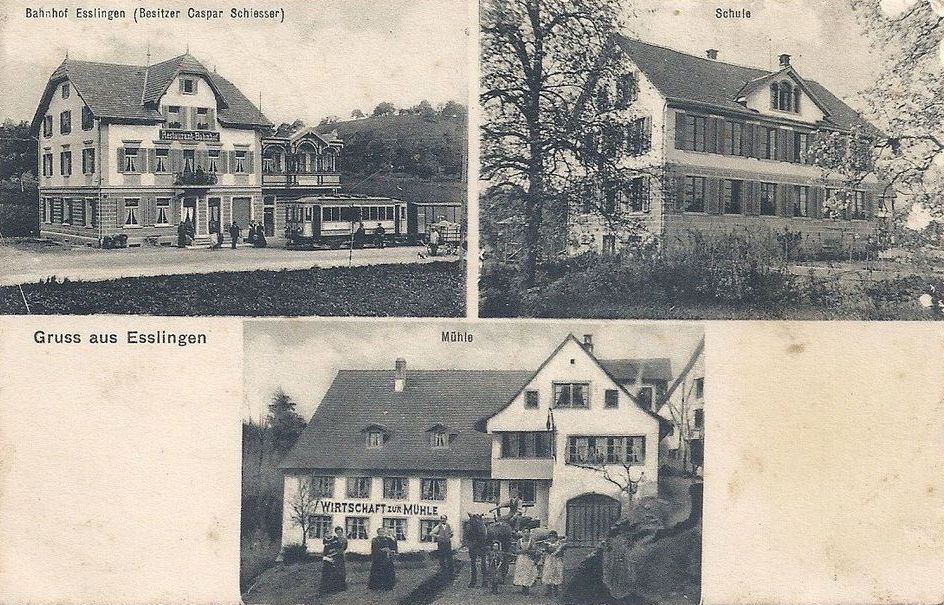
The Esslingen train station where the Bahá'ís surprised 'Abdu'l-Bahá on the way to and from Vienna is pictured in the top left. Source.
When 'Abdu'l-Bahá's train briefly stops in Esslingen at 2 in the morning, four Bahá'ís are there to surprise 'Abdu'l-Bahá! They board the train to accompany Him to Stuttgart, where a dozen Bahá'ís welcome the party. 'Abdu'l-Bahá settles in at the same Hotel Marquardt, but the cold He caught in Budapest is worsening, and in the morning of April 25, 'Abdu'l-Bahá has a cough, and it is difficult for Him to talk. 'Abdu'l-Bahá's health is so diminished that He even cancels the meeting planned for that night at the Bürger Museum, saying that it is "impossible" for Him to speak that evening. 'Abdu'l-Bahá is spent. Even with this cold He has had since Budapest, He climbed 120 steps twice in Vienna to speak to the Theosophists. When the Bahá'ís reach the Bürger Museum, however, they find a crowd of 1,500, the largest Bahá'í gathering ever held in Germany at that point. When they rush back to the hotel to inform 'Abdu'l-Bahá, after thinking for a moment, the Master agrees to give an address. His address touched the hearts of many, who, at the end, were weeping.
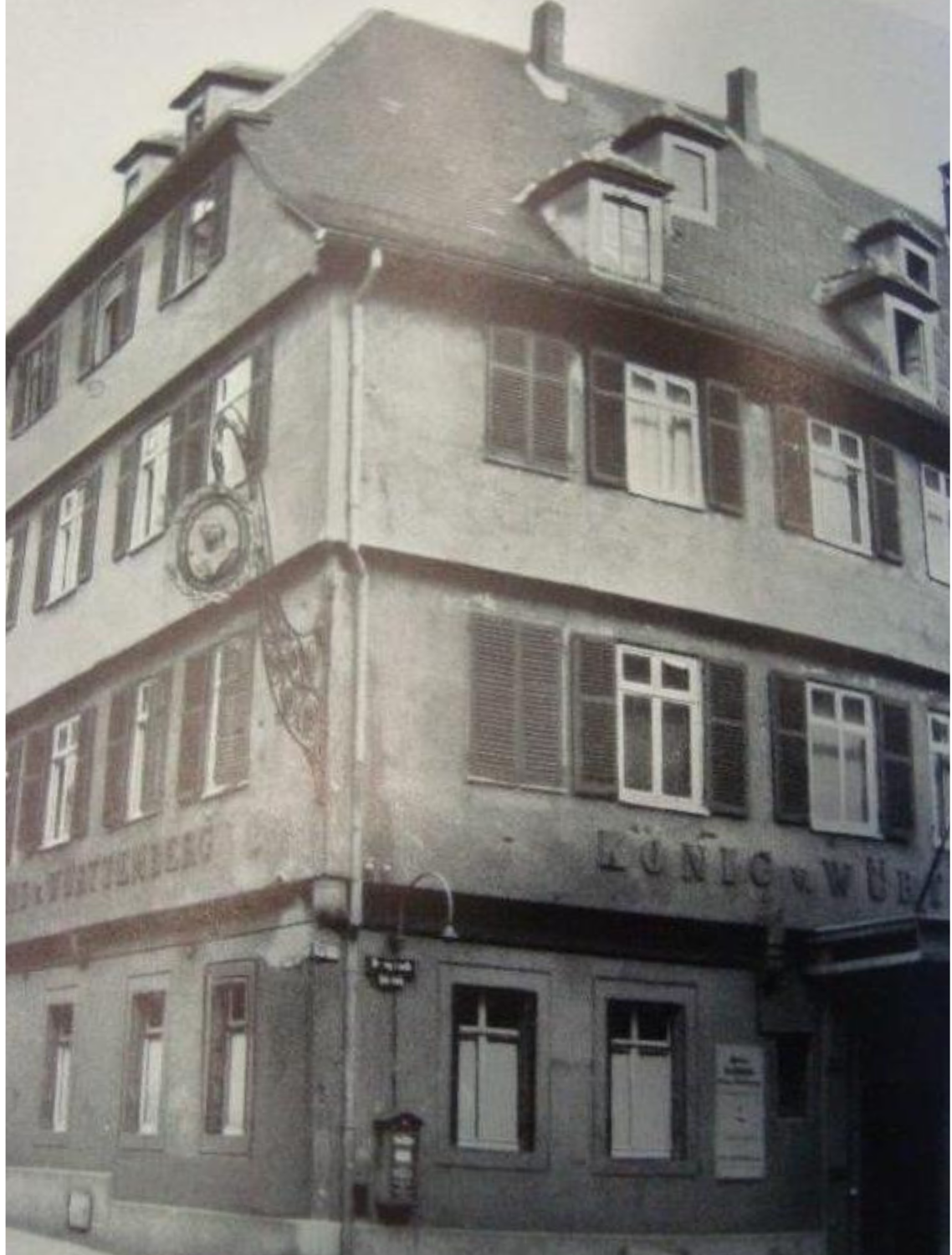
Outside of the Bürgermuseum, photograph courtesy of Alexander Meinhard.
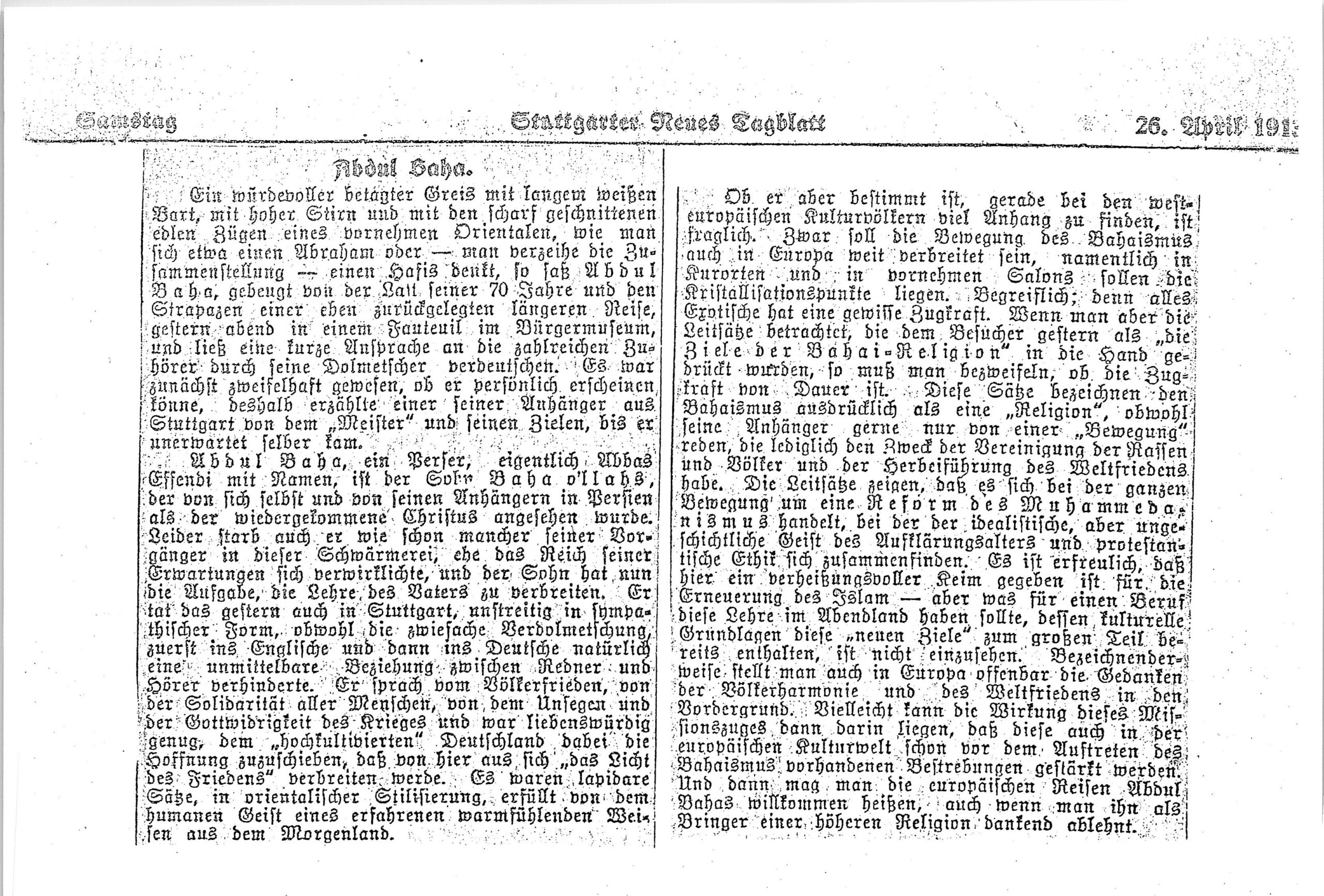
Newspaper article courtesy of Amín Egea.
On April 26, 1913, 'Abdu'l-Bahá is feeling slightly better. A newspaper article is published about His talk the previous evening, and He receives a large stream of visitors, and to one group He recounts in detail His very demanding responsibilities during the exile from Baghdád to Constantinople, fifty years ago.
The next day is marked by visits of children, one of whom, when asked to pray for 'Abdu'l-Bahá's health, says he doesn't want the Master's health to improve, because then He would go away! Visitors call on 'Abdu'l-Bahá all morning, then Albert Schwarz takes 'Abdu'l-Bahá for a drive to Royal Park. At four in the afternoon, prominent men and women from the Royal Court visit 'Abdu'l-Bahá. We have no names but only titles from Ahmad Sohrab's diary: Counts and Countesses, Barons and Baronesses and the Cabinet of the King, though we have names for none of the individuals present. At 5 in the afternoon, 'Abdu'l-Bahá heads to the Women's Club (Frauenclub), and addresses the Bahá'ís for their 19 Day Feast.
On April 28 and 29, 'Abdu'l-Bahá mostly rests, but still receives a few visitors.
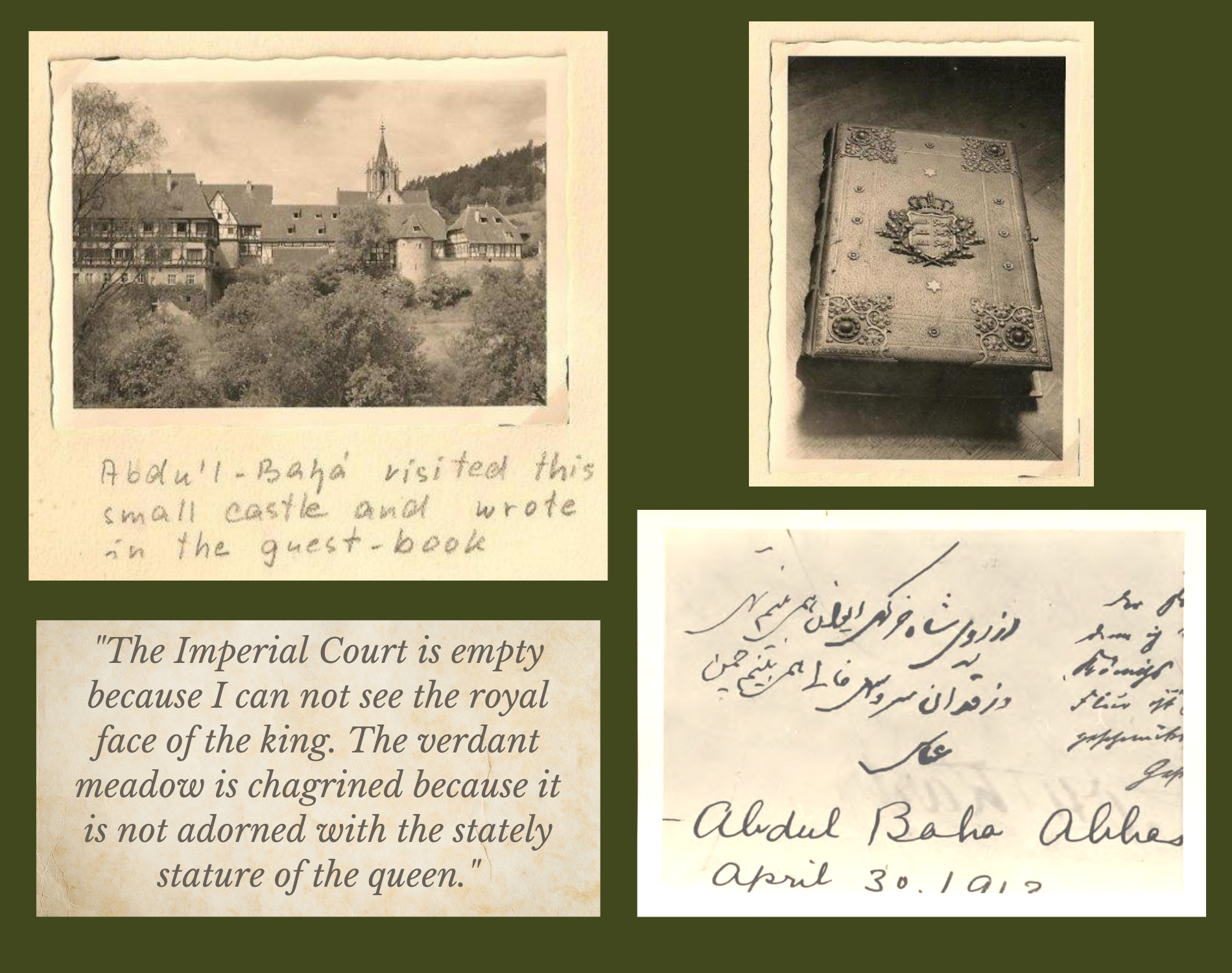
Collage from images provided courtesy of Alexander Meinhard.
On April 30, after a few days of rest, 'Abdu'l-Bahá is feeling better, and receives the usual numbers of visitors in the morning, giving a talk at 2 in the afternoon to a group of women on women's rights. Later in the day, 'Abdu'l-Bahá visits the village of Bebenhausen, about 40 kilometers south of Stuttgart, and visits the Abbey, Kloster Bebenhausen, a hunting lodge for the royal family. Albert Schwarz had made arrangements for the King, Kaiser Wilhelm II to meet 'Abdu'l-Bahá here, but when they arrive the King is not there. 'Abdu'l-Bahá leaves a witty note in the visitors' book playing on words, before visiting the rest of the castle and examining Napoleon’s chess set:
The Imperial Court is empty because I can not see the royal face of the king. The verdant meadow is chagrined because it is not adorned with the stately stature of the queen.
Ahmad Sohrab letters to Harriet Magee, 30 April 1913
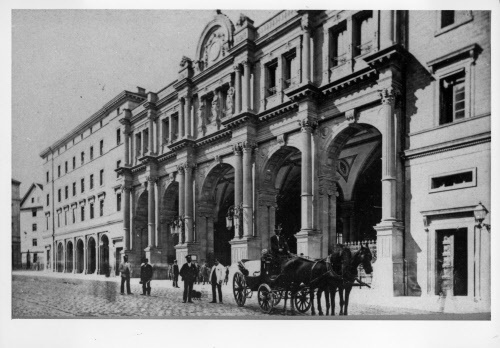
Stuttgart Train Station, date unknown. Source.
By May 1, 1913, 'Abdu'l-Bahá is well enough to travel. As per His habit, ‘Abdu'l-Bahá remembers all the service staff of the hotel, and tips them all before leaving. All morning, people have been arriving at the hotel to say goodbye, and by the time 'Abdu'l-Bahá leaves at 10:30 in the morning, there are about 200 people in the corridor. Those who bid Him farewell at the train station are so sorrowful, the other passengers are moved by the display of love and reverence. On this sea of love, 'Abdu'l-Bahá leaves Germany for France, His last stop before returning to Egypt and the Holy Land.
The photo-montage below is a collaboration with German Bahá'í historian Alexander Meinhard. It represents 17 Bahá'ís in Stuttgart and Esslingen who met ‘Abdu'l-Bahá during His visit to Germany in April 1913. These believers, among which is a Disciple of ‘Abdu'l-Bahá, Albert Schwarz, also happen to be those who received the majority of ‘Abdu'l-Bahá's Tablets addressed to German believers, and some of them who did not receive Tablets directly were often mentioned in Tablets to other friends, ‘Abdu'l-Bahá requesting that His greetings be passed along to them. Alexander Meinhard has so far been able to identify close to 300 such Tablets of the Master to German friends. To this date, based on the Tablets that have so far been found, Alma Knobloch received the most number of Tablets of any German Bahá'í. In a deeply touching last gesture, ‘Abdu'l-Bahá's very last Tablet before He passed away was written to the German Bahá'ís.


2 May 1913
Speaking to Edwin Scott on His first day back from Stuttgart, 'Abdu'l-Bahá says:
The believers of Stuttgart are blessed souls. They shall advance extraordinarily. I was very pleased with them.
Jan Jasion, "'Abdu'l-Bahá in France: 1911 & 1913", page 544
6 May 1913
While dictating Tablets to friends in Germany, including Wilhelm Herrigel, Albert "Consul" Schwarz, Anna Köstlin, and Alma Knobloch, Ahmad Sohrab shares 'Abdu'l-Bahá's words about the believers in Stuttgart:
Truly I say the believers of Stuttgart merit every Love! What blessed souls are they! What heavenly beings are they! Their faces were illumined and their hearts were pure!
Jan Jasion, "'Abdu'l-Bahá in France: 1911 & 1913", page 562
30 May 1913
Albert Schwarz and his wife Alice Schwarz-Solivo, who served on the Local Spiritual Assembly of Stuttgart arrive to visit 'Abdu'l-Bahá at the appointed time of six in the evening. 'Abdu'l-Bahá tells them:
I am most pleased to meet you again in Paris. My heart bears testimony to the fact that the Stuttgart Bahá'ís are most sincere. The days of Stuttgart and your hospitality shall never be forgotten. In reality the believers are united and agreed. The Cause shall progress greatly. Your children are always remembered by me. You have an excellent daughter, she is attracted and enkindled. She will become a great teacher in this Cause. Some souls are withered and others receive the fire of the Love of God immediately. During the few days of our stay in Stuttgart your daughter made marvelous spiritual progress.
Jan Jasion, "'Abdu'l-Bahá in France: 1911 & 1913", page 642
31 May 1913
Albert Schwarz and his wife Alice arrive to visit 'Abdu'l-Bahá with several believers. 'Abdu'l-Bahá introduces them with these words:
These are the hundred-petalled roses from the garden of Stuttgart. I hope that all of you will become the sweet fragrant roses of the Paradise of Abhá which are never withered.
Jan Jasion, "'Abdu'l-Bahá in France: 1911 & 1913", page 643
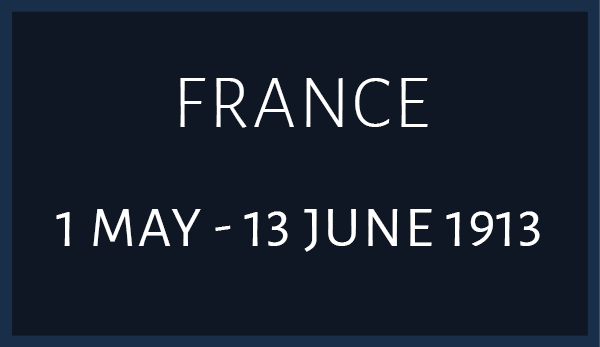
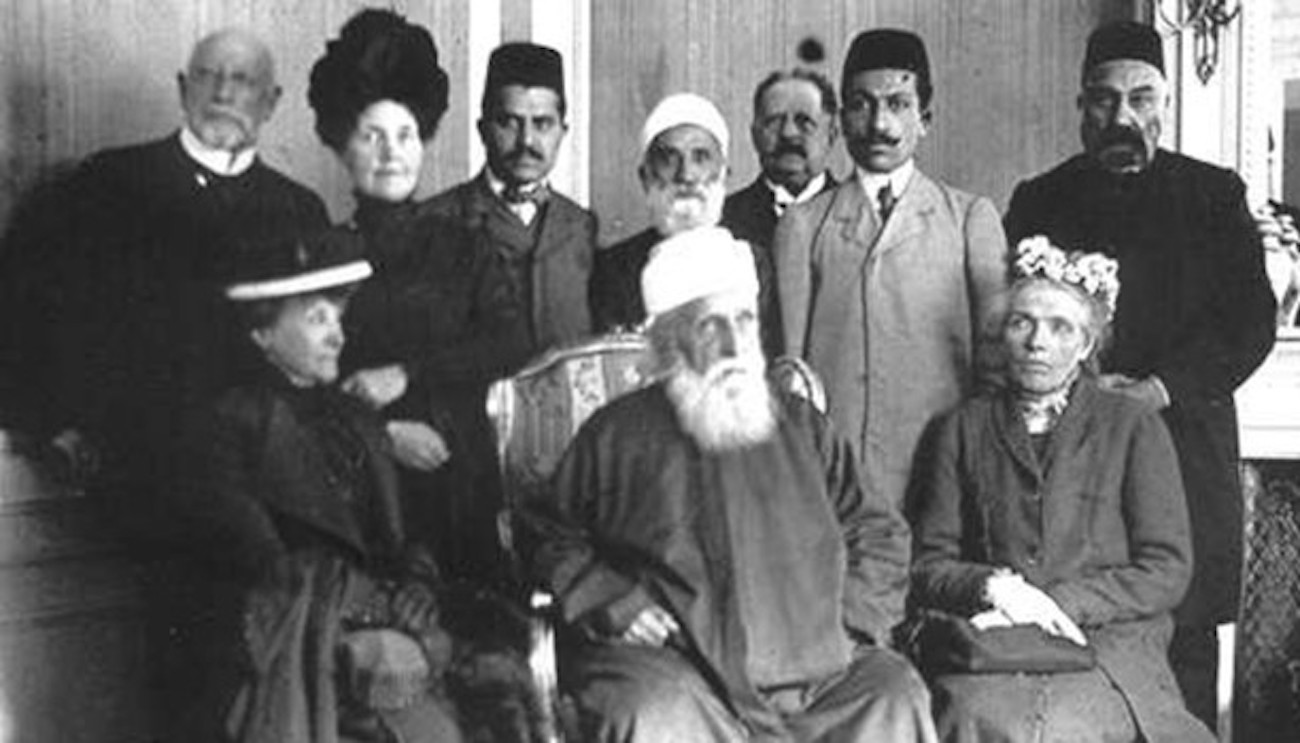
'Abdu'l-Bahá with a group of visitors at 4, avenue de Camoëns in 1911 (No similar photograph for 1913 was found). Bahá'ís of France.
Things change after 'Abdu'l-Bahá's return from Germany. The tone of the conversations is vastly different, and 'Abdu'l-Bahá seems pleased with the progress of the Faith, and gives concrete advice, specific reassurance and specific encouragement to individuals who have already arisen to act and render service to the Cause of God.
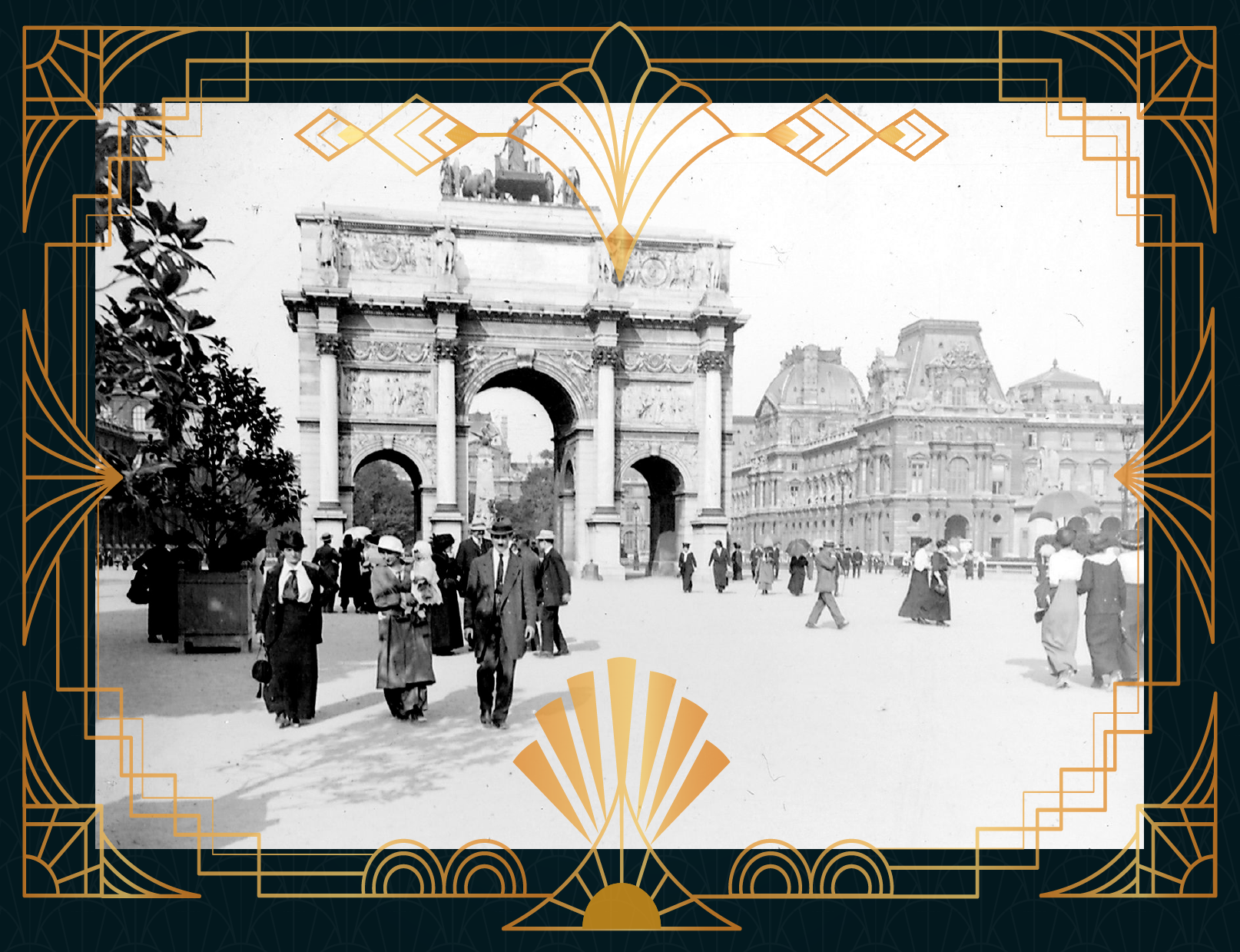
The Arc de Triomphe in Paris around 1913. Source: Wikimedia Commons.
On 4 May 1913, 'Abdu'l-Bahá addresses three groups of Bahá'ís that we know of, there may very well have been more, and first, to a few Bahá'ís at His Baltimore Hotel, the Master speaks about spiritual progress:
We have returned to Paris to see what the believers have been doing; whether the Fragrances of the Kingdom of Abhá have been spread. We have been travelling last month through Germany, Hungary and Austria and in each country we found souls, who were ready to hearken to the Call of the Kingdom. Many large meetings were held and addresses were delivered. A number of souls became informed and turned their faces toward the Kingdom of Abhá. During the last few days we were there, extraordinary progress was made by them.
Jan Jasion, 'Abdu'l-Bahá in France: 1911 & 1913, page 552
That same day to other Bahá'ís, still at His hotel, 'Abdu'l-Bahá uses the metaphore of seeds to refer to the community of interest and seekers around the Bahá'ís in Paris:
We have come here to Paris and are sowing the seeds. Can you arise and irrigate them? When the divine farmer ploughs the ground and scatters the seeds, his heart is attracted to it. Day and night, he is watching his field to see when the tiny seeds push out of the earth. Then he trains them, waters them till they grow, reach to the stage of fruition and his labours of many months is crowned at last with a rich harvest, but if he sees the field is barren, the seeds not germinating, and the hard work is wasted he feels sad and despondent. I desire you to become the ideal farmers and irrigate the trees of existence.
Jan Jasion, 'Abdu'l-Bahá in France: 1911 & 1913, pages 552-553
Still at the Baltimore hotel, 'Abdu'l-Bahá addresses Himself to a French Bahá'í who has been giving lectures:
I am most pleased with you, because thou art attracted to the Kingdom of Abhá and art uttering the words of God. Thou hast become an active soldier who is in the thick of the fight and art gaining victories for the King of Kings. The supreme Commander looks always with solicitude toward the battlefront, thinking of the protection of his courageous army, but the Reservists who stay behind in the barracks do not receive much of his attention until they also enter the field of action.
Jan Jasion, 'Abdu'l-Bahá in France: 1911 & 1913, page 553
If the Persian believers arise to teach the Cause of God in Paris it will be very good. At least they must try to teach other Persians. The believers of God must not remain silent. They must not be quiet. They must not be speechless. They must not be withered. They must not be lukewarm, They must have life, motion, spirit.
Jan Jasion, 'Abdu'l-Bahá in France: 1911 & 1913, page 559
You are the flowers of Paris and the cause of my happiness. All the inhabitants of this city are either thinking of industry or wealth or they are chasing after the worldly pleasures, except the few Bahá'ís who are thinking of God. In a very large impenetrable jungle, we have found a few fruit-bearing trees, therefore you are much loved. (...) Your meetings are very spiritual. They will progress in the future. Do not look at the present. The greatest meeting held during the day of Christ was the Lord's Supper. There were only twelve. The meeting was held in a very humble quarter with no table, no chairs and no rugs. They sat around a simple wooden board and spoke on the glad tidings of the Kingdom. Now consider the results of the one supper.
Jan Jasion, 'Abdu'l-Bahá in France: 1911 & 1913, page 569
God has created in Thee a great capacity. Thou must expend this capacity in the Cause of the Kingdom. If thou consecrate it to any other cause except the promotion of the virtues of the world of humanity, its results will be futile. If thou devote it to the spread of the Teachings of God and self-sacrifice in the path of God, thou shalt become like a bright candle.
Jan Jasion, 'Abdu'l-Bahá in France: 1911 & 1913, page 573
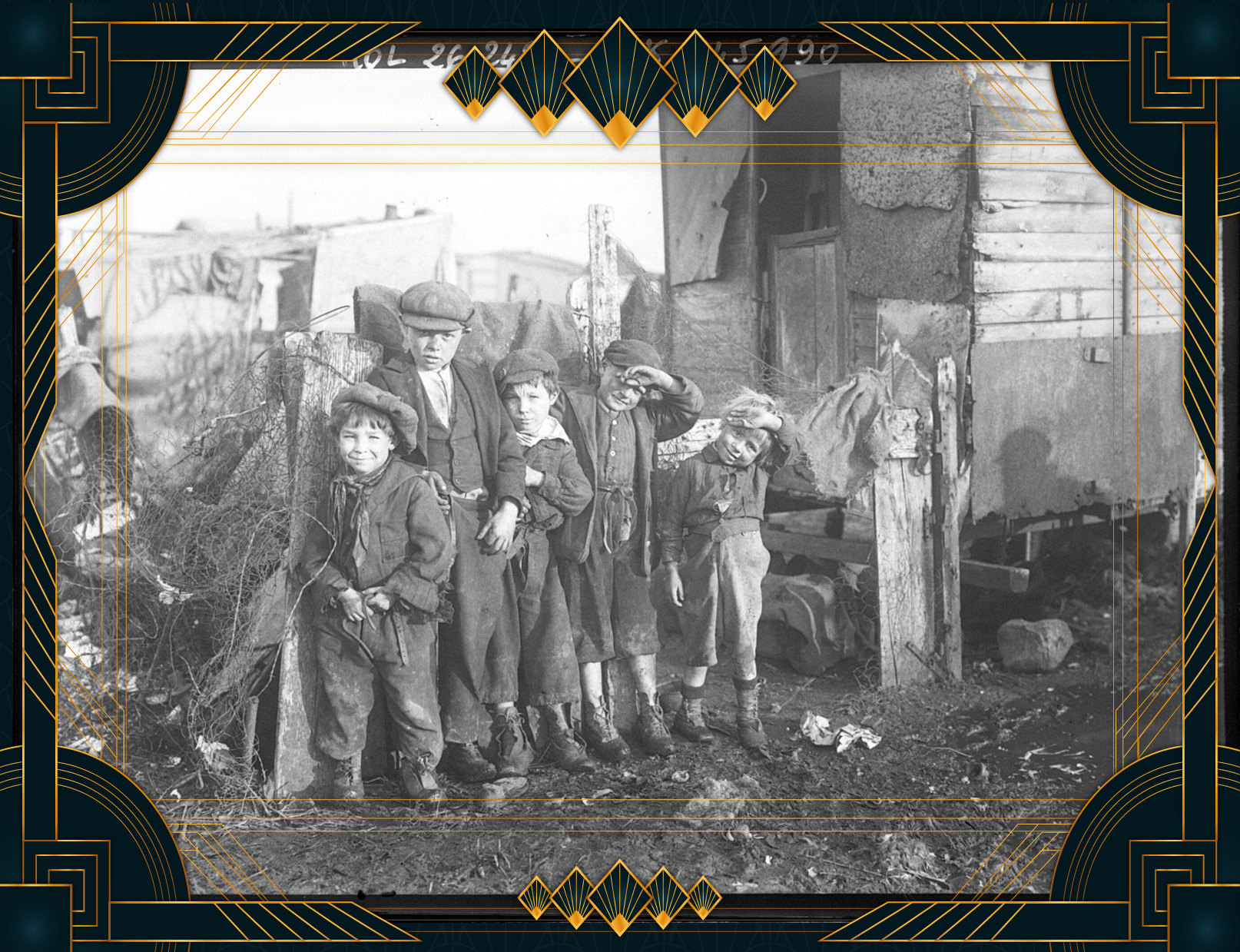
Poor children of Ivry, near Paris, 1913. Source: Wikimedia Commons.
The meetings of the friends are like unto the delightful rose-garden in which you find variegated flowers adding to each other's charm. It is evident that when the intellectual forces of minds are joined with one another, the result will be correspondingly better. Likewise, the spirits of men do reinforce and strengthen each other. If man does not receive spiritual assistance from others, his spirit will become weakened. The believers of God must reinforce each other's spirits, sacrifice their lives in the path of each other, [that] through their mutual assistance, the utmost of unity be attained. The sheep of one flock must gather together and do not let anything cause dispersion amongst them.
Jan Jasion, 'Abdu'l-Bahá in France: 1911 & 1913, page 573
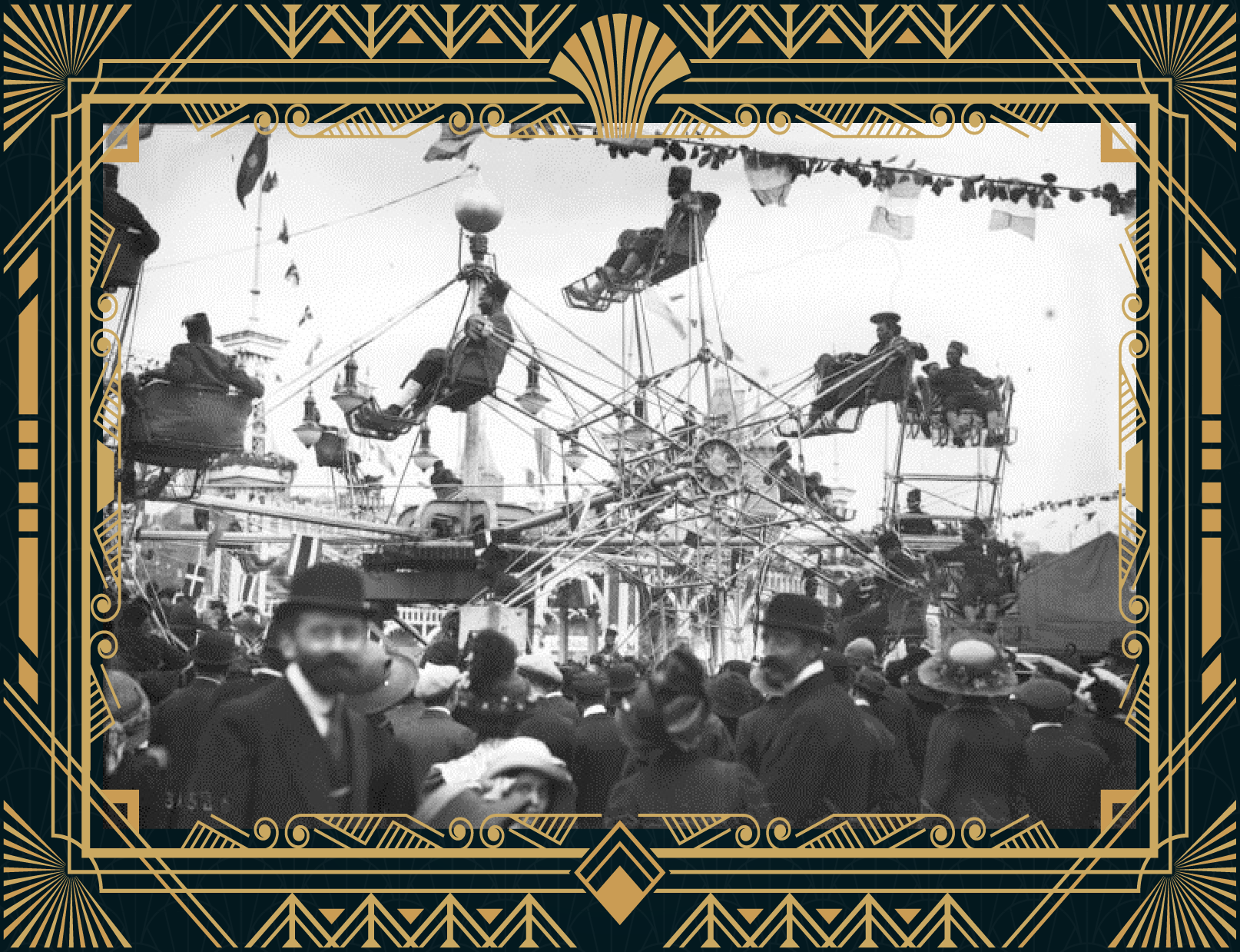
Magic City, Paris, 1913. Source: Wikimedia Commons.
Unfortunately for us, there is no written record of this conversation, but 'Abdu'l-Bahá receives Alice Beede and a French friend of hers, and advises them on how to speak to atheists and religious-minded people.
Jan Jasion, 'Abdu'l-Bahá in France: 1911 & 1913, page 576
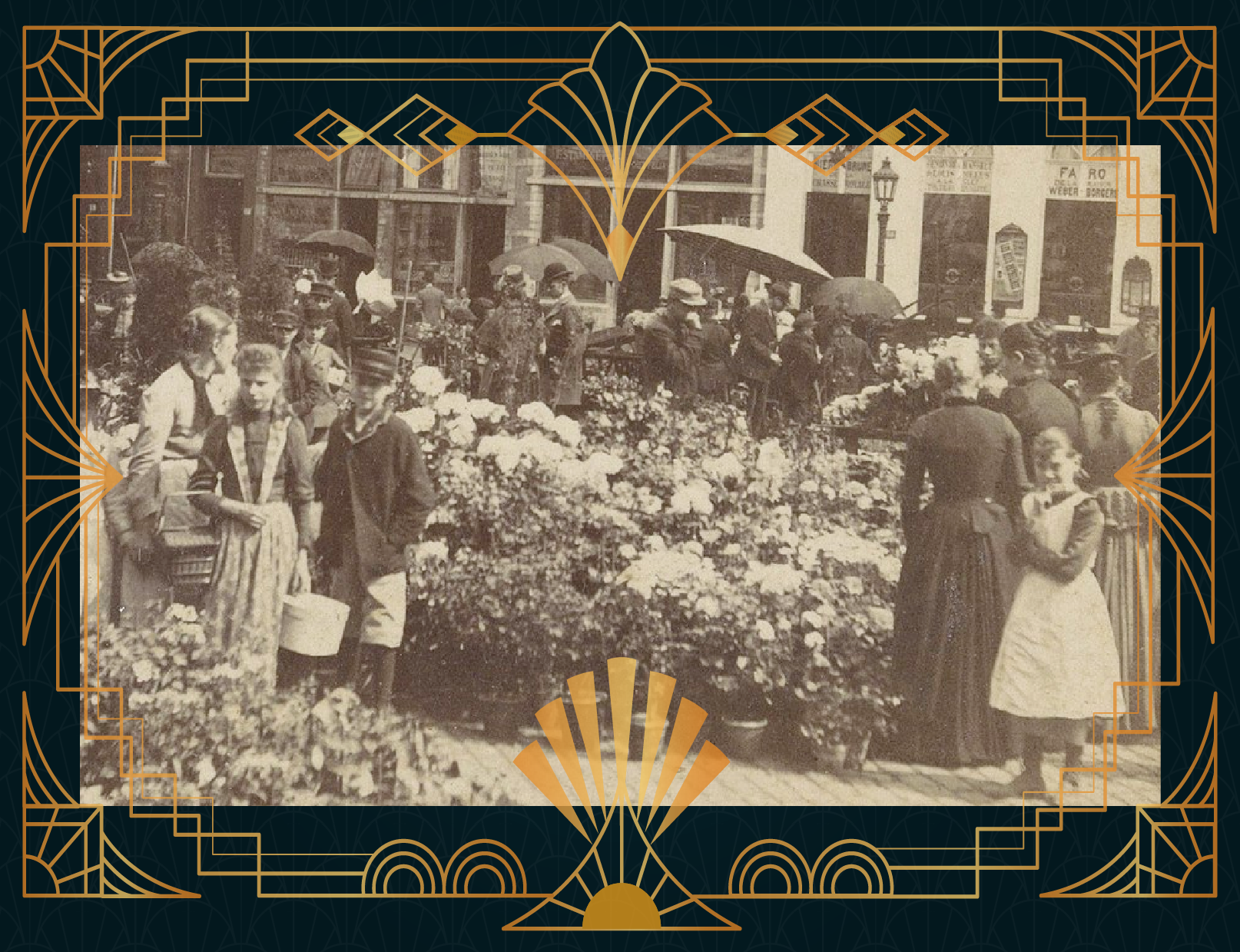
Flower market in Paris. Source: Wikimedia Commons.
I am pleased with your meeting. I love those souls who are attracted and enkindled. As you are in this state, my heart is attracted to you. You must become like unto the flowers of fire. You must become as burning torches. You must teach the Truth. the more you are enkindled, the more you are set aglow with the fire of the Love of God, the more your holiness and sanctification, the lighter my load will it become. I have sown only one seed in Paris. Now you must irrigate it till it becomes a great harvest. You must be good farmers, spiritual, scientific farmers.
Jan Jasion, 'Abdu'l-Bahá in France: 1911 & 1913, page 582
What I admire in you is your firmness in the Cause! Although you have had many things to discourage you, yet through them all you have weathered the worst storms. I love people who are firm in any cause, whether material or spiritual. Bravo! Bravo! that you have stood like a soldier in your post!
Jan Jasion, 'Abdu'l-Bahá in France: 1911 & 1913, page 591
The present indifference shall be replaced by a great enthusiasm; the call of Abhá shall be raised from every house and the banner of Ya Bahá'u'l-Abhá shall become unfurled from the top of every home. Rest ye assured of this.
Jan Jasion, 'Abdu'l-Bahá in France: 1911 & 1913, page 594
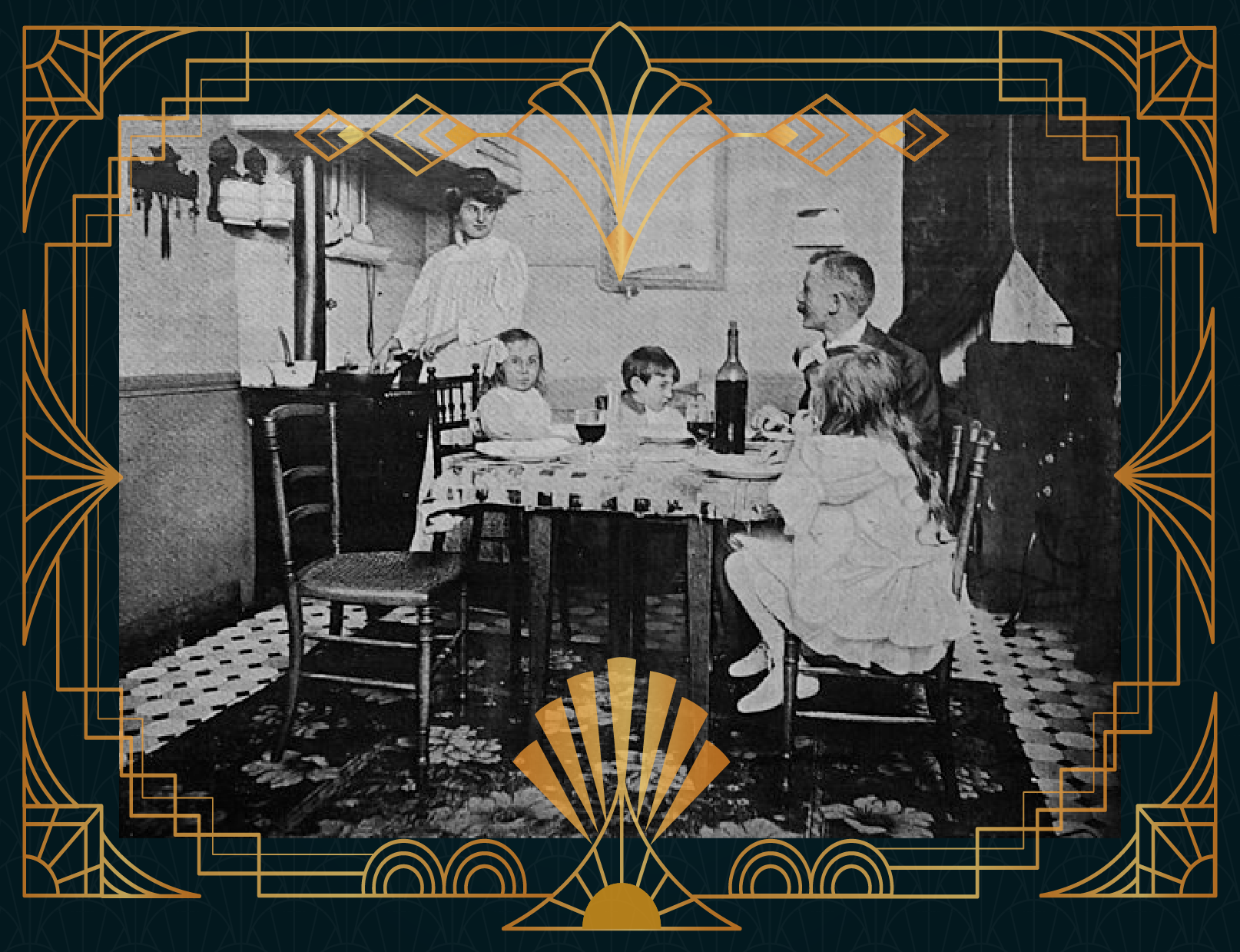
A modest family kitchen in Paris in 1912. Source: Wikimedia Commons.
Day and night strive and teach. Do ye not rest for one moment. Organize meetings. Deliver speeches in the gatherings. Speak with eloquence and fluency of tongue. Proclaim: 'O ye French people! How long are you asleep upon the couch of ease! How long do you prefer unbelief to belief! How long are ye inadvertent?
Jan Jasion, 'Abdu'l-Bahá in France: 1911 & 1913, page 595
I love the believers of Paris, not the walls and the houses. (...) One must become the embodiment of divine love. This is the greatest fortress. Praise be to God that our relation is purely spiritual. Consider how the Love of God has united us together. We are associating with each other in the utmost of unity and love. Outwardly I am leaving Paris but my spirit will always be with you. After me, you organize meetings, speak in the gatherings, be always full of joy and beatitude, so that day unto day you may become more spiritual, more radiant, more heavenly. Your duty is to serve the world of humanity through every channel, through every means. This is my hope for you.
Jan Jasion, 'Abdu'l-Bahá in France: 1911 & 1913, page 657
This is Part II of 'Abdu'l-Bahá's herculean efforts in meeting, befriending, counseling Persian and Ottoman diplomats, politicians, generals, ministers, and notables in Paris in 1913.
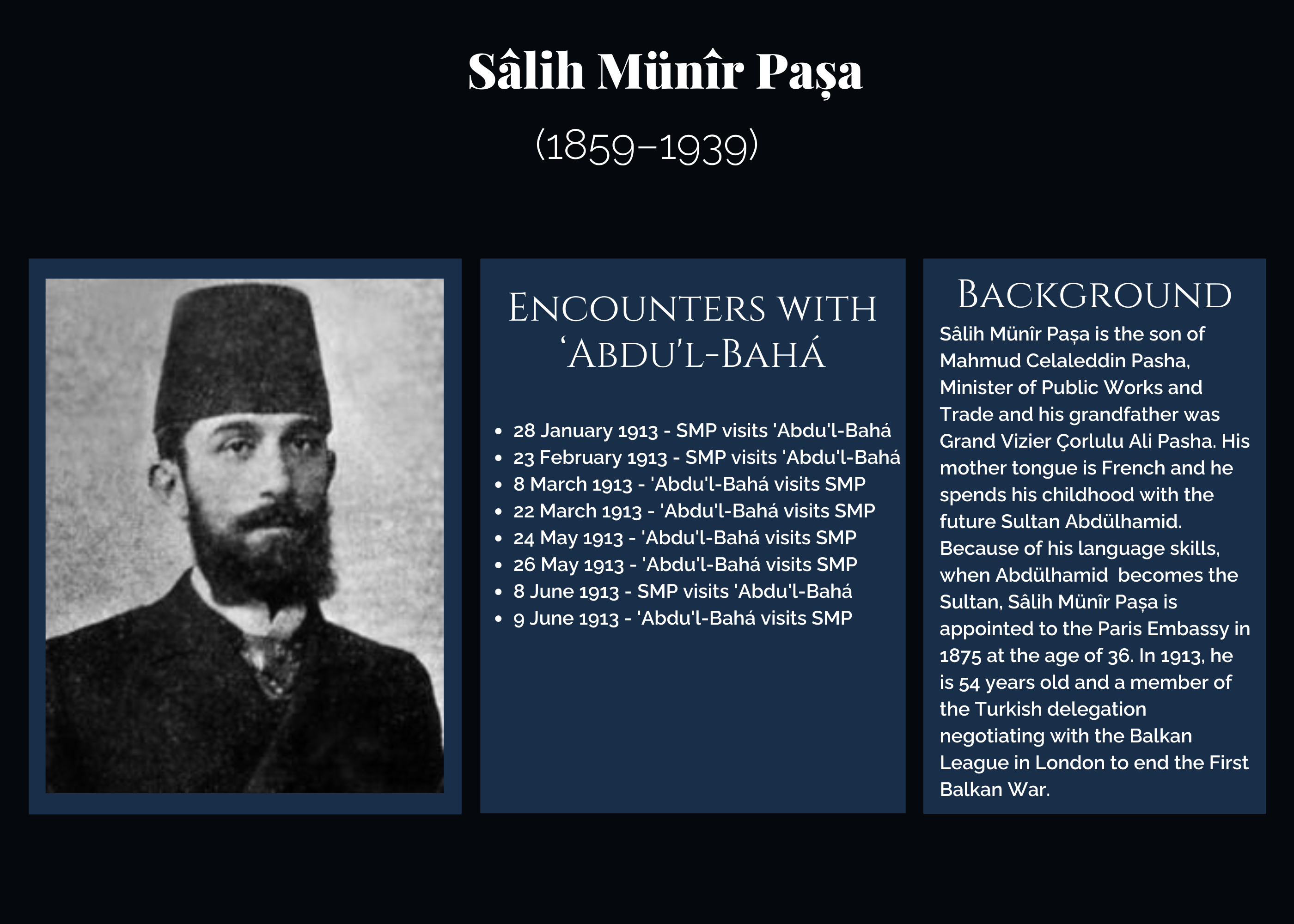
May 1913
2 May 1913: On His first day back from Germany, 'Abdu'l-Bahá is speaking to Edwin Scott when He makes a powerful statement of the Bahá'í Faith's reversal of fortunes, which is the theme of this two-part section:
Today the Cause is being spread all over the world. The severe critics have become enthusiastic admirers. The scoffers of yesterday are praising the Cause today. Those who in former time went up on the pulpit and upbraided the Bahá'ís today lauding them to the sky. Those who were against it are for it. This change has come over the Bahá'í world through the Confirmations of God! May we all appreciate it and hold fast to the Cause!
Jan Jasion, "'Abdu'l-Bahá in France: 1911 & 1913" page 544
8 May 1913: Ahmet Pașa, the exiled Ottoman general, calls on 'Abdu'l-Bahá and they talk for over an hour. After so often seeing this Ottoman notable, we find out that Ahmet Pașa's father had been a great admirer of Bahá'u'lláh during the time the Blessed Beauty lived in Adrianople (Edirne). During this visit, 'Abdu'l-Bahá gives Ahmet Pașa one of His photographs, along with the April issue of the Asiatic Quarterly Review featuring 'Abdu'l-Bahá's' address "On the Importance of Divine Civilization" at the Mosque in Woking, England on January 17, 1913.
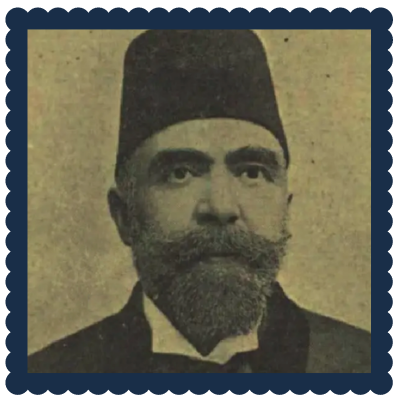
Reșid Mumtaz Pașa. Source: Academia.edu. Photo provided by Frédéric Autret.
10 May 1913: 'Abdu'l-Bahá calls on Reșid Mumtaz Pașa, the former Governor of Beirut. They speak together for a long time on the powderkeg situation in Turkey, and 'Abdu'l-Bahá shares with Reșid Mumtaz Pașa what it was like traveling to California and meeting the Bahá'ís there.
12 May 1913: Reșid Mumtaz Pașa calls on 'Abdu'l-Bahá in the afternoon. Sometime after five in the afternoon, 'Abdu'l-Bahá and some friends call on the Persian ambassador, ‘Abdu’ṣ-Ṣamad Khán, the Mumtázu’s-Saltaníh and the conversation covers a wide range of topics.
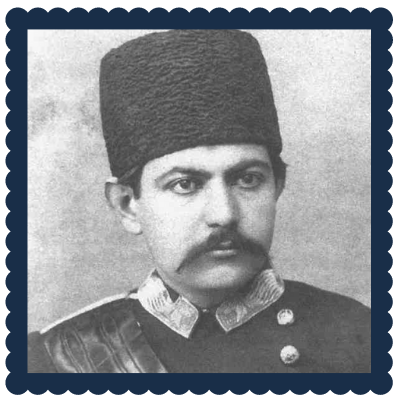
Mír Siyyid Muḥammad (the Intiẓámu’s-Salṭanih)
13 May 1913: ‘Abdu’ṣ-Ṣamad Khán, the Mumtázu’s-Saltaníh returns 'Abdu'l-Bahá's favor and calls on the Master at His hotel the day after being visited in his home. He speaks for an hour with 'Abdu'l-Bahá.
14 May 1913: Mír Siyyid Muḥammad, the Intiẓámu’s-Salṭanih, calls on 'Abdu'l-Bahá with another Bahá'í and, together with 'Abdu'l-Bahá they go on a long drive through the Bois de Boulogne, later going on a long walk.
20 May 1913: Mír Siyyid Muḥammad, the Intiẓámu’s-Salṭanih, the Persian Bahá'í nobleman, goes for a walk with 'Abdu'l-Bahá.
22 May 1913: 'Abdu'l-Bahá calls on S.S., a Persian nobleman to whom Ahmad Sohrab refers to only by his initials. Jan Jasion's research tells us that this individual is most certainly Ṣamṣámu’s-Salṭanih (Sword of the Kingdom), aka Najaf-Qulí Khán). Najaf-Qulí Khán has such a high regard for 'Abdu'l-Bahá that he has rented the flat the Master occupied during His 1911 visit to France, namely at 4, avenue de Camoëns, for his own use during his visit. Their interaction is profound. Balyuzi describes how overwhelmed the man is to meet 'Abdu'l-Bahá and how he bows the Master. He describes to 'Abdu'l-Bahá how his hostility to the Bahá'í Faith instantly vanished in London after an encounter with an English lady who had the Greatest Name inscribed on her ring. His ignorance at not having recognized the Greatest Name, combined with his joy at seeing Persian influence operate in such high circles in London had changed his heart. He tells 'Abdu'l-Bahá: "I was most pleased and very proud to know that there is one Persian who has come to the west and is the cause of the glory of Persia, and had such lofty thoughts and exalted ideas as to stir the western world." The conversation continues, about the progress of the Faith in America and other topics, and can be found in "'Abdu'l-Bahá in France: 1911-1913" pages 623-624. Later this same afternoon, a Persian prince by the initials N.S. calls on 'Abdu'l-Bahá to report on the recent troubles in Persian against the Bahá'ís.
24 May 1913: 'Abdu'l-Bahá walks to Sâlih Münîr Pașa, the member of the Turkish delegation, to pay him a visit but he is not in, so the Master rests for an hour in the concierge lodge before returning home by carriage past eight in the evening. He returns to find three important Persians waiting for Him and speaks with them for hours about the station of Muḥammad and the legitimacy of Islam. The men leave close to midnight.
26 May 1913: 'Abdu'l-Bahá obtains Ahmet Pașa, the exiled Ottoman general's address and goes alone to visit him. Upon returning, He says: "I spoke much with Ahmad Pasha today. I hope God will create the effect." Later this same day, after tending to other matters and visiting a sick friend, 'Abdu'l-Bahá calls on Sâlih Münîr Pașa and remains at his home, talking with his wife and guests until eleven in the evening. A thoughtful host, Sâlih Münîr Pașa had prepared and sent ahead a dinner for 'Abdu'l-Bahá which the Master shares with His companions when He arrives home.
27 May 1913: Ahmet Pașa visits 'Abdu'l-Bahá, and together they leave the hotel and walk to a store next-door where they speak at length in Turkish.
28 May 1913: Samipașazade Sezaî, the Ottoman ambassador to Spain calls in briefly to meet 'Abdu'l-Bahá. He is a Turkish educator, politician, diplomat and writer, and one of the leading lights of the Turkish Romantic period.
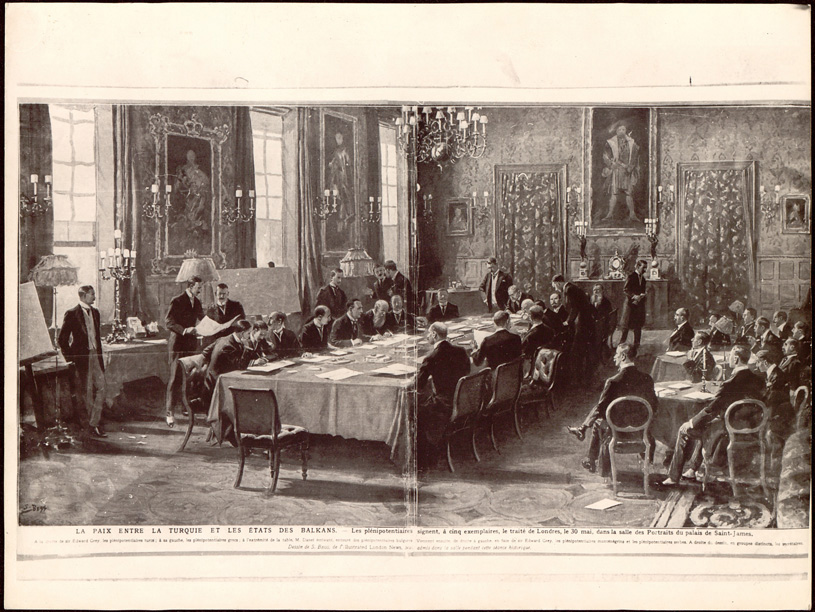
The signing of the Peace Treaty at the London Peace Conference on 30 May 1913. Wikimedia Commons.
30 May 1913: The Treaty of London is signed, officially putting an end to the First Balkan War. A number of the notables who have been visiting 'Abdu'l-Bahá since January 1913 have participated in the conference which has led to the signing of the Treaty.
31 May 1913: H. H. Prince Muḥammad ‘Ali Bey, the brother of Abbas II, the Khedive of Egypt and two other important Egyptians come to pay a visit to 'Abdu'l-Bahá. The Master and Prince Muḥammad ‘Ali Bey met last year in New York City. 'Abdu'l-Bahá takes His three guests to a private room and they have a long conversation.

June 1913
1 June 1913: 'Abdu'l-Bahá pays Prince Muḥammad ‘Ali Bey a visit at around three in the afternoon, at the Hôtel Impérial. The Prince and 'Abdu'l-Bahá speak in Arabic on a range of topics including the Master's December 31, 1912 address at Manchester College in Oxford. Leaving the Prince, 'Abdu'l-Bahá takes a taxi and pays a visit to Samipașazade Sezaî, the Ottoman ambassador to Spain. 'Abdu'l-Bahá knew Samipașazade Sezaî's father from the time of Bahá'u'lláh's exile to Constantinople (Istanbul) and they speak together in Turkish about the current situation in the Ottoman empire. In the evening, 'Abdu'l-Bahá sends Ahmad Sohrab to call on Abu’l-Qásim Khán (Náṣiru’l-Mulk, the Champion of the State), the Regent of Persia (Sardár-i-Manṣúr).
2 June 1913: A new Persian notable comes to meet 'Abdu'l-Bahá. This is Sardár-i-Ẓafar (the Commander of Victory), Ḥájí Khusraw Khán a Persian politician and former Governor of Iṣfahán. According to Jan Jasion, this is most likely the Persian Mr. Balyuzi is referring to when he describes a Persian not having hitherto visited 'Abdu'l-Bahá, "amazed to find so many of his prominent compatriots there. No better proof of the powers of 'Abdu'l-Bahá was needed, he said. Many of these notable men had once been bitter opponents of the Faith of Bahá'u'lláh, assailing and its followers, wherever and whenever they could; and now, in the French capital, they were rendering homage to the Head of the Faith." Shortly after this, Masʻúd Mírzá, the Ẓillu’s-Sulṭán, eldest son of Náṣiri’d-Dín Sháh, who had met 'Abdu'l-Bahá in Thonon-les-Bains, comes to visit Him. According to Lady Blomfield, either in this meeting or another meeting Masʻúd Mírzá has with 'Abdu'l-Bahá in Paris, he asks if he will be able to return to Persia, as he has been exiled. 'Abdu'l-Bahá assures him he will. When he asks about some land of his that has been purchased by a Bahá'í, 'Abdu'l-Bahá further assures him that the land will be returned to him without payment. Still later this same day, 'Abdu'l-Bahá calls on Mubaṣṣiru’l-Mulk Asadu’lláh Khán, the brother of Sardár-i-Manṣúr, Sipahdár-i-Rashtí.
3 June 1913: Sardár-i-Manṣúr, Sipahdár-i-Rashtí and his brother, Mubaṣṣiru’l-Mulk Asadu’lláh Khán, call on 'Abdu'l-Bahá at five in the afternoon, and together they head to the Hôtel Impérial to visit Prince Muḥammad ‘Ali Bey. After introducing the brothers to the Egyptian prince, the brother of the Khedive of Egypt, 'Abdu'l-Bahá stays a short while, then leaves them to return to His hotel.
4 June 1913: 'Abdu'l-Bahá calls on Reșid Mumtaz Pașa. Later, 'Abdu'l-Bahá calls on Prince Muḥammad ‘Ali Bey. They meet for half an hour, then leave together to call on Sardár-i-Manṣúr, Sipahdár-i-Rashtí, where they stay for a two-hour discussion. 'Abdu'l-Bahá is driven back to His hotel by Sardár-i-Manṣúr's personal chauffeur.
5 June 1913: 'Abdu'l-Bahá asks Ahmad Sohrab to write down the names and addresses of a number of Persian and Ottoman officials on cards, then spends most of the day visiting these men by taxi alone by hailing a cab, and showing the driver the card with the address.
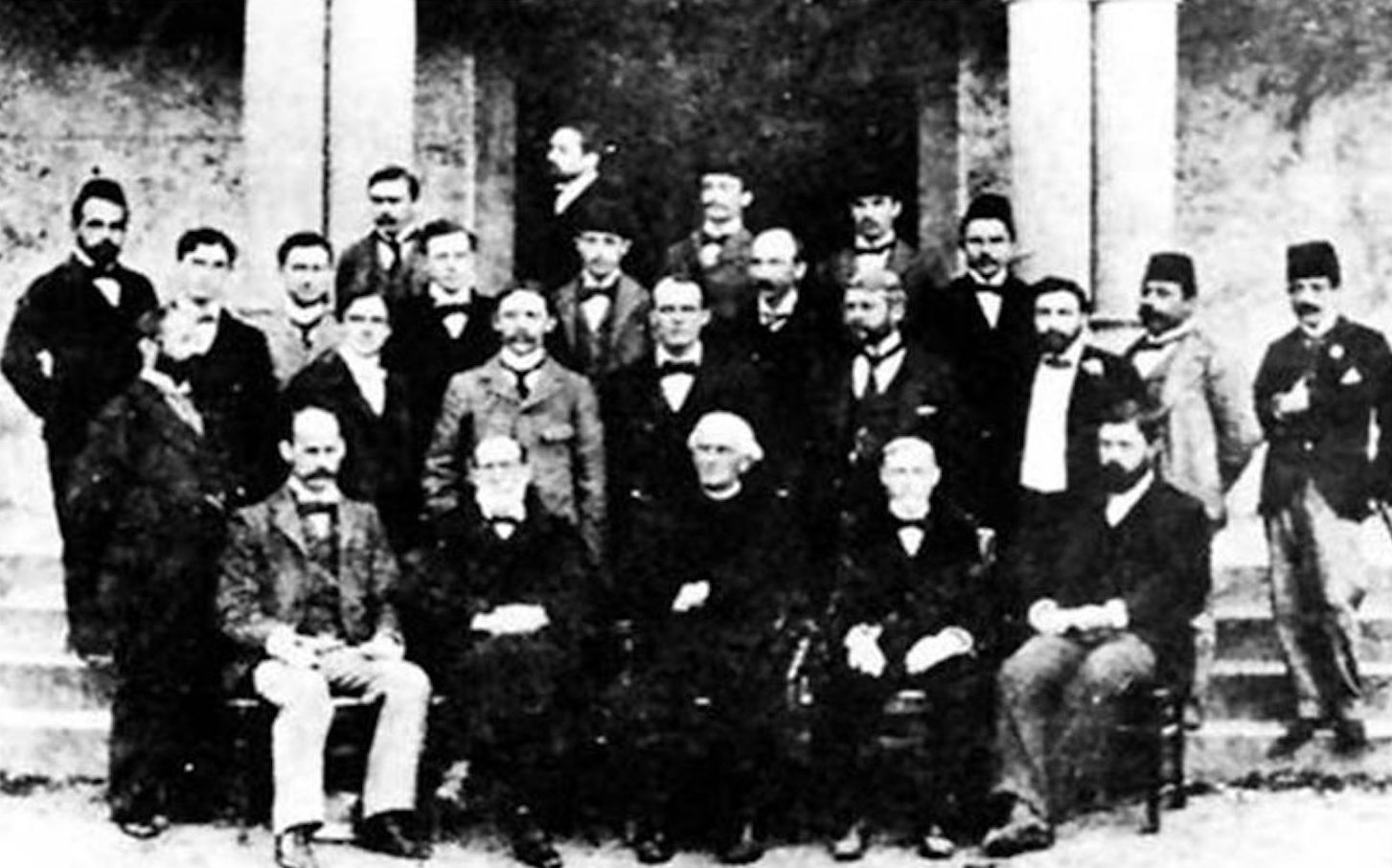
Only photo found of participants in the Arab Congress in 1913 that takes place between 18-23 June 1913 in Paris at the Société de Géographie. According to Jan Jasion, the dinner on June 6, could perhaps have been a preparation for this congress, as it was convened by Arab nationalists to discuss more autonomy for the Arab people living under the Ottoman Empire. (source)
The meeting
6 June 1913: Ahmet Pașa stops by 'Abdu'l-Bahá's hotel to invite Him to his home for an evening meeting. When 'Abdu'l-Bahá arrives, He finds leading Ottoman politicians present. Jan Jasion ventures a guess that this meeting is a preparation for the Arab Congress which is to take place in Paris June 18-23, 1913 because impromptu meetings of this kind would have to be expected ahead of such an important Congress. The Ottoman Empire is not an official party to the discussions of the Arab Congress, and its role is that of an official observer, but their role is not to be minimized: there are frictions with Persia over border disputes and the Ottoman empire has already started to disintegrate after the Turco-Italian War, the First Balkan War and the next two wars looming on the horizon (the Second Balkan War and the First World War). Already over the course of January-June, we see that these diplomats, princes and politicians have sought 'Abdu'l-Bahá's opinion on a variety of topics relating to the current situation. There is of course no official record of the majority of conversations that were held regarding these topics, nor of the names of many of the diplomats, notables and politicians who came to meet 'Abdu'l-Bahá, at His request, therefore there is no definite answer on the role played by 'Abdu'l-Bahá in any of these events. The purpose of this section is to showcase how the Center of Covenant has so raised the esteem of an entire ruling class of two previously oppressive regimes towards the Faith. And 'Abdu'l-Bahá being invited to such a high-profile meeting is the crowning achievement of His efforts in raising the standard of the Faith of Bahá'u'lláh so high that no one can deny its majesty.
7 June 1913: At three in the afternoon, 'Abdu'l-Bahá is meeting with Sulṭán-Ḥusayn Mírzá (Jalálu'd-Dawlih), the son of the Ẓillu’s-Sulṭán when Ahmet Pașa and his son are announced. A few minutes later, Sâlih Münîr Pașa's wife arrives with her son, carrying bundle of issues of "La Vie", a Parisian journal containing a positive article about 'Abdu'l-Bahá and His quest for peace, calling Him an "Apostle of Peace." 'Abdu'l-Bahá praises her greatly, saying she will be a force for good. That evening, 'Abdu'l-Bahá is invited to dinner by Sardár-i-Manṣúr, Sipahdár-i-Rashtí's home where the discussion's main subject is Jesus Christ and the spread of His gospel by His disciples.
8 June 1913: Sâlih Münîr Pașa calls on 'Abdu'l-Bahá and speaks with the Master at length on the Bahá'í Faith.
9 June 1913: 'Abdu'l-Bahá calls on Ahmet Pașa and from there, alone, takes a carriage and calls on Sâlih Münîr Pașa.
10 June 1913: Some time after four in the afternoon, 'Abdu'l-Bahá goes out to call on several Ottoman dignitaries who have arrived in Paris for a conference.
11 June 1913: Despite the influx of journalists and visitors coming to speak with Him before His impending departure, 'Abdu'l-Bahá finds the time to go out and visit a number of Persian and Ottoman notables on His last day in Paris.
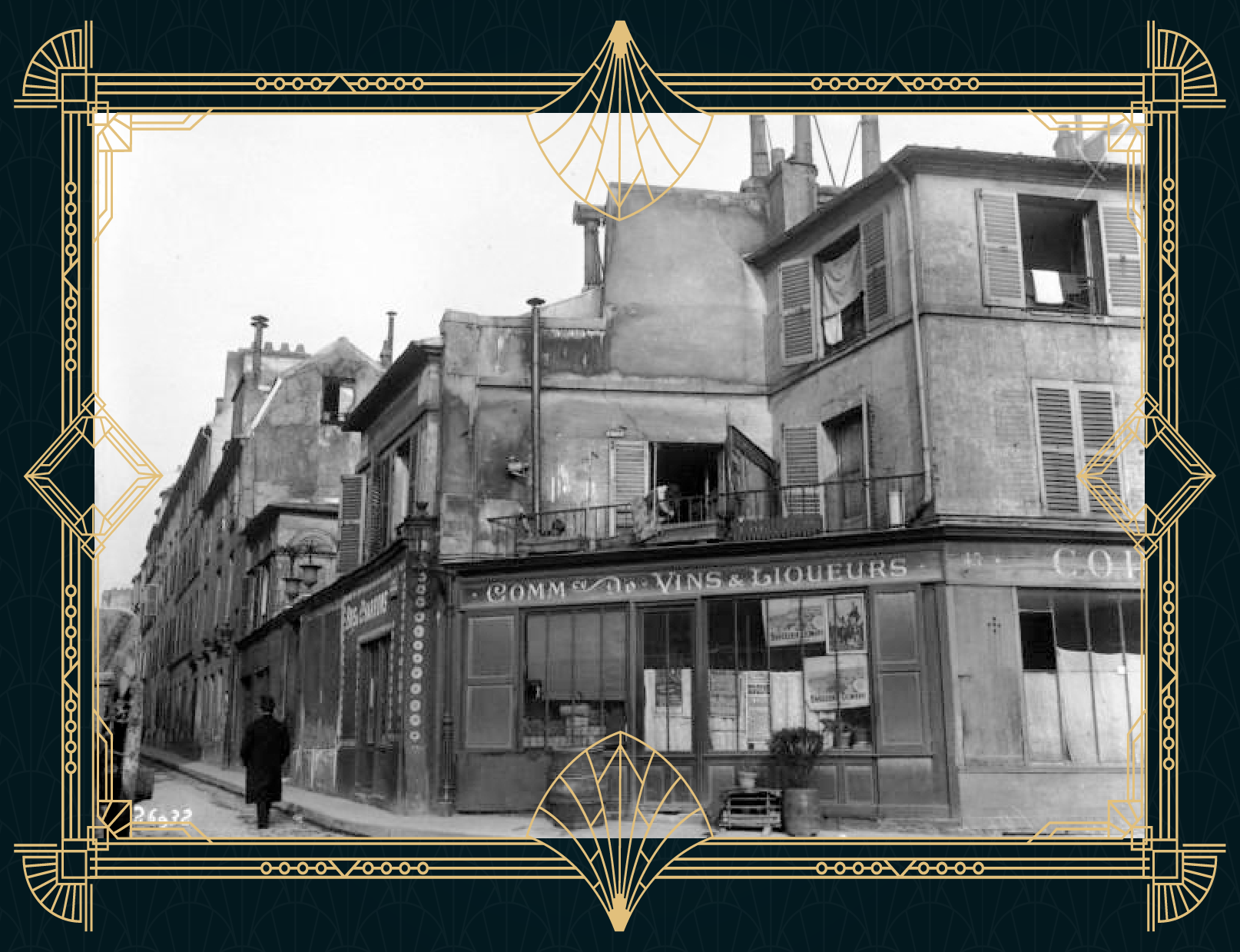
Rue Lhomond, Paris, 1913. Source: Wikimedia Commons.
I have been in your midst for some months. Only God knows how much I have grown to love you. it beats in my heart like the artery of life. During my stay, I have explained to you the divine advices. I have ignited the light of the Love of God. Strive day and night that its lustre and brightness may increase, so that the light of God may environ all the regions, the Kingdom of God may be established and the Glory ofr Abhá be revealed. Do not rest for one moment. Make ye a noble effort so that you may guide the souls; confer life upon these dead ones; make mindful those who are heedless; awaken those souls who are asleep, enkindle the extinct men and women with the consuming Fire of the Love of God and exhilarate the souls with the Gobelets fo the wine of Knowledge. I leave you here and I go to Egypt but I expect to receive good news from you, that your meetings are growing with the light of Faith and assurance.
Jan Jasion, 'Abdu'l-Bahá in France: 1911 & 1913, pags 663-664
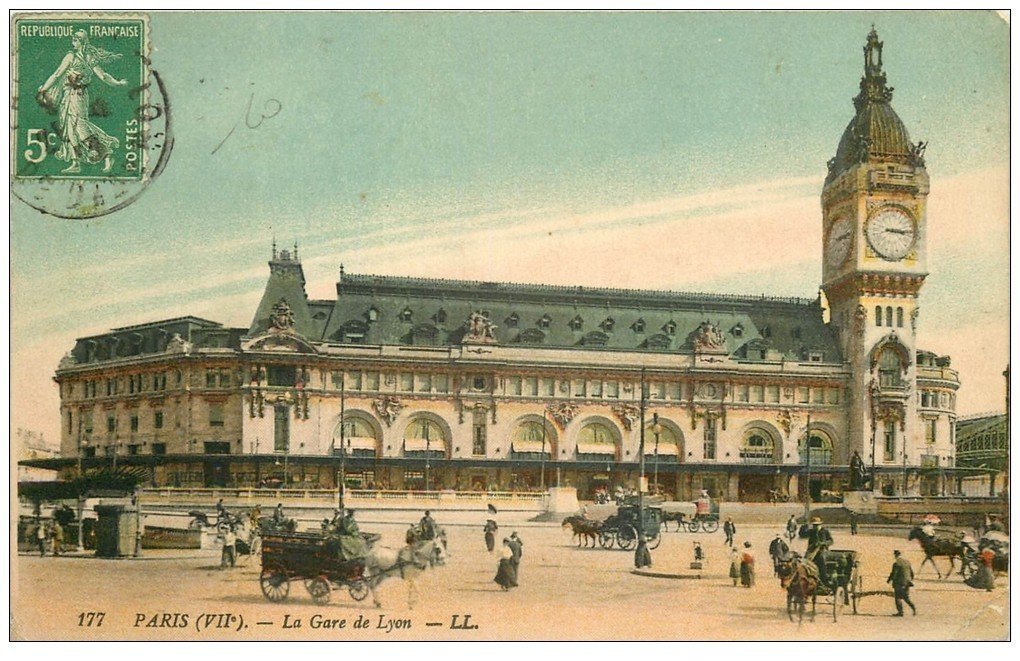
Gare de Lyon, Paris' train station for all south-bound trains, in 1913 (source)
Before leaving His hotel, 'Abdu'l-Bahá makes arrangements to have flowers sent to two ladies, Mrs. Sanderson (who kindly hosted 'Abdu'l-Bahá's daughter Rúḥá Khánum during her surgery and recovery) and Mrs. Jackson (who has been very ill). Hippolyte and Laura Dreyfus take 'Abdu'l-Bahá to Gare de Lyon where fifty people are waiting to bid 'Abdu'l-Bahá farewell. 'Abdu'l-Bahá speaks to each one, and shakes hands, then boards His train which leaves at 9:15 in the morning and arrives at 10:45 in the evening in Marseille.
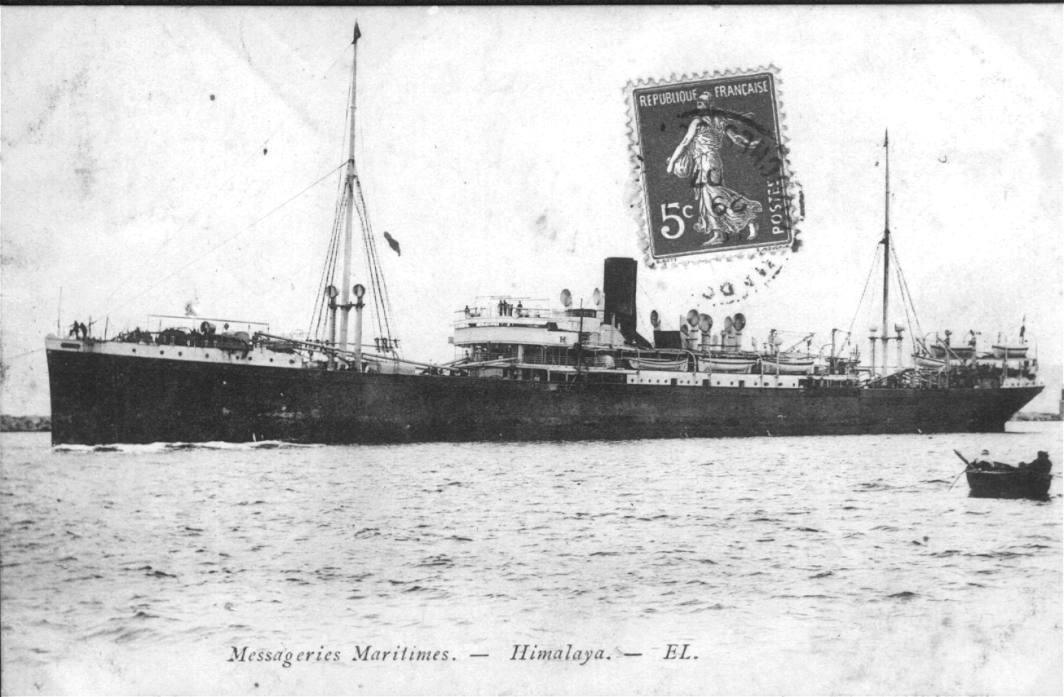
The steamer Himalaya of the companie Messageries Maritimes (source).
It is a touching testament to 'Abdu'l-Bahá's tireless work of sowing the seeds of Faith in France, that the very last farewell He is bid, is from two French Bahá'ís. Just before the Himalaya is about to set sail, two French Bahá'ís, a young man named Albert and a young woman named Marguerite Chazaviel come on board to say goodbye to 'Abdu'l-Bahá. The Master welcomes them on deck, affectionate and smiling and Marguerite gives the Master a wonderful message:
That the last loving thought sent to you from France is ours and these two small French Bahá'ís are bringing to you the loving greeting of all the people of France. This is a good sign.
Jan Jasion, "Abdu'l-Bahá in France: 1911 & 1913", page 668
Indeed it is. The Master's work is done. When 'Abdu'l-Bahá sails to Egypt, among the passengers on the Himalaya headed for Egypt, is H. H. Prince Muḥammad ‘Ali Bey, the brother of Abbas II, the Khedive of Egypt. 'Abdu'l-Bahá will encounter Prince Muḥammad ‘Ali Bey and the Khedive several times over the next few months.
This list of prominent personalities who met 'Abdu'l-Bahá in France in 1911 and in 1913 is taken entirely from Jan Jasion's master work, 'Abdu'l-Bahá in France: 1911 & 1913 and are mostly listed in chronological order. Some names that were added later are at the bottom of the list, and some for whom pictures were found later, are towards the end of the photomontage graphic. Adib Masumian edited the list, and provided transliteration corrections, as well as translations of all the Persian titles, for greater ease of understanding (see below the graphic for names and descriptions):
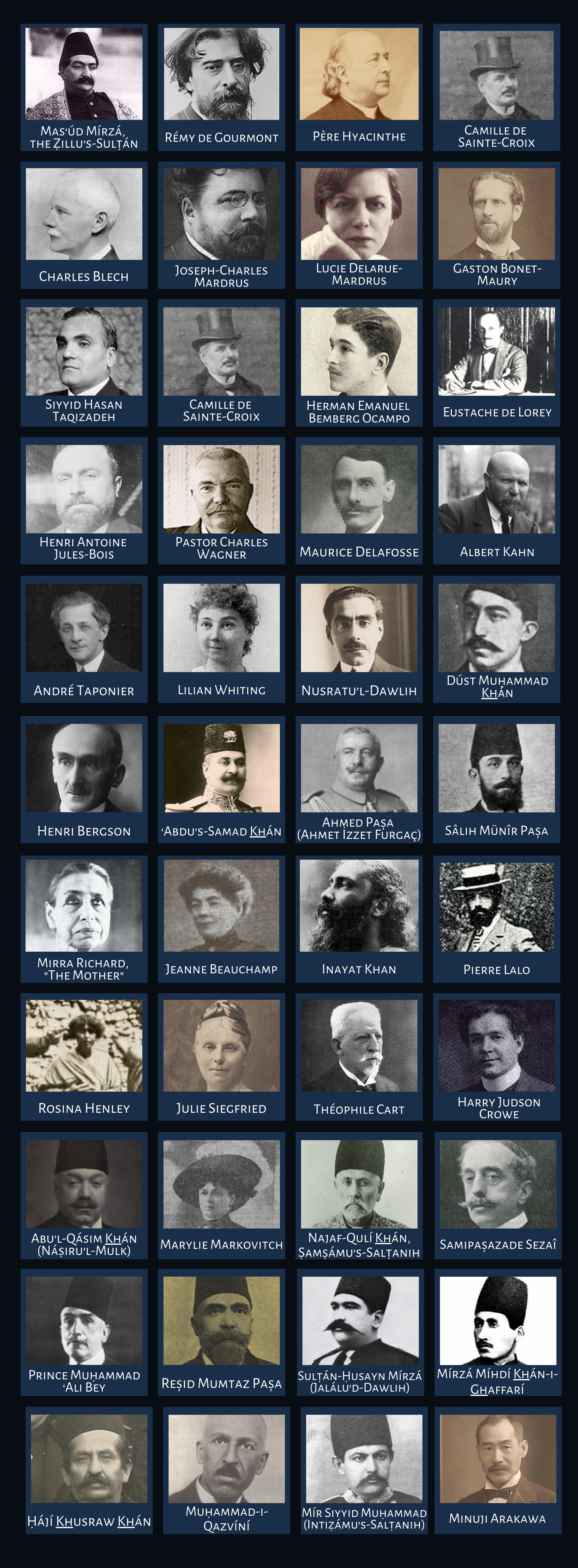
Masʻúd Mírzá, the Ẓillu’s-Sulṭán (Shadow of the King), eldest son of Náṣiri’d-Dín Sháh, and former Governor of Iṣfahán and his four sons:
Bahrám Mírzá (Sardár Masʻúd), (no photo found) ;
Fírúz Mírzá (Shaykh Fírúz’d-Dín Mírzá) , (no website or photo found) ;
Ismá‘íl Mírzá (Amír-i-Akram (Most Noble Prince) and Mu‘tamadu’d-Dawlih (the Trust of the State)), (no photo found) ;
Sulṭán-Ḥusayn Mírzá (Jalálu'd-Dawlih, the Glory of the State), Photograph courtesy of Dr. Moojan Moment from his book Babi and Baha'i Religions, p. 384
Professor Dickinson Sergeant Miller, an American philosopher best known for his work in metaphysics and the philosophy of mind (no photo found);
Remy de Gourmont, a French Symbolist poet, novelist, and influential literary critic. He was widely read in his era;
Charles Jean Marie Loyson, known as "Père Hyacinthe", a French preacher, successively a Sulpician, a Dominican and a Carmelite and perhaps the best-known preacher in France at the time who sought to reconcile Catholicism with modern ideas;
Charles Blech, a French manufacturer and theosophist, General Secretary of the Theosophical Society in France from 1908-1934;
Joseph-Charles Mardrus, French physician, poet, and a noted translator. Today he is best known for his translation of the Thousand and One Nights from Arabic into French;
Lucie Delarue-Mardrus, a French journalist, poet, novelist, sculptor, historian and designer. She was a prolific writer, who produced more than 70 books in her lifetime;
Gaston Bonet-Maury, a French Protestant historian, lecturer, then professor of church history at the newly opened Protestant Faculty of Theology in Paris;
Siyyid Hasan Taqizadeh, a very prominent Persian politician and writer;
Camille de Sainte-Croix, a French writer and journalist;
Herman Emanuel Bemberg Ocampo, a German-Argentine composer;
Eustache de Lorey, a French diplomat, archaeologist and historian of Islamic art, and collector;
Henri Antoine Jules Blois, a French writer, poet, essayist, and journalist with an interest in the occult;
Pastor Charles Wagner, a Lutheran pastor of the liberal Protestant church Foyer de l’âme in Paris and very involved in the movement to unite all the reform Protestant churches;
Maurice Delafosse, a French ethnographer, linguist and colonial administrator who tells 'Abdu'l-Bahá about his work in the French Congo;
Albert Kahn, a French banker and photograph collector;
André-Joseph-Auguste Taponier, a celebrated French photographer who would take many iconic portraits of 'Abdu'l-Bahá in both 1911 and 1913;
Lilian Whiting, an American journalist who meets 'Abdu'l-Bahá in London, Paris and Boston;
Nuṣratu’d-Dawlih (the Triumph of the State), aka Fírúz Mírzá Fírúz, eldest son of Prince ‘Abdu’l-Ḥusayn Farmánfarmá and the Persian attaché;
Dúst-Muhammad Khán, the Mu‘ayyiru'l-Mamálik (Assayer of the State), son-in-law of Násiri’d-Din Sháh, former Governor of Rásht province in Persian, son of a Prime Minister of the Sháh, an architect by trade, builder of palaces and amphitheaters; he has already spent a considerable amount of time with 'Abdu'l-Bahá in London, Bristol, and Woking;
Henri Bergson, an influential French philosopher;
‘Abdu’ṣ-Ṣamad Khán, the Mumtázu’s-Saltaníh (the Distinguished One of the Kingdom), the Persian Ambassador;
Aḥmad Páshá (Ahmet Pașa/Ahmet İzzet Furgaç), a former Ottoman general in exile in Paris;
Ṣálih Munír Páshá (Sâlih Münîr Pașa), a former Ottoman Minister in three ministries and current member of the Turkish delegation negotiating with the Balkan League in London to end the First Balkan War;
Mirra Richard, a French spiritual guru, an occultist and a collaborator of Sri Aurobindo, who considered her to be of equal yogic stature to him and called her by the name "The Mother," she met 'Abdu'l-Bahá more than 19 times in 1913;
Jeanne Beauchamp, French president and founder of the Alliance Spiritualiste;
Inayat Khan (Inayat Khan Rehmat Khan), an Indian professor of musicology, singer, exponent of the saraswati vina, poet, philosopher, and pioneer of the transmission of Sufism in the West, who played his vina, accompanied by a tabla, to the delight of 'Abdu'l-Bahá;
Pierre Lalo, the French music critic;
Rosina Henley, an American actress who performed in films and on Broadway and later wrote scenarios;
Julie Siegfried, a French feminist and chairman of the National Council for French Women;
Théophile Cart, an eminent Esperantist;
Muḥammad-Valí Khán-i-Tunukábuní (the Sipahdár-i-A‘ẓam (the Greatest Commander) and (Naṣru’s-Salṭanih, the Champion of the Kingdom)), the leader of the constitutionalist revolutionary forces from Iran's Northern provinces of Gílán and Mázindarán and known as one of the greatest statesmen and military commanders of Persian history as well as its wealthiest nobleman;
Harry Judson Crowe, a Canadian timber magnate, known for developing the pulp and paper industry in Newfoundland, initiating preschool and primary health care to lumber towns and for his interest in spiritual matters;
Abu’l-Qásim Khán Qarázúglú (Náṣiru’l-Mulk, the Champion of the State), the Regent of Persia, a Persian politician educated at Oxford University. He was appointed Minister of Finance in 1898, Prime Minister in 1907 and 1909, and Regent of Persia from 1910 to 1914;
Marylie Markovitch, a French writer, poet, feminist, and journalist and one of the first women to be a war correspondent;
Ṣamṣámu’s-Salṭanih (Sword of the Kingdom), aka Najaf-Qulí Khán), a Persian Prime Minister and leader of the Iranian Constitution Revolution;
Samipașazade Sezaî, a Turkish educator, politician, diplomat and writer, who was one of the leading lights of the Turkish Romantic period, and the Ottoman ambassador to Spain;
H. H. Prince Muḥammad ‘Ali Bey, the brother of Abbas II, the Khedive of Egypt; He is the only personality that 'Abdu'l-Bahá meets in three countries: In New York, in the United States, in Paris, France, and in Alexandria, Egypt;
Mustafa Rashíd Mumtáz Páshá (Reșid Mumtaz Pașa or Ráshid Páshá), former Governor of Beirut (including Palestine) from 1897 to 1903, when 'Abdu'l-Bahá was re-incarcerated, later senator and minister of the interior leader of the Ottoman delegation negotiating with the Balkan League in London to end the First Balkan War (no website or photo found);
Mírzá Míhdí Khán-i-Ghaffarí (Vazír-Humáyún (Deputy to the King), Qá’im-Maqám (Vicegerent)), was a Persian Bahá’í who held a number of governorships. He was also the son of Farrukh Khán (Amínu'd-Dawlih (the Trusted One of the State)); Photo courtesy of Dr. Moojan Momen, from Baha'i Communities of Iran Volume II, page 90;
Sardár-i-Ẓafar (the Commander of Victory), Ḥájí Khusraw Khán, a Persian politician and former Governor of Iṣfahán;
Muḥammad-i-Qazvíní, a Persian writer and scholar;
Mír Siyyid Muḥammad (the Intiẓámu’s-Salṭanih, The Order of the Kingdom), a Persian Bahá’í nobleman described as being very devoted to ‘Abdu’l-Bahá. His great-grandfather was Fatḥ-ʻAlí Sháh. His brother-in-law was the Hand of the Cause Ibn-i-Aṣdaq (d. 1928). His grandmother was the fourth wife of Mírzá Buzurg Núrí (d. 1839), the father of Baháʼuʼlláh; photo courtesy of Siyamak Zabihi-Moghaddam;
Minuji Arakawa, a Japanese diplomat and his wife, Kiyoko (no website or photo found); many thanks to Aïcha Benmamar for providing this photograph of Viscount Minuji Arakwa.
No photo or website link found for the following personalities; (please contact us if you can provide either)
Sardár-i-Manṣúr (the Aided Commander), aka Sipahdár-i-Rashtí (the Commander from Rasht), a Persian politician (no photo or website found);
Valentin Vaucamps, a well-known photographer who took the only color photograph of 'Abdu'l-Bahá that we have on 16 February 1913 (no website or photo found);
Halim Bey, an Ottoman official;
Hüsnü Bey (Husni Bey), the Ottoman Consul General (no website or photo found);
William McKendry Gwin, Jr., an American concert singer and music teacher (no website or photo found);
Mírzá Míhdí Khán, the Mushíru'l-Mulk (Consultant of the Realm), at the time of 'Abdu'l-Bahá's visit was Persia's Envoy Extraordinary and Minister Plenipotentiary in Great Britain. Later, he becomes Persia's Envoy Extraordinary and Minister Plenipotentiary to the United States from 1914-1918. He was also the brother of Abu’l-Qásim Khán Qaráquzlú (the Náṣiru’l-Mulk, or the Champion of the Realm), the Regent of Persia;
Mubaṣṣiru’l-Mulk (the Enlightener of the Kingdom) Asadu’lláh Khán, the brother of Sardár-i-Manṣúr (no website or photo found);
Yúsuf Khán Naẓar-i-Áqá, is the Counsellor of the Persian Legation. He is a member of a distinguished Persian family of diplomats living in Paris: his father is the former Persian ambassador to France, General Naẓar-i-Áqá and his brother is Ardishír Khán Naẓar-i-Áqá, the first secretary of the Persian legation. Married to a Brazilian, and an accomplished musician and composer, he would later serve with distinction in the French Foreign Legion during World War I; (no website or photo found);
Ardishír Khán Naẓar-i-Áqá, is the first secretary of the Persian legation. He is a member of a distinguished Persian family of diplomats living in Paris: his father is the former Persian ambassador to France, General Naẓar-i-Áqá and his brother is Yúsuf Khán Naẓar-i-Áqá, the first Counsellor of the Persian Legation; (no website or photo found);
Mehmet Ṣerif Pașa, an Ottoman General who attended the prestigious military academy École Saint Cyr in France. He was the Ottoman attaché to Berlin and Paris, and the Ottoman ambassador to Stockholm from 1898 to 1908. After the Young Turk Revolution, he was exiled to Paris and worked as the editor of "Le Mecherouttiete" and was the President of the Kurd Delegation to the 1919 Peace Conference; (no website or photo found);
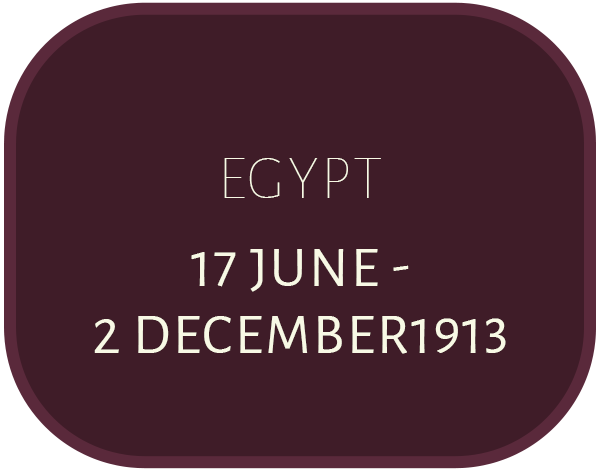
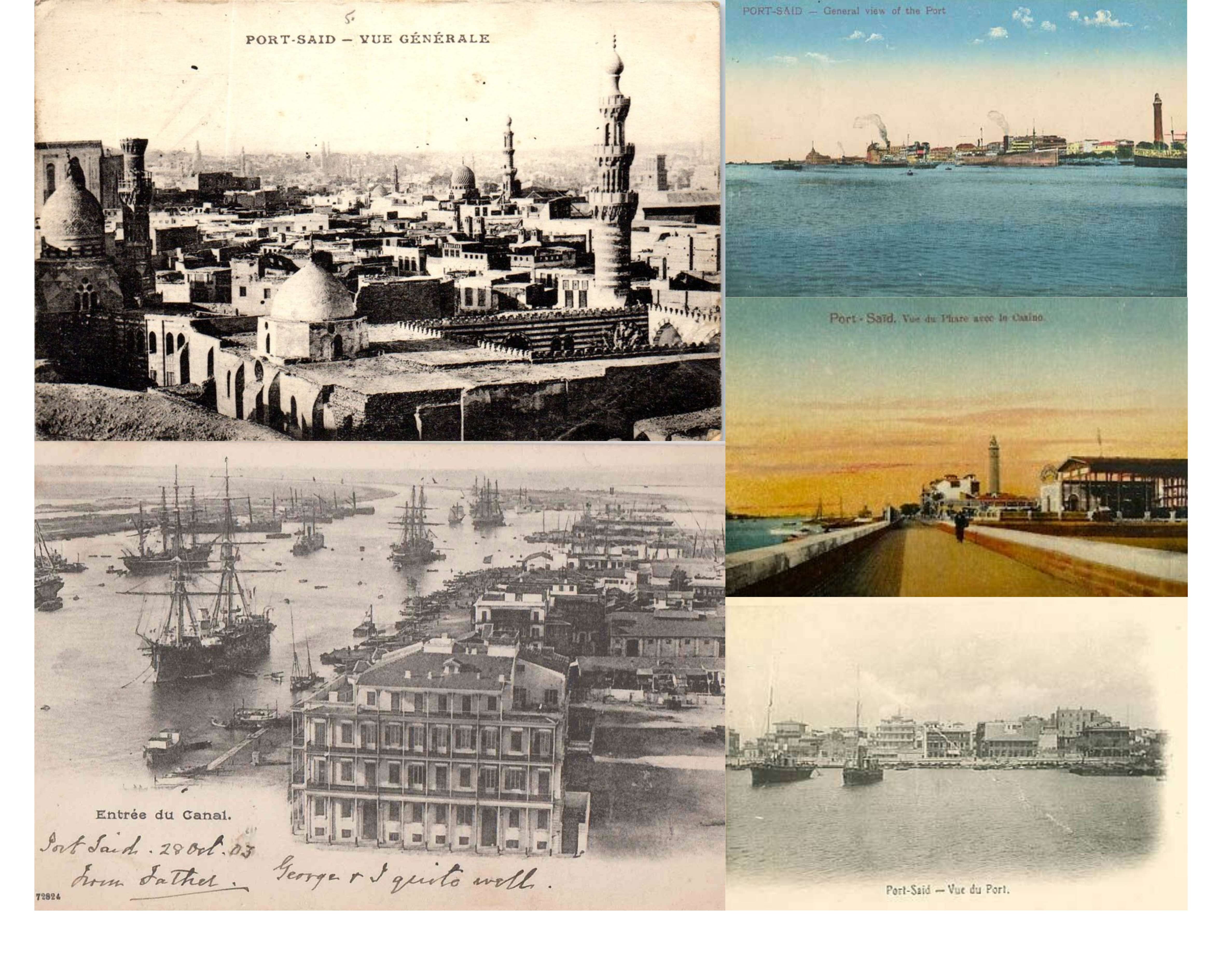
When 'Abdu'l-Bahá arrives in Port Said, three things happen in short succession. 'Abdu'l-Bahá decides not to return to the Holy Land immediately, He sends a cable asking the gathered pilgrims in Haifa who are waiting for Him in the Holy Land to make their way to Port Said, and He writes a letter to His beloved sister, the Greatest Holy Leaf, His sister, asking her to make preparations to join Him in Egypt:
O My beloved sister, the Greatest Holy Leaf!
My eagerness knows no bound. I have not seen thee for such a long time.
My coming to Haifa is somewhat delayed. If possible, come soon to Port Said.
Perhaps we could return together to the Holy Land ...
Quoted in Baharieh Maani, Leaves of the Twin Divine Trees, page 175
As early as June 18, 'Abdu'l-Bahá sends word that He will start receiving pilgrims, and starts giving talks to those who gather. The hotel where some of the Bahá'ís are housed is too small to accommodate the growing numbers of believers and activities, and so a huge tent of the type used by Egyptians for public functions is pitched on the hotel roof. Once the tent is erected, the gatherings become constant, meetings are held at which 'Abdu'l-Bahá often speaks. This does not go unnoticed in the local press and the Egyptian Gazette publishes an article on June 27, 1913 with the title:
ABDUL BAHA IN EGYPT.
WONDERFUL SCENES IN PORT SAID.
EASTERN BAHAIS ASSEMBLED IN FORCE.
(...) At Port Said the pilgrims have erected a huge tent on the roof of a native hotel
and there they gather and sing with touching devotion. (...)
'Abdu'l-Bahá in Egypt by Mírzá Ahmad Sohrab, page 21
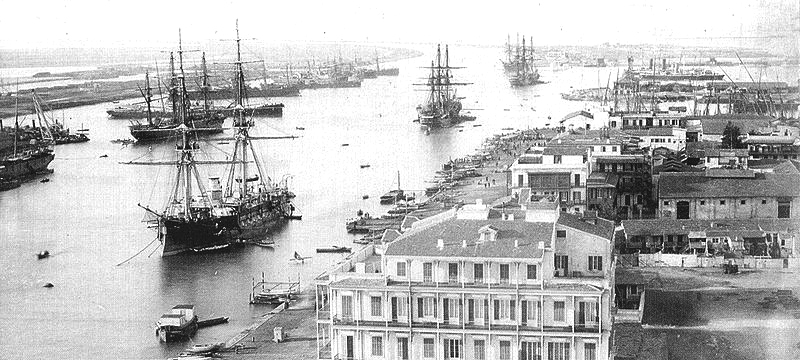
A view of the canal at Port Said in Egypt in 1880. Source: Wikimedia Commons.
On a different note, Ahmad Sohrab's diary for the end of June is filled with page after page of marvel and wonder at returning to a part of the world where "God" and "peace" are on everyone's lips. Although Sohrab's massive ego becomes even more apparent in these pages (sometimes he drones on for five pages of his own musings before 'Abdu'l-Bahá is even mentioned), they are helpful in forming a mental image of the cultural clash 'Abdu'l-Bahá's close companions must have felt in returning to an eastern society after fifteen months in America and Europe. Sohrab describes in vivid detail the wonder of listening to a man in a room next to his chanting melodious prayers, and the joy of being back in a part of the world suffused with spirituality and love of religion, comparing how in Western hotels, the manager will pay for musicians to entertain the guests, and in their hotel in Port Said, the manager hired someone to chant melodious verses of the Qur'án for the benefit of the hotel guests.
'Abdu'l-Bahá's arrival in Egypt is not a time of rest for the Master. He is busier than ever, receiving growing numbers of pilgrims, large number of Egyptian Bahá'ís, taking time to speak with each and every one, helping to resolve difficulties, disputes, problems of one or the other of His many visitors, managing a herculean correspondence answering letters, petitions, cables arriving from the East and the West. But during His five months in Egypt, 'Abdu'l-Bahá also extends His physical energies to receive large numbers of poor people, needy and destitute, who await Him at His residence every day. All the Tablets from this period of time are in 'Abdu'l-Bahá's own handwriting. Towards June 28, most of the pilgrims from Haifa have gone, and 'Abdu'l-Bahá is becoming increasingly concerned with Mírzá Abu’l-Faḍl's declining health.
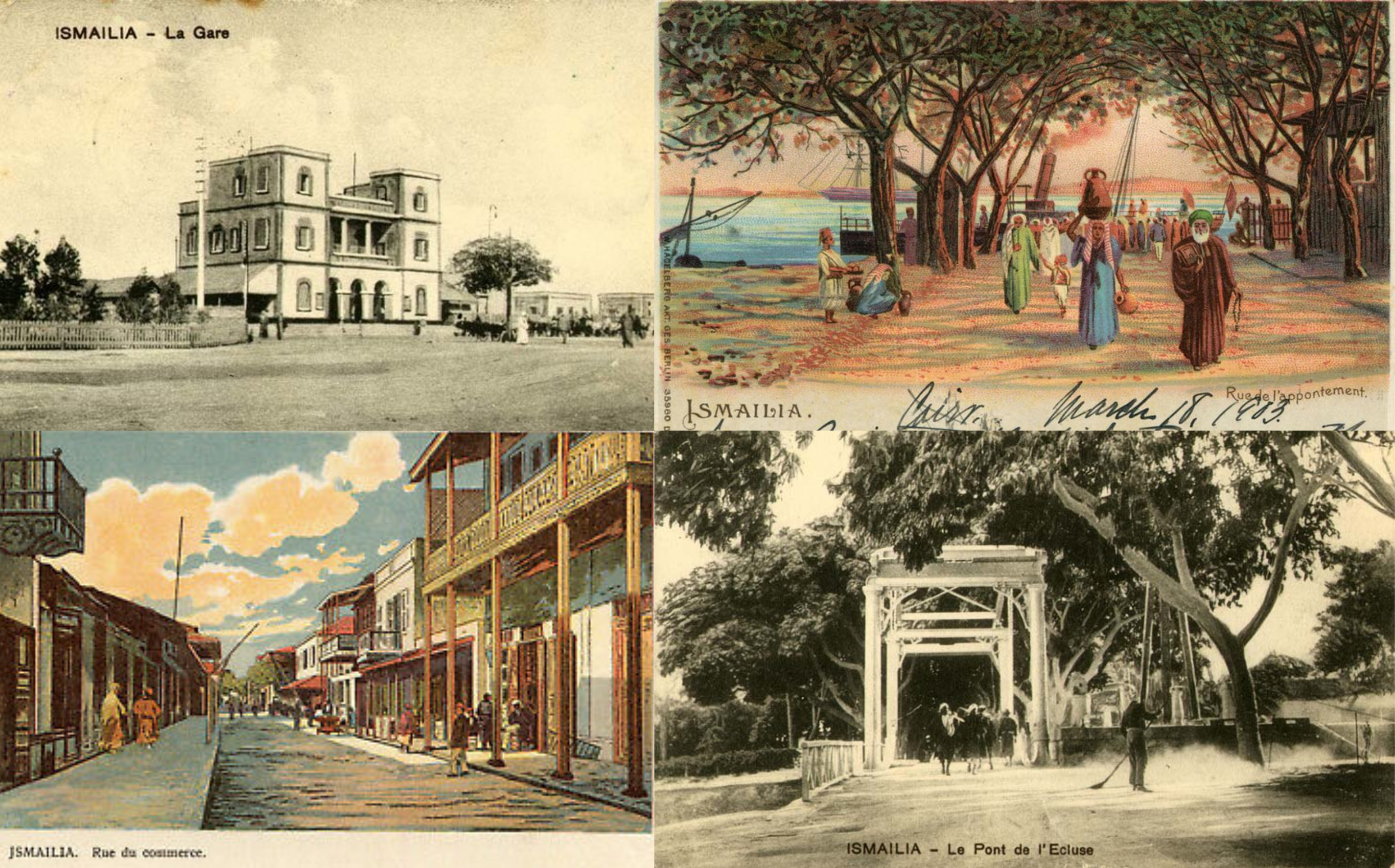
By July 11, The weather in Port Said has gotten very hot, and 'Abdu'l-Bahá is feverish. The Master, accompanied by Mírzá Múnir and His faithful Burmese cook, Aqá Khúsraw, the one who had been turned back at Naples in March 1912, take the train for Ismá‘ílíyyih, a city known in Egypt as "The City of Beauty and Enchantment" on their search for milder weather. Ismá‘ílíyyih is located about 80 kilometers due south of Port Said, on the west bank of the Suez Canal. Approximately a week after arriving in Ismá‘ílíyyih, 'Abdu'l-Bahá calls for some Bahá'ís who arrive to find the Master sitting up in bed at the hotel, tending to His correspondence with a very high fever, and weaker than He had been in Port Said. Although Ismá‘ílíyyih is less humid, 'Abdu'l-Bahá's fever has gotten worse, and it is decided that the weather of Ramleh, a northern, pleasant suburb of Alexandria, where 'Abdu'l-Bahá had already spent a significant amount of time in 1910, 1911, and 1912, will be more suitable. On July 17, 'Abdu'l-Bahá takes the train for Alexandria, about 300 kilometers northwest of Ismá‘ílíyyih.
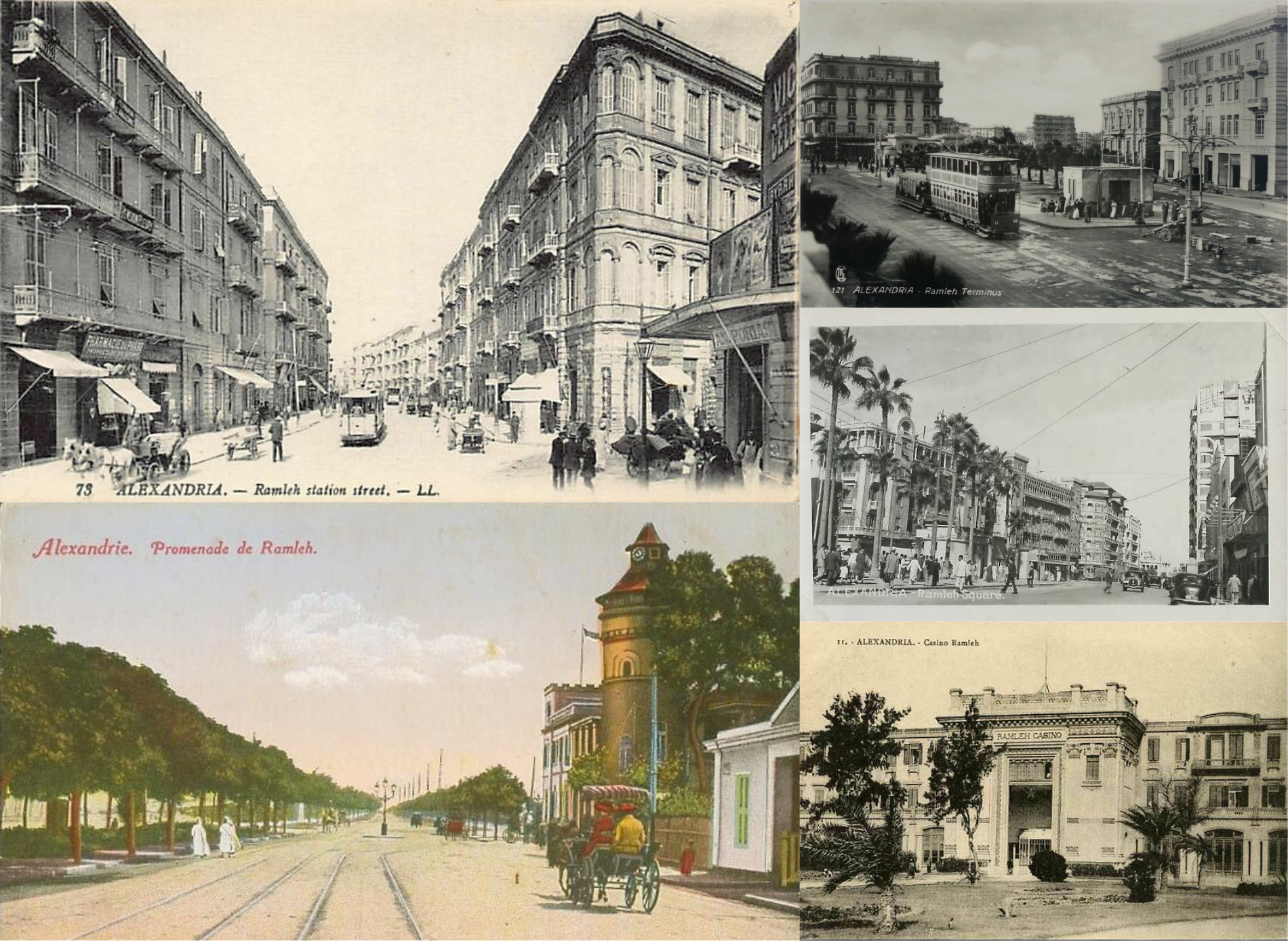
'Abdu'l-Bahá first stays two weeks at the Hotel Victoria in Ramleh, and then rents three houses: one for Himself in the neighborhood of Mazlum Pasha Station, one for His secretaries and visitors and a third house for Mírzá Abu’l-Faḍl'. It seems Ramleh is the right place for 'Abdu'l-Bahá, it is a summer resort and is blessed with parks and gardens. The weather suits Him and the Master's health soon starts to improve throughout the end of the summer and into early autumn. On July 23, shortly after His arrival, Lua Getsinger arrives, soon followed by her husband. Isabel Fraser arrives on September 19, but both Lua and Isabel are here because 'Abdu'l-Bahá wishes to send them on a travel-teaching mission to India.
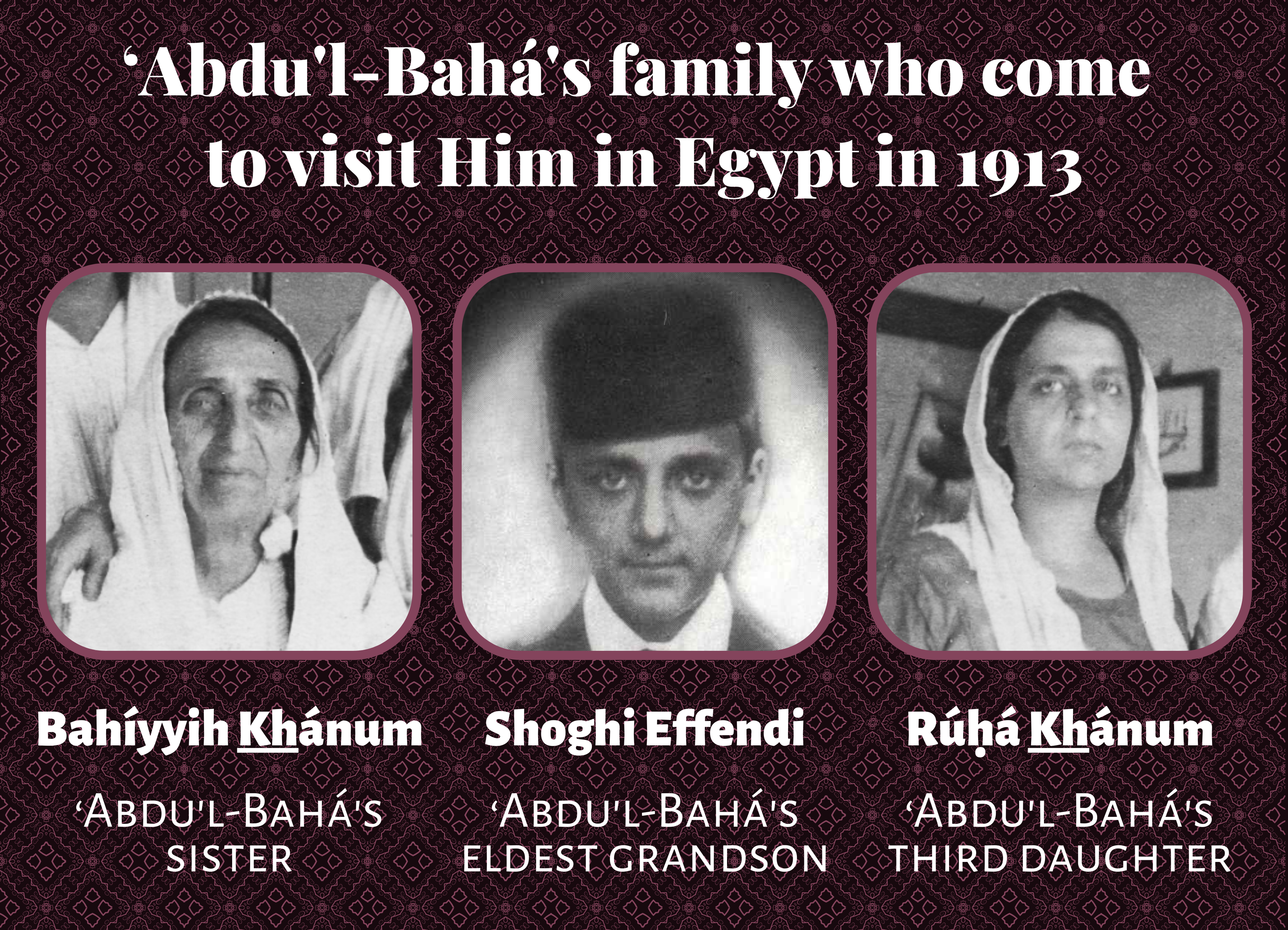
On August 1, 1913, forty-five days after His arrival in Egypt, 'Abdu'l-Bahá is joined by Bahíyyih Khánum, Rúḥá Khánum ('Abdu'l-Bahá's daughter and Shoghi Effendi's aunt who joined 'Abdu'l-Bahá in Paris a few months ago for throat surgery), Shoghi Effendi, aged 16, and five or six other Bahá'ís from Haifa and stay for a few weeks. There is no doubt they would have all come sooner, but Shoghi Effendi was at the time studying in Beirut, and had to wait for the school year to end after the first week of July. He then headed to Haifa, and from there, sailed to Port Said with members of his family. In Ramleh, 'Abdu'l-Bahá has rented a villa for the family. During 'Abdu'l-Bahá's Journeys to the West, Shoghi Effendi, who had subscribed to Star of the West, had been avidly following His beloved grandfather's exploits, sometimes writing to the editors when his issue of the bulletin was late in arriving. Shoghi Effendi recounts that Bahíyyih Khánum, for her part, and as soon as 'Abdu'l-Bahá had set foot in Europe and America, had been overwhelmed with thrilling messages recounting the extraordinary and irresistible advance of the Faith of her beloved Father, in the most incredible manner. Shoghi Effendi says that these years of 'Abdu'l-Bahá's Journeys to the West, when the Greatest Holy Leaf "basked in the sunshine of ‘Abdu’l-Bahá’s spiritual victories" were, perhaps, among the brightest and happiest of her life: her beloved Brother, the Center of the Covenant, achieving in distant countries and foreign nations the greatest and most memorable of His victories for their Father's magnificent Faith. Writing of the emotions that surged in the heart of the Greatest Holy Leaf when after three years she was reunited with her beloved brother in Egypt, Shoghi Effendi says:
The enthusiasm and joy which swelled in her breast as she greeted 'Abdu'l-Baha on His triumphant return from the West, I will not venture to describe. She was astounded at the vitality of which He had, despite His unimaginable sufferings, proved Himself capable. She was lost in admiration at the magnitude of the forces which His utterances had released. She was filled with thankfulness to Baha'u'llah for having enabled her to witness the evidences of such brilliant victory for His Cause no less than for His Son.
Letter from Shoghi Effendi to the Bahá’ís of the West dated 17 July 1932
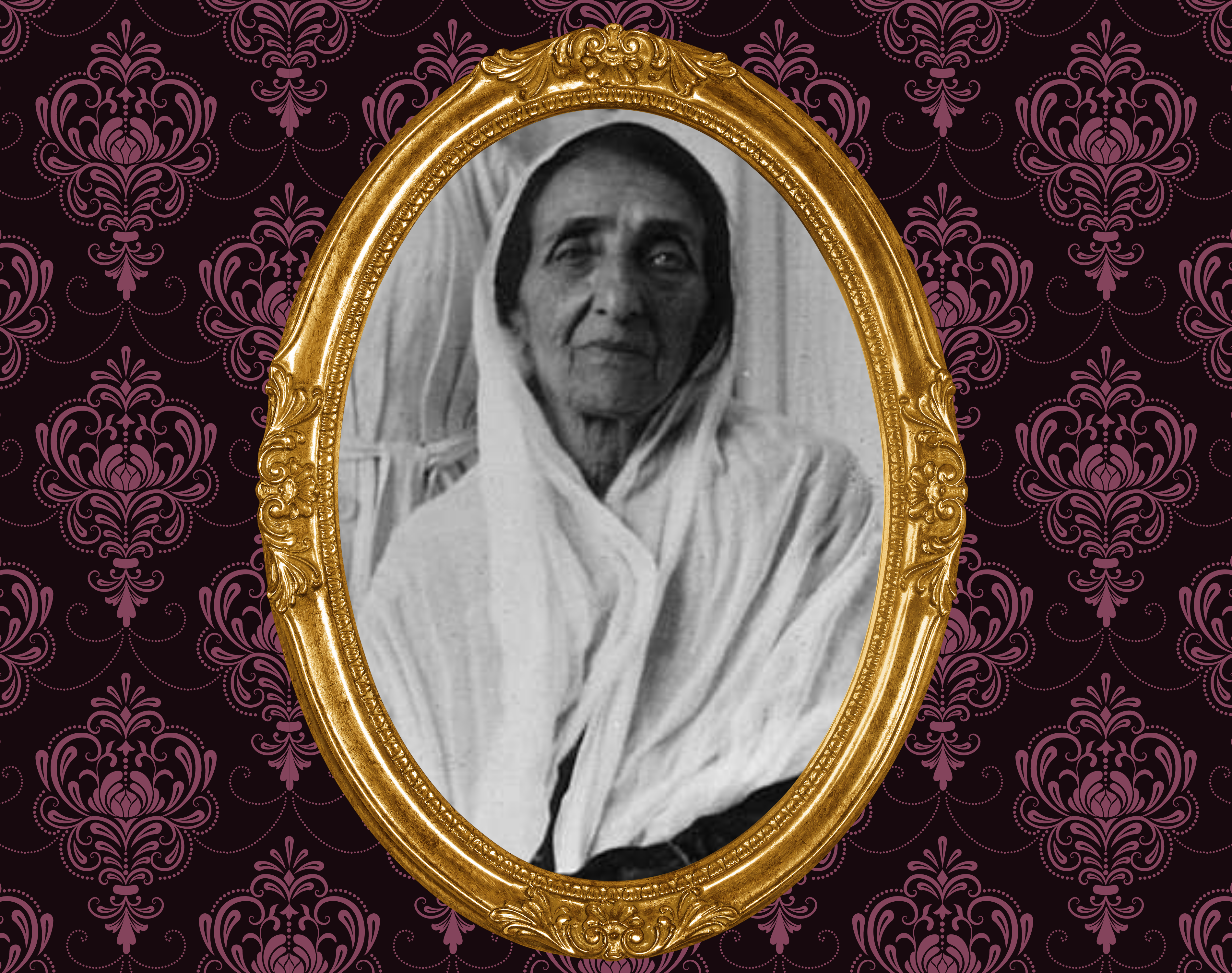
Throughout 'Abdu'l-Bahá's Journeys to the West, the Master had constantly kept in touch with the Greatest Holy Leaf. In His touching letters to her, and indeed throughout their lifelong correspondence, 'Abdu'l-Bahá unfailingly addressed her with great marks of love and respect, opening His letters with words such as these: "O thou my sister, my dear sister" on the ship to Egypt in 1910; "Her Highness, the Greatest Holy Leaf," upon arriving in Paris in 1911; "O thou Greatest and Most Merciful Holy Leaf" in 1912 on arriving in New York; "O My dear sister," "O My cherished sister," "O My sister, the kindred of My spirit," "Dear sister, beloved of my heart and soul," during His Journeys; and "O My beloved sister, the Greatest Holy Leaf" upon arriving in Egypt in 1913.
This constant, reciprocal, loving, and respectful, correspondence between brother and sister, children of Bahá'u'lláh, and each heroic in their own right, is indicative of another more important relationship: that of the Center of the Covenant with His deputy. After the passing of Bahá'u'lláh and the poisonous storm of Covenant-breaking, 'Abdu'l-Bahá was forced to retire twice, to Tiberias and to Haifa for periods of time to recover. During His absences, early in His Ministry, the responsibility of supervising the affairs of the Holy Family and the Bahá'í community amidst the plotting of the Covenant-breakers was thrust upon the Greatest Holy Leaf. 'Abdu'l-Bahá's long absence of three years has now afforded Bahíyyih Khánum the opportunity to fully act as His deputy, making it abundantly clear to all Bahá'ís everywhere that after Himself, no one exists to rival the spiritual station of the Greatest Holy Leaf. The other effect of 'Abdu'l-Bahá's prolonged absence from the Holy Land was that it helped lay the ground for the Greatest Holy Leaf to deploy her leadership abilities on a much wider scale than before, and prepared her for Shoghi Effendi's five-month absence after the passing of 'Abdu'l-Bahá.
At two times in the history of the Bahá'í Faith, when 'Abdu'l-Bahá and Shoghi Effendi each took on the mantle of Center of the Covenant at the beginning of their respective Ministries, it was the Greatest Holy Leaf who ably, wisely and firmly, steered the ship for short periods of time until they had recuperated from the tremendous shock and weight of the responsibilities and were able to fully assume their sacred duties and bear the weight of their crushing responsibilities.
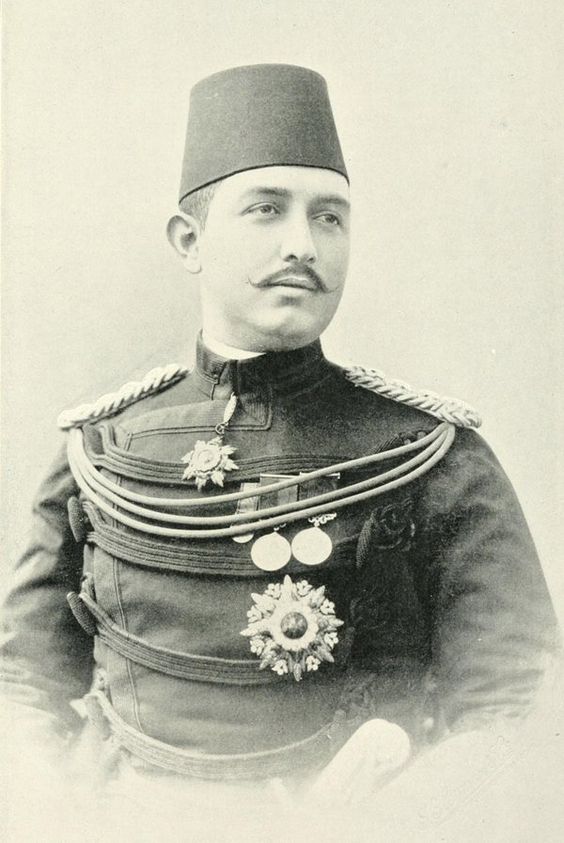
The Khedive of Egypt, Abbás Ḥilmi II. (Source)
On August 15, ‘Uthmán Páshá (Osman Pasha), one of the Ministers of Abbás Ḥilmi II, the Khedive (Ottoman Viceroy) of Egypt, calls on 'Abdu'l-Bahá to convey the Khedive's greetings, and a request for a meeting two days' hence. The Khedive is staying in Alexandria in his summer resort, not far from Ramleh, a palace facing the Mediterranean Sea, called Ras El Tin. The Khedive has met 'Abdu'l-Bahá twice before during His previous visits to Egypt, and regards the Master very highly. Sohrab rightly ventures that history will record "that he is one of the few Oriental Rulers who has received 'Abdu'l-Bahá with due honor."
So, on August 17, 1913, 'Abdu'l-Bahá went unaccompanied to meet with Abbás Ḥilmi II, the sovereign of Egypt, between three and six in the afternoon. Upon His return, 'Abdu'l-Bahá does not disclose any details regarding this meeting.
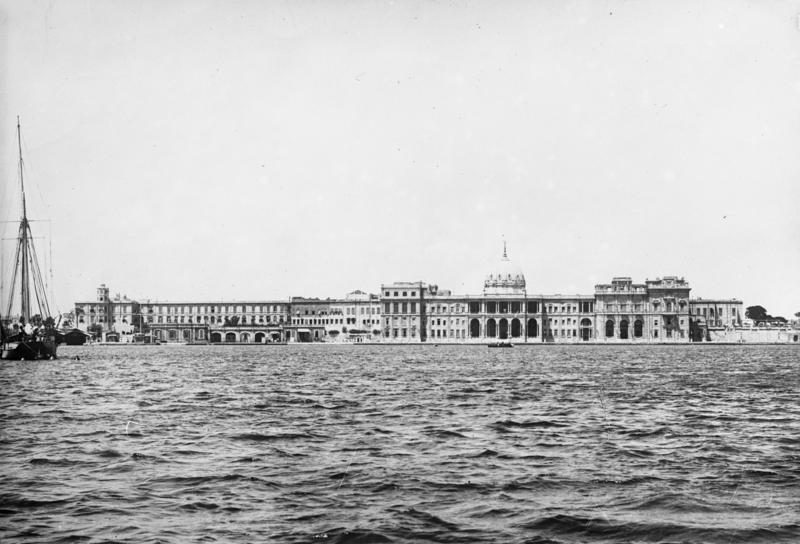
Ras El Tin, the Khedive's seafront palace, where he met 'Abdu'l-Bahá on August 17, 1913. Wikimedia Commons.

Prince Muḥammad-‘Alí of Egypt, the Khedive’s brother in 1917. Wikimedia Commons.
3 September 1913
On September 3, 'Abdu'l-Bahá, accompanied by the Khedive's Minister, ‘Uthmán Páshá, pays another visit to Abbás Ḥilmi II who has come to celebrate the feast of Eid al-Fitr, the celebration of the end of the month of Ramadan, fasting, in Alexandria, after celebrating it in Cairo on September 2.
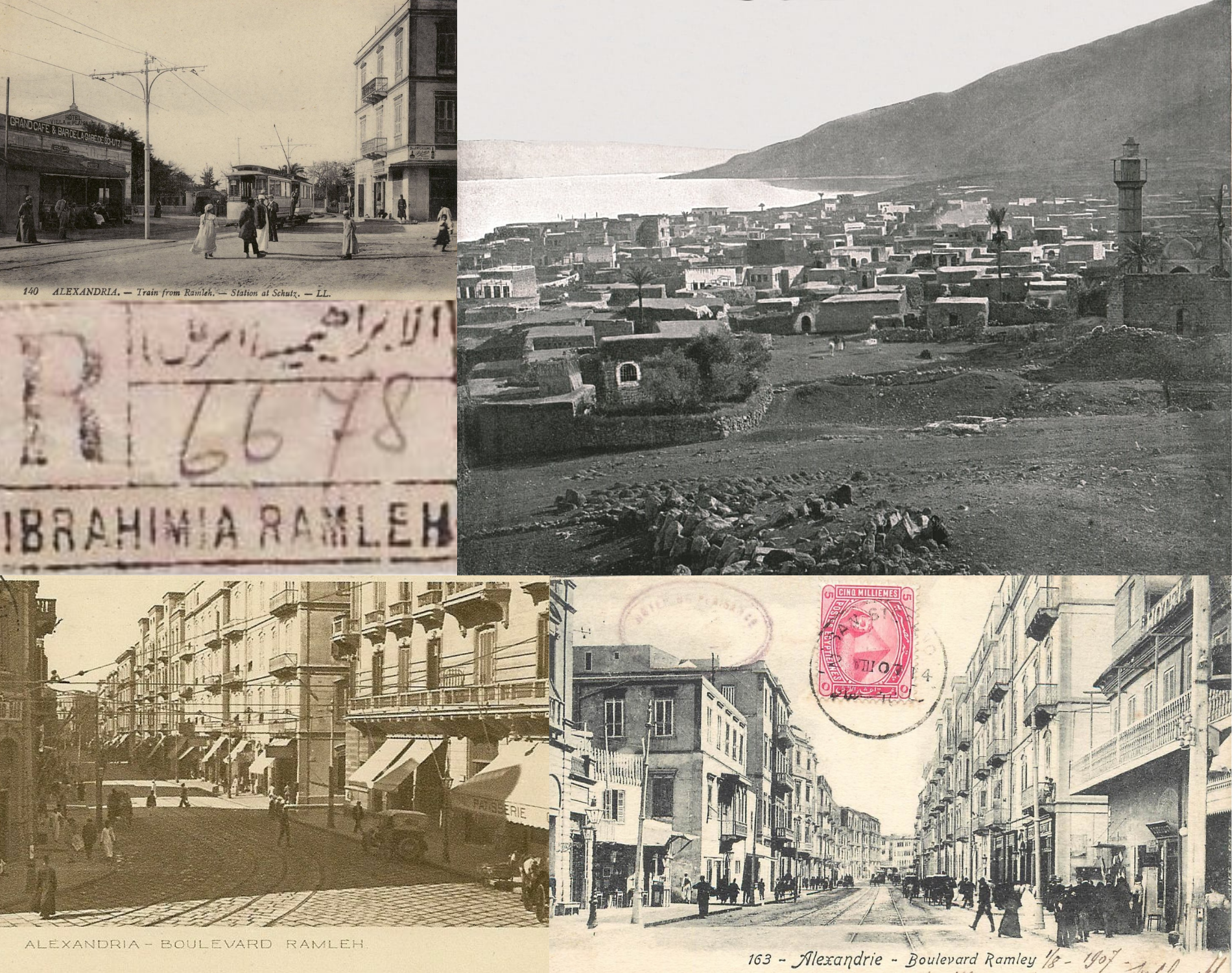
4 September 1913
The next day, in the afternoon Prince Muḥammad-‘Alí, the Khedive's brother, calls on 'Abdu'l-Bahá. They have met previously in both New York City and Paris. The prince arrives by automobile at the second of three houses 'Abdu'l-Bahá has rented, and hearing that the Master is in another house not far away, decides to walk there. Before a Bahá'í can run ahead and warn 'Abdu'l-Bahá of the Prince's arrival, the Master arrives, walking from the other end of the street in His long, loose, cream-colored 'abá. The Prince and the Master meet halfway up the street, greeting each other most courteously. Then, 'Abdu'l-Bahá and Prince Muḥammad-‘Alí continue walking and conversing together, disappearing from the eyes of the Bahá'ís marveling at the scene.
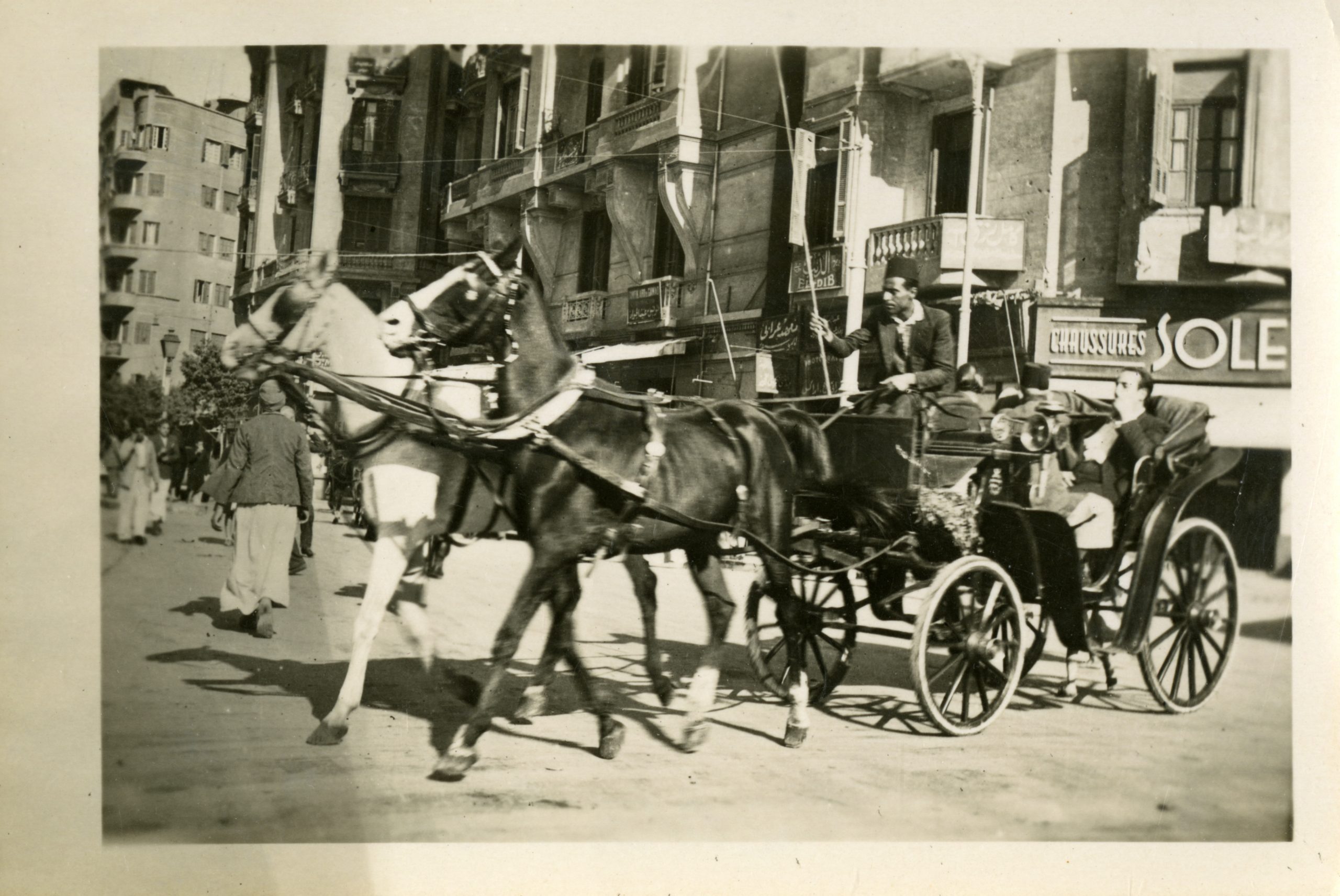
A horse-drawn carriage in Cairo, Egypt, no date provide. Source.
Shoghi Effendi more than once tells Amatu’l-Bahá Rúḥíyyih Khánum the story of a incident he witnessed when he was visiting his grandfather in Ramleh in 1913. One day, 'Abdu'l-Bahá, Shoghi Effendi, and a certain Páshá hired a private carriage to return to Ramleh from Alexandria. When they arrived, 'Abdu'l-Bahá asked the driver how much He owed:
The driver, a very big man, demanded an exorbitant fee, which ‘Abdu’l-Bahá simply refused to pay. The burly man became extremely abusive to the point of grabbing the sash around ‘Abdu’l-Bahá’s waist and yanking Him back and forth. This was very upsetting and embarrassing to both Shoghi Effendi and the Pasha, but it didn’t seem to bother the Master at all. When the bully finally released Him, ‘Abdu’l-Bahá paid Him exactly what He owed, telling the bemused driver that his actions had cost him his tip.
Ruhíyyih Rabbani, The Priceless Pearl, p. 23.
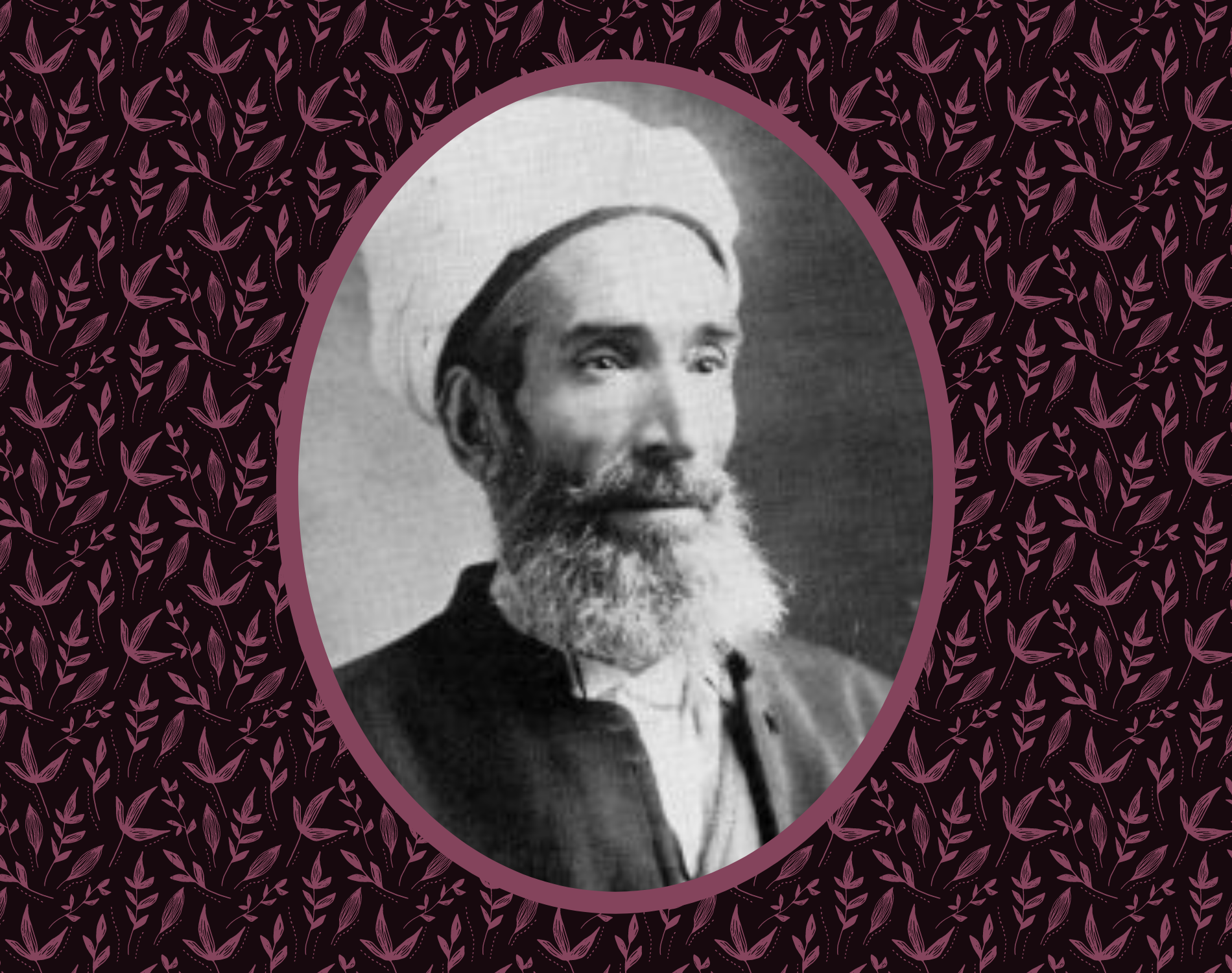
Mírzá Abu’l-Faḍl', born the same year as 'Abdu'l-Bahá in 1844, was the foremost Bahá'í scholar and author of his time and an Apostle of Bahá'u'lláh. He was imprisoned on three occasions in Ṭihrán: in 1876 in for five months; in 1882-1883 for nineteen months; and finally in 1885 for five months. Mírzá Abu’l-Faḍl' first received letters from Bahá'u'lláh in 1886 asking him to travel and teach the Faith. Later, ‘Abdu'l-Bahá sent him on a mission to America. After his travels for the Faith in Persia, Turkmenistan and the United States, Mírzá Abu’l-Faḍl', then 50 years old, settled in Egypt in 1894, at the request of 'Abdu'l-Bahá. He would spend the remaining decades of his life in this country.
When 'Abdu'l-Bahá arrives in Egypt in 1913, Mírzá Abu’l-Faḍl's health has been steadily declining and ‘Abdu’l-Bahá, wanting to have Mírzá Abu’l-Faḍl' nearby, rents the upper floor of a nearby house for him. During 'Abdu'l-Bahá's last stay in Egypt, the Master visits Mírzá Abu’l-Faḍl' regularly, every few days, sometimes even daily, at times bringing guests so they can meet the faithful, erudite, and tireless believer. Isabel Fraser recalls being present one day when 20 Sháykhs from Alexandria are visiting Mírzá Abu’l-Faḍl'. One of them, a highly educated and very elegant Sháykh, had come to interview Mírzá Abu’l-Faḍl' for an article in a magazine for which he was the editor. They were listening to Mírzá Abu’l-Faḍl' with rapt attention when 'Abdu'l-Bahá entered, and instantly, the eminent, learned, Mírzá Abu’l-Faḍl' stood with his head bowed, his entire attitude shifting from learned discourse to utter humility. After quickly arranging a chair for the Master, Mírzá Abu’l-Faḍl' explained the subject of the discussion to 'Abdu'l-Bahá who then carried on the discourse.
Mírzá Abu’l-Faḍl's love, respect and devotion for 'Abdu'l-Bahá knew no bounds, but 'Abdu'l-Bahá reciprocated his deep spiritual affection and often spoke of Mírzá Abu’l-Faḍl's station. When He was in Paris in January 1913 and heard Mírzá Abu’l-Faḍl' was ill, 'Abdu'l-Bahá cabled Egypt saying "He is me", indicating how Mírzá Abu’l-Faḍl' should be treated by the Bahá'ís, further adding, ‘Mirza Abu’l-Faḍl is very beloved to me. Mírzá Abu’l-Faḍl and Hají Mírzá Háydar 'Alí are peerless and unique. They are perfect Bahais. They embody in themselves Bahá'í principles. Their value is not now appreciated. It will become known later’. (Ahmad Sohrab letter to Harriet Magee, 26 January 1913).
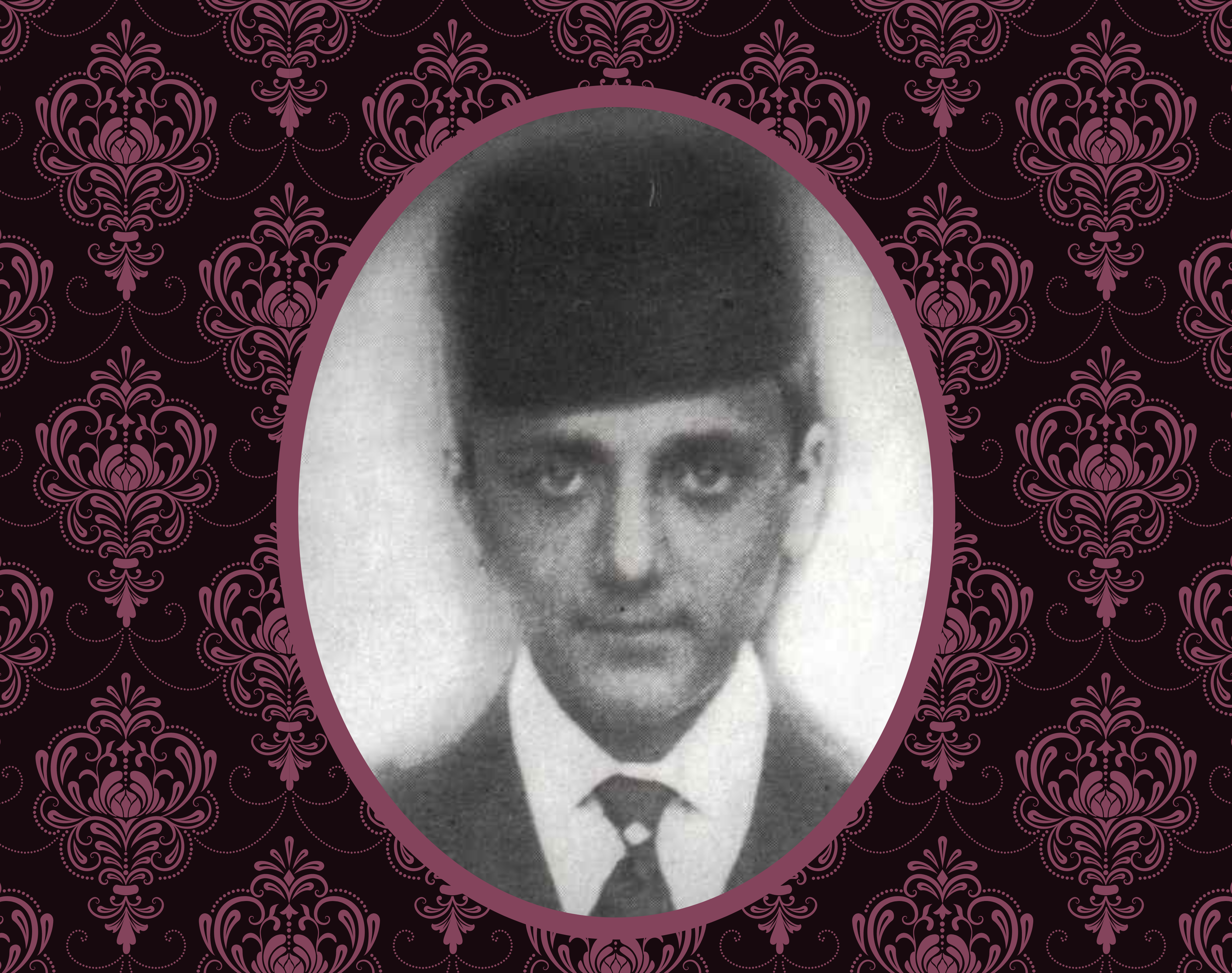
As in 1911-1912, Shoghi Effendi occupied his time in Egypt with his beloved Grandfather in many different ways. 'Abdu'l-Bahá would often have Shoghi Effendi chant for Him, then teach the adolescent how to control his voice to render various emotional expressions by modulating his voice. Shoghi Effendi, now an intensely active and highly capable young man, would find every opportunity to make himself useful to his Grandfather, and no task was ever too small. He would joyfully render the smallest of services, such as fetching 'Abdu'l-Bahá a bottle of Evian water, if He needed it, but he also rendered great services such as taking down letters to the Persian believers which 'Abdu'l-Bahá would dictate while sitting or pacing in the garden of His villa. Shoghi Effendi waited on 'Abdu'l-Bahá, ran errands for his Grandfather, sometimes meeting visitors on His behalf at the train station, as he did with Isabel Fraser on September 18. Shoghi Effendi also gave tours of Alexandria to visiting Bahá'ís at 'Abdu'l-Bahá's request, showing them the zoo or the famous park. Shoghi Effendi even visited Cairo during his 1913 stay, and Ruhíyyih Khánum ventures to guess that "he lost no time in visiting the pyramids, for Shoghi Effendi had an adventurous spirit and longed to visit distant places, as witnessed by the keen interest it is recorded he showed in some "Travel" magazines sent from America." After several weeks in 'Abdu'l-Bahá's company, the Holy Family returned to the Holy Land and Shoghi Effendi headed back to Beirut to complete his studies.
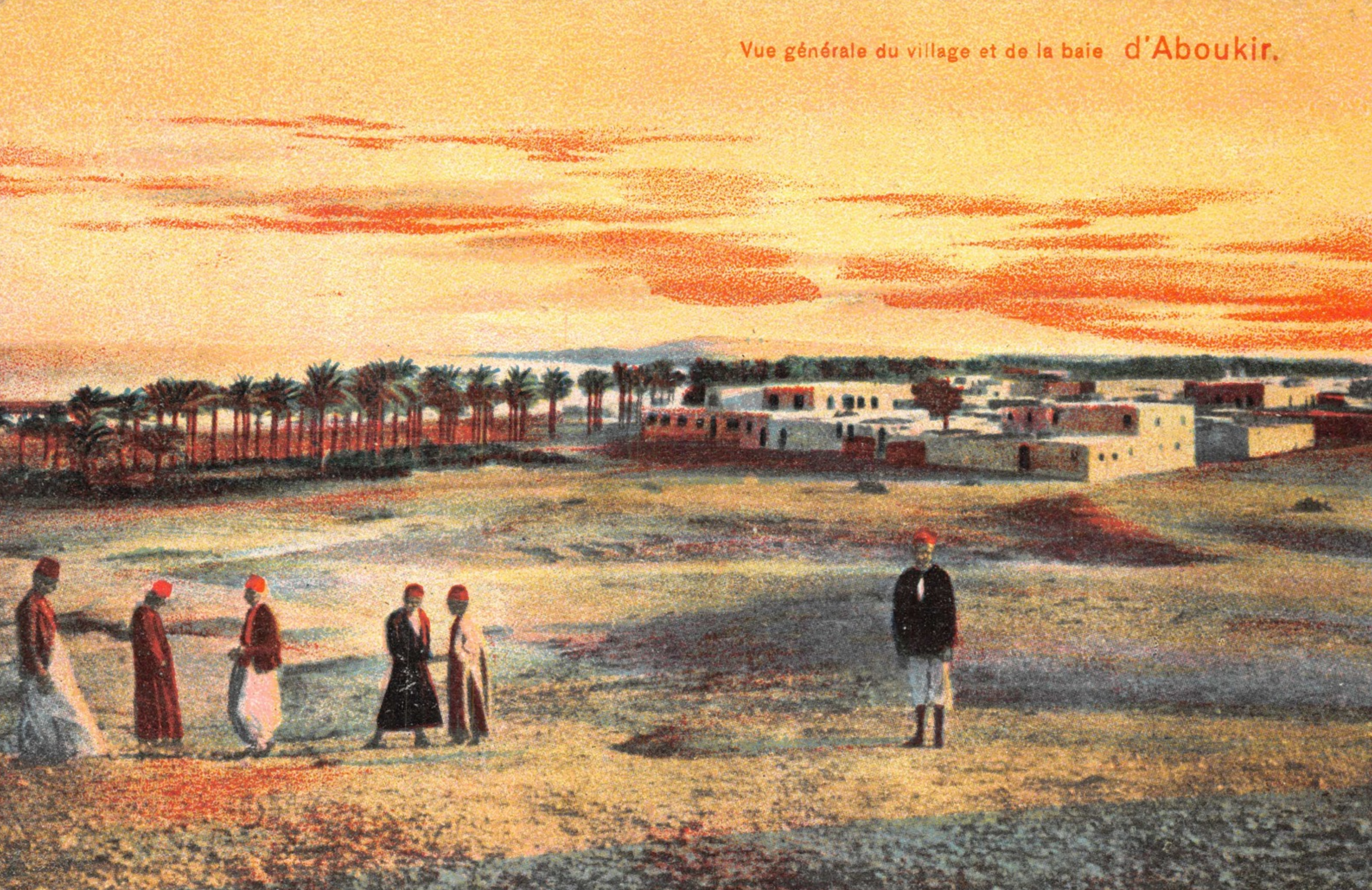
Wishing to be away from the stress and rush of Ramleh, 'Abdu'l-Bahá leaves by train for Abú Qír, about 15 kilometers northeast of Ramleh, on the coast of the Mediterranean, at 11 in the morning on October 13, 1913. He is accompanied by Mírzá Munír and Áqá Khusraw, his loyal Burmese servant, who had been turned back at the same time as Shoghi Effendi in March 1912, as they were headed to America. Abú Qír is only half an hour away from Ramleh. Mírzá Munír writes immediately upon arrival, saying that the small village is perfectly calm, and that 'Abdu'l-Bahá, with such a slight change in air, already feels much better. He adds that the Master had enjoyed looking out of the train onto the gardens, orchards, and palm groves during the short journey. The plan, according to Mírzá Munír is to stay for a week in Abú Qír. While in the quiet, peaceful village, 'Abdu'l-Bahá receives visitors and speaks to them about the early history of the Faith. The hotel where 'Abdu'l-Bahá is staying is a stone's throw from the train station, all the other guests have left and the owner knows the Master from Alexandria. To everyone's shock and surprise, barely two days after arriving, very early in the morning of October 15, before anyone has awoken, 'Abdu'l-Bahá knocks on Mírzá Munír's door and tells him they are leaving in five minutes! Mírzá Munír and Áqá Khusraw frantically pack and run after 'Abdu'l-Bahá who has already started walking to the train station, a bouquet of flowers in His hands. Seeing the Master arrive from a distance, all the train workers and conductors ready themselves to pay their respects. When 'Abdu'l-Bahá arrives, He distributes the flowers of the bouquet among them, enquires after the health of each one. When 'Abdu'l-Bahá returns to Ramleh, the surprise is complete, and everyone is overjoyed to see Him return so soon and so unexpectedly.

Al Ahram newspaper masthead in October 1913
The same afternoon 'Abdu'l-Bahá arrives from Abú Qír, He finds Constantin Teutunji, a correspondent for the Egyptian newspaper Al Ahram, waiting for him and asking for an interview. The reporter is shown into the reception room, and a few minutes later, 'Abdu'l-Bahá arrives, greeting him with the utmost courtesy. 'Abdu'l-Bahá starts the interview speaking about Bahá'u'lláh's imprisonment in the penal colony of 'Akká, where the conditions were unbearable.
'Abdu'l-Bahá: We were thrown into the barrack, and no permission was given to have intercourse with the outside world.
The reporter is in disbelief. He asks, incredulously, then progressively indignantly:
Constantin Teutunji: Do you mean the Barrack? The Barrack where the criminals are imprisoned? Do you mean that? How is that? What was your crime?
'Abdu'l-Bahá: Oh! Our crime was the proclamation of religious liberty, the liberty of worshipping God according to our own hearts; to spread Universal Peace; to educate public opinion for moral and civic uplift of the nations; the equality of the sexes; Universal Education, so that no ignorant boy or girl remain in the country; the development of spiritual susceptibilities, rectitude, uprightness, honor and righteousness. These were a few of our crimes.
Constantin Teutunji: And did they put you in prison for these things?
'Abdu'l-Bahá: Yes, they were very bitter against us. They desired to do away with us, but in a nice way. The climate and the weather in 'Akká were abominable, and in sending us to this living tomb they had in mind the idea that in three months we would be exterminated by the common enemy, but God intervened and frustrated their plans. While we were in the Barrack an important meeting, of the Pashas (here he gave their names, one after another, which opened the eyes of the correspondent) Tiras held in Turkey. They all agreed upon the fact that soon there would be no trace of us, that the young plant of the Bahai Cause will be comparatively uprooted and its fragrant flowers soon withered. But, today each one of those Pashas is afflicted with military or civil punishments, they are all scattered to the winds, but the Bahai Cause has become triumphant, and with the greatest freedom I am living in Egypt. The events of the time have dearly shown us Whose Cause was the Spirit of the age.
At this point, Constantin Teutunji asks 'Abdu'l-Bahá about the First Balkan War. 'Abdu'l-Bahá responds at very great length on this point, deconstructing for the reporter the root causes of and excuses for war, namely religious wars, patriotism, race, and eloquently proves how each of these motives and excuses, in turn, is baseless and superficial. 'Abdu'l-Bahá tells Constantin, "Your paper, "Al Ahram',' is a progressive journal, and one of the best dailies in Egypt" then immediately ties the entire analysis on prejudices as the cause of war to God's singular reason for sending His Prophets and Messengers to mankind: to wipe away all these prejudices:
God has sent His Prophets and Messengers to wipe away these prejudices from amongst mankind. May He assist your paper to carry on this work, that it may become a wonderful instrument for the propagation of knowledge and peace, that it may vanquish the regions of darkness, and teach that all the souls are the sheep of God, that they must love each other. (...) Religion is the cause of fellowship, not strangeness, the motive of ideal communion and not ill feeling; the foundation of the solidarity of the human race, and not backbiting. I hope you will work day and night to make people understand these Divine Principles.
Watching Constantin Teutunji leave 'Abdu'l-Bahá, Ahmad Sohrab described his face as "transfigured with a new light."
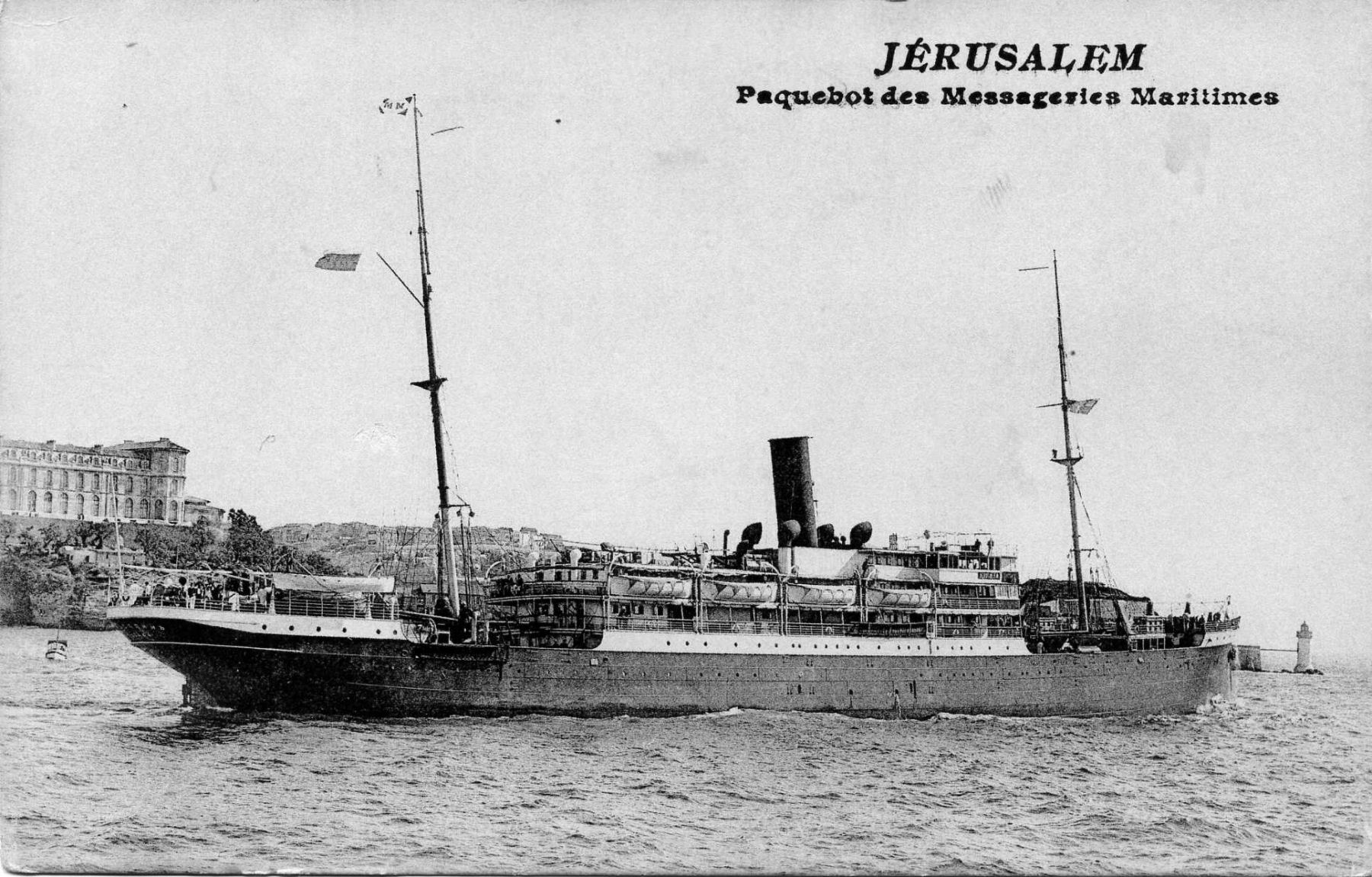
The Jerusalem, a commercial and passenger steamship from the Compagnie Russe de Navigation. This is the ship that takes 'Abdu'l-Bahá from Alexandria to Port Said on November 8, 1913, as He slowly makes His way back to the Holy Land. (Source)
After three months of living in Ramleh, ‘Abdu’l-Bahá suddenly surrenders the house He has been renting, and Áqá Khusraw, assisted by members of the Holy Family, frantically pack for the move to Alexandria. By noon, 'Abdu'l-Bahá has packed His own belongings and given leave to every single pilgrim, sending some on missions to Turkmenistan. In the afternoon, He visits Mírzá Abu’l-Faḍl', then moves His Family and His attendants to the Hotel Victoria in Alexandria. The time 'Abdu'l-Bahá spends in Alexandria is mostly spent answering the large volume of daily correspondence He receives, regularly visiting Abu’l-Faḍl' in nearby Ramleh, a suburb of Alexandria, entertaining visitors, most of whom are Western, reading and writing, taking long walks in beautiful rose gardens, among other places, and deep prayer and meditation. On November 4, 'Abdu'l-Bahá sends His assistants to enquire about the schedule of steamers departing for Port Said "within the next few days" as He "desire s to take a short trip on the sea and at the same time meet a number of pilgrims gathered there." It is obvious that 'Abdu'l-Bahá is keeping a schedule that cannot be predicted by anyone, and He never discloses His immediate travel plans, especially not to assistants who are busy writing letters every day that are dispatched to thousands of Bahá'ís around the world. By November 5, Mírzá Ahmad Sohrab is under the impression He is running errands for 'Abdu'l-Bahá alone, accompanied with one person, to leave for Port Said. Everyone is still wondering where 'Abdu'l-Bahá will winter this year. On November 8, 'Abdu'l-Bahá sails aboard the Jerusalem, in the late evening, bound for Port Said, and accompanied only by Mírzá Ahmad Sohrab. Pacing the deck before departure, 'Abdu'l-Bahá tells Sohrab "I feel always much better on the sea."
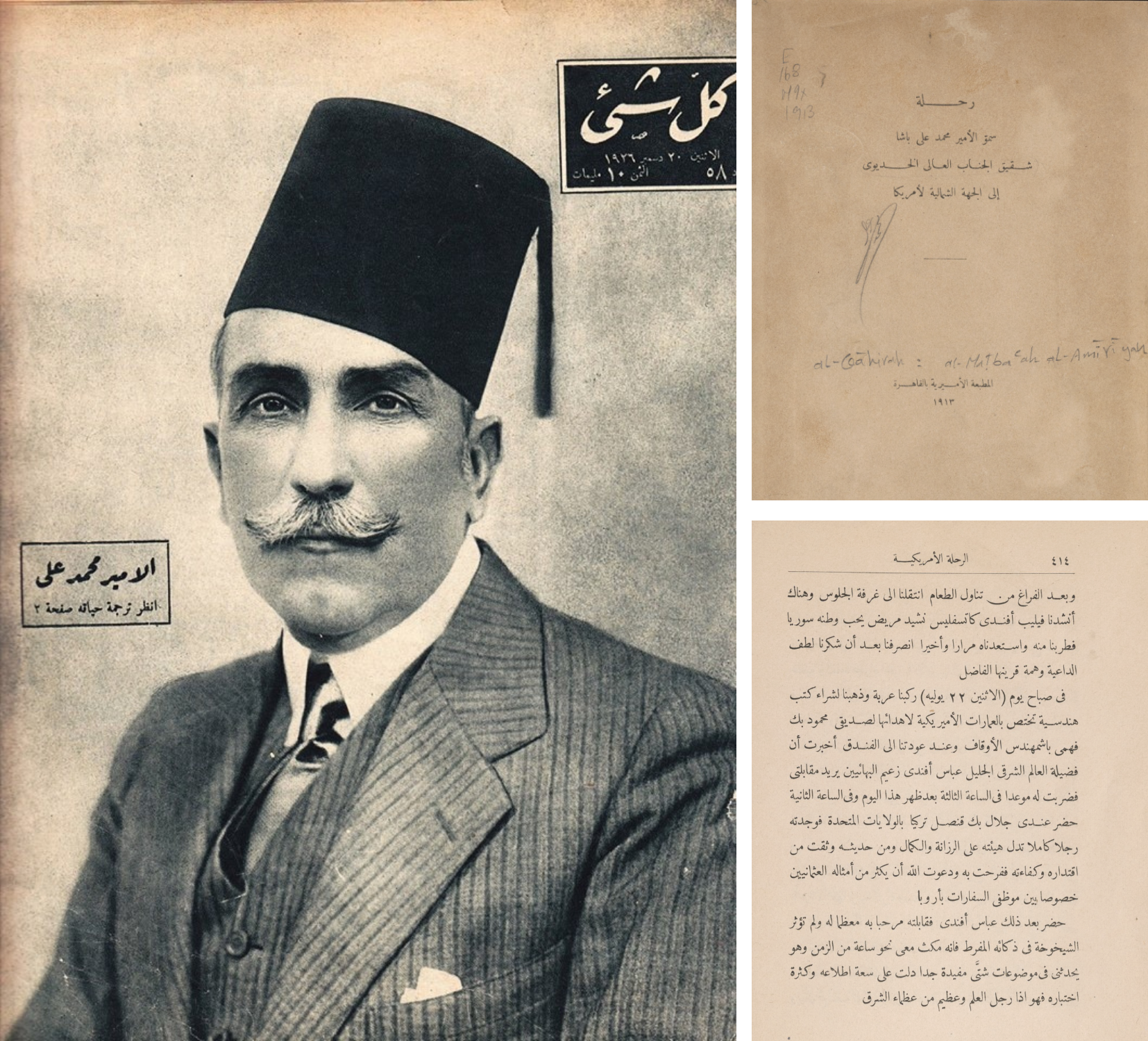
Left: Prince Muḥammad-‘Alí (Mohammed Ali Tewfik), the brother of the Khedive of Egypt. This photograph is the cover of the magazine Kulli Shay’ wa'l-‘Álam ("All Things and the World") issue no. 58, dated Monday, 20 December 1926. Source. Top Right: Title page of Mohammed Ali Tewfik's 1914 travel memoir entitled "Journey of His Royal Highness Prince Muhammad Ali, Brother of His Sublime Eminence The Khedive, To The Northern Regions of America." , in which he relates meeting ‘Abdu'l-Bahá in New York in 1912. A bona fide globe-trotter and prolific writer, the Prince wrote several travel memoirs during his life. Bottom Right: Page 414, where the Prince begins his account of meeting ‘Abdu'l-Bahá, starting on the second paragraph of this page and continuing to page 415. With many thanks to Adib Masumian for finding the PDF of the book online, and Gamal Hassan for translating the title and locating the start of the account.
Prince Muḥammad-‘Alí, the brother of the Khedive of Egypt has just published a 424-page book in Arabic about his western travels in 1912 in the United States and Canada and Mírzá Ahmad Sohrab is reading it today. In it, on page 414, the Prince writes about His encounter with 'Abdu'l-Bahá in New York City on July 22, 1912. The respect and affection he feels for 'Abdu'l-Bahá is palpable through his vivid pen portrait of the meeting:
On the morning of Monday July 22nd we rode in a carriage and went out to buy some architectural books dealing with the American school of Architecture in order to present them to Maḥmúd Bay Fahmy (Mahmoud Fahmy) the head architect of Waqf*. On our return to the hotel they announced to me that the learned and erudite, the glorious oriental, ‘Abbásds [‘Abdu'l-Bahá] , the leader of the Bahá’ís, desire to pay me a visit. I appointed the hour of 3 in the afternoon of this day. At 2 o'clock came to me Jalál Bay, the Turkish Consul to the United States. I found him a perfect gentleman. On his face I observed dignity and virtue and through His talk I detected his power and ability. I was delighted with him and begged of God to increase the number of such Turkish officials especially in the European countries. Afterward ‘Abbás Effendi arrived. I arose and welcomed Him. His presence imparted to me exceeding joy and I revered Him accordingly. His marvelous intelligence is not in the least by the old age. He stayed with me for more than one hour and spoke to me on sundry subjects which were most instructive and indicated faintly the vast range of His knowledge and the unlimited variety of His information. Lo! And behold He is a wise man, great and the greatest man of the orient! After the departure of the glorious personage we got an automobile.
(...) As regards to his innumerable addresses. They were effective in the hearts. Verily these addresses started a great intellectual revolution in America and at this very moment they are quoted in the newspapers and magazines and made the storm-center of a great discussion. Around these addresses the opinions of their learned men of religion revolve. His influence and power has reached to such a degree that the envious indeed envy him. I stayed with him for a long time. I spoke to him and he spoke with me. The charm of his words enthralled me. Then I departed from His presence. Forever I do preserve in my heart His love and honor.
Ahmad Sohrab, Letters From Egypt, 2 November 1913
This same day, two Ottoman members of Parliament from Syria, old friends of 'Abdu'l-Bahá, send word to the Master they are in Alexandria, and receive a very long visit from 'Abdu'l-Bahá who returns to the hotel in their company, and speaks with them two more hours.
* Waqf is the Arabic word for endowment. Waqf is an inalienable charitable endowment under Islamic law which involves donating a building, plot of land or other assets for Muslim religious or charitable purposes with no intention of reclaiming the assets. The Egyptian Waqf Department was a government institution at the time of 'Abdu’l-Bahá' which owned a substantial real estate patrimony and had the mission to develop it through renovations and construction. Mahmoud Fahmi was appointed Chief Architect at the Waqf Department, and became one of the leading architects of his generation.
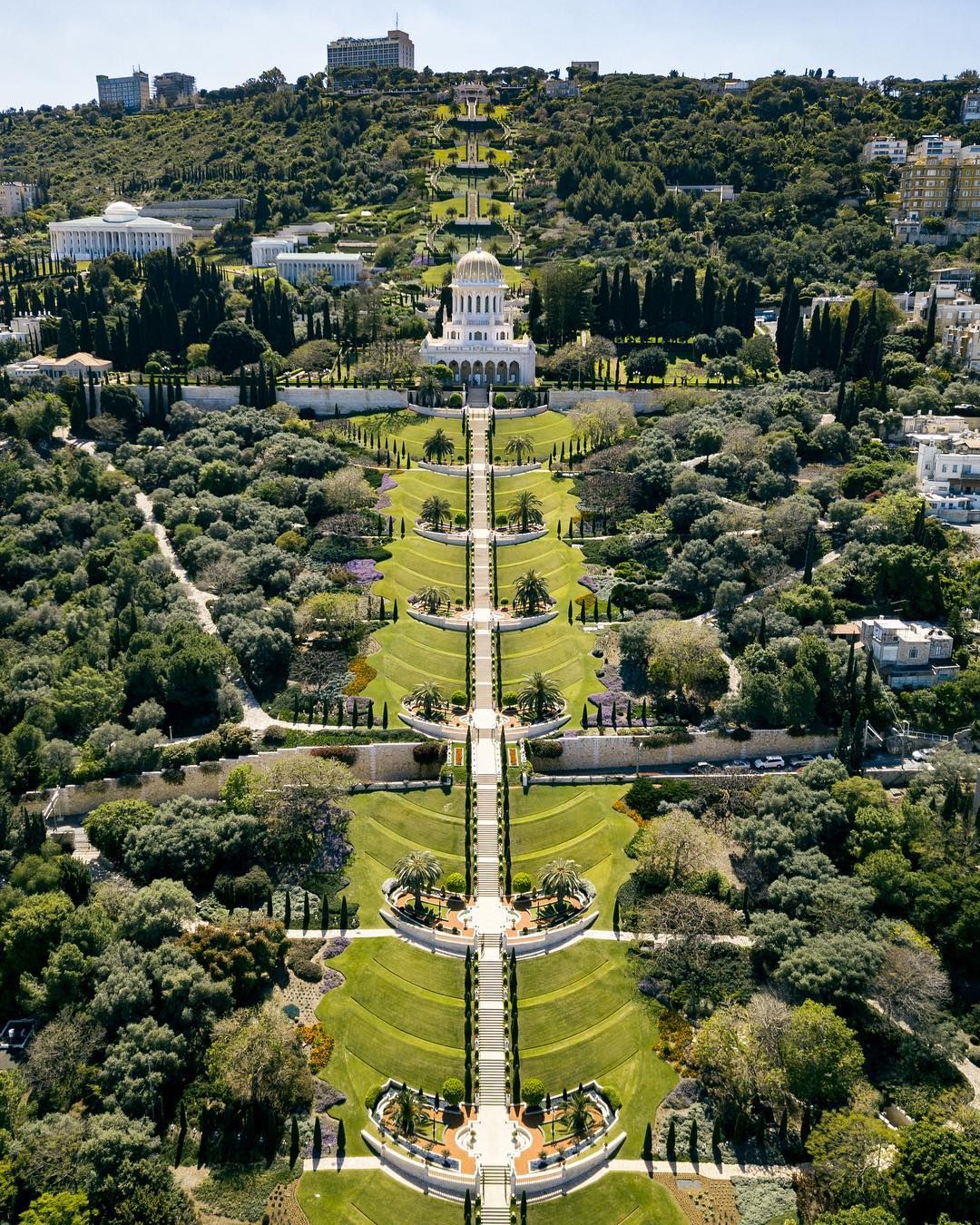
Speaking to Mírzá Ahmad Sohrab, His eyes shut in a moment of contemplation, 'Abdu'l-Bahá says:
How fervently I long to go to Mount Carmel,the Garden of the Lord! How inspiring is the matchless panorama spread before one's vision! How quiet and spiritual is its very atmosphere! This is the best season of Mount Carmel. Those who have seen the sweeping, heavenly scene spread before their eyes from the Tomb of the Báb cannot forget it throughout all their lives. In the future there will be seven beautiful terraced gardens from' the base of the Mountain up to the Holy Tomb. Then the scene will be most ravishing and unexcelled in the whole world. The Mountain covered with fragrant flowers, the bright sun shining upon it with its vital, life-giving rays, the educational and charitable institutions springing up here and there, the spiritual inheritance coming down from an age of the Prophets and going back to an era of the Patriarchs and the sacred stories and blessed traditions woven about every spot — will make this place most cherished and beloved by all mankind.
Mírzá Ahmad Sohrab, Letters from Egypt, 11 November 1913
This is not the first or the last time that 'Abdu'l-Bahá will give a stunning premonitory vision of the terraces on Mount Carmel in their completed glory. This is also not the most detailed vision 'Abdu'l-Bahá will share of the terraces, gardens, adjoining buildings, and superstructure of the Shrine of the Báb. But this vision, at this moment is truly a perfect illustration of what has just happened in the history of the Faith. As we know, the garden terraces of the Shrine of the Báb were characterized by Shoghi Effendi as "the Pathway of the Kings and Rulers of the World." On the momentous occasion of their completion, on May 24, 2011, the Universal House of Justice will have these extraordinary words:
The majestic buildings that now stand along the Arc traced for them by Shoghi Effendi on the slope of the Mountain of God, together with the magnificent flight of garden terraces that embrace the Shrine of the Báb, are an outward expression of the immense power animating the Cause we serve. They offer timeless witness to the fact that the followers of Bahá’u’lláh have successfully laid the foundations of a worldwide community transcending all differences that divide the human race, and have brought into existence the principal institutions of a unique and unassailable Administrative Order that shapes this community’s life. In the transformation that has taken place on Mount Carmel, the Bahá’í Cause emerges as a visible and compelling reality on the global stage, as the focal center of forces that will, in God’s good time, bring about the reconstruction of society, and as a mystic source of spiritual renewal for all who turn to it.
When 'Abdu'l-Bahá shares His vision of the terraces on Mount Carmel in November 1913, 88 years before this vision becomes reality, He has, Himself, completed a herculean feat that has also served as a witness of the "outward expression of the immense power animating the Cause." He has laid the foundations of the Administrative Order in nine countries on three continents. He has unceasingly proclaimed the Faith of Bahá'u'lláh in conferences, meetings, informal gatherings, overflowing churches, auditoriums, apartments, Mosque gardens, Jewish Temples, and Friends' Meeting Houses. His presence everywhere has been chronicled with almost-daily newspaper coverage for three years. In effect, 'Abdu'l-Bahá singlehandedly enabled the "Bahá'í Cause [to emerge] as a visible and compelling reality on the global stage," and in this sense, it is nothing short of perfect that at the conclusion of this historic Journey, the vision He should share with His close friends is that of the terraces, which in less than nine decades will be the physical expression of the results of His labors, the fruit yielded from the trees that grew out of those seeds He sowed so patiently and so liberally in such fertile grounds during His Western Journeys.
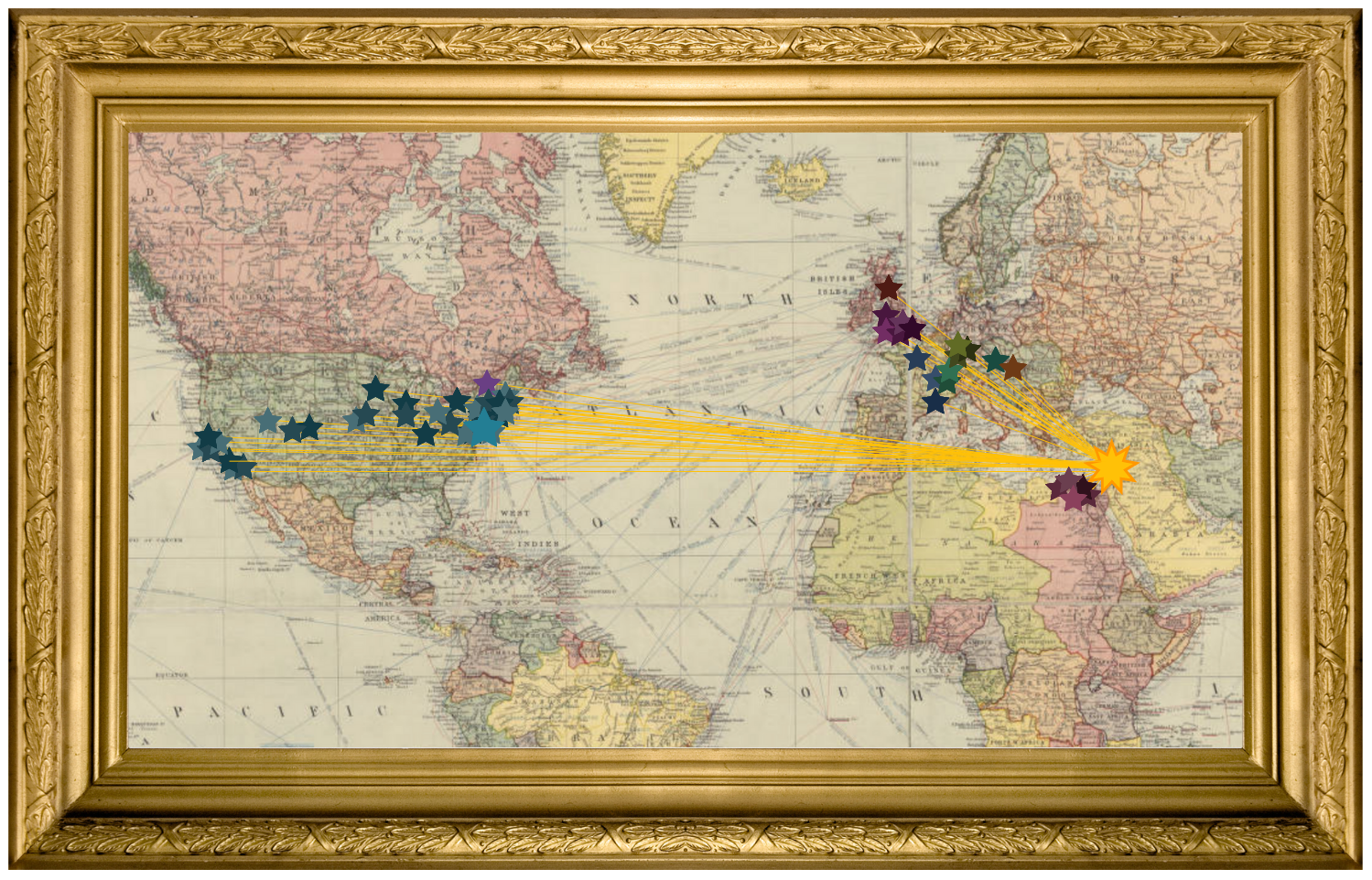
Artistic graphic rendering of 'Abdu'l-Bahá's Journeys to the West based on the Master's comment to Ahmad Sohrab "’What relation exists between 'Akká and Oxford?’ This is no other save through the Power of God." Original graphic by Violetta Zein. Base map: 1913 Trade & industrial map of the world on Mercator's projection from University of Wisconsin Milwaukee.
Two days before suddenly leaving Port Said, 'Abdu'l-Bahá receives a letter from Professor T.K. Cheyne in Oxford. 'Abdu'l-Bahá spent a memorable day with Dr. Cheyne and his admirable wife in Oxford, on December 31, 1912, almost a year ago. After dictating a detailed response to Dr. Cheyne, 'Abdu'l-Bahá tells Ahmard Sohrab a story which encapsulates the spiritual potency of the Master's recently-concluded Journeys to the West:
Pray that God may brighten his lamp day by day, cause His kingdom to be established in the hearts, and the rays of the Sun of Truth may shine forth with greater brilliancy. Consider where is the prison of 'Akká and the University of Oxford! Through what power the Cause has become so well known in that stronghold of learning and erudition! Onoe Áqá Riḍá was making confectionery in Adrianople, and had a small store. He had made a sort of Persian bonbon. A Turk passed by the store, and his eyes were attracted by this kind of candy. "What is this?" he asked.' ’It is Nuql." With what materials hast thou made this?" "With sugar and cinnamon." The Turk wondered for a while, and said: "Thou art telling a lie. There is no relationship between sugar and cinnamon." Now we might just as well ask; "What relation exists between 'Akká and Oxford?" This is no other save through the Power of God. Professor Cheyne demonstrated to us the utmost kindness and invited us to lunch at his sweet home. He is a great author, and has written many volumes. Praise be to God that the Divine fragrances are being wafted in all parts. Just at this time I wrote a letter to the islands of Hawaii (Honolulu). These are situated in the Pacific Ocean. Few of the Persians have even heard their names, yet the Cause of God has conquered those remote parts.
Mírzá Ahmad Sohrab, Letters from Egypt, 15 November 1913
The graphic above is meant to be an artistic illustration of 'Abdu'l-Bahá's words above: in a spiritual sense, we can see the Center of the Covenant spreading the Divine fragrances to every part of the world where He set His foot during His three-year journey, because no matter where 'Abdu'l-Bahá was in the world, He was profoundly tethered to the Shrine of Bahá'u'lláh's at Bahjí.
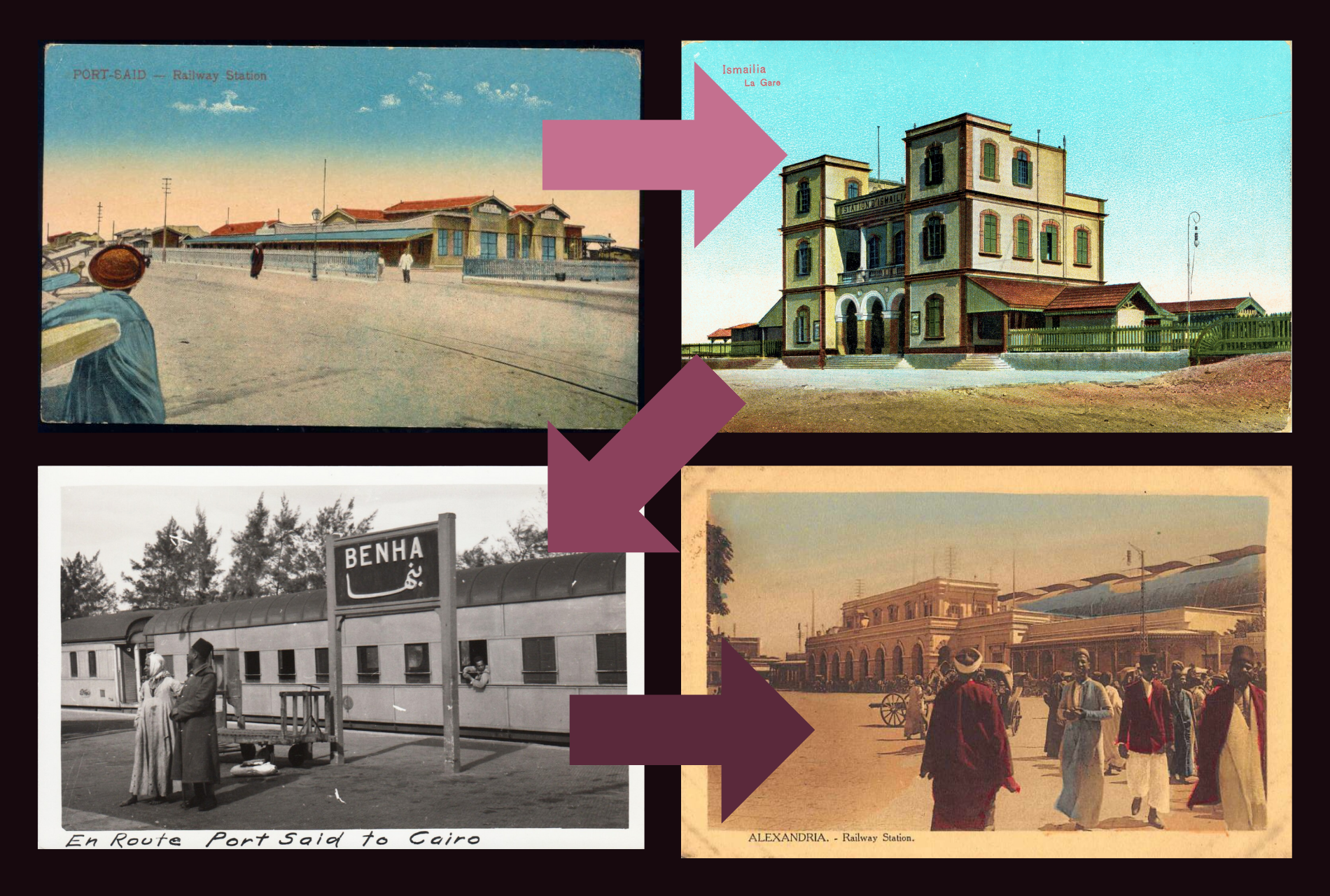
'Abdu'l-Bahá's train journey on November 17, 1913: He leaves Port Said train station at 1:00 in the afternoon, and travels about 80 kilometers directly south to Ismailia, then on the same train, east for about 100 kilometers to Benha. Here, 'Abdu'l-Bahá changes trains, and travels about 200 kilometers northeast to Alexandria, His final destination, where He arrives at 7:30 in the evening, after a journey of six and a half hours.
On November 16, 1913, with no forewarning in the days preceding, 'Abdu'l-Bahá decides to leave Port Said for Alexandria by train the next day. The only event out of the ordinary that happens over the course of the preceding days is the news of the death of Áqá ‘Alí-Akbar, an eminent Bahá'í who passes away in Ramleh on November 15. Upon receiving this news that evening, 'Abdu'l-Bahá immediately dispatches Mírzá Hádi and Mírzá Ḥusáyn to console the family and convey His condolences. After bidding the pilgrims farewell, ‘Abdu'l-Bahá gives Lua Getsinger last-minute advice for her forthcoming teaching trip to India, as she is leaving this same afternoon.
On November 17, as they are arriving at the train station, bound for Alexandria, eight minutes before the train's departure, 'Abdu'l-Bahá realizes His attendants forgot to bring a package of newly-arrived letters. Áqá Khusraw, running at full speed, retrieves the letters and returns to the station with the prized package and a large bouquet of roses! During the trip, Ahmad Sohrab approaches the Master who is watching the sunset intently. After a few minutes, He turns to Sohrab and says: "Have you ever seen such a wonderful sunset in all America and Europe? This is indeed a very divine sunset. The clouds look so much like the white waves of the sea at the time of a tempest. These are heavenly waves, the waves of the upper ocean." After a six hour journey, they arrive in Alexandria at 7:30 in the evening, and hire a carriage to the Hotel Victoria, where 'Abdu'l-Bahá books His usual room, number 26.

‘Abdu'l-Bahá writing at His home at No.7 Haparsim Street in Haifa, date unknown. There are no photographs of ‘Abdu'l-Bahá in Egypt, but ‘Abdu'l-Bahá in this photograph is seated in a garden, which is where He is in the vignette below. (source)
Ahmad Sohrab walks over to 'Abdu'l-Bahá's hotel in the morning and finds the Master sitting by a window in the center of the corridor, gazing at the green garden below. 'Abdu'l-Bahá bids him to be seated and asks Áqá Khusraw to bring him a cup of tea. 'Abdu'l-Bahá is chanting to Himself, quietly, and Ahmad Sohrab recognizes on the Master's face the relaxed expression indicative of a good night's sleep, something rare for the Master, who generally sleeps less than 3-4 hours a night. After some time, 'Abdu'l-Bahá speaks to Sohrab about sleep and insomnia around a few delightful vignettes:
Last night I slept five hours. I passed a cheerful night. One of the greatest gifts in the world of humanity is sleep. Those who have been and are afflicted with insomnia appreciate this fact. If you put all the bounties of God in one scale, and sleep in another, the latter will outweigh the rest. A person who does not sleep all night and rolls in his bed from right to left knows what I mean. If a person lives in a prison and has only a loaf of bread, but sleeps, he is better off than a king who has at his disposal all the luxuries and lives in a palace but does not sleep. Once I called on a patient. He was suffering from insomnia beside his other troubles.
He told me with a haggard and hollow-eyed expression of utter weariness: "I wish to God I could sleep one hour then open my eyes to feel its restoring effect, then die peacefully." God answered his prayer. He slept for one hour, after which he opened his eyes, looked around with an air of utter relief and then passed beyond the Borderland. How refreshing would it be if one could go to bed at 10 o’clock and then open his eyes to be 6 or 7 in the morning! When I arose last night it was 4 a. m. I could not believe that I had slept so much, then I went to the window and opened the shutters. By the position of the different stars, I realized that it was the right time. Then I became very pleased, and that is why this morning I feel the joy of living and breathe the fresh air with a new delight. When I was young, I was busy all day and often till midnight there were callers to be entertained. When the last of them left the house, I felt so drowsy that while I was going up the steps I was asleep. It was very strange that while walking I had all the sensation of sleeping. Before I reached my bed I was sound asleep and then I dropped on it just with my clothes on. Many a morning, the family wanted to wake me up, but the Blessed Perfection would not let them, saying that "He came in very late last night. Let him sleep. He will wake himself.
Mírzá Ahmad Sohrab, Letters from Egypt, 21 November 1913
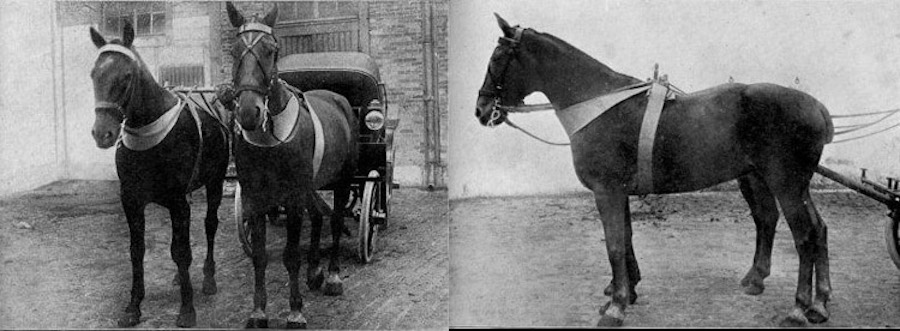
A two-horse-drawn carriage. (source)
After a very long and tiring day all over Ramleh on foot, 'Abdu'l-Bahá is tired of walking and asks Ahmad Sohrab to fetch a horse-drawn carriage to return to the hotel. Evidently, between the road and where ‘Abdu'l-Bahá is located, there is a patch of sand, which is evidently more difficult for horses to navigate than the firm beaten road. 'Abdu'l-Bahá, seeing the driver treat his horses unkindly as he conducts the carriage towards Him, severely reprimands the man: "Don’t let them walk through the soft sands while there is a beaten road. You must be very kind and humane to the animals. They are created by God." Realizing that the driver has already brought the horses to Him in the middle of this difficult-to-navigate sandy area, 'Abdu'l-Bahá alights from the carriage and asks Sohrab to follow suit, giving an immediate practical application to His admonitions to the carriage driver. ‘Abdu'l-Bahá's lesson by example deeply affects the driver, who tells Ahmad Sohrab that he has never, in his entire career, seen a man more thoughtful towards his animals than 'Abdu'l-Bahá has been. None of his customers would have alighted from the carriage to lighten the weight for the animals. Having reached the paved road, 'Abdu'l-Bahá and Sohrab climb back into the carriage to their destination.
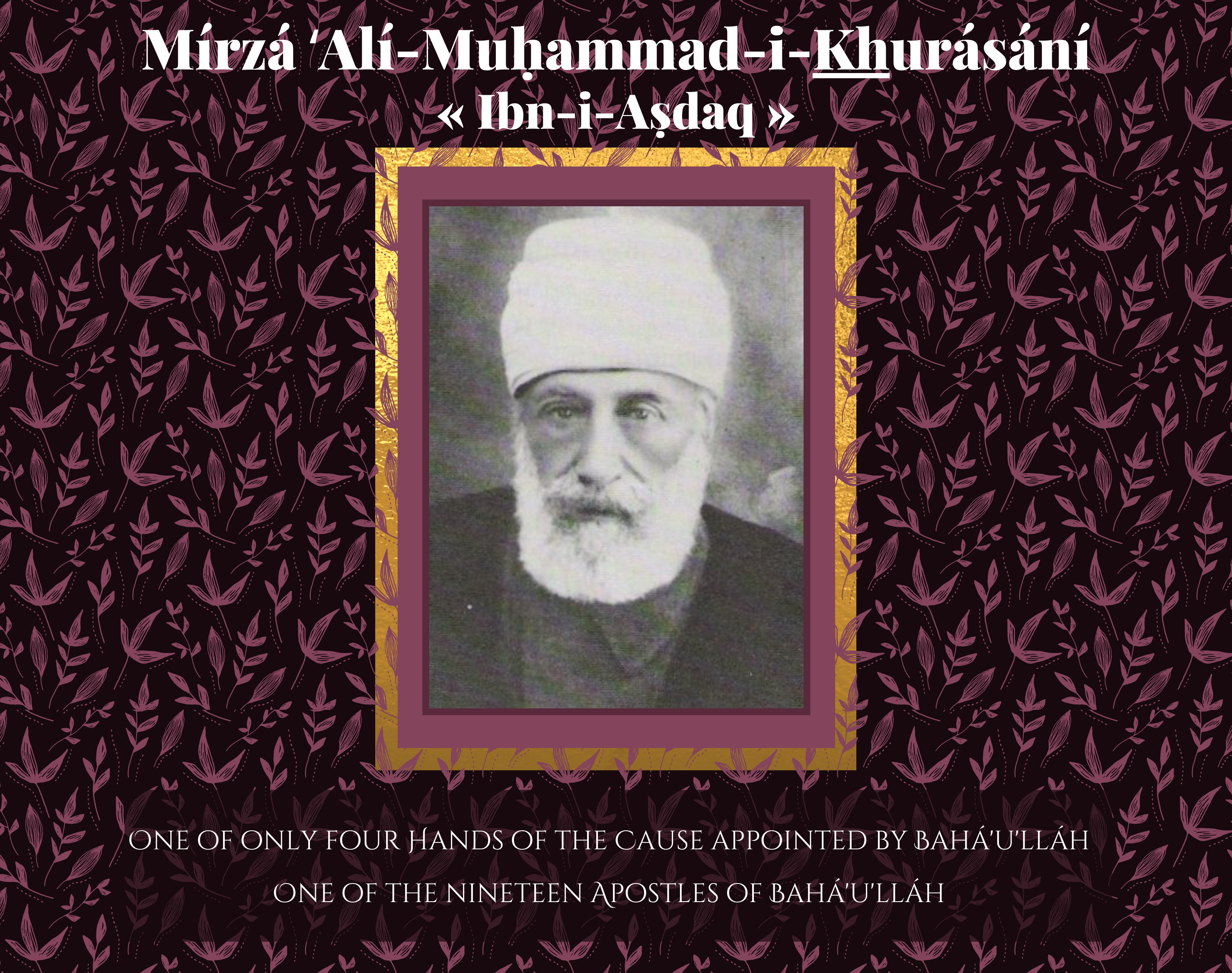
At 7:30 in the evening November 25, 1913, Mírzá Ahmad Sohrab and his companions joyfully welcome the new pilgrims arriving at the train station. Arriving from Persia via the Holy Land is one of the most eminent Bahá'ís of His time, Mírzá ʻAlí-Muḥammad-i-Khurásání, more commonly known as Ibn-i-Aṣdaq. Later, Shoghi Effendi will name him one of the nineteen Apostles of Bahá'u'lláh. He is one of the four Hands of the Cause Bahá'u'lláh appointed during His lifetime. At thirteen, Ibn-i-Aṣdaq and his father were imprisoned for two years in the Siyáh-Chál. Ibn-i-Aṣdaq became one of the foremost teachers of the Faith in Persia and 'Abdu'l-Bahá often addressed him in Tablets as Shahíd Ibn-i-Shahíd (Martyr, son of Martyr). While in Ṭihrán, Ibn-i-Aṣdaq receives a telegram from 'Abdu'l-Bahá inviting him to come on pilgrimage to the Holy Land. Accordingly, he leaves with his wife, daughters, and a servant. They arrive in Haifa on November 12, 1913, and stay in the Master's for about ten days until Ibn-i-Aṣdaq is summoned to Alexandria. In her memoirs, one of Ibn-i-Aṣdaq's daughters, Rúhá, recounts that before he left, Ibn-i-Aṣdaq spent an hour in conversation with the Greatest Holy Leaf. No one in the family knew what this confidential conversation.
On November 26, 1913, Ibn-i-Aṣdaq is greeted by 'Abdu'l-Bahá. Ahmad Sohrab does not mention anything in his diary about what follows, but, in her pilgrimage memoirs, Rúhá Aṣdaq recounts her father's recollections of his voyage to Ramleh. The Hand of the Cause had come to Egypt bearing a message directly from the Greatest Holy Leaf, asking 'Abdu'l-Bahá to return sooner to Haifa in order to allay the anxious hearts of the pilgrims and the members of the Holy Household. Ibn-i-Aṣdaq recalls that upon hearing this, 'Abdu'l-Bahá smiles and says: "How clever her ruse.’ When Ibn-i-Asdaq returns to Haifa, he comes bearing glad tidings: ‘Abdu’l-Bahá is coming home soon. Hearing this, the Holy Family and the Bahá’ís in Haifa immediately start preparing for 'Abdu'l-Bahá's long-awaited return, preparing His favorite foods, and organizing everything to welcome Him home with great festivity.
[Note on the timing; if Ibn-i-Aṣdaq left Alexandria at the same time as the rest of the pilgrims, on November 29, he would have arrived in Haifa on December 2, 1913, three days before 'Abdu'l-Bahá's arrival]
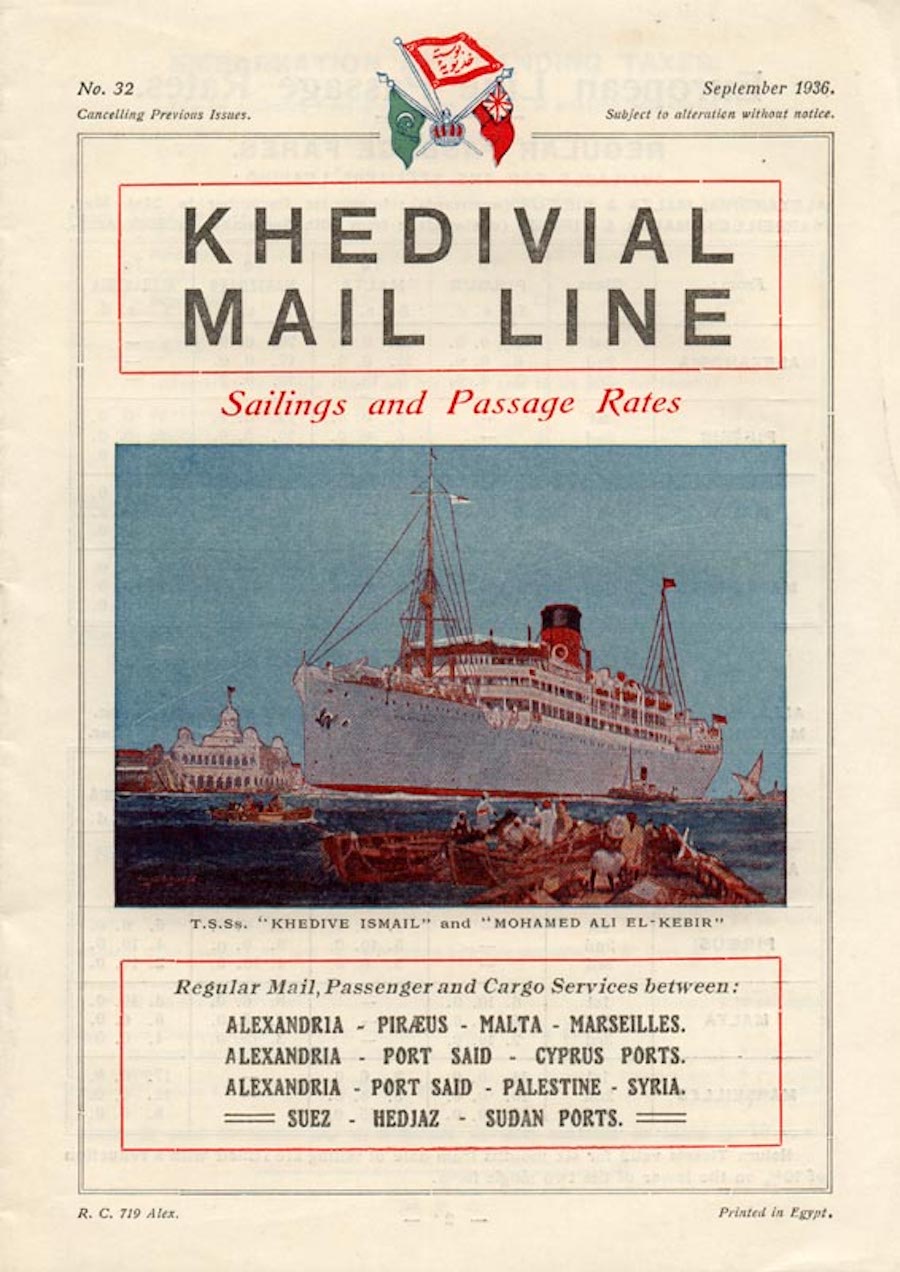
There are unfortunately no photographs of the steamer Kosseir online. The ship was torpedoed by a German submarine and sank off the coast of Alexandria on July 20, 1918. This is the front of a 1936 bulletin for the Khedivial Mail Line, the company which owned the Kosseir. (source)
On November 29, it becomes clear that there are only four individuals exempt from the order to leave: Mírzá Mahmúd-i-Zarqání, Mírzá Jalál (who had helped ‘Abdu'l-Bahá leave Haifa without warning on 27 August 1910), Mírzá Ahmad Sohrab and Áqá Khusraw. All the pilgrims come to 'Abdu'l-Bahá's hotel to bid Him farewell, as they leave for Haifa. In a strange and interesting twist of fate, they leave Alexandria for the Holy Land on the self-same Khedivial Mail Line steamer which had brought 'Abdu'l-Bahá to Port Said in early September 1910, the Kosseir.
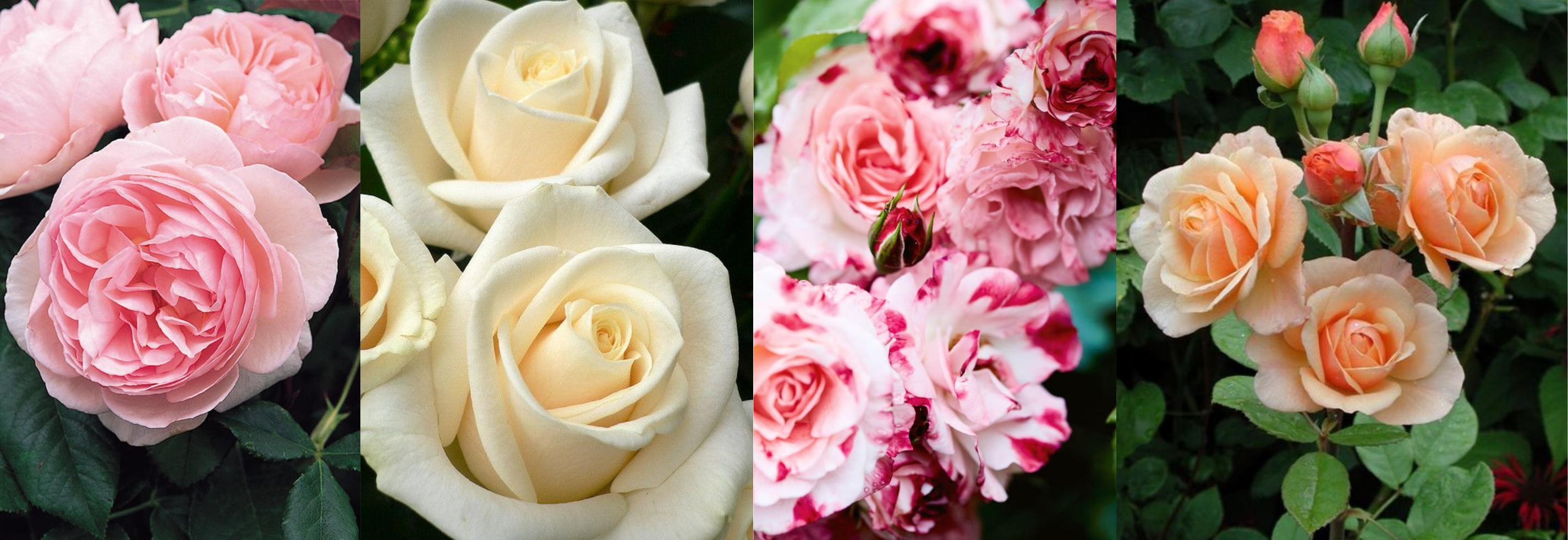
Once again, 'Abdu'l-Bahá announces a departure date to His four loyal companions with no forewarning. On December 1, 1913, the Master informs His attendants that they are to leave Alexandria the next day, bound, at long last, for the Holy Land after a three-year absence. As the pilgrims carrying news of 'Abdu'l-Bahá's arrival have not yet arrived in Haifa, no one knows 'Abdu'l-Bahá is coming, just as no one knew He was leaving when 'Abdu'l-Bahá stepped onto the SS Kosseir on August 27, 1910.
Ahmad Sohrab discovers the momentous news of their imminent departure when he arrives unusually early at the hotel and overhears 'Abdu'l-Bahá speaking to Mírzá Jalál: "I am better. Tomorrow we must depart for Haifa, the time has arrived. Now prepare the tea." Turning to Sohrab, 'Abdu'l-Bahá continues: "You have also come. I slept last night quite well, and I am up so early to start on my work." Later, commenting on Sohrab's voluminous diary on His every day talks and actions, 'Abdu'l-Bahá says "These days I do very little compared with those days of our American trip. But now we will go to the Holy Land and see what can be done." Mírzá Jalál heads into Alexandria to purchase the steamer tickets for 'Abdu'l-Bahá and His four companions for the next day. 'Abdu'l-Bahá spends a quiet hour in a rose garden in Ramleh, dispensing alms to the needy who approach Him. While He is there, 'Abdu'l-Bahá asks Ibrahim Abad, the gardener, to prepare four rose bushes for Him to bring back to the Holy Land and plant in the garden at Bahjí. Half an hour after returning to his hotel, 'Abdu'l-Bahá has a lengthy conversation about criminology and crime-prevention with a lawyer. He tells the man "the legislators must become prompted by a sense of moral rectitude, the lawyers must be inspired by the spirit of righteousness, the judges must have the fear of God and the representatives of the people voice vigorously the public opinion against the dens of shame and moral squalor. First they must clear their own houses, then start to clean the houses of the people."
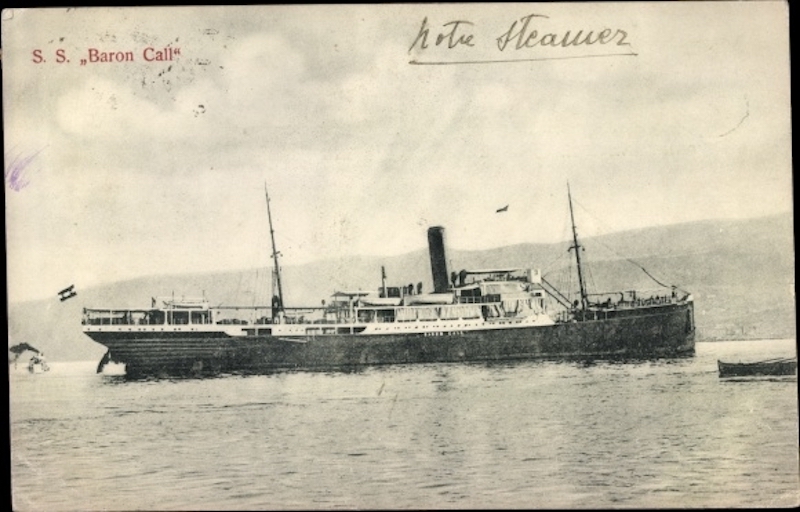
The steamer Baron Call of the Austrian Lloyd shipping company, the steamer that takes 'Abdu'l-Bahá back to the Holy Land after a 1,194-day absence. (source)
'Abdu'l-Bahá, for at least the twelfth time in three years, is again pacing on the deck of a steamer. Today, however, is different. Today, ‘Abdu’l-Bahá is pacing on the deck of the ship that is taking Him home to His wife, Munírih Khánum and the rest of His Family, whom He has not seen in three years, with the exception of the Greatest Holy Leaf, Shoghi Effendi and His third daughter Rúḥá Khánum. The Baron Call drops anchor at Port Said the next morning, December, 3, 1913, then heads northeast towards Palestine. And so closes the most momentous chapter in 'Abdu'l-Bahá's life, dubbed by Shoghi Effendi "the most outstanding achievement that will forever be associated with ‘Abdu’l‑Bahá’s ministry." In its place, a new chapter opens: 'Abdu'l-Bahá is on His way to Haifa where He arrives exactly 235 days before the First World War erupts, less than the amount of time the Master spent in America.
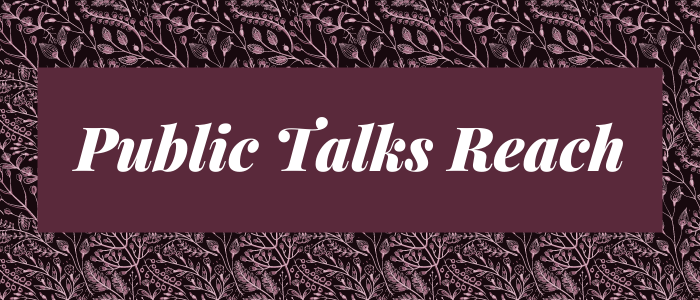
Bahá'í historian Earl Redman devised a cursory, and by his account, probably low, estimate of the impact of 'Abdu'l-Bahá's visit: the Master gave 495 public talks in 9 countries (counting Scotland) in 96 cities and towns, to an estimated total audience of 110,000 people. It is impossible to estimate how many people heard ‘Abdu'l-Bahá speak during His near-daily morning and/or afternoon talks, and private/group interviews/firesides in the nine countries He visited, but another Bahá'í Historian, Amín Egea, estimates that this number could easily reach into the tens of thousands, even accounting for repeat visitors. Some of these afternoon talks ranged from 10-15 in Paris to 200 in London and New York. They were also not held every day, for example, there were no daily talks on the days when a large public talk was scheduled. Combining Earl Redman and Amín Egea's estimates, we can estimate that during His three-year journeys, more than 120,000 people saw ‘Abdu'l-Bahá and heard Him speak.
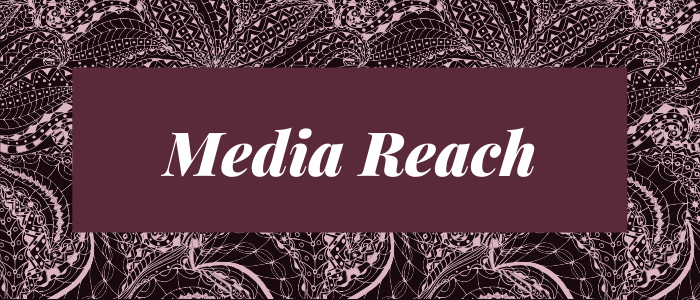
In terms of the media reach of ‘Abdu'l-Bahá's Journeys the West, we have another rough estimate, this time by Bahá’í historian Amín Egea. Dr. Egea is the author of the definitive References to Abdu’l-Baha in the Western press, Apostle of Peace Volume I (1871-1911) and Apostle of Peace Volume II (1912-1921), and the uncontested authority on newspaper coverage of ‘Abdu'l-Bahá. As a preliminary introduction to this section, it is important to remember that, at the time of ‘Abdu'l-Bahá's travels, there was no other media, other than newspapers: there was no radio, and there was no television. Newspapers, journals and magazines, in short, printed publications were the only form of media.
In his extensive research, he has catalogued 1,700 newspaper, journal and publication articles about ‘Abdu'l-Bahá during His Journeys to the West. These 1,700 articles published during ‘Abdu'l-Bahá's journey were published in 800 newspapers. In terms of actual reach, Dr. Egea makes a distinction between newspaper circulation and newspaper readership. The newspaper circulation for these 1,700 articles in 800 newspapers is 22,122,971, and this data is only partial, as circulation numbers were obtained for only 80% of the papers. However, as Dr. Egea points out, newspaper circulation numbers do not give the full picture: not all the newspapers printed were sold, not all the newspapers that were sold were read, and some newspapers were read by not one but five people. In some households, according to Dr. Egea's research on media history, a single newspaper, in the United States in 1912, could have been read by an average of 3-5 people, and he therefore believes that an estimated readership figure for these 1,700 articles of 28,000,000 gives a more accurate picture of the media reach of ‘Abdu'l-Bahá's Journeys to the West than circulation numbers.
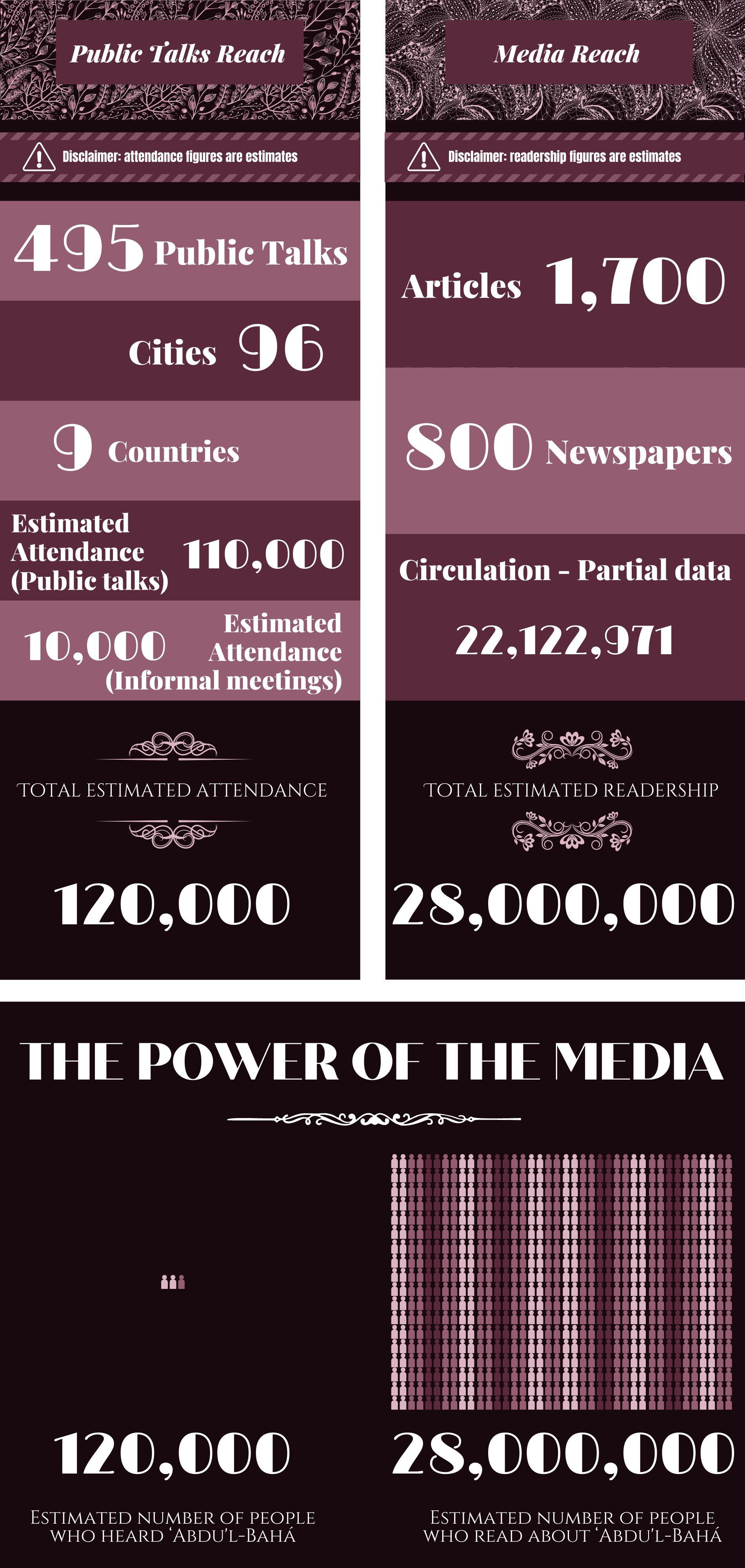
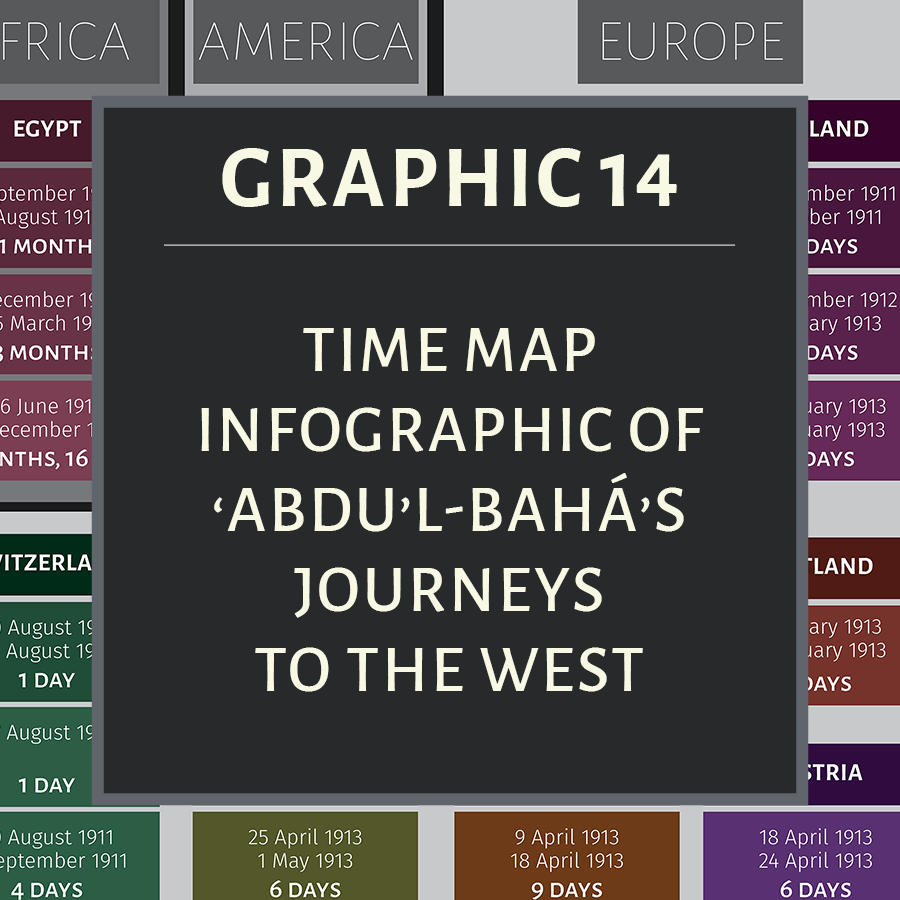
Time map infographic of each stay by ‘Abdu’l-Bahá in the ten countries ‘Abdu’l-Bahá visited during His Journeys to the West. Each stay is indicated by dates which correspond to the Timeline of His Journeys and have been gleaned over several months from Tablets, letters from the House of Justice, books, articles, pilgrim notes, footnotes, passing mentions and chronologies too numerous to cite or mention. This website was used in calculating duration between dates. A map of the total amount of time spent by ‘Abdu’l-Bahá in each country is available here. Original graphic by Violetta Zein.
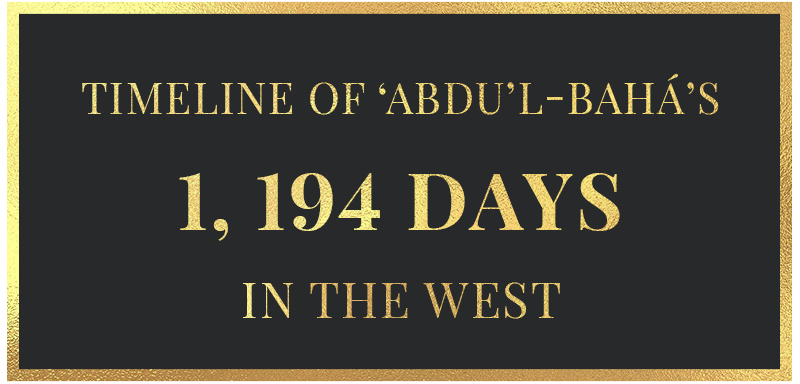
29 August 1910: ‘Abdu'l-Bahá Departs for His Journeys to the West
1 September 1910 (est) - 1 October 1910: Port Said
The date of 1 september 1910 is, we believe a very exact estimate of the date of the arrival of 'Abdu'l-Bahá in Egypt. From a letter of the Universal House of Justice dated 29 August 2010, we know that Abdu’l-Bahá leaves Haifa on 29 August 1910, The steamer journey takes two full days from Haifa to Port Said not counting departure and arrival days, so that would put 'Abdu'l-Bahá's arrival on September 1, 1912. which is corroborated by all the reports of His arrival in Egypt "in September," When 'Abdu'l-Bahá leaves Egypt on 2 December 1913, He arrives in Haifa on 5 December 1913, the same amount of travel time.
1 October 1910 - May 1911: Ramleh and Alexandria
Early May 1911: Cairo
11 August 1911: Alexandria
16 - 20 August 1911: Marseille
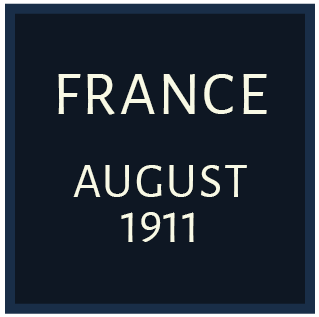
20 - 21 August 1911: Geneva, Switzerland
21 -27 August 1911: Thonon-les-bains
- 27 August 1911: 'Abdu'l-Bahá speaks about The oneness of humanity and of religions in Thonons-les-Bains
27 August 1911: Vevey, Switzerland
27 - 30 August 1911: Thonon-les-bains
30 August - 3 September 1911: Geneva
4 - 9 September 1911: London, England
- 4 September 1911: Notes of Conversations: The Arrival in London
- 5 September 1911: 'Abdu'l-Bahá is interviewed by the editor of The Christian Commonwealth, Mr Albert Dawson, and later meets with the Rev R. J. Campbell
- 8 September 1911: Discourse given at Miss E. J. Rosenberg’s Unity Meeting, in London
- 9 September 1911: The small house and the path to true happiness at the home of Alice Buckton in London
9 September 1911: Byfleet, England
- 9 September 1911: Notes of Conversations: At Byfleet
10 - 22 September: London, England
- 10 September 1911: Address given by ‘Abdu’l-Bahá at the City Temple in London
- 12 September 1911: A Heavenly Meeting: a meeting of the friends at the home of Mrs. Thornburgh-Cropper in London
- 13 September 1911: Discourse at Mrs. Thornburgh-Cropper’s, in London
- 13 September 1911: Persian-English friendship and a brief history: a meeting of the friends at the home of Mrs. Thornburgh-Cropper in London
- 14 September 1911: 'Abdu’l-Bahá sends greetings to the Theosophical Society: a meeting at the office of the Editor-in-chief of the Journal of the Freemasons and Theosophists, in London
- 17 September 1911: Discourse of ‘Abdu’l-Bahá at St. John’s, Westminster in London
- 22 September 1911: Discourse by ‘Abdu’l-Bahá given at the Unity Meeting of Misses Jack and Herrick
23 - 25 September 1911: Bristol, England
- 23-25 September 1911: Notes on Conversations: The visit to Bristol, written by by Tudor Pole
- 23 September 1911: Some of the Experiences of His Forty Years Imprisonment (From an Interview given by ‘Abdu’l-Bahá to the Weekly Budget)
25 September - 3 October 1911: London, England
- 28 September 1911: Notes of Conversations: Spiritual Relationship
28 - 29 September 1911: Vanners, England
29 September - 3 October 1911: London, England
- 29 September 1911: Meeting of Farewell to ‘Abdu’l-Bahá. Reprinted by kind permission, from the Christian Commonwealth, in London
- 29 September 1911: A Message from ‘Abdu’l-Bahá Written for The Christian Commonwealth
- 30 September 1911: Discourse of ‘Abdu’l-Bahá given at the Theosophical Head Quarters
- 1 October 1911: Notes on Conversations: A Bahá’í Wedding, in London
- 2 October 1911: Visit to the Lord Mayor
- 3 October 1911: Eleven essentials: the Bahai principles as taught by Abdu’l-Baha in London
- 3 October 1911: The Farewell
4 October - 2 December 1911: Paris
- 5 October 1911: The Holy Spirit is the source of Life: a talk given at the home of Edith and Margaret Sanderson in Paris
- 16 & 17 October 1911: The Duty of Kindness and Sympathy towards Strangers and Foreigners
- 18 October: The Power and Value of True Thought Depend upon Its Manifestation in Action
- 19 October 1911: God Is the Great Compassionate Physician Who Alone Gives True Healing
- 20 October 1911: The Need for Union between the Peoples of the East and West
- 20 October 1911, in the evening: God Comprehends All; He Cannot Be Comprehended
- 21 October 1911: The Pitiful Causes of War, and the Duty of Everyone to Strive for Peace
- 22 October 1911: The Sun of Truth
- 23 October 1911: The Light of Truth Is Now Shining upon the East and the West
- 24 October 1911: The Universal Love
- 25 October 1911: The Imprisonment of ‘Abdu’l‑Bahá at 4, Avenue de Camoëns
- 26 October 1911: God’s Greatest Gift to Man
- 27 October 1911, in the morning: The Clouds That Obscure the Sun of Truth at 4, Avenue de Camoëns
- 27 October 1911: Religious Prejudices
- 27 October 1911: The Benefits of God to Man at 4, Avenue de Camoëns
- 28 October 1911: Beauty and Harmony in Diversity
- 30 October 1911: The True Meaning of the Prophecies Concerning the Coming of Christ
- 31 October 1911: The Holy Spirit, the Intermediary Power between God and Man at 4, Avenue de Camoëns
- 1 November 1911: The Two Natures in Man
- 2 November 1911: Material and Spiritual Progress
- 3 November 1911: The Evolution of Matter and Development of the Soul
- 4 November 1911: The Spiritual Meetings in Paris
- 5 November 1911: The Two Kinds of Light and Spiritual Aspiration in the West
- 6 November 1911: Lecture Given at a Studio in Paris
- 7 November 1911: Bahá’u’lláh
- 8 November 1911: Good Ideas Must Be Carried into Action
- 9 November 1911: The True Meaning of Baptism by Water and Fire
- 9 November 1911: Discourse at “l’Alliance Spiritualiste”, in the Salle de l’Athénée, St. Germain, Paris
- 10 November 1911: The First Principle—Search after Truth at 4, Avenue de Camoëns
- 10 November 1911: The Evolution of the Spirit
- 11 November 1911: The Second Principle—The Unity of Mankind
- 12 November 1911: The Fourth Principle—The Acceptance of the Relation between Religion and Science at 4, Avenue de Camoëns
- 13 November 1911: The Fifth Principle—The Abolition of Prejudices at 4, Avenue de Camoëns
- No date given: The Sixth Principle—Means of Existence at 4, Avenue de Camoëns
- No date given: The Seventh Principle—Equality of Men
- No date given: The Eighth Principle—Universal Peace at 4, Avenue de Camoëns
- 14 November 1911: The Tenth Principle—Equality of Sex at 4, Avenue de Camoëns
- 15 November 1911: The Desires and Prayers of ‘Abdu’l‑Bahá
- 17 November 1911, in the morning: Concerning Body, Soul and Spirit at 4, Avenue de Camoëns
- 17 November 1911: The Ninth Principle—The Noninterference of Religion with Politics at 4, Avenue de Camoëns
- 18 November 1911: The Eleventh Principle—The Power of the Holy Spirit at 4, Avenue de Camoëns
- 18 November 1911, in the evening: Involvement of the faithful in political life, and showing justice in all walks of life: in the home of Monsieur Dreyfus, Paris
- 19 November 1911: The Bahá’ís Must Work with Heart and Soul to Bring About a Better Condition in the World
- 19 November 1911: Opposition and its beneficial effects
- 20 November 1911: On Calumny
- 21 November 1911: There Can Be No True Happiness and Progress without Spirituality
- 22 November 1911: Pain and Sorrow
- 23 November 1911: The Perfect Human Sentiments and Virtues
- 23 November 1911: The Italian attack on Tripoli, and human heartlessness: a talk given at Abdu’l-Baha’s lodgings in Paris during the war between Italy and Tripoli
- 24 November 1911: The Cruel Indifference of People towards the Suffering of Foreign Races
- 25 November 1911: We Must Not Be Discouraged by the Smallness of Our Numbers
- 26 November 1911: Words Spoken by ‘Abdu’l‑Bahá in Pastor Wagner’s Church (Foyer de l’Ame) in Paris
- No date given: Talk at the Theosophical Society, Paris
- 28 November 1911: This Great and Glorious Cause at 4, Avenue de Camoëns
- 1 December 1911: The Last Meeting at 15 Rue Greuze, Paris
3 - 7 December 1911: Marseille
12 December 1911 - 25 March 1912: Alexandria and Ramleh
28 - 30 March 1912: Naples, Italy
11 - 20 April 1912: New York City
- 11 April 1912: Talk at Home of Mr. and Mrs. Edward B. Kinney - 780 West End Avenue, New York
- 12 April 1912: Talk at Home of Mr. and Mrs. Howard MacNutt - 935 Eastern Parkway, Brooklyn, New York
- 12 April 1912: Talk at Studio of Miss Phillips - 39 West Sixty-seventh Street, New York
- 13 April 1912: Talk at Home of Mr. and Mrs. Alexander Morten - 141 East Twenty-first Street, New York
- 14 April 1912: Talk at Church of the Ascension - Fifth Avenue and Tenth Street, New York
- 14 April 1912: Talk at Union Meeting of Advanced Thought Centers - Carnegie Lyceum, West Fifty-seventh Street, New York
- 15 April 1912: Talk at Home of Mountfort Mills - 327 West End Avenue, New York
- 16 April 1912: Talk at Hotel Ansonia to Bahá’í Friends of New Jersey - Broadway and Seventy-third Street, New York
- 17 April 1912: Talk at Hotel Ansonia - Broadway and Seventy-third Street, New York
- 17 April 1912: Talk at Home of Mr. and Mrs. Edward B. Kinney - (Same as above)
- 18 April 1912: Talk at Home of Mr. and Mrs. Marshall L. Emery - 273 West Ninetieth Street, New York
- 19 April 1912: Talk at Earl Hall - Columbia University, New York
- 19 April 1912: Talk at Bowery Mission - 227 Bowery, New York
20 - 28 April 1912: Washington D.C.
- 20 April 1912: Talk at Orient-Occident-Unity Conference - Public Library Hall, Washington, D.C.
- 21 April 1912: Talk at Studio Hall - 1219 Connecticut Avenue, Washington, D.C.
- 21 April 1912: Talk at Universalist Church - Thirteenth and L Streets, Washington, D.C.
- 22 April 1912: Talk at Home of Mr. and Mrs. Arthur J. Parsons - 1700 Eighteenth Street, NW, Washington, D.C.
- 23 April 1912: Talk at Howard University - Washington, D.C.
- 23 April 1912: Talk at Home of Mr. and Mrs. Arthur J. Parsons - (Same as above)
- 23 April 1912: Talk to Bethel Literary Society - Metropolitan African Methodist Episcopal Church, M Street, NW, Washington, D.C.
- 24 April 1912: Talk at Children’s Reception - Studio Hall, 1219 Connecticut Avenue, Washington, D.C.
- 24 April 1912: Talk at Home of Mr. and Mrs. Arthur J. Parsons - (Same as above)
- 24 April 1912: Talk at Home of Mrs. Andrew J. Dyer - 1937 Thirteenth Street, NW, Washington, D.C.
- 25 April 1912: Talk to Theosophical Society - Home of Mr. and Mrs. Arthur J. Parsons - (Same as above)
- 25 April 1912: Message to Esperantists - Home of Mr. and Mrs. Arthur J. Parsons - (Same as above)
- 25 April 1912: Talk at Home of Mr. and Mrs. Arthur J. Parsons - (Same as above)
29 April - 1 May 1912: Chicago, Illinois
- 30 April 1912: Talk at Public Meeting Concluding Convention of Bahá’í Temple Unity Drill Hall, Masonic Temple, Chicago, Illinois
- 30 April 1912: Talk at Hull House, Chicago, Illinois
- 30 April 1912: Talk at Fourth Annual Conference of the National Association for the Advancement of Colored People at Handel Hall, Chicago, Illinois
1 May 1912: Wilmette, Illinois
- 1 May 1912: Talk at Dedication of the Mashriqu’l-Adhkár Grounds, Wilmette, Illinois
2 - 3 May 1912: Chicago, Illinois
- 2 May 1912: Talk at Hotel Plaza in Chicago, Illinois
- 2 May 1912: Talk to Federation of Women’s Clubs at the Hotel La Salle, Chicago, Illinois
- 2 May 1912: Talk at Bahá’í Women’s Reception at the Hotel La Salle, Chicago, Illinois
- 2 May 1912: Talk at Hotel Plaza in Chicago, Illinois
- 2 May 1912: Talk at Hotel Plaza in Chicago, Illinois
- 3 May 1912: Talk at Hotel Plaza in Chicago, Illinois
- 3 May 1912: Talk at Hotel Plaza in Chicago, Illinois
4 May 1912: Evanston, Illinois
- 4 May 1912: Talk to Theosophical Society at Northwestern University Hall, Evanston, Illinois
5 May 1912: Chicago, Illinois
- 5 May 1912: Talk at Children’s Meeting at the Hotel Plaza in Chicago, Illinois
- 5 May 1912: Talk at Plymouth Congregational Church on 935 East Fiftieth Street in Chicago, Illinois
- 5 May 1912: Talk at All-Souls Church in Lincoln Center, Chicago, Illinois
6 May 1912: Cleveland, Ohio
- 6 May 1912: Talk at Euclid Hall in Cleveland, Ohio
- 6 May 1912: Talk at Sanatorium of Dr. C. M. Swingle in Cleveland, Ohio
7 May 1912: Pittsburgh, Pennsylvania
- 7 may 1912: Talk at Hotel Schenley in Pittsburgh, Pennsylvania
8 May 1912: Washington D.C.
11 May 1912: New York City
- 11 May 1912: Talk at 227 Riverside Drive, New York
12 May 1912: Montclair, New Jersey
- 12 May 1912: Talk at Unity Church in Montclair, New Jersey
12 May 1912: New York City
- 12 May 1912: Talk at Meeting of International Peace Forum at Grace Methodist Episcopal Church, West 104th Street, New York
- 13 May 1912: Talk at Reception by New York Peace Society at the Hotel Astor, New York
14 - 16 May 1912: New Paltz, New York
- 15 May 1912: The Oneness of the Reality of Humankind, address at the Lake Mohonk Conference on International Arbitration
17 - 19 May 1912: New York City
- 19 May 1912: Talk at Church of the Divine Paternity at Central Park West, New York
19 May 1912: Jersey City, New Jersey
- 19 May 1912: Talk at Brotherhood Church at Bergen and Fairview Avenues, Jersey City, New Jersey
20 May 1912: New York City
- 20 May 1912: Talk at Woman’s Suffrage Meeting at the Metropolitan Temple, Seventh Avenue and Fourteenth Street, New York
21 - 22 May 1912: Boston, Massachusetts
- 22 May 1912: Talk at the Tremont Temple at the Unitarian Conference in Boston, Massachusetts
23 May 1912: Cambridge, Massachusetts
- 23 May 1912: Talk at Home of Mr. and Mrs. Francis W. Breed at 367 Harvard Street, Cambridge, Massachusetts
23 May 1912: Worcester, Massachusetts
25 - 26 May 1912: Boston, Massachusetts
- 25 May 1912: Huntington Chambers in Boston, Massachusetts
26 - 30 May 1912: New York City
- 26 May 1912: Talk at Mount Morris Baptist Church on Fifth Avenue and 126th Street, New York
- 28 May 1912: Talk at Reception at Metropolitan Temple on Seventh Avenue and Fourteenth Street, New York
- 29 May 1912: Talk at Home of Mr. and Mrs. Edward B. Kinney at 780 West End Avenue, New York
- 30 May 1912: Talk at Theosophical Lodge on Broadway and Seventy-ninth Street, New York
31 May - 1 June 1912: Fanwood, New Jersey
- 31 may 1912: Talk at Town Hall in Fanwood, New Jersey
2 June 1912: New York City
- 2 June 1912: Talk at Church of the Ascension on Fifth Avenue and Tenth Street, New York
3 June 1912: Milford, Pennsylvania
3 June 1912: Philadelphia, Pennsylvania
5 - 8 June 1912: New York City
- 8 June 1912: Talk at 309 West Seventy-eighth Street, New York
9 June 1912: Philadelphia, Pennsylvania
- 9 June 1912: Talk at Unitarian Church on Fifteenth Street and Girard Avenue, Philadelphia, Pennsylvania
- 9 June 1912: Talk at Baptist Temple on Broad and Berks Streets, Philadelphia, Pennsylvania
10 - 20 June: New York City
- 11 June 1912: Talk at Open Committee Meeting at the home of Mr. and Mrs. Edward B. Kinney, 780 West End Avenue, New York
- 12 June 1912: Talk at 309 West Seventy-eighth Street, New York
- 15 June 1912: Talk at 309 West Seventy-eighth Street, New York
15 - 16 June 1912: Brooklyn, New York
- 16 June 1912: Talk at Fourth Unitarian Church on Beverly Road, Flatbush, Brooklyn, New York
- 16 June 1912: Talk at Home of Mr. and Mrs. Howard MacNutt at 935 Eastern Parkway, Brooklyn, New York
- 16 June 1912: Talk at Central Congregational Church on Hancock Street, Brooklyn, New York
17 - 20 June 1912: New York City
- 17 June 1912: Talk at 309 West Seventy-eighth Street, New York
- 18 June 1912: Talk at 309 West Seventy-eighth Street, New York
- 20 June 1912: Talk at 309 West Seventy-eighth Street, New York
21 – 27 June 1912: Montclair, New Jersey
- 23 June 1912: Talk at Montclair, New Jersey
28 – 29 June 1912: West Englewood, New Jersey (Now called Teaneck)
- 29 June 1912: Talk at Unity Feast, Outdoors in West Englewood, New Jersey
29 June 1912: Morristown, New Jersey
30 June – 13 July 1912: New York City
- 1 July 1912: Talk at 309 West Seventy-eighth Street, New York
- 1 July 1912: Talk at 309 West Seventy-eighth Street, New York (different talk)
- 5 July 1912: Talk at 309 West Seventy-eighth Street, New York
- 5 July 1912: Talk at 309 West Seventy-eighth Street, New York (different talk)
- 6 July 1912: Talk at 309 West Seventy-eighth Street, New York
14 July 1912: Brooklyn, New York
15 - 16 July 1912: West Englewood, New Jersey (Now called Teaneck)
16 - 22 July 1912: New York City
- 14 July 1912: Talk at All Souls Unitarian Church on Fourth Avenue and Twentieth Street, New York
- 15 July 1912: Talk at Home of Dr. and Mrs. Florian Krug at 830 Park Avenue, New York
23 – 25 July 1912: Boston, Massachusetts
- 23 July 1912: Talk at Hotel Victoria in Boston, Massachusetts
- 24 July 1912: Talk to Theosophical Society at The Kensington on Exeter and Boylston Streets, Boston, Massachusetts
- 25 July 1912: Talk at Hotel Victoria in Boston, Massachusetts
25 July – 16 August: Dublin, New Hampshire
- 5 August 1912: Talk at Dublin Inn in Dublin, New Hampshire
- 6 August 1912: Talk at Home of Mr. and Mrs. Arthur J. Parsons in Dublin, New Hampshire
16 – 23 August 1912: Green Acre in Eliot, Maine
- 16 August 1912: Talk at Green Acre in Eliot, Maine
- 17 August 1912: Talk at Green Acre in Eliot, Maine
- 17 August 1912: Talk at Green Acre in Eliot, Maine (different talk)
- 17 August 1912: Talk at Green Acre in Eliot, Maine (different talk)
- 17 August 1912: Talk at Green Acre in Eliot, Maine (different talk)
24 - 29 August 1912: Malden, Massachusetts with talks in Boston, Massachusetts
- 24 August 1912: Arrival in Malden, Massachusetts
- 25 August 1912: Talk at the New Thought Forum at the Metaphysical Club in Boston, Massachusetts
- 26 August 1912: Talk at Franklin Square House in Boston, Massachusetts
- 27 August 1912: Talk at Metaphysical Club in Boston, Massachusetts
- 29 August 1912: Talk at Home of Madame Morey at 34 Hillside Avenue, Malden, Massachusetts
30 August - 9 September 1912: Montreal
- 1 September 1912: Talk at Church of the Messiah in Montreal, Canada
- 1 September 1912: Talk at Home of Mr. and Mrs. William Sutherland Maxwell at 716 Pine Avenue West, Montreal, Canada
- 1 September 1912: Talk at Home of Mr. and Mrs. William Sutherland Maxwell (different talk)
- 2 September 1912: Talk at Home of Mr. and Mrs. William Sutherland Maxwell
- 3 September 1912: ‘Abdu’l‑Bahá’s address to Socialists and Labor leaders in Coronation Hall in Montreal, Canada
- 5 September 1912: Talk at St. James Methodist Church in Montreal, Canada
9 - 12 September 1912: Buffalo, New York
- 10 September 1912: Niagara Falls
12 - 15 September 1912: Chicago, Illinois
15 - 16 September 1912: Kenosha, Wisconsin
16 - 18 September 1912: Chicago, Illinois
- 16 September 1912: Talk at Home of Mrs. Corinne True at 5338 Kenmore Avenue, Chicago, Illinois
19 - 20 September 1912: Minneapolis, Minnesota
- 20 September 1912: Talk at Home of Mr. Albert L. Hall at 2030 Queen Avenue South, Minneapolis, Minnesota
20 September 1912: Saint Paul, Minnesota
- 20 September 1912: Talk at Home of Dr. and Mrs. Clement Woolson at 870 Laurel Avenue, St. Paul, Minnesota
21 - 22 September 1912: Omaha, Nebraska
23 September 1912: Lincoln, Nebraska
24 -27 September 1912: Denver, Colorado
- 24 September 1912: Talk at Home of Mrs. Sidney E. Roberts in Denver, Colorado
- 25 September 1912: Talk at Second Divine Science Church at 3929 West Thirty-eighth Avenue, Denver, Colorado
28 September 1912: Glenwood Springs, Colorado
29 September - 1 October 1912: Salt Lake City, Utah
3 - 7 October 1912: San Francisco, California
7 October 1912: Oakland, California
- 7 October 1912: Talk to Japanese Young Men’s Christian Association at the Japanese Independent Church, Oakland, California
8 October 1912: Palo Alto, California
- 8 October 1912: Talk at Leland Stanford Junior University in Palo Alto, California
10 - 12 October 1912: San Francisco, California
- 10 October 1912: Talk at Open Forum in San Francisco, California
- 12 October 1912: Talk at Temple Emmanu-El at 450 Sutter Street, San Francisco, California
13 -16 October 1912: Pleasanton, California
16 -18 October 1912: San Francisco, California
18 -19 October 1912: Los Angeles, California
19 October 1912: Inglewood, California
19 - 21 October 1912: Los Angeles, California
21 -25 October 1912: San Francisco, California
25 -27 October 1912: Sacramento, California
- 25 October 1912: Talk at Hotel Sacramento in Sacramento, California
- 26 October 1912: Talk at Assembly Hall, Hotel Sacramento in Sacramento, California
28 October 1912: Salt Lake City, Utah
29 October 1912: Denver, Colorado
31 October - 4 November 1912: Chicago, Illinois
- 31 October 1912: Talk at Hotel Plaza in Chicago, Illinois
- 1 November 1912: Talk at Home of Mrs. Corinne True at 5338 Kenmore Avenue, Chicago, Illinois
4 - 5 November 1912: Cincinnati, Ohio
- 5 November 1912: Talk at Grand Hotel in Cincinnati, Ohio
6 - 11 November 1912: Washington, D.C.
- 6 November 1912: Talk at Universalist Church at Thirteenth and L Streets, NW, Washington, D.C.
- 7 November 1912: Talk at Home of Mr. and Mrs. Arthur J. Parsons at 1700 Eighteenth Street, NW, Washington, D. C.
- 8 November 1912: Talk at Eighth Street Temple, Synagogue in Washington, D. C.
- 9 November 1912: Talk at Home of Mr. and Mrs. Arthur J. Parsons
- 9 November 1912: Talk at Home of Mr. and Mrs. Arthur J. Parsons (different talk)
- 9 November 1912: Talk at Bahá’í Banquet at Rauscher’s Hall, Washington, D. C.
- 10 November 1912: Talk at Home of Mr. and Mrs. Arthur J. Parsons
- 10 November 1912: Talk at Home of Mr. and Mrs. Joseph H. Hannen at 1252 Eighth Street, NW, Washington, D. C.
- 10 November 1912: Talk at 1901 Eighteenth Street, NW, Washington, D. C.
11 November 1912: Baltimore, Maryland
12 - 23 November 1912: New York City
- 15 November 1912: Talk at Home of Miss Juliet Thompson at 48 West Tenth Street, New York
- 16 November 1912: Talk at 309 West Seventy-eighth Street in New York City
- 17 November 1912: Talk at Genealogical Hall at 252 West Fifty-eighth Street, New York
- 18 November 1912: Talk at Home of Mr. and Mrs. Frank K. Moxey at 575 Riverside Drive, New York
23 November 1912: Montclair, New Jersey
23 November - 5 December 1912: New York City
- 23 November 1912: Talk at Banquet at the Great Northern Hotel on 118 West Fifty-seventh Street, New York
- 29 November 1912: Talk at Home of Mr. and Mrs. Edward B. Kinney at 780 West End Avenue, New York
- 2 December 1912: Talk at Home of Mr. and Mrs. Edward B. Kinney
- 2 December 1912: Talk at Home of Mr. and Mrs. Edward B. Kinney (different talk)
- 3 December 1912: Talk at Home of Dr. and Mrs. Florian Krug at 830 Park Avenue, New York
- 3 December 1912: Talk to Mr. Kinney’s Bible Class at 780 West End Avenue, New York
- 3 December 1912: Talk at Home of Mr. and Mrs. Edward B. Kinney
- 4 December 1912: Talk to Theosophical Society at 2228 Broadway, New York
- 5 December 1912: Talk on Day of Departure On Board Steamship Celtic, New York
13 - 16 December 1912: Liverpool, England
- 13 December 1912: 'Abdu'l-Bahá arrives in Liverpool on the Celtic and stays and the Adelphi Hotel
- 14 December 1912: 'Abdu'l-Bahá addresses the Theosophical Society, Liverpool at 8.00pm
- 15 December 1912: 'Abdu'l-Bahá addresses the congregation at Pembroke Chapel Baptist Church.
- 16 December 1912: 'Abdu'l-Bahá travels to London by train
16 - 31 December 1912: London, England
- 17 December 1912: 'Abdu'l-Bahá attends a a large reception held in at Caxton Hall, at that time Town Hall for the City of Westminster,
- 18 December 1912: In the morning, 'Abdu'l-Bahá gives a talk at 97 Cadogan Gardens on ‘The Spiritual Worlds’.
- 20 December 1912: 'Abdu'l-Bahá speaks at the Westminster Palace Hotel
- 26 December 1912: 'Abdu'l-Bahá answers questions from guests gathered at 97 Cadogan Gardens, including:
- 27 December 1912: Lady Blomfield held a reception, and 'Abdu'l-Bahá speaks of the meeting of the East and the West
- 29 December 1912: King's Weigh House Chapel in London: an evening meeting at the King’s Weighhouse Congregational Church at the corner of Weighhouse Street and Duke Street, London
31 December 1912: Oxford, England
- 31 December 1912: 'Abdu'l-Bahá visits Oxford to address a meeting at Manchester College
1 - 6 January 1913: London, England
- 1 January 1913: 'Abdu'l-Bahá addresses the friends gathered at Lady Blomfield, home at 97 Cadogan Gardens
- 2 January 1913: In the evening, 'Abdu'l-Bahá addressed The Women’s Freedom League at Essex Hall.
- 4 January 1913: 'Abdu'l-Bahá gives a talk on "The Four Kinds of Love" at Lady Blomfield, home at 97 Cadogan Gardens
- 5 January 1913: Despite not feeling well, 'Abdu'l-Bahá speaks at a meeting organised by Elizabeth Herrick in the evening
- 6 January 1913: 'Abdu'l-Bahá travels to Edinburgh by train
6 - 10 January 1913: Edinburgh, Scotland
- 7 January 1913: 'Abdu'l-Bahá addresses the Esperanto Society in Edinburgh
- 8 January 1913: 'Abdu'l-Bahá gives a talk in the afternoon
- 9 January 1913: 'Abdu'l-Bahá speaks at the Manse in the afternoon
- 9 January 1913: 'Abdu'l-Bahá addresses the Theosophical Society at 28 Great King Street in the evening
- 10 January 1913: 'Abdu'l-Bahá leaves Edinburgh for London, by train
10 - 15 January 1913: London, England
- 11 January 1913: 'Abdu'l-Bahá addresses a meeting at Caxton Hall in London
- 12 January 1913: 'Abdu'l-Bahá addresses a Quaker meeting at the Friends’ Meeting House, St. Martin’s Lane, London, W.C.
- 12 January 1913: 'Abdu'l-Bahá addresses the New Congregational Church in Woolwich in the evening
- 13 January 1913: 'Abdu'l-Bahá addresses the Peace Society at Caxton Hall
- 15 January 1913: 'Abdu'l-Bahá travels to Bristol by train
15 - 16 January 1913: Bristol, England
- 15 January 1913: 'Abdu'l-Bahá arrives in Bristol and stays at Major Tudor Pole's House, the Clifton Guest House
- 16 January 1913: 'Abdu'l-Bahá returns to London by train
16 -17 January 1913: London, England
- 16 January 1913: 'Abdu'l-Bahá addresses an audience at Lady Blomfield's home at 97 Cadogan Gardens in the afternoon
17 January 1913: Woking, England
- 17 January 1913: 'Abdu'l-Bahá visits a mosque in Woking, England
18 - 21 January 1913: London, England
- 19 January 1913: 'Abdu'l-Bahá addresses members of the ‘Higher Thought’ movement in London
- 21 January 1913: 'Abdu'l-Bahá leaves England for France from Victoria Station
21 January - 1 April 1913: Paris, France
- 12 February 1913: ʻAbdu’l-Bahá addresses the Paris Esperanto Group at a special banquet in His honor
- 13 February 1913: ʻAbdu’l-Bahá gives an address on the various forms of life, the outpourings of divine grace, and the momentousness of this age at the headquarters of the Theosophical Society of France
- 21 February 1913: ʻAbdu’l-Bahá gives an address to the Alliance Spiritualiste on peace, unity, and human brotherhood at the hall of the Union Chrétienne de Jeunes Gens, the French name for the YMCA
- 31 March 1913: ʻAbdu’l-Bahá leaves France for Germany
1 - 4 April 1913: Stuttgart, Germany
- 1 April 1913: ʻAbdu’l-Bahá arrives by train from France
- 3 April 1913: ʻAbdu’l-Bahá speaks at the Bürgermuseum (the People's Museum) in Stuttgart
4 April 1913: Esslingen, Germany
- 4 April 1913: ʻAbdu’l-Bahá attends and speaks at a children's party organized by the Bahá'í friends in Esslingen
4 - 7 April 1913: Stuttgart, Germany
- 6 April 1913: ʻAbdu’l-Bahá speaks at the Oberen Museum (the Upper Museum) in Stuttgart
7 April 1913: Bad Mergentheim
- 7 April 1913: ʻAbdu’l-Bahá travels to Bad Mergentheim where he visits the Kurhaus and the Kurpark
7 - 8 April 1913: Stuttgart, Germany
- 8 April 1913: ʻAbdu’l-Bahá leaves Stuttgart by train for Budapest, Hungary
8 April 1913: Vienna, Austria
- 8 April 1913: ʻAbdu’l-Bahá speaks to a group of Bahá'ís in Vienna, Austria while changing trains en route to Budapest, Hungary
9 - 18 April 1913: Budapest, Hungary
- 9 APril 1913: 'Abdu'l-Bahá arrives in Budapest, Hungary by train and stays at the Hotel Ritz
- 10 April 1913: ʻAbdu’l-Bahá gives a talk about the the nature of divine and material civilization to a meeting of the Theosophists
- 11 April 1913: Utterly fatigued, ʻAbdu’l-Bahá nonetheless gives a talk at the Parliament Hall on the oneness of humanity
- 11 April 1913: ʻAbdu’l-Bahá gives a talk on the "Qualities of the Great Educator" to a large delegation of Theosophists in the Hotel Ritz
- 12 April 1913: ʻAbdu’l-Bahá speaks to a meeting of the Theosophical Society on the life of Bahá'u'lláh
- 14 April 1913: ʻAbdu’l-Bahá is invited by Alajos Paikert, one of the leaders of the Turanian Society, to give a talk at the Hungarian National Museum, Múzeum krt. 14-16
- 18 April 1913: ʻAbdu’l-Bahá leaves Budapest for Vienna, Austria by train
18 -24 April 1913: Vienna, Austria
- 19 April 1913: ʻAbdu’l-Bahá speaks at a gathering of Theosophists held at the home of Professor Lajos Thern
- 21 April 1913: ʻAbdu’l-Bahá speaks at the Theosophical Society lodge, where He discusses the divine verses, the complete bonds that exist between all things, and other subjects
- 22 April 1913: ʻAbdu’l-Bahá returns to the Theosophical Society lodge to give another talk on the teachings of Baháʼuʼlláh
- 24 April 1913: ʻAbdu’l-Bahá leaves Vienna by train to return to Stuttgart, Germany
24 - 30 April 1913: Stuttgart, Germany
- 24 April 1913: ʻAbdu’l-Bahá arrives in Stuttgart by train from Vienna, Austria
- 25 April 1913: ʻAbdu’l-Bahá speaks at the Bürgermuseum (the People's museum), for a second time, in Stuttgart
30 April 1913: Bebenhausen, Germany
- 30 April 1913: ʻAbdu’l-Bahá visits the royal hunting lodge in the village of Bebenhausen, near Tübingen
30 April - 1 May 1913: Stuttgart, Germany
- 1 May 1913: ʻAbdu’l-Bahá addresses the assembled friends who arrive at the train station to bid Him farewell as He leaves to Paris, France by train
2 May - 12 June 1913: Paris, France
- 23 May 1913: After an eventful day, 'Abdu'l-Bahá gives a talk on the advents of the Báb and Baháʼuʼlláh
- 6 June 1913: Ahmed Izzet Pasha, the former Grand Vizier of the Ottoman Empire, gives a dinner party in honor of ‘Abdu’l-Bahá
- 12 June 1913: 'Abdu'l-Bahá leaves Paris for Marseilles, France
12 to 13 June 1913: Marseille, France
- 12 June 1913: 'Abdu'l-Bahá arrives in Marseille by train
- 13 June 1913: 'Abdu'l-Bahá leaves Marseille by steamer on the Himalaya for Port Said
17 June - 11 July 1913: Port Said
- 17 June 1913: 'Abdu'l-Bahá arrives in Port Said on the Himalaya
11 - 17 July 1913: Ismáʻílíyyih
17 July - 13 October 1913: Ramleh, Alexandria
13 - 15 October 1913: Abú qír, Alexandria
15 - 22 October 1913: Ramleh, Alexandria
22 October - 8 November 1913: Alexandria
8 - 16 November 1913: Port Said
- 8 November 1913: 'Abdu'l-Bahá travels by steamer on the SS Jerusalem to Port Said
17 November - 2 December 1913: Ramleh, Alexandria
- 2 December 1913: 'Abdu'l-Bahá starts His voyage home, by boarding the steamer Baron Call to Port Said
2 - 3 December 1913: Port Said
- 2 December 1913: 'Abdu'l-Bahá arrives in Port Said
- 3 December 1913: 'Abdu'l-Bahá leaves Port Said in the evening, aboard the SS Baron Call, headed for Jaffa.
5 December 1913: ‘Abdu'l-Bahá returns from His Journeys to the West
References for Part VII
England December 1912 – January 1913
13 December 1912 – ‘Abdu’l-Bahá in Liverpool: ‘Abdu’l-Bahá in Britain: Ahmad Sohrab’s Diary annotated by David Merrick: 13 Dec 1912
16 December 1912 – 7 January 1913 – Back at Lady Blomfield’s: ‘Abdu’l-Bahá in Britain: Ahmad Sohrab’s Diary annotated by David Merrick:19 Dec 1912
19 December 1912 – LONDON – Ḥájí Amín and the apple from Turkmenistan – ‘Abdu’l-Bahá’s encounters with the poor, Part I: Lady Blomfield, The Chosen Highway and ‘Abdu’l-Bahá in Britain: Ahmad Sohrab’s Diary annotated by David Merrick: 19 Dec 1912, Wikipedia: History of London (1900–1939), Wellesley Tudor Pole, Writing on the Ground
20 December 1912 – ‘Abdu’l-Bahá’s first public address of His second visit to England: Star of the West, Volume III, number 17 (19 January 1913), pages 5-10
21 December 1912 – LONDON – Eager Heart: The power of Theater, Part I: ‘Abdu’l-Bahá in Britain: Ahmad Sohrab’s Diary annotated by David Merrick: 21 Dec 1912
25 December 1912 – LONDON – Christmas at the Salvation Army Shelter – ‘Abdu’l-Bahá and the poor, Part II: Star of the West Volume III, number 18 (February 7, 1913), Pages 8-9, Fraser, Isabel, Everywoman Magazine December 1915 – January 1916, “In Unity Triumphant”, and ‘Abdu’l-Bahá in Britain: Ahmad Sohrab’s Diary annotated by David Merrick: 25 Dec 1912
31 December 1912 – OXFORD – The spiritual philosopher and the angelic woman: Wikipedia: Thomas Kelly Cheyne, Ahmad Sohrab’s European Diary,, 21 Dec 1912, Redman, Earl. ‘Abdu’l-Baha in Their Midst, Kindle Edition and Judy Greenway: From the Wilderness to the Beloved City: Elizabeth Gibson Cheyne
2 January 1913 – LONDON – “I am truly happy when among the gatherings of the poor” – ‘Abdu’l-Bahá and the poor, Part III: Star of the West, Volume III, number 18 (7 February 1913), pages 9-10
4 January 1913 – LONDON – “I have walked thirty miles” – ‘Abdu’l-Bahá and the poor, Part IV: Lady Blomfield, The Chosen Highway and ‘Abdu’l-Bahá in Britain: Ahmad Sohrab’s Diary annotated by David Merrick: 4 Jan 1913
“A heart has been hurt!”: Lady Blomfield, The Chosen Highway
Scotland January 1913
6 January 1913 – APPROACHING EDINBURGH – “Spreading the divine fragrances”: ‘Abdu’l-Bahá in Britain: Ahmad Sohrab’s Diary annotated by David Merrick: 6 January 1913
Jane Whyte and ‘Abdu’l-Bahá: ‘Abdu’l-Bahá in Britain: Redman, Earl. ‘Abdu’l-Baha in Their Midst, Kindle Edition
6 January 1913: EDINBURGH – ‘Abdu’l-Bahá’s first table talk in Scotland: ‘Abdu’l-Bahá in Britain: Ahmad Sohrab’s Diary annotated by David Merrick: 6 January 1913
7 January 1913 – EDINBURGH – ‘Abdu’l-Bahá speaks on the need for a universal language: ‘Abdu’l-Bahá in Britain: Ahmad Sohrab’s Diary annotated by David Merrick: 7 January 1913
8 January 1913 – EDINBURGH – To be the cause of happiness to the poor: ‘Abdu’l-Bahá in Britain: Ahmad Sohrab’s Diary annotated by David Merrick: 8 January 1913
9 January 1913 – EDINBURGH – A majestic last day in Scotland: ‘Abdu’l-Bahá in Britain: Ahmad Sohrab’s Diary annotated by David Merrick: 9 January 1913
10 January 1913 – EDINBURGH – Scotland has been illumined: ‘Abdu’l-Bahá in Britain: Ahmad Sohrab’s Diary annotated by David Merrick: 10 January 1913
England January 1913
‘Abdu’l-Bahá in Britain: Ahmad Sohrab’s Diary annotated by David Merrick: 10 – 21 January 1913, pages
France January – March 1913
Jan Jasion, ‘Abdu’l-Bahá in France: 1911 & 1913
Germany April 1913 Part I
The Diary of Ahmad Sohrab 1 – 8 April, 1913
‘Abdu’l-Bahá in their Midst Version 2 (pre-publication edition)
‘Abdu’l-Bahá in their Midst Version 2 (pre-publication edition)
The Diary of Ahmad Sohrab 8 April 1913
Hungary April 1913
’Abdu’l-Bahá Budapesten tett látogatásának története óráról órára
National Spiritual Assembly of the Bahá’ís of Hungary. In the Footsteps of ‘Abdu’l-Bahá in Budapest. 1913.Martha Root, ‘Abdu’l-Bahá’s Visit to Budapest’, in Star of the West, vol. 24, no. 3 (June 1933), p. 84
Redman, Earl. ‘Abdu’l-Bahá in their Midst Version 2 (pre-publication edition)
The Diary of Ahmad Sohrab 8 – 18 April , 1913
Austria April 1913 Part II
The Diary of Ahmad Sohrab 18-24 April, 1913
‘Abdu’l-Bahá in their Midst Version 2 (pre-publication edition)
Germany April 1913 Part II
The Diary of Ahmad Sohrab 25 April 1 May, 1913
‘Abdu’l-Bahá in their Midst Version 2 (pre-publication edition)
France May – June 1913
Jan Jasion, ‘Abdu’l-Bahá in France: 1911 & 1913
Egypt June – December 1913
H.M. Balyuzi. ‘Abdu’l-Bahá – The Centre of the Covenant of Bahá’u’lláh, page 397-402
Maani, Baharieh Rouhani. Leaves of the Twin Divine Trees page 175-176
Sohrab, Mírzá Ahmad. Abdu’l-Bahá in Egypt
Sohrab, Mírzá Ahmad. Letters from Egypt, 17 June 1913 – 5 December 1913
Bahíyyih Khánum, the Greatest Holy Leaf: A Compilation from Bahá’í Sacred Texts and Writings of the Guardian of the Faith and Bahíyyih Khánum’s Own Letters
Rabbání, Rúḥíyyih. The Priceless Pearl, Chapter 1
Momen, Moojan. Gulpáygání, Mirza Abu’l-Fadl
Redman, Earl. ‘Abdu’l-Bahá in their Midst Version 2 (pre-publication edition)
Aṣdaq, Rúḥá. One life, One Memory : In the Presence of ‘Abdu’l-Bahá, Haifa, January 1914.
![]()
